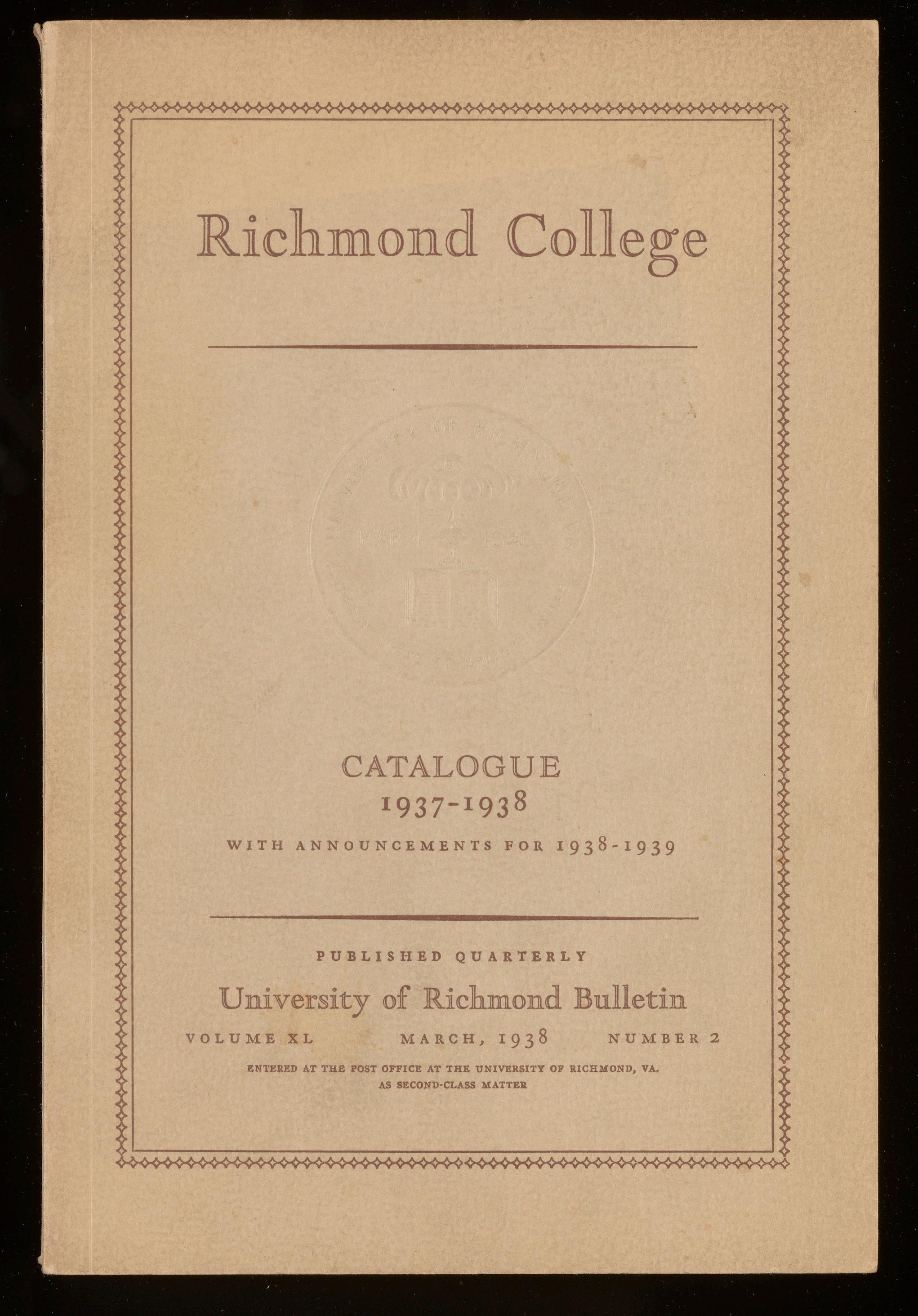
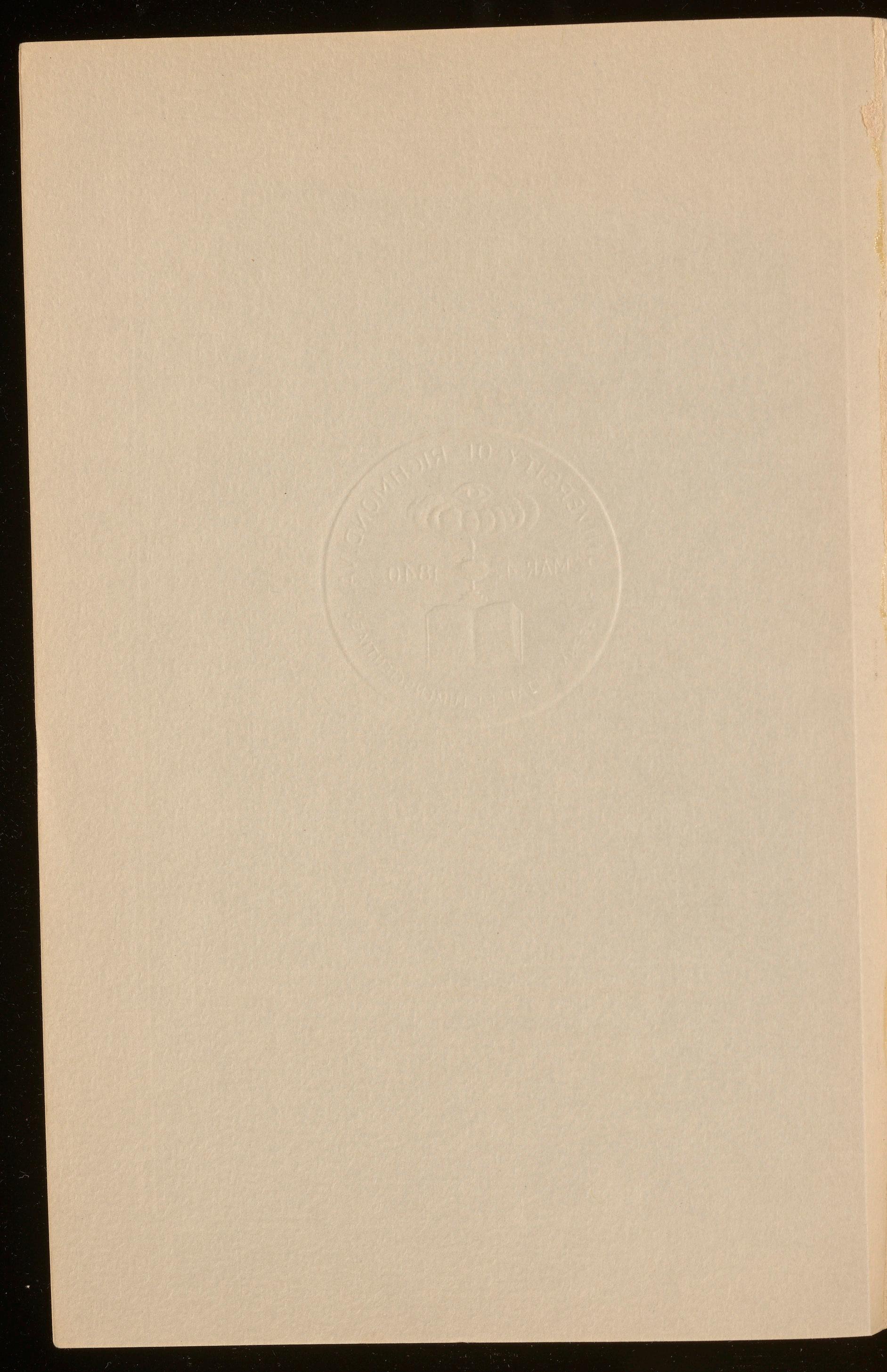



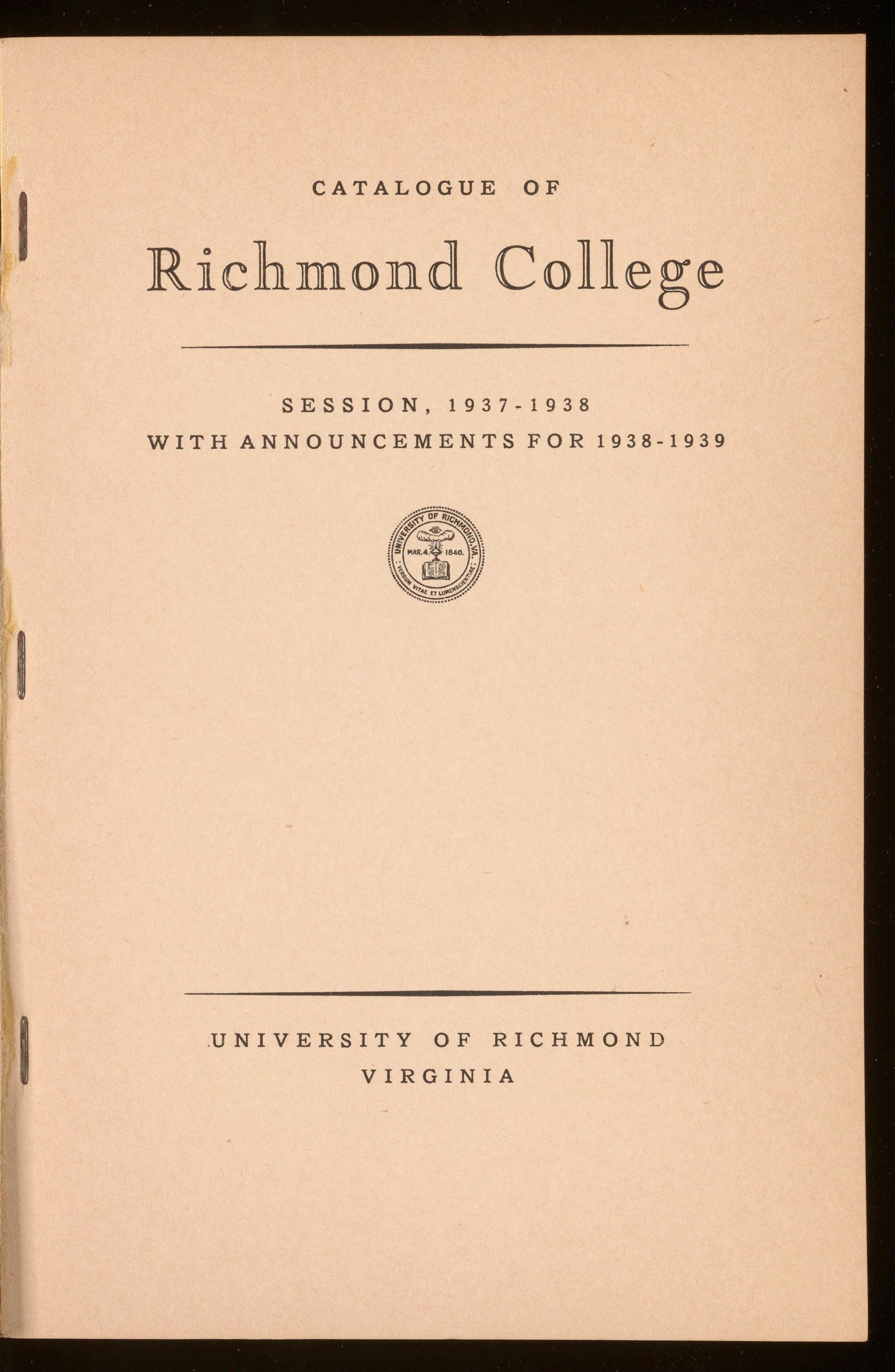
SESSION, 1937-1938 WITH ANNOUNCEMENTS FOR 1938-1939 .U N I V E R S I T Y O F R I C H M O N D VIRGINIA
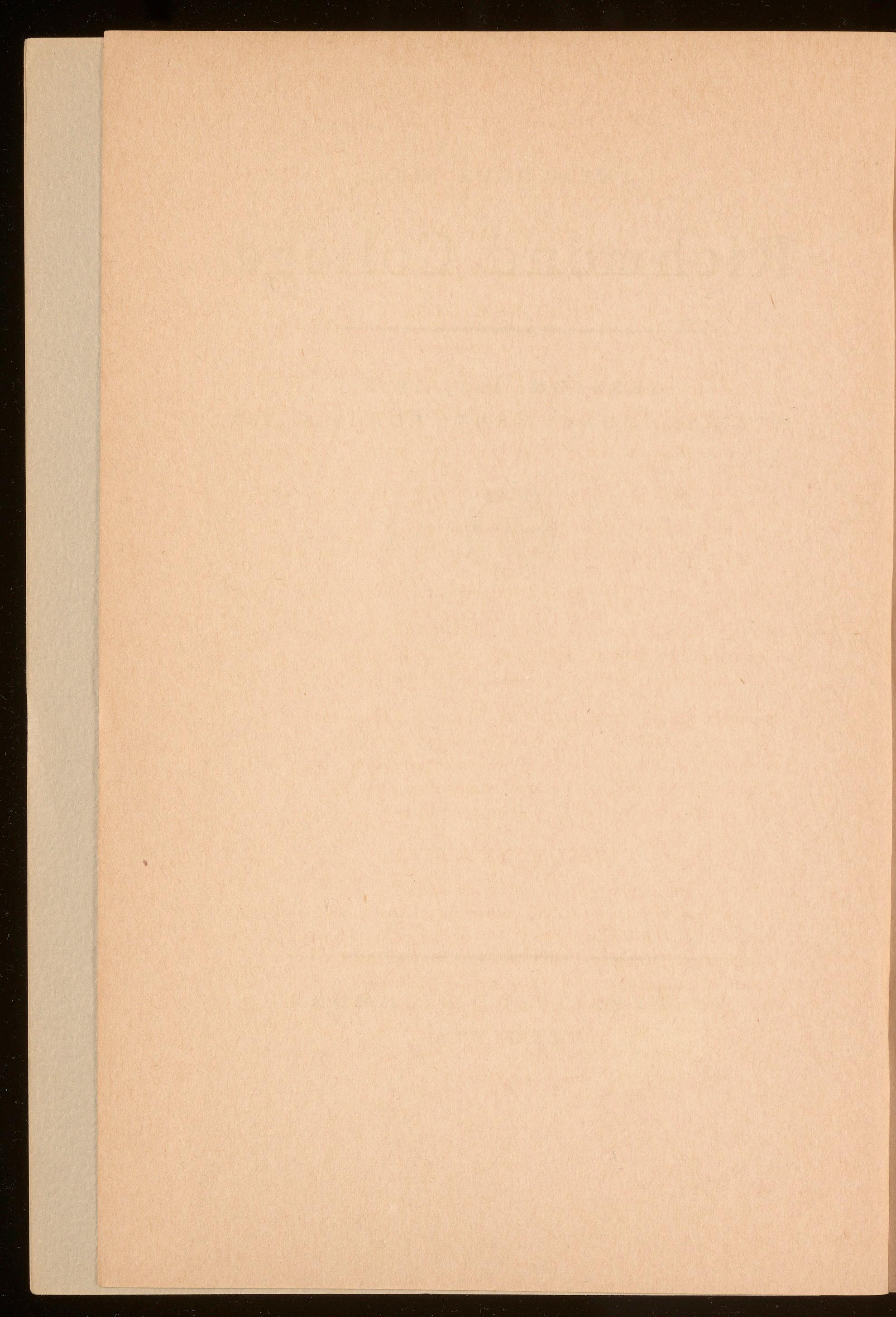

SEPTEMBER12TH, MONDAY, NooN-Orientation Week begins.
SEPTEMBER13TH AND 14TH, TUESDAY AND WEDNESDAY-Orientation exercises and registration of new students.
SEPTEMBER13TH AND 14TH, TUESDAYAND WEDNESDAY,2 :00 P. M.-Special examinations.
SEPTEMBER14TH AND 15TH, WEDNESDAYAND THURSDAY-Registration of former students.
SEPTEMBER16TH AND 17TH, FRIDAY AND SATURDAY-Formal class meetings begin.
SEPTEMBER24TH, SATURDAY-Application for degrees filed.
OCTOBER19TH TO 22ND, WED::--ESDAYTO SATURDAY,lNCLUSIVE-"University Week".
NOVEMBER9TH, WEDNESDAY-Mid-semester reports filed in the Dean's Office.
NOVEMBER23RD, WEDNESDAY,S :00 P. M.-Thanksgiving holiday begins.
NOVEMBER28TH, MONDAY, 8 :30 A. M.-Classwork resumed.
DECEMBER14TH TO 20TH, WEDNESDAYTO TUESDAY, INCLUSIVE-December tests.
DECEMBER20TH, TUESDAY, 1 :30 P.M.-Christmas holidays begin.
JANUARY 2ND, MONDAY, 8:30 A. M.-Classwork resumed.
JANUARY 6TH, FRIDAY, 2 :00 P. M.-Special examinations.
JANUARY 17TH, TUESDAY-Semester examinations begin.
JANUARY 28TH, SATURDAY-Close of first semester.
JANUARY 30TH, MONDAY-Second semester begins.
MARCH 22ND, WEDNESDAY-Mid-semester reports filed in the Dean's Office.
MARCH 22ND, WEDNESDAY,S :00 P. M.-Spring vacation begins.
MARCH 30TH, THURSDAY, 8:30 A. M.-Oasswork resumed.
MARCH 31ST, FRIDAY, 2 :00 P. M.-Special examinations.
MAY 23RD, TUESDAY-Semester examinations begin.
JuNE 4TH, SUNDAY-Baccalaureate sermon.
JUNE 5TH, MONDAY-Annual meeting of trustees; alumni reunions.
JUNE 6TH, TuEsDAY-Commencement Day.
A. vv. PATTERsoN President-Emeritus
D. s. FREEMAN President
GEORGE BRAXTON TAYLOR Vice-President
B. WEST TABB Secretary
Class One
Term expires June, 1939
W. R. Broaddus, Jr .......Martinsville
H. W. Straley ....Princeton, W. Va.
Robert N. Pollard ..............Richmond
Thomas W. Ozlin ................Richmond
J. B. Woodward. .......Newport News
Class Two
Tenn expires hme, 1940
L Howard J enkins ............Richmond
George Swann ......................Trenholm
J. E. Hicks, D.D .......................Bristol
Wilmer L. O'Flaherty ........Richmond
J. G. Holtzclaw ..................Richmond
Class Three
Term expires June, 1941
J. T. Lawrence ....................Richmond
Stuart McGuire, M.D., LL.D. Richmond
Mrs. H. W. Decker.. ..........Richmond
Sparks W. Melton, D.D Norfolk
John Stewart Bryan, LL.D. Richmond
Class Four
Term expires June, 1942
R. C. Williams ....................Richmond
B. T. Gunter ..........................Accomac
Hunter Miller ..........................Bedford
Garland Gray ..........................Waverly
F. Morris Sayre ................New York

Class Five
Term expires June, 1943
Overton D. Dennis ..............Richmond
A. W. Patterson, LL.D .....Richmond
George B. Taylor, D.D .........Hollins
Francis A. Davis ................Baltimore
J. Vaughan Gary ................Richmond
Class Six
Tenn expires Jmie, 1944
T. B. McAdams, LL.D Baltimore
Mrs. G. W. McDaniel... Richmond
T. Justin Moore ..................Richmond
E. W. Hudgins ..................Chase City
Emily Gardner, M.D .........Richmond
Class Seven
Term expires June, 1945
D. S. Freeman, Ph.D., LL.D. Richmond
E. B. Jackson, D.D .....Harrisonburg
B. P. Willis ........... ...Fredericksburg
T. Ryland Sanford, D.D .........Luray
S. P. Ryland ........................Richmond
Class Eight
Term expires lime, 1946
R. S. Owens, D.D .................Roanoke
W. H. Baylor, D.D .........Portsmouth
J. C. Metcalf, LL.D.
University of Va.
Henry M. Taylor ................Richmond
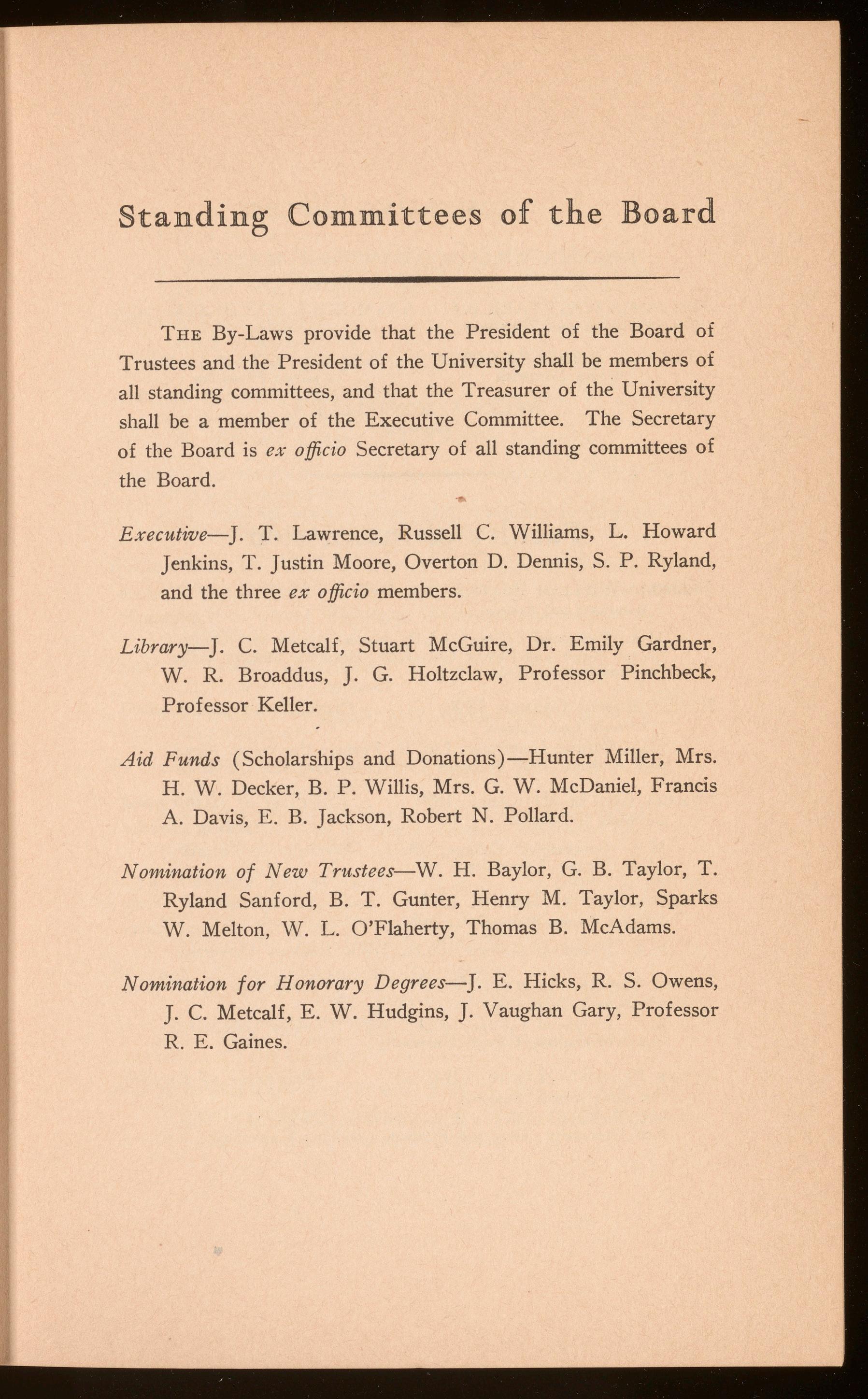
THE By-Laws provide that the President of the Board of Trustees and the President of the University shall be members of all standing committees, and that the Treasurer of the University shall be a member of the Executive Committee. The Secretary of the Board is ex officio Secretary of all standing committees of the Board.
Executive-]. T. Lawrence, Russell C. Williams, L. Howard Jenkins, T. Justin Moore, Overton D. Dennis, S. P. Ryland, and the three ex officio members.
Library-]. C. Metcalf, Stuart McGuire, Dr. Emily Gardner, W. R. Broaddus, J. G. Holtzclaw, Professor Pinchbeck, Professor Keller.
Aid Funds (Scholarships and Donations)-Hunter Miller, Mrs. H. W. Decker, B. P. Willis, Mrs. G. W. McDaniel, Francis A. Davis, E. B. Jackson, Robert N. Pollard.
Nomination of New Trustees-W. H. Baylor, G. B. Taylor, T. Ryland Sanford, B. T. Gunter, Henry M. Taylor, Sparks W. Melton, W. L. O'Flaherty, Thomas B. McAdams.
Nomination for Honorary Degrees-]. E. Hicks, R. S. Owens, J. C. Metcalf, E. W. Hudgins, J. Vaughan Gary, Professor R. E. Gaines.
FREDERIC WILLIAM BOATWRIGHT, M.A., LL.D. President
BENJAMIN WEST TABB, B.A. Vice-President and Treasurer
LUCY T. THROCKMORTON Acting Librarian
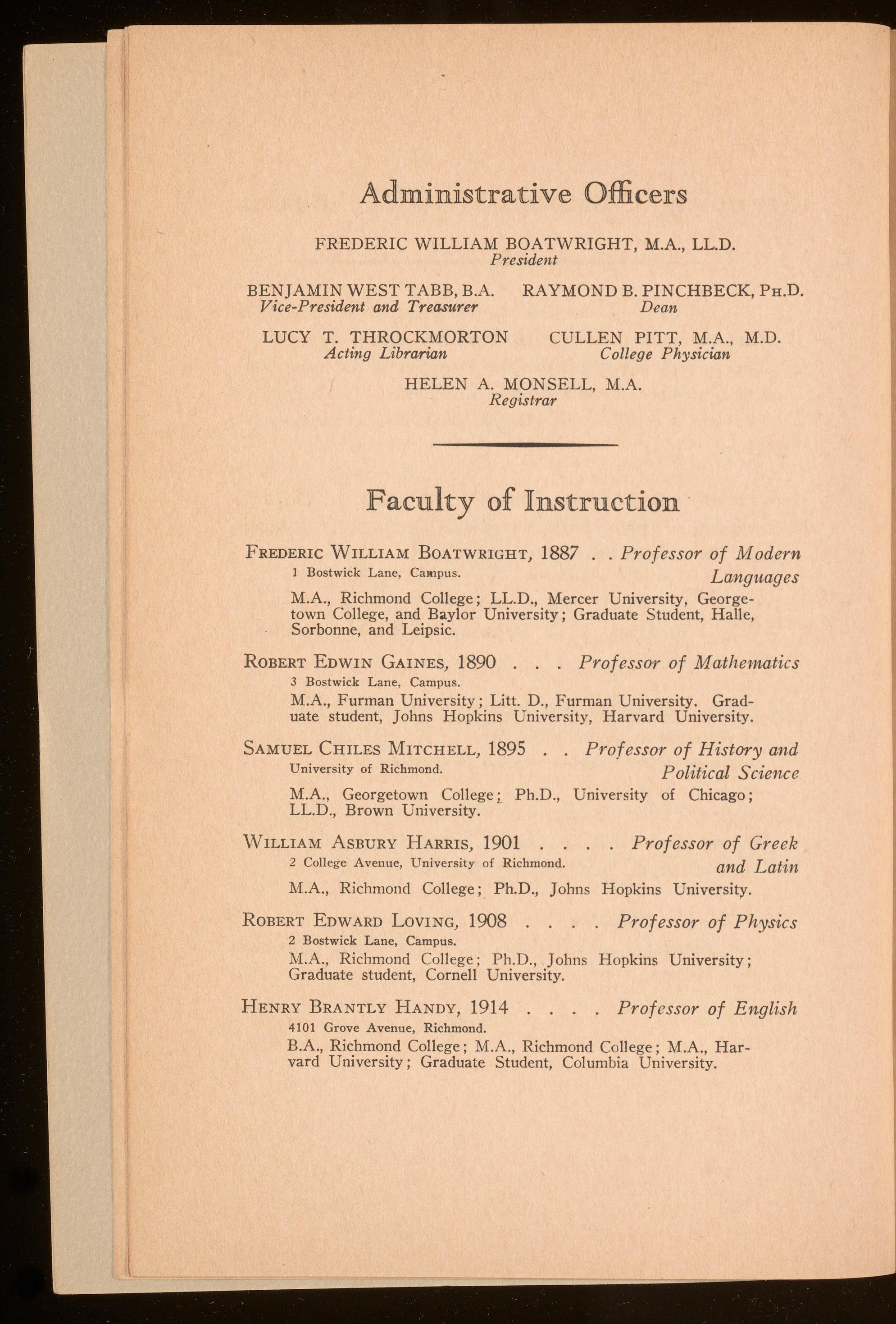
RAYMOND B. PINCHBECK, Pa.D. Dean
CULLEN PITT, M.A., M.D. College Physician
HELEN A. MONSELL, M.A. Registrar
FREDERIC WILLIAM BOATWRIGHT, 1887 .. Professor of Modern l Bostwick Lane, Campus. Languages
M.A., Richmond College; LL.D., Mercer University, Georgetown College, and Baylor University; Graduate Student, Halle, Sorbonne, and Leipsic.
ROBERT EDWIN GAINES, 1890 . Professor of M athe111,0,tics
3 Bostwick Lane, Campus.
M.A., Furman University; Litt. D., Furman University. Graduate student, Johns Hopkins University, Harvard University.
SAMUEL CHILES MITCHELL, 1895 . . Professor of History and University of Richmond. Political Science
M.A., Georgetown College~ Ph.D., University of Chicago; LL.D., Brown University.
WILLIAM ASBURY HARRIS, 1901
2 College Avenue, University of Richmond.
Professor of Greek and Latin
M.A., Richmond College; _ Ph.D., Johns Hopkins University.
ROBERT EDWARD LOVING, 1908 Professor of Physics
2 Bostwick Lane, Campus.
M.A., Richmond College; Ph.D., Johns Hopkins University; Graduate student, Cornell University.
HENRY BRANTLY HANDY, 1914
4101 Grove Avenue, Richmond.
Professor of English
B.A., Richmond College; M.A., Richmond College; M.A., Harvard University; Graduate Student, Columbia University.
UNIVERSITY OF RICHMOND 7
EDITH M. HARKER, 1916 Professor of Vocal Music Chatham Hills, Richmond.
B.A., Westhampton College; Pupil of Frederick Zuchtmann, )./fax Spicker; summer courses with Frank La Forge, George Ferguson, Sergi Klibansky, and ,vestminster Choir School.
GARNETT RYLAND, 1917 Professor of Chemistry University of Richmond.
M.A., Richmond College; Ph.D., Johns Hopkins University.
\i'/ILLIAM LOFTIN PRINCE, 1920 Professor of Education
2 423 Grove Avenue, Richmond.
B.A., Richmond College; M.A., Columbia University.
ROBERT COLLINS AsTROP, 1920 Professor of Psychology
343 Albemarle Avenue, Richmond.
A. B .. Randolph-Macon College; M.A., Univeraity of Virginia; Graduate Student, Columbia University.
RoLvix HARLAN, 1922 University of Richmond.
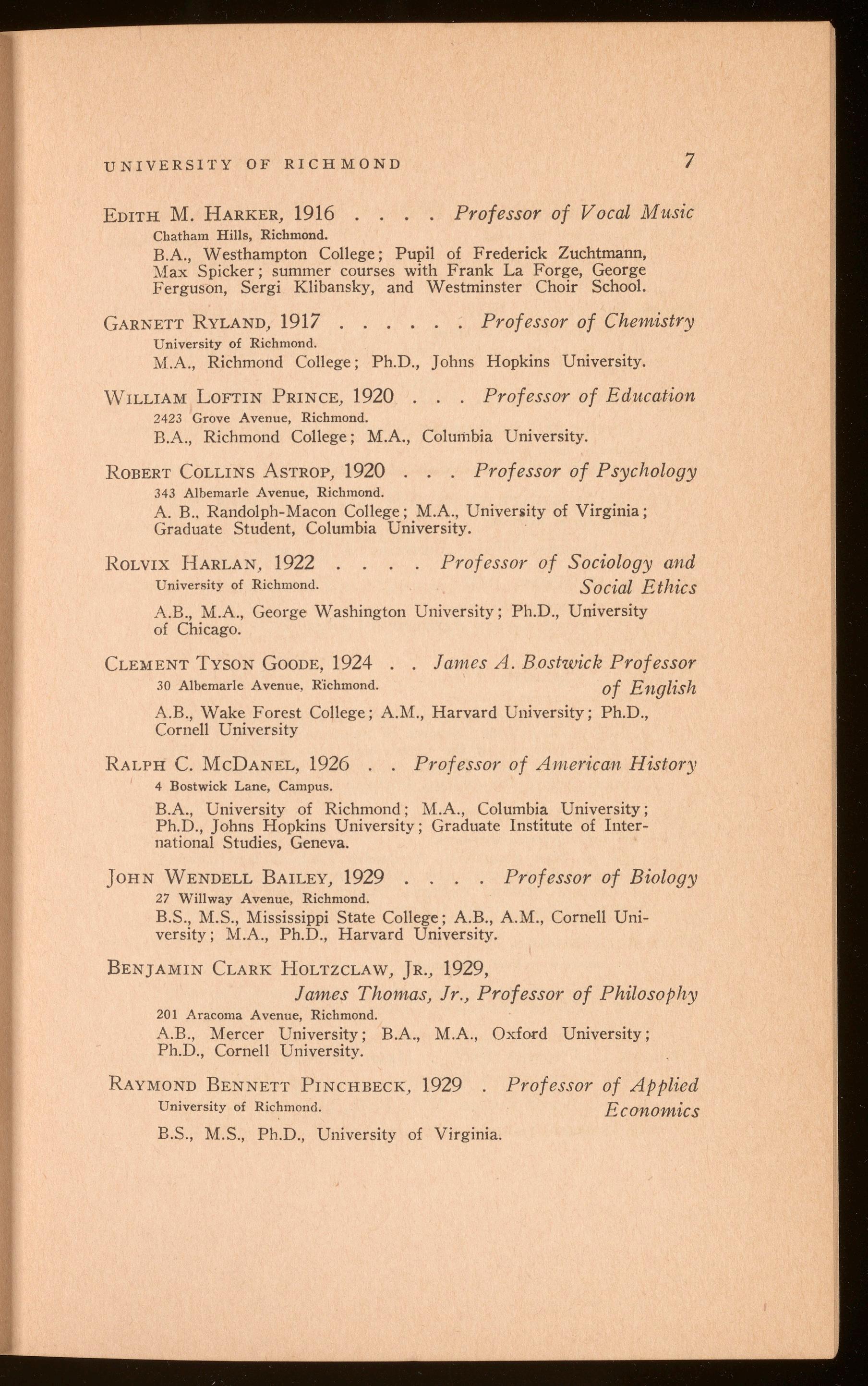
Professor of Sociology and Social Ethics
A.B., M.A., George Washington University; Ph.D., University of Chicago.
CLEMENT TYSON GOODE, 1924 .. James A. Bostwick Professor 30 Albemarle Avenue , Richmond. of English
A.B., Wake Forest College; A.M., Harvard University; Ph.D., Cornell University
RALPH C. McDANEL, 1926 Professor of A111erican History 4 Bostwick Lane, Campus.
B.A., University of Richmond; M.A., Columbia University; Ph.D., Johns Hopkins University; Graduate Institute of International Studies, Geneva.
JOHN WENDELL BAILEY, 1929 Professor of Biology 27 Willway Avenue, Richmond
B.S., M.S., Mississippi State College; A.B., A.M., Cornell University; M.A., Ph.D., Harvard University.
BENJAMIN CLARK HOLTZCLAW, JR., 1929, James Thonias, Jr., Professor of Philosophy 201 Aracoma Avenue, Richmond.
A.B ., Mercer University; B.A., M.A., Oxfocd University; Ph.D., Cornell University .
RAYMOND BENNETT PINCHBECK, 1929 University of Richmond.
B.S., M.S., Ph.D., University of Virginia.
Professor of Applied Economics

WILLIAM JuosoN GAINES, 1930 Professor of Romance University ol Richmond. Languages
A.B., South Carolina; M.A., Ph.D., University of vVisconsin; Graduate Student Sorbonne.
SOLON B. COUSINS, 1932 Professor of Bible 707 Colonial Avenue, Richmond.
B.A., D.D., Mercer University; Student, University of Edinburgh.
*JOHN JAY CORSON, III, 1933 Professor of Economics Director of The Evening School of Business Administration Ridgeway Road, Richmond.
B.S., M.S., Ph.D., University of Virginia.
GLENN F. THISTLETHWAITE, 1934 . . Professor of Physical Education University of Richmond.
B.S., Earlham College; University of Wisconsin.
CHARLES B. WRAY, 1937 Professor of Accounting
3120 W. Grace St., Richmond.
B.B.S., North Georgia Agricultural College; Ph.D., New York University.
MARGOT S. RAGLAND, 1937 Professor of V ocaJ Music
1609 Park Avenue, Richmond.
Pupil of Adele Laeis Baldwin, Frank La Forge, Corinne RiderKelsey in New York; Student of Salignac of Opera Comique in Paris, Litvinne of the Opera and Jean de Reszke; New York Recital, 1921 ; Teacher of singing at the Institute of Musical Art of the Juillard Foundation, 1921-29.
GRACE STARR WENDT, 1937 Professor of Music 3430 Grove Avenue, Richmond.
Pupil of Max Swarthout, Alexander Raab, Luther Conradi, John Powell, in piano; Eric DeLamarter, in organ; Graduate of Chicago Musical College; Master Classes, 1928, 1931; Summer School, Comb's College of Music, Philadelphia, 1936.
WooDFORD BROADUS HACKLEY, 1924 Associate Professor 2120 Lakeview Avenue, Richmond. of Latin
A.B., University of Virginia; M.A., Northwestern University; A.M., Harvard University; Graduate Student, Columbia University.
HERMAN P. THOMAS, 1927 . Associate Professor of Economics
212 s. Colonial Avenue, Richmond. and Applied Economics
B.A., Richmond College; M.A., Ph.D., University of Virginia.
*Leave of absence, 1937-38.
UNIVERSITY OF RICHMOND 9
vVILLIAM FREDERICK CAYLOR, 1928
501 N. Boulevard, Richmond.
M.A., Mercer University.
CHARLES H. WHEELER, 1928 University of Richmond.
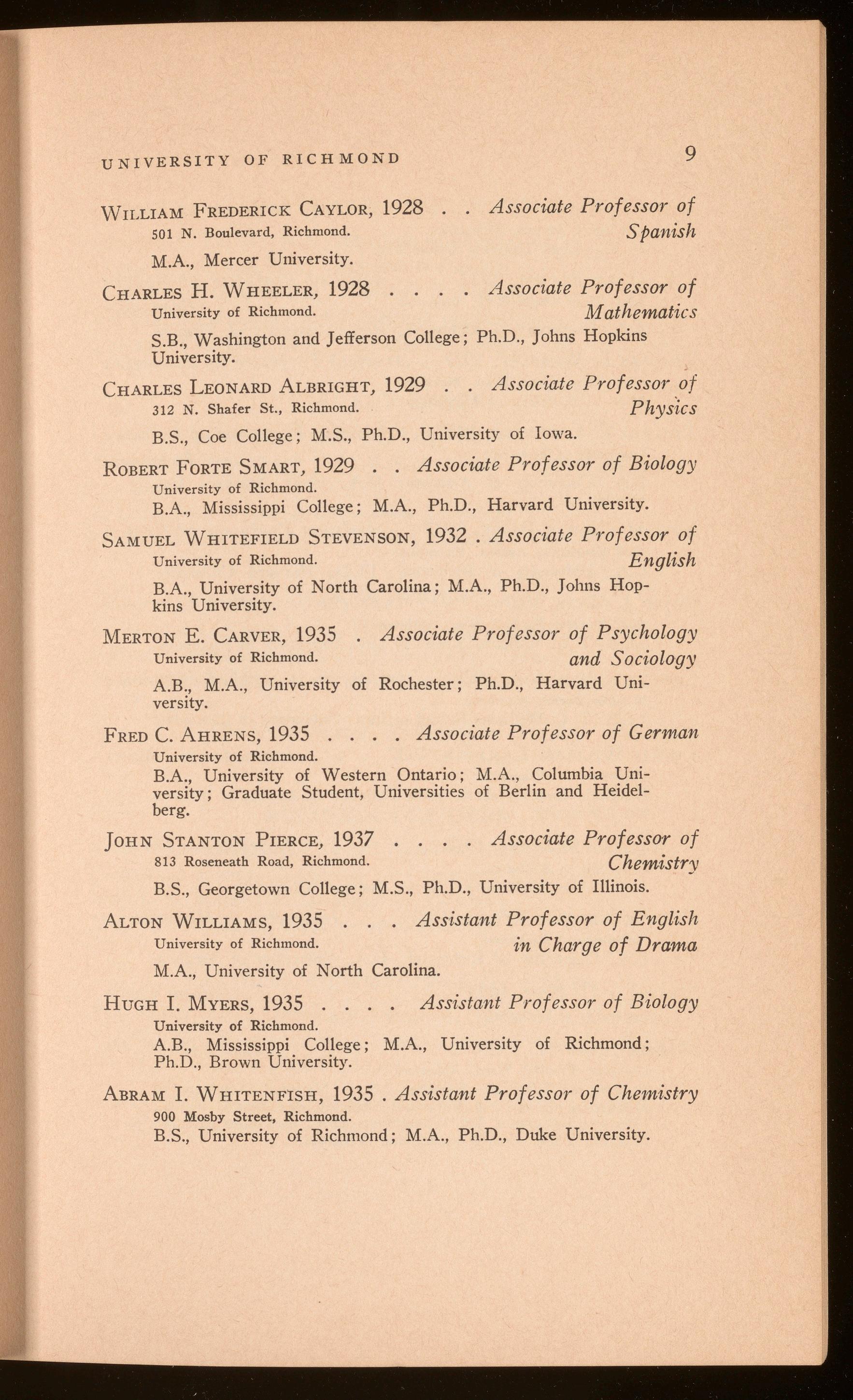
Associate Professor of Spanish
Associate Professor of Mathematics
S.B., Washington and Jefferson College; Ph.D., Johns Hopkins University.
CHARLES LEONARD ALBRIGHT, 1929 . 312 N. Shafer St., Richmond.
Associate Professor of Phys~cs
B.S ., Coe College; M.S., Ph.D., University of Iowa.
ROBERT FORTE SMART, 1929 . . Associate Professor of Biology
University of Richmond.
B.A., Mississippi College; M.A., Ph.D., Harvard University.
SAMUEL WHITEFIELD STEVENSON, 1932 . Associate Professor of University of Richmond English
B.A., University of North Carolina; M.A., Ph.D., Johns Hopkins University.
MERTON E. CARVER, 1935 Associate Professor of Psychology University of Richmond. and Sociology
A.B., M.A., University of Rochester; Ph.D., Harvard University.
FRED C. AHRENS, 1935 . . . . Associate Professor of German University of Richmond.
B.A., University of Western Ontario; M.A., Columbia University; Graduate Student, Universities of Berlin and Heidelberg.
JOHN STANTON PIERCE, 1937 Associate Professor of 813 Roseneath Road, Richmond. Chemistry
B.S., Georgetown College; M.S., Ph.D., University of Illinois.
ALTON WILLIAMS, 1935 University of Richmond. Assistant Professor of English in Charge of Drama
M.A., University of North Carolina.
HUGH I. MYERS, 1935 . Assistant Professor of Biology University of Richmond.
A.B., Mississippi College; M.A., University of Richmond; Ph.D., Brown University.
ABRAM I. WHITENFlSH, 1935 . Assistant Professor of Chemistry 900 Mosby Street, Richmond.
B.S., University of Richmond; M.A., Ph.D., Duke University.
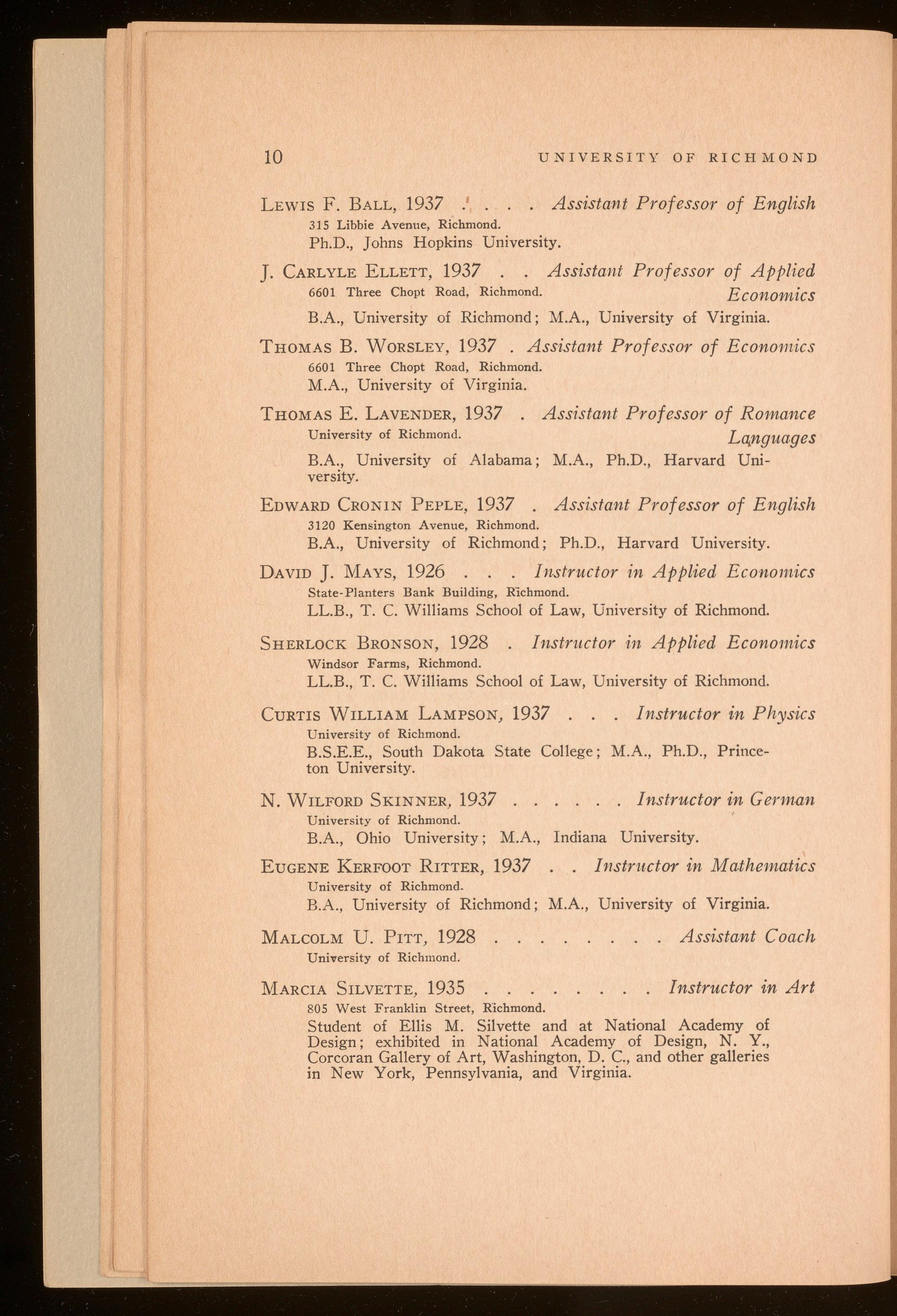
UNIVERSITY OF RICHMOND
LEWIS F. BALL, 1937 Assistant Professor of English 31 5 Libbie Avenue, Richmond. Ph.D., Johns Hopkins University.
J. CARLYLE ELLETT, 1937
Assistant Professor of Applied 6601 Three Chopt Road, Richmond. Economics
B.A., University of Richmond; M.A., University of Virginia.
THOMAS B. WORSLEY, 1937 . Assistant Professor of Economics 6601 Three Chopt Road, Richmond.
M.A., University of Virginia.
THOMAS E. LAVENDER, 1937
Assistant Professor of R011'iance University of Richmond. La,.nguages
B.A., University of Alabama; M.A., Ph.D., Harvard University.
EDWARD CRONIN PEPLE, 1937 Assistant Professor of English 3120 Kensington Avenue, Richmond.
B.A., University of Richmond; Ph.D., Harvard University.
DAVID J. MAYS, 1926 Instructor in Applied Economics State-Planters Bank Building, Richmond.
LL.B., T. C. Williams School of Law, University of Richmond.
SHERLOCK BRONSON, 1928 Instructor in Applied Economics Windsor Farms, Richmond.
LL.B., T. C. Williams School of Law, University of Richmond.
CURTIS WILLIAM LAMPSON, 1937 Instructor in Physics University of Richmond.
B.S.E.E., South Dakota State College; M.A., Ph.D., Princeton University.
N. WILFORD SKINNER, 1937 . . Instructor in German University of Richmond.
B.A., Ohio University; M.A., Indiana University.
EUGENE KERFOOT RITTER, 1937 Instructor in Mathematics University of Richmond.
B.A., University of Richmond; M.A., University of Virginia.
MALCOLM U. PITT, 1928 Assistant Coach Uni.,.ersity of Richmond.
MARCIA SILVETTE, 1935 Instructor in Art 805 West Franklin Street, Richmond. Student of Ellis M. Silvette and at National Academy of Design; exhibited in National Academy of Design, N. Y., Corcoran Gallery of Art, Washington, D. C., and other galleries in New York, Pennsylvania, and Virginia.

UNIVERSITY OF RICHMOND
EUGENE A. TALLEY, B.A., Assistant in Chemistry.
JAMES G. WILSON, B.A., Assistant in Biology.
ROBERT A. CARSLEY, B.A., Assistant in Biology.
JoHN C. STRICKLAND, B.A., Assistant in Biology.
CHANNING L. PACE, B.A., Assistant in Biology.
LucY T. THROCKMORTON, Acting Librarian.
MARTHA F. SNODGRASS, B.A., B.S., Assistant Librarian and Cataloguer.
E. ELIZABETH THOMAS, Circulation Librarian.
MARGARET LEAKE, B.A., Circulation Librarian.
ELIZABETH L. THOMASSON, M.A., Secretary to the President.
HELEN A. MoNSELL, M.A., Secretary to the Dean.
EDITH KEESEE SHELTON, B.A., Cashier and Secretary to the Treasurer.
MRS. AGNES B. RICHARDSON, Secretary to Faculty Personnel Connnittee.
R. M. STONE, LL.B., Assistant Business Manager.
FREDERICK MooRE, Supervisor of Chemistry Stockrooms.
MRs. L. S. WooDWARD, Manager of Refectory.
MRS. R. P. GORDON, Director of Dormitories.
Representatives on University Senate-R. E. GAINES, MITCHELL, HARRIS, CORSON. LOVING. RYLAND, GOODE, HARLAN, HOLTZCLAW, BAILEY, PRINCE, vVRAY.
Courses and Degrees-LOVING, R. E. GAINES, GOODE, HOLTZCLAW, CARVER.

UNIVERSITY OF RICHMOND
Personnel-HOLTZCLAW, LOVING, MITCHELL, GOODE, PRINCE. lntegration--GooDE, LOVING, HOLTZCLAW, CORSON, SMART, W. J. GAINES.
Athletics-HARLAN, HANDY, BAILEY, McDANEL, THISTLETHWAITE.
Public Lectures-W. J. GAINES, DouBLES, HACKLEY, CORSON, PEPLE.
Fraternities-THOMAS, CAYLOR, HARRIS.
Student Affairs-HACKLEY, THOMAS, AsTROP, HARLAN, RITTER.
Alumni-PRINCE, RYLAND, McDANEL.
Vespers and Religious Lif e-CouSINS, HARRIS, RYLAND, PIERCE with WESTHAMPTON COLLEGE COMMITTEE.
Student Employment-CAYLOR, MYERS, WORSLEY.
Convocation-McDANEL, BAILEY, WHEELER, CORSON, with WESTHAMPTON COLLEGE COMMITTEE.
Faculty Socials-\tVHEELER, STEVENSON, LAVENDER, WILLIAMS.
Catalogue-STEVENSON, SMART, ALBRIGHT, BALL.
Public Exercises-HARRIS, STONE, with WESTHAMPTON COLLEGE COMMITTEE.
Students' Use of English-WRAY, HANDY, ELLETT, STEVENSON, LAMPSON.
Student Social Life-THOMAS, MCDANEL and certain student officials.
Committee on Scholarships and Student Aid-HOLTZCLAW, and administrative officers of RICHMOND and WESTHAMPTON COLLEGES.
Marshals-RYLAND, McDANEL.
The President and Dean are ex officio members of all committees.

RICHMONDCoLLEGE,a college of liberal arts and sciences for men, was founded in 1832, and celebrated its first centennial in May, 1932. Around this college as a nucleus have grown up the T. C. Williams School of Law (organized 1870); Westhampton College, a college of liberal arts and sciences for women ( 1914) ; the Summer School (1920); the Graduate Department (1921); and the Evening School of Business Administration ( 1924). These several colleges or departments constitute the University of Richmond. Each college has its own dean or director, its own faculty and its own institutional life. Each college has its separate student body, which is limited to a number which will insure every student intellectual and social contacts with his professors and within his own academic group. The University Senate, on which sit representatives of all the faculties, provides for intercollegiate co-operation.
The legal name of the corporation is "University of Richmond." The Board of Trustees of the University of Richmond controls all endowment and other funds and makes all appropriations. The several colleges award no degrees, but all degress for work done in any one of the colleges are conferred by the University of Richmond. Ultimate authority is vested in the Board of Trustees and in the President of the University.
The campus of Richmond College embraces one hundred and fifty acres, somewhat equally divided between open spaces and woodlands, situated in the western suburbs of Richmond, and separated by a lake from Westhampton College. The grounds are five and a half miles from the center of the city, and are reached by paved driveways and by electric cars.
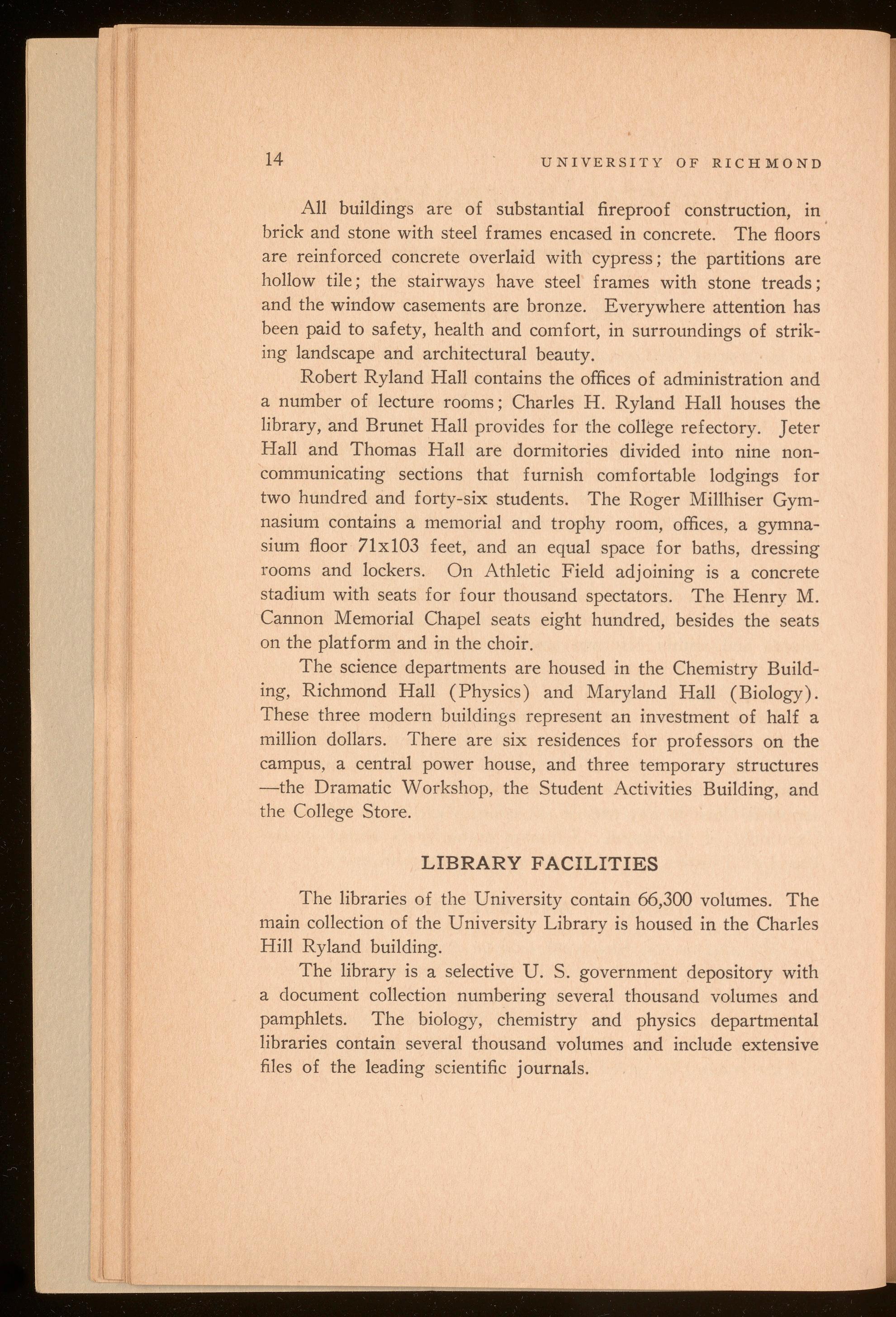
All buildings are of substantial fireproof construction, in brick and stone with steel frames encased in concrete. The floors are reinforced concrete overlaid with cypress; the partitions are hollow tile; the stairways have steel frames with stone treads; and the window casements are bronze. Everywhere attention has been paid to safety, health and comfort, in surroundings of striking landscape and architectural beauty.
Robert Ryland Hall contains the offices of administration and a number of lecture rooms; Charles H. Ryland Hall houses the library, and Brunet Hall provides for the college refectory . Jeter Hall and Thomas Hall are dormitories divided into nine noncommunicating sections that furnish comfortable lodgings for two hundred and forty-six students. The Roger Millhiser Gymnasium contains a memorial and trophy room, offices, a gymnasium floor 71x103 feet, and an equal space for baths, dressing rooms and lockers. On Athletic Field adjoining is a concrete stadium with seats for four thousand spectators. The Henry M. Cannon Memorial Chapel seats eight hundred, besides the seats on the platform and in the choir.
The science departments are housed in the Chemistry Building, Richmond Hall (Physics) and Mary land Hall (Biology) . These three modern buildings represent an investment of half a million dollars There are six residences for professors on the campus, a central power house, and three temporary structures -the Dramatic Workshop, the Student Activities Building, and the College Store.
The libraries of the University contain 66,300 volumes. The main collection of the University Library is housed in the Charles Hill Ryland building.
The library is a selective U. S. government depository with a document collection numbering several thousand volumes and pamphlets. The biology, chemistry and physics departmental libraries contain several thousand volumes and include extensive files of the leading scientific journals.
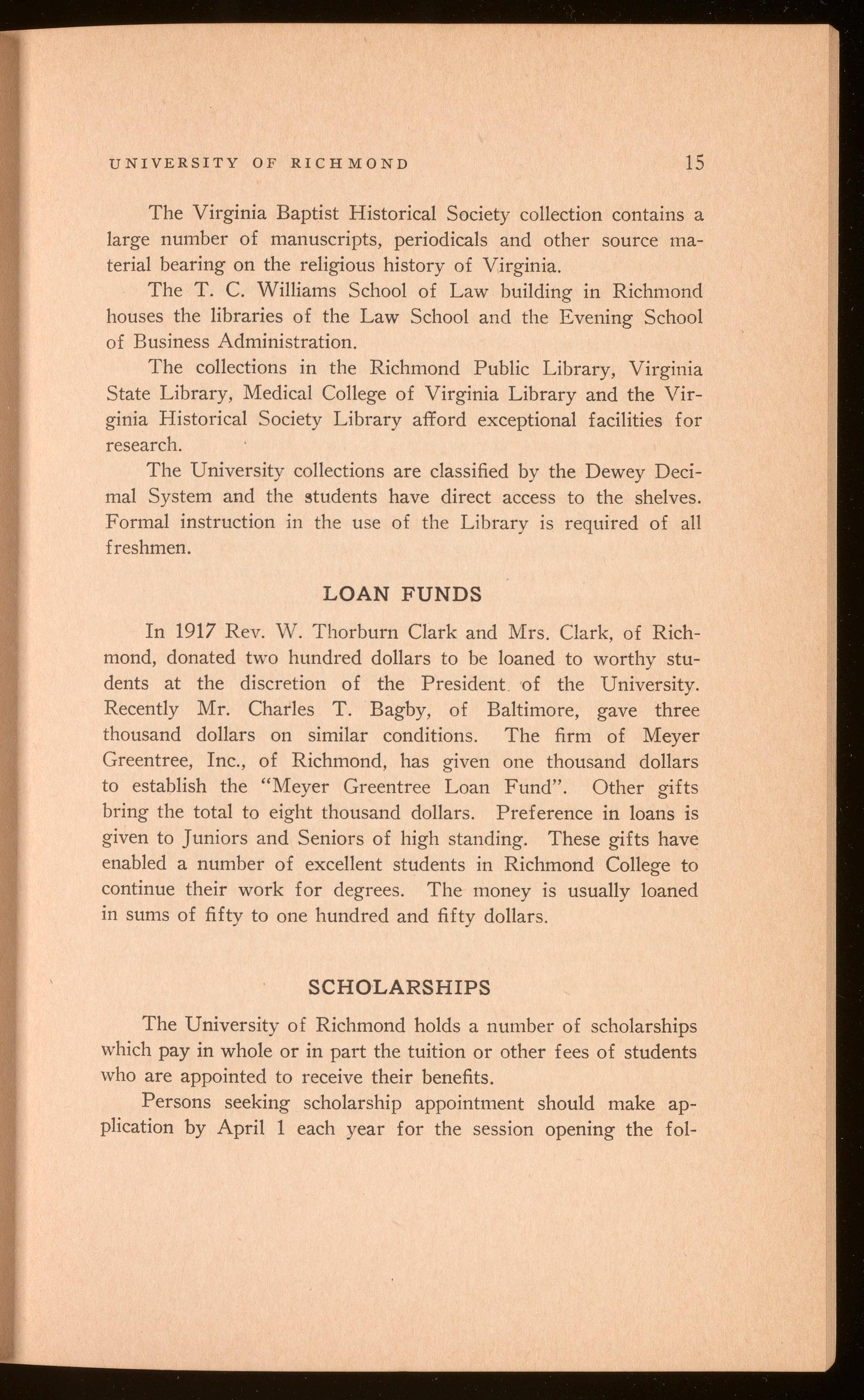
The Virginia Baptist Historical Society collection contains a large number of manuscripts, periodicals and other source material bearing on the religious history of Virginia.
The T. C. Williams School of Law building in Richmond houses the libraries of the Law School and the Evening School of Business Administration.
The collections in the Richmond Public Library, Virginia State Library, Medical College of Virginia Library and the Virginia Historical Society Library afford exceptional facilities for research.
The University collections are classified by the Dewey Decimal System and the students have direct access to the shelves. Formal instruction in the use of the Library is required of all freshmen.
In 1917 Rev. W. Thorburn Clark and Mrs. Clark, of Richmond, donated two hundred dollars to be loaned to worthy students at the discretion of the President. of the University. Recently Mr. Charles T. Bagby, of Baltimore, gave three thousand dollars on similar conditions. The firm of Meyer Greentree, Inc., of Richmond, has given one thousand dollars to establish the "Meyer Greentree Loan Fund". Other gifts bring the total to eight thousand dollars. Preference in loans is given to Juniors and Seniors of high standing. These gifts have enabled a number of excellent students in Richmond College to continue their work for degrees. The money is usually loaned in sums of fifty to one hundred and fifty dollars.
The University of Richmond holds a number of scholarships which pay in whole or in part the tuition or other fees of students who are appointed to receive their benefits.
Persons seeking scholarship appointment should make application by April 1 each year for the session opening the fol-

lowing September. Application should be made on a printed form which may be obtained from the UNIVERSITYCOMMITTEE ON SCHOLARSHIPS,University of Richmond, Va. Most of the scholarship appointments are made in April. New students must also submit an entrance certificate duly filled up, or other satisfactory evidence of scholastic fitness.
In making appointments the committee takes into account . especially ( 1) the financial need of the applicant, (2) his scholastic standing, and ( 3) whether he proposes to apply for a college degree . Applicants are expected to have attained at least an average grade of 85% in high school, and to maintain an average grade of not less than "C" in college. First consideration is given to students already in college who have maintained good standing in character, conduct and study and have proved actively helpful by example and successful work in their classes. Special consideration is given to the applications of children of ministers or missionaries, but they must meet all scholastic requirements.
The University provides a number of "Service Scholarships" which require the holder to make some return in service to his college while he holds the scholarship. Service Scholarships are rarely granted to freshmen.
The University agrees with the donor of a scholarship fund that during the life of the donor he shall have the right to nominate the beneficiary of his scholarship, subject to the usual requirements of the University as to scholastic standing and conduct, and provided, further, that the nomination be made each year prior to September 1. At the death of the donor the right of appointment vests in the University trustees, unless at the time of founding the scholarship a written contract had been entered into making different provision.
The University seeks to increase the number of its scholarships and invites correspondence from prospective donors. A gift in any amount from $1,000 up will establish a permanent scholarship fund and the scholarship may bear a name as a memorial foundation. The income of the fund, without deduction
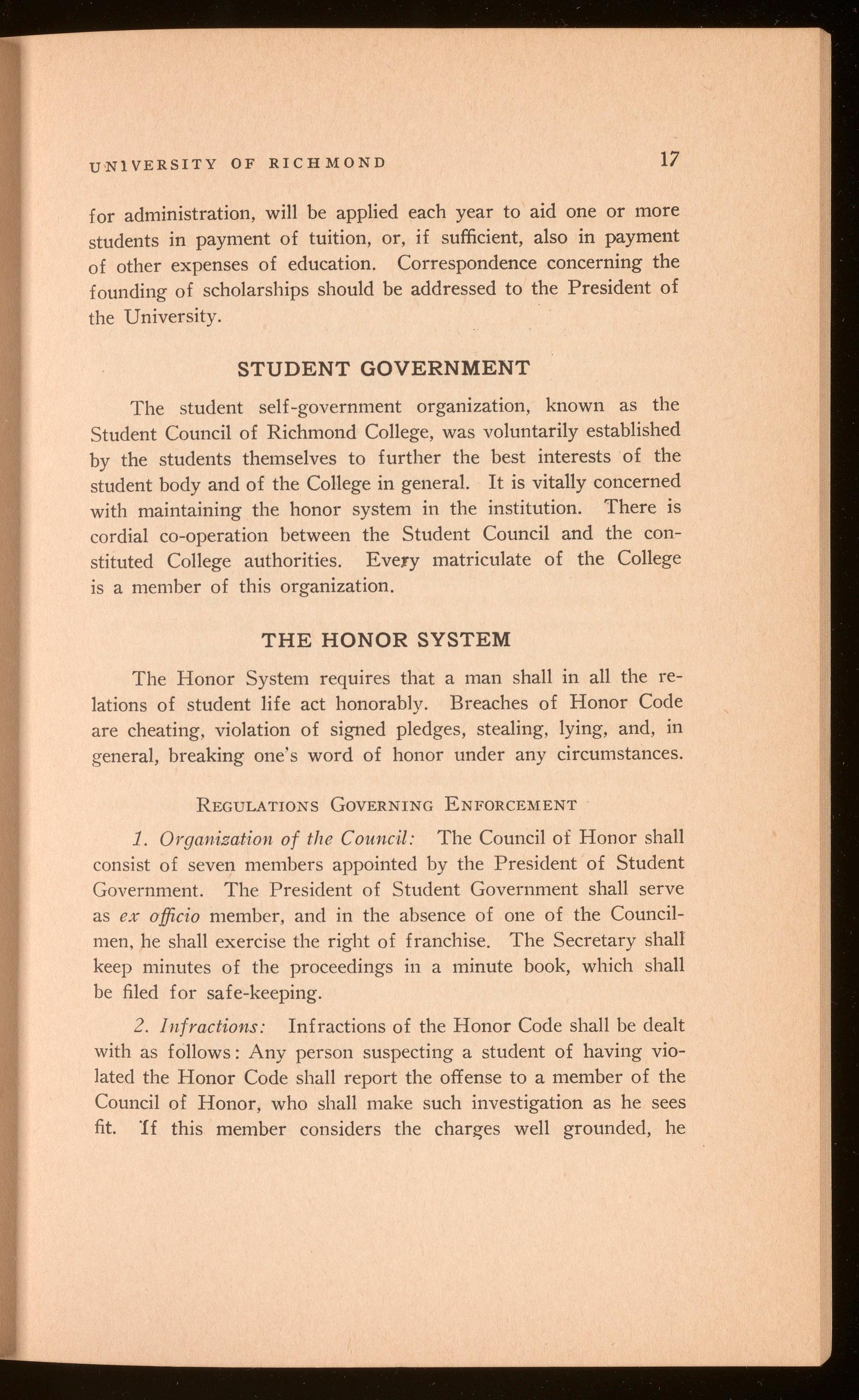
for administration, will be applied each year to aid one or more students in payment of tuition, or, if sufficient, also in payment of other expenses of education. Correspondence concerning the founding of scholarships should be addressed to the President of the University.
The student self-government organization, known as the Student Council of Richmond College, was voluntarily established by the students themselves to further the best interests of the student body and of the College in general. It is vitally concerned with maintaining the honor system in the institution. There is cordial co-operation between the Student Council and the constituted College authorities. Eve1y matriculate of the College is a member of this organization.
The Honor System requires that a man shall in all the relations of student life act honorably. Breaches of Honor Code are cheating, violation of signed pledges, stealing, lying, and, in general, breaking one's word of honor under any circumstances.
1. Organization of the Council: The Council of Honor shall consist of seven members appointed by the President of Student Government. The President of Student Government shall serve as ex officio member, and in the absence of one of the Councilmen, he shall exercise the right of franchise. The Secretary shall keep minutes of the proceedings in a minute book, which shall be filed for safe-keeping.
2. Infractions: Infractions of the Honor Code shall be dealt with as follows : Any person suspecting a student of having violated the Honor Code shall report the offense to a member of the Council of Honor, who shall make such investigation as he sees fit. If this member considers the char~es well grounded, he

shall request the Chairman of the Council to call a meeting as soon as possible. The name of the person reporting the offense shall not be divulged under any cir.:1. nstances.
3. Procedure: The members of tl,e Council shall have the privilege of asking a witness question:::. but only such questions as shall tend to bring out the facts of the case. The accused shall have every opportunity to defend himself.
If, after thorough trial, the Council of Honor, with not more than one dissenting opinion, are convinced of the guilt of the accused and so cast their votes in secret ballot, the sentence pronounced shall become effective immediately. In case the accuseJ is found innocent, the minutes of the proceedings shall be immediately destroyed.
4. Penalties: If the accused is found guilty, the members of the Council shall vote as to whether the offense has been a minor or major. If minor, the accused shall be sent home for one week with a letter to his parents mailed directly from the Chairman and the Dean. If major, the accused shall be dismissed from school. In case of two minor offenses, the accused shall be dismissed from school.
The decision of the Council on all cases shall be posted, but the name of the accused shall not be made public.
All decisions of the Council shall be approved by the Dean before becoming effective
1. The Pledge: "On my honor as a gentleman, I have neither given nor received aid."
2. Meaning of the Pledge: The pledge in classes on quizzes, examinations, written problems and exercises means that the work which the student hands in to his professor is his own, which he himself has done in accordance with the requirements laid down by the Faculty in the regulations set forth below.
3. Exercise Care: It is also important that everyone should exercise the greatest care to keep himself free from suspicion of
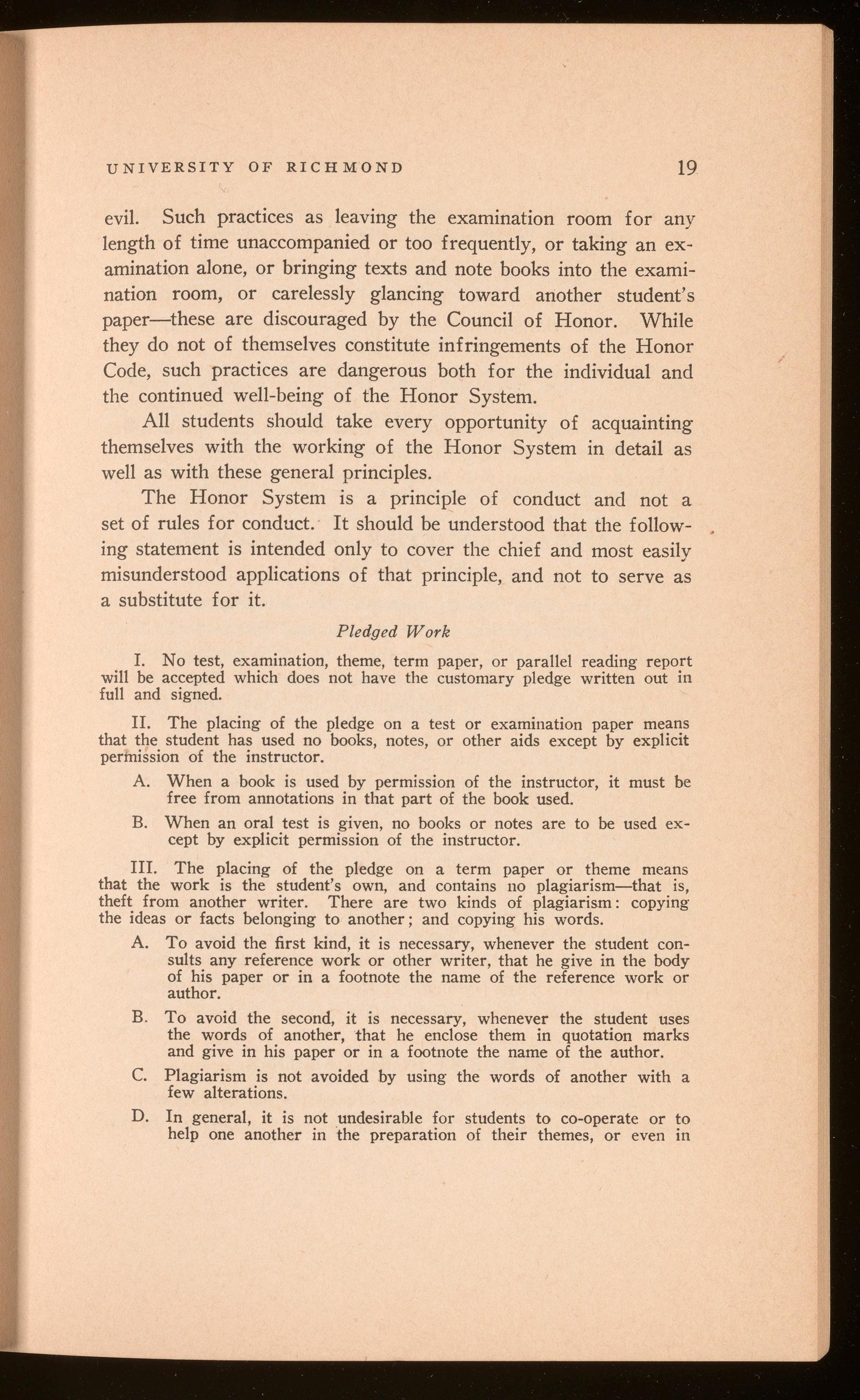
evil. Such practices as leaving the examination room for any length of time unaccompanied or too frequently, or taking an examination alone, or bringing texts and note books into the examination room, or carelessly glancing toward another student's paper-these are discouraged by the Council of Honor. While they do not of themselves constitute infringements of the Honor Code, such practices are dangerous both for the individual and the continued well-being of the Honor System.
All students should take every opportunity of acquainting themselves with the working of the Honor System in detail as well as with these general principles.
The Honor System is a principle of conduct and not a set of rules for conduct. It should be understood that the following statement is intended only to cover the chief and most easily misunderstood applications of that principle, and not to serve as a substitute for it.
Pledged Wark
I. No test, examination, theme, term paper, or parallel reading report will be accepted which does not have the customary pledge written out in full and signed.
II. The placing of the pledge on a test or examination paper means that the student has used no books, notes, or other aids except by explicit permission of the instructor.
A. When a book is used by permission of the instructor, it must be free from annotations in that part of the book used.
B. When an oral test is given, no books or notes are to be used except by explicit permission of the instructor.
III. The placing of the pledge on a term paper or theme means that the work is the student's own, and contains no plagiarism-that is, theft from another writer. There are two kinds of plagiarism : copying the ideas or facts belonging to another ; and copying his words.
A. To avoid the first kind, it is necessary, whenever the student consults any reference work or other writer, that he give in the body of his paper or in a footnote the name of the reference work or author.
B. To avoid the second, it is necessary, whenever the student uses the words of another, that he enclose them in quotation marks and give in his paper or in a footnote the name of the author.
C. Plagiarism is not avoided by using the words of another with a few alterations.
D. In general, it is not undesirable for students to co-operate or to help one another in the preparation of their themes, or even in
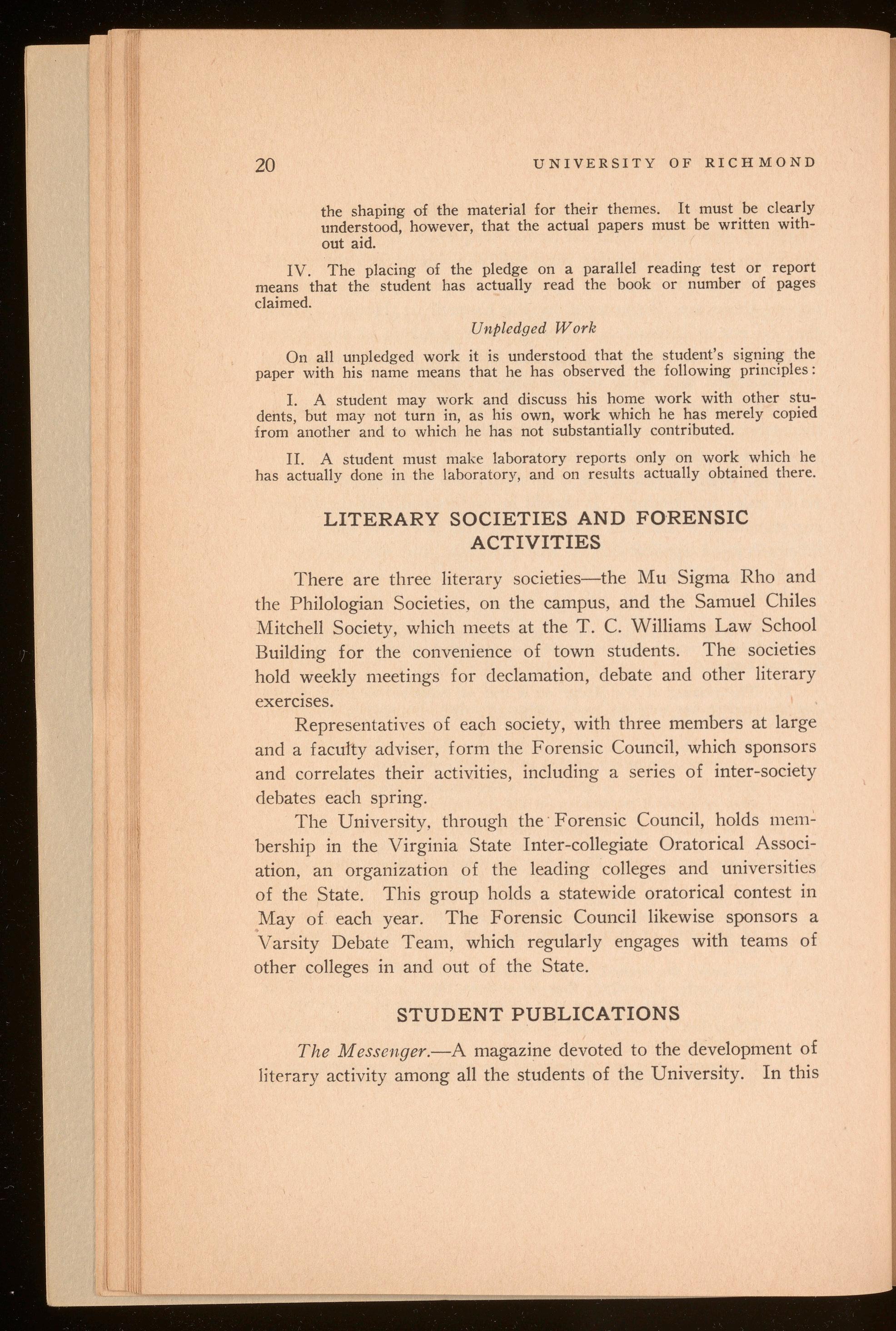
the shaping of the material for their themes. It must be clearly understood, however, that the actual papers must be written without aid.
IV. The placing of the pledge on a parallel reading test or report means that the student has actually read the book or number of pages claimed.
Unpledged W or!~
On all unpledged work it is understood that the student's signing the paper with his name means that he has observed the following principles:
I. A student may work and discuss his home work with other students, but may not turn in, as his own, work which he has merely copied from another and to which he has not substantially contributed.
II. A student must make laboratory reports only on work which he has actually done in the laboratory, and on results actually obtained there.
There are three literary societies-the Mu Sigma Rho and the Philologian Societies, on the campus, and the Samuel Chiles Mitchell Society, which meets at the T. C. Williams Law School Building for the convenience of town students. The societies hold weekly meetings for declamation, debate and other literary exercises.
Representatives of each society, with three members at large and a faculty adviser, form the Forensic Council, which sponsors and correlates their activities, including a series of inter-society debates each spring.
The University. through the · Forensic Council, holds m embership in the Virginia State Inter-collegiate Oratorical Association , an organization of the leading colleges and universities of the State. This group holds a statewide oratorical contest in May of each year. The Forensic Council likewise sponsors a Varsity Debate Team , which regularly engages with teams of other colleges in and out of the State .
The M essenger.-A magazine devoted to the development of literary activity among all the students of the University. In this

periodical are published short stories, poems, essays, book reviews and editorials on questions of local academic interest. This magazine has for over fifty years maintained a high standard of literary excellence among college magazines.
The Richmond Collegian.-This is a weekly newspaper in which are published up-to-date news articles on every phase of university life. It has a working staff of about thirty students distributed in three schools. The Collegian is a student organ and has not only proved of interest to the resident students and faculty, but has a wide circulation among alumni as well.
· The Web.-This is an annual volume issued usually in May or June, abundantly illustrated and forming a transcript of a year of college life.
The student publications of the University are controlled by the administration and the students jointly through an incorporated board, whose legal title is "University of Richmond Publications, Incorporated."
The board is composed of nine trustees as follows: two Faculty members and two alumni, appointed by the President of the University for a term of two years; the presidents of the student governments of Richmond College, Westhampton College, and the T C. Williams School of Law, who by election to their offices become automatically members of the board; one Richmond College student elected by the student body for a term of two years ; and one Westhampton College student similarly elected.
The board is empowered to exercise financial control and assume financial responsibility for the publications; to sign all necessary contracts ; to appoint all editors and business managers, and such other members of staffs as it may see fit; and in general to carry out all activities involved in promoting the welfare of the publications.
The essential function of the board is to provide the stability and continuity of control which college publications, because of constant changes in student heads, often lack.

The University Band, composed entirely of students, has added much to the spirit of the campus. It plays for all athletic contests and for many other student functions. Prospective students who are interested in this organization are invited to bring their instruments.
An active Young Men's Christian Association is maintained in the College. Its object is to promote the spiritual and moral welfare of the students. Meetings, addressed by representative students, faculty members, and prominent men from Richmond, are held weekly. The Association has as its headquarters a building which was used during the war as a Red Cross building. All students of the College are invited to make the Y. M. C. A. a recreation center. Biennially, the Association co-operates with the State Y. M. C. A. in sponsoring the Christian World Education Institute lectures in Virginia colleges.
Richmond College was among the first colleges in Virginia to have an organized Glee Club. This club offers opportunity to learn to read music at sight, and the experience gained enables many of the members to lead other groups in singing. It also sings ·at Chapel and Vesper services.
The University Players is the University dramatic organization, open to all students in Richmond and Vvesthampton Colleges, and working in conjunction with the Department of Dramatic Arts. The objects of the group are ( 1) to develop dramatic talent and the art of acting; (2) to provide technical experiments for those interested in design, construction, lighting and costumes; ( 3) to foster the cultural values which dramatics develop.

The University Playhouse and the Luther H. Jenkins Greek Theatre are fully equipped for all manner of experimentation and production. The well equipped workshop offers the technical student every opportunity for experimentation in this field. Each year keys are presented to those members of the two upper classes who have rendered conspicuous service to the organization.
The University of Richmond Athletic Council is composed of two members of the Board of Trustees, two members of the faculty, three members of the General Alumni Association and two members of the student body. The student members shall be the President of the Student Government Association and one student elected at large. This organization serves in an advisory capacity to the President and faculty in the control of intercollegiate athletics.
I. THE TANNER MEDAL.-Founded by Colonel William E. Tanner , of Richmond, Va., in honor of his parents, John F. and Harriet L. Tanner, is given to the student most proficient in Greek.
II. THE JAMES D. CRUMP PRIZE.-Founded by the gentleman whose name it bears, is a prize of twenty dollars, given for excellence in Mathematics 301-302. It is awarded in part on the regular class work and in part on extra work.
III. THE J. TAYLOR ELLYSON MEDAL IN HISTORY-;Lieutenant-Governor J. Taylor Ellyson, of Richmond, established in 1912 a prize to be awarded to the student in the Department of History and Political Science, who presents the best piece of original investigation in Virginia or Southern history.
IV. THE CHARLEST. NORMANMEDALfor the best graduate in the Department of English has been endowed by Mr. Norman, and is awarded annually.

V. THE CHARLES T. NORMAN MEDAL for the best graduate specializing in applied economics in the Department of Economics and Applied Economics has been endowed by Mr. Norman, and is awarded annually.
VI. THE McADAMS PRIZE of fifty dollars in gold has been established by Col. Thos. Branch McAdams, of Baltimore, for the student in the Junior Class of Richmond College who has rendered the most outstanding service to the University and to his fellow students. Awarded by vote of a committee of official student representatives.
Elections to this society are from the honor students of Richmond College and of Westhampton College. These elections take place immediately following the close of the first semester of the student's Senior year.
Oniicron Delta Kappa-for the recognition of high attainments in scholarship, athletics, literary endeavor and social leadership.
Tau Kappa Alpha-for the recognition of forensic and debating attainments.
Pi Delta Epsilon-for the recognition of attainment in journalistic activities.
Sigma Pi Sigma-for the recognition of attainment in the field of physics.
The Phoenix Society-for the recognition of attainment 111 the field of biology.
The Chemistry Club-for the recognition of attainment m the field of chemistry.
Alpha Mu Omicron-for the recognition of attainment 111 the field of the social sciences.
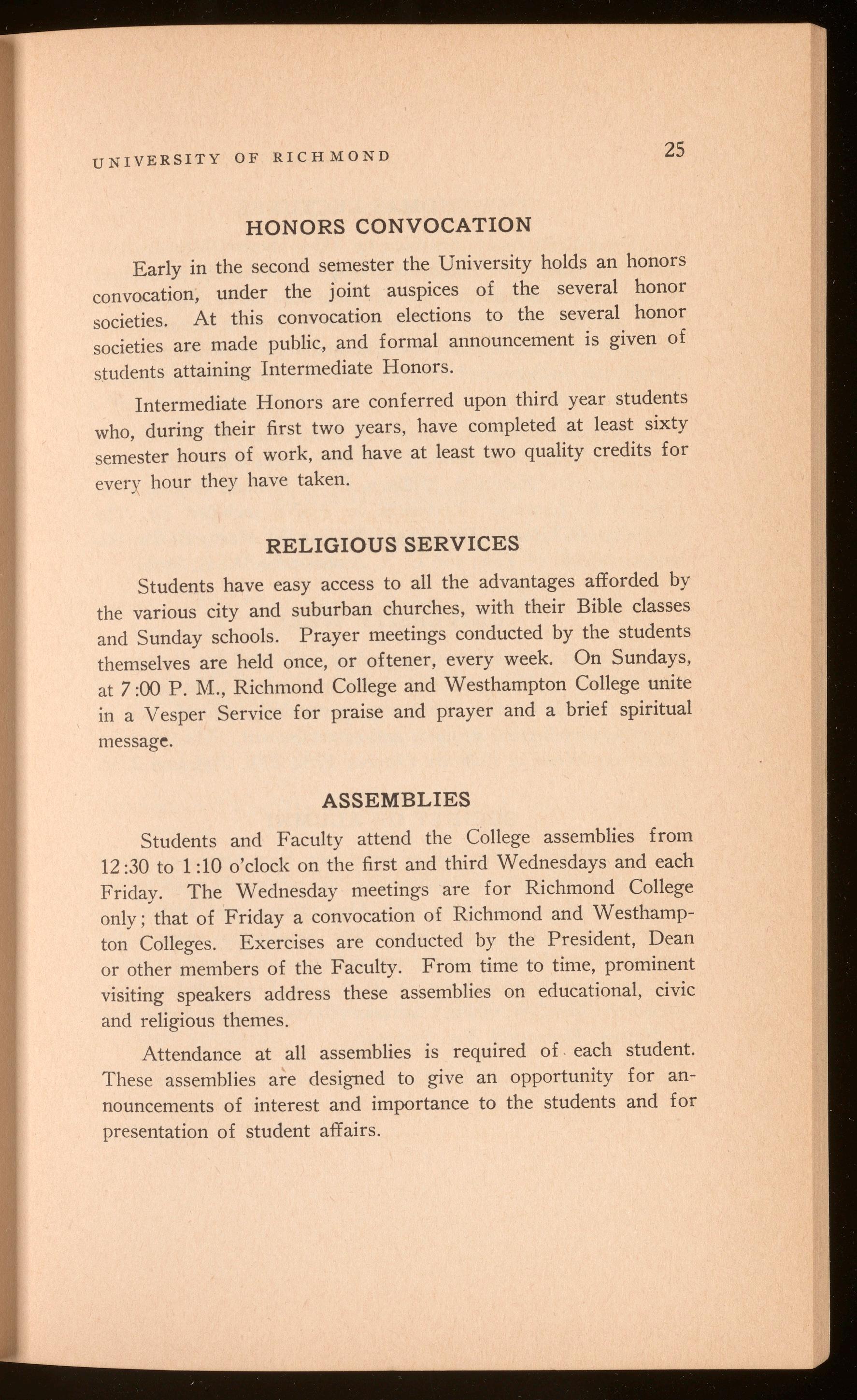
Early in the second semester the University holds an honors convocation, under the joint auspices of the several honor societies. At this convocation elections to the several honor societies are made public, and formal announcement is given of students attaining Intermediate Honors.
Intermediate Honors are conferred upon third year students who, during their first two years, have completed at least sixty semester hours of work, and have at least two quality credits for everx hour they have taken.
Students have easy access to all the advantages afforded by the various city and suburban churches, with their Bible classes and Sunday schools. Prayer meetings conducted by the students themselves are held once, or oftener, every week. On Sundays, at 7 :00 P. M., Richmond College and Westhampton College unite in a Vesper Service for praise and prayer and a brief spiritual message.
Students and Faculty attend the College assemblies from 12 :30 to 1 :10 o'clock on the first and third Wednesdays and each Friday. The Wednesday meetings are for Richmond College only; that of Friday a convocation of Richmond and W esthampton Colleges. Exercises are conducted by the President, Dean or other members of the Faculty. From time to time, prominent visiting speakers address these assemblies on educational, civic and religious themes.
Attendance at all assemblies is required of each student. These assemblies are designed to give an opportunity for announcements of interest and importance to the students and for presentation of student affairs.

UNIVERSITY OF RICHMOND
These Lectures are provided by "The Thomas Museum Lecture Endowment" of $11,000 donated by his family in memory of the late President of the Corporation, James Thomas, Jr. They are delivered annually by eminent men on science, philosophy, art or literature and are open to the public without charge. Among the distinguished scholars who have delivered lectures on this foundation are :
President Woodrow Wilson, Sir Robert Ball, Dr. Henry Van Dyke, Dr. B. L. Gildersleeve, Dr. Walter Hines Page, Dr. George E. Vincent, Dr. Robert A. Millikan, Dr. J. Holland Rose and Dr. Stephen B. Leacock. Lecturers in 1937-8 included Dr. The Svedburg, of Upsala; Dr. Dumas Malone, of Harvard; Dr. Allardyce Nicoll, of Yale, and U. S. Ambassador W. E. Dodd.
University Week was organized in 1927, and has become an annual event. The object of University Vleek is to bring to the campus friends of the University, particularly alumni, and to offer them intellectual stimt!lus and entertainment. The dates for University Week in 1938 are October 19th, 20th, 21st, and 22nd.
The alumni of the College have long been organized into a society, which holds annual meetings to renew old associations, maintain a close connection with Alma Mater, and further the cause of education and letters. The association engages the services of an alumni secretary and publishes an alumni magazine. The officers of the society are: W. B. F. Cole, Fredericksburg, Va., President; Thos. W. Ozlin, Chairman Alumni Council, and Joseph E. Nettles, Richmond, Va., Secretary.
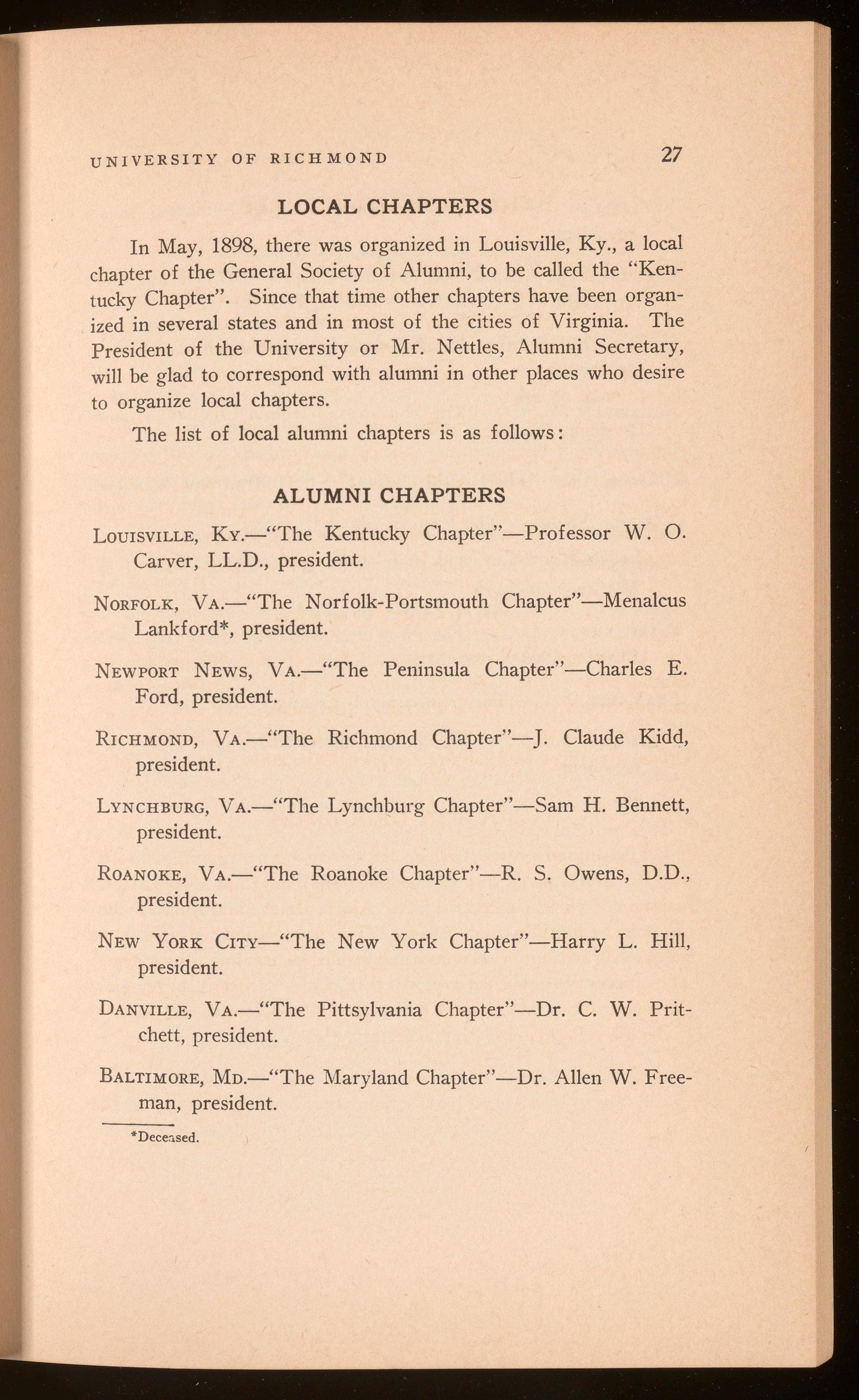
In May, 1898, there was organized in Louisville, Ky., a local chapter of the General Society of Alumni, to be called the "Kentucky Chapter". Since that time other chapters have been organized in several states and in most of the cities of Virginia. The President of the University or Mr. Nettles, Alumni Secretary, will be glad to correspond with alumni in other places who desire to organize local chapters.
The list of local alumni chapters is as follows:
Lou1svILLE, KY.-"The Kentucky Chapter"-Professor W. 0. Carver, LL.D., president.
NORFOLK,VA.-"The Norfolk-Portsmouth Chapter"-Menalcus Lankford*, president.
NEWPORTNEws, VA.-"The Peninsula Chapter"-Charles E. Ford, president.
RICHMOND,VA.-"The Richmond Chapter"-J. Claude Kidd, president.
LYNCHBURG,VA.-"The Lynchburg Chapter"-Sam H. Bennett, president.
ROANOKE,VA.-"The Roanoke Chapter"-R. S. Owens, D.D., president.
NEW YORK CITY-"The New York Chapter"-Harry L. Hill, president.
DANVILLE,VA.-"The Pittsylvania Chapter"-Dr. C. W. Pritchett, president.
BALTIMORE,MD.-"The Maryland Chapter"-Dr. Allen W. Freeman, president.
*Decec.sed.

PETERSBURG,V A.-"The Petersburg Chapter"-Harry Snead, president.
BIRMINGHAM,ALA.-"The Alabama Chapter"-B. W. Lacy, Jr., president.
TAMPA, FLA.-"The Florida Chapter''-Giddings E. Mabry, president.
BLUEFIELD,vV.VA.-"The Southwest Virginia Chapter"-James S. Kahle, president.
BRISTOL,VA.-"The Bristol Chapter"-S. T. Bowman, president.
EASTERNSHORE-''The Eastern Shore Chapter"-
MARTINSVILLE,VA.-"The Patrick Henry Chapter"-Dr. J. P. McCabe, president.
WASHINGTON,D.C.-"The Washington Chapter"-Percy Scott Flippin, Ph.D., president.
FRANKLIN, VA.-"The Southampton County Chapter"-
PIEDMONT,VA.-"The Piedmont Chapter"-Burnett Miller, Jr., president.
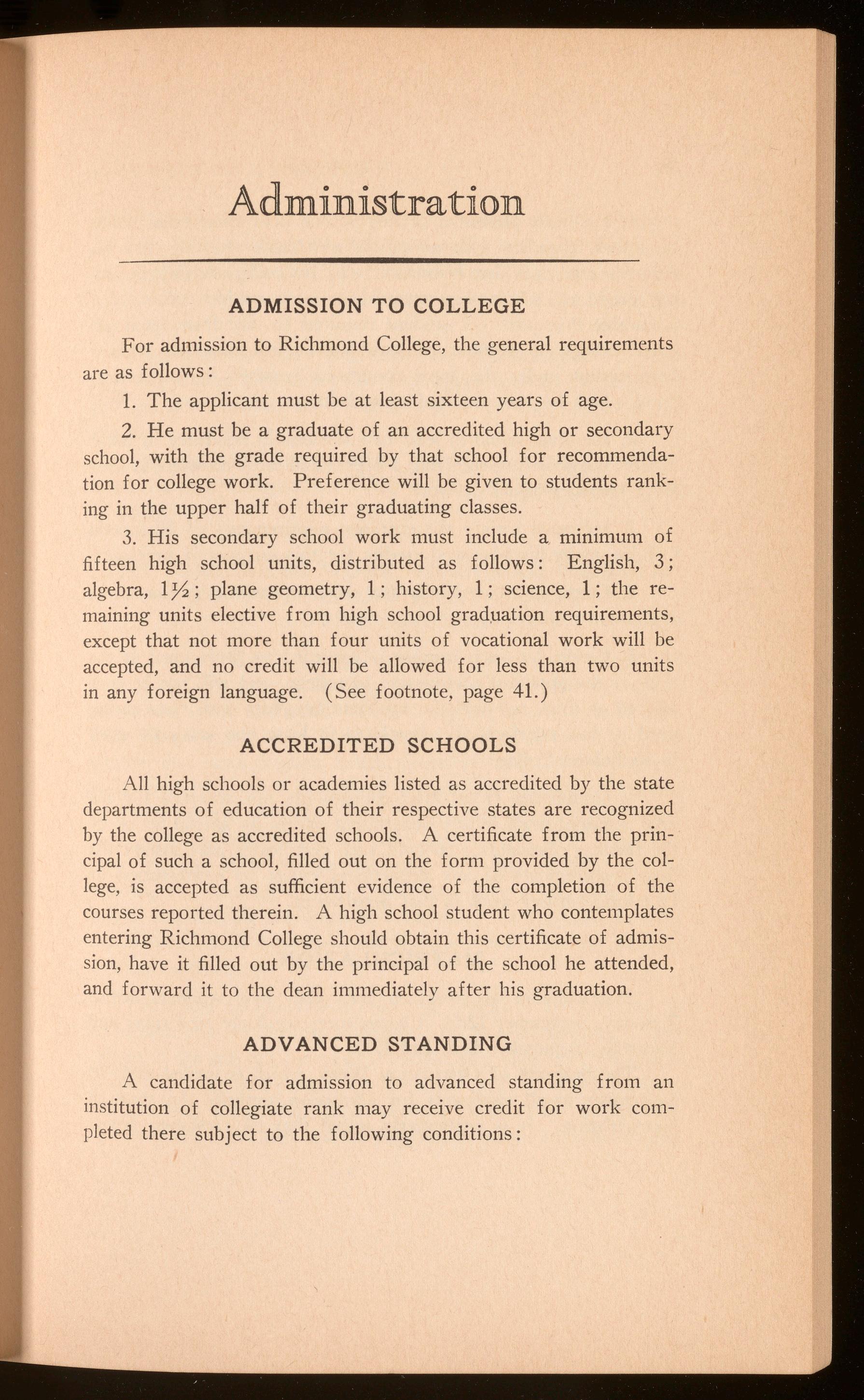
For admission to Richmond College, the general requirements are as follows :
1. The applicant must be at least sixteen years of age.
2. He must be a graduate of an accredited high or secondary school, with the grade required by that school for recommendation for college work. Preference will be given to students ranking in the upper half of their graduating classes.
3. His secondary school work must include a minimum of fifteen high school units, distributed as follows : English, 3 ; algebra, 1¼ ; plane geometry, 1 ; history, 1; science, 1; the remaining units elective from high school grad .nation requirements, except that not more than four units of vocational work will be accepted, and no credit will be allowed for less than two units in any foreign language. ( See footnote, page 41.)
All high schools or academies listed as accredited by the state departments of education of their respective states are recognized by the college as accredited schools. A certificate from the principal of such a school, filled out on the form provided by the college, is accepted as sufficient evidence of the completion of the courses reported therein. A high school student who contemplates entering Richmond College should obtain this certificate of admission, have it filled out by the principal of the school he attended, and forward it to the dean immediately after his graduation.
A candidate for admission to advanced standing from an institution of collegiate rank may receive credit for work completed there subject to the following conditions:
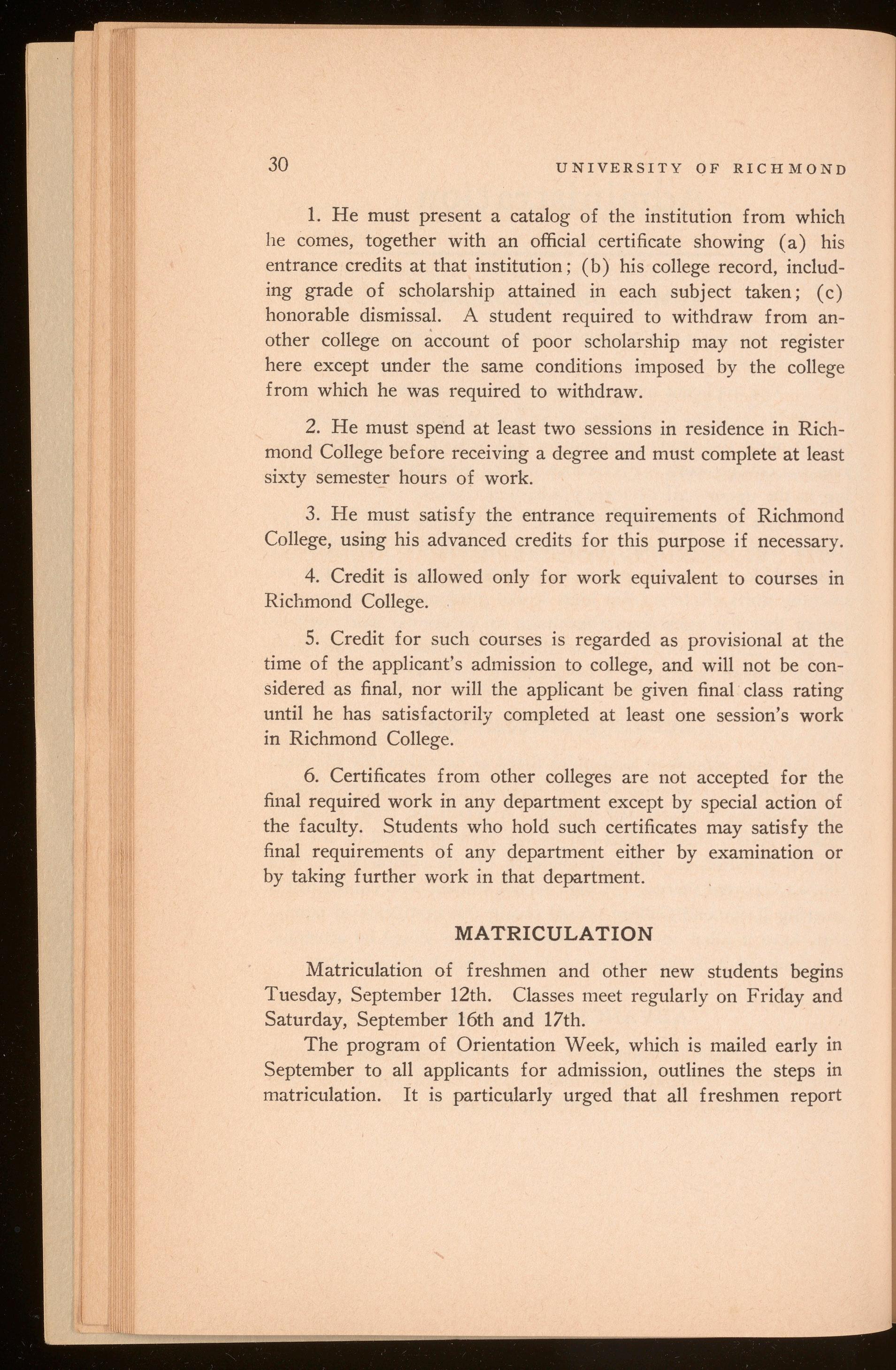
1. He must present a catalog of the institution from which he comes, together with an official certificate showing (a) his entrance credits at that institution; (b) his college record, including grade of scholarship attained in each subject taken; ( c) honorable dismissal. A student required to withdraw from another college on account of poor scholarship may not register here except under the same conditions imposed by the college from which he was required to withdraw.
2. He must spend at least two sessions in residence in Richmond College before receiving a degree and must complete at least sixty semester hours of work.
3. He must satisfy the entrance requirements of Richmond College, using his advanced credits for this purpose if necessary .
4. Credit is allowed only for work equivalent to courses in Richmond College.
5. Credit for such courses is regarded as provisional at the time of the applicant's admission to college, and will not be considered as final, nor will the applicant be given final class rating until he has satisfactorily completed at least one session's work in Richmond College.
6. Certificates from other colleges are not accepted for the final required work in any department except by special action of the faculty. Students who hold such certificates may satisfy the final requirements of any department either by examination or by taking further work in that department.
Matriculation of freshmen and other new students begins Tuesday, September 12th. Classes meet regularly on Friday and Saturday, September 16th and 17th.
The program of Orientation Week, which is mailed early in September to all applicants for admission, outlines the steps in matriculation. It is particularly urged that all freshmen report
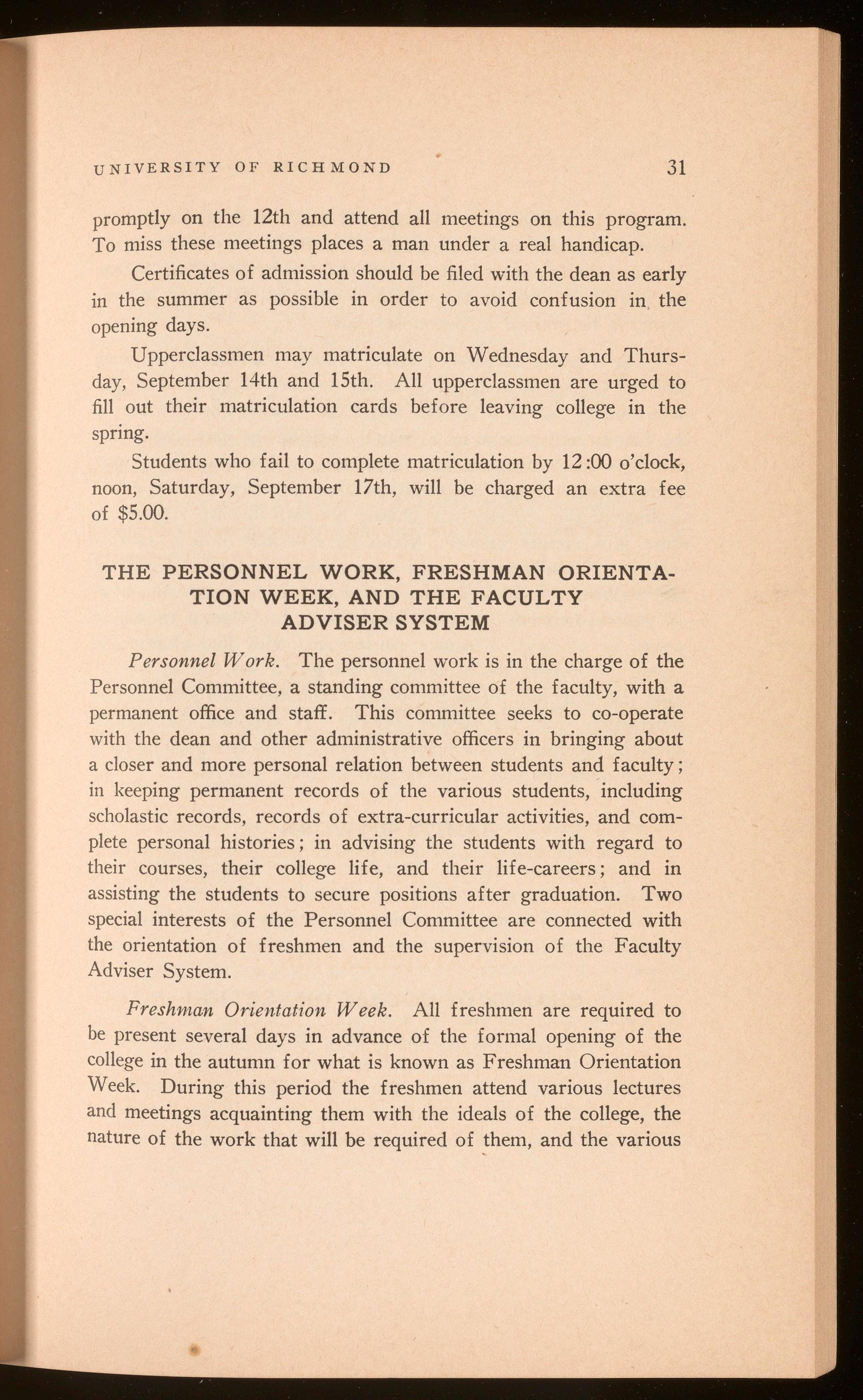
promptly on the 12th and attend all meetings on this program. To miss these meetings places a man under a real handicap.
Certificates of admission should be filed with the dean as early in the summer as possible in order to avoid confusion in . the opening days.
Upperclassmen may matriculate on Wednesday and Thursday, September 14th and 15th. All upperclassmen are urged to fill out their matriculation cards before leaving college in the spring.
Students who fail to complete matriculation by 12 :00 o'clock, noon, Saturday, September 17th, will be charged an extra fee of $5.00.
Personnel Work. The personnel work is in the charge of the Personnel Committee, a standing committee of the faculty, with a permanent office and staff. This committee seeks to co-operate with the dean and other administrative officers in bringing about a closer and more personal relation between students and faculty; in keeping permanent records of the various students, -including scholastic records, records of extra-curricular activities, and complete personal histories; in advising the students with regard to their courses, their college life, and their life-careers; and in assisting the students to secure positions after graduation. Two special interests of the Personnel Committee are connected with the orientation of freshmen and the supervision of the Faculty Adviser System.
Freshman Orientation Week. All freshmen are required to be present several days in advance of the formal opening of the college in the autumn for what is known as Freshman Orientation Week. During this period the freshmen attend various lectures and meetings acquainting them with the ideals of the college, the nature of the work that will be required of Jhem, and the various

activities of college life. The faculty and many of the leading students take part in this program. The freshman class is organized, and the freshmen begin to feel at home in the college before the arrival of most of the student body. All freshmen are required to be present on September 12th.
The Faculty Adviser Syste111,. Every student on entrance into the College is assigned a faculty member as his adviser, the object being that each student may have at least one member of the faculty with whom, on a friendly footing, he may discuss his problems, both personal and scholastic, and may receive such advice as may enable him to adjust himself better to college life. Ordinarily the student may choose his own faculty adviser, if there is a faculty member whom he especially desires in this capacity. Usually he keeps the same adviser during his freshman and sophomore years. In the junior and senior years the head of the department in which the student has chosen to major serves as adviser. Frequent conferences with the adviser are urged. Normally the student should go to see his adviser at least one a month. The Personnel Committee exercises general supervision over the adviser system. It appoints the faculty advisers, receives regular reports from the advisers regarding their advisee students, and keeps records of these reports.
A student is required to take at least fourteen hours of scholastic work a week and is not allowed to take more than six classes totaling twenty hours a week, except upon special permission from the dean.
A student desiring to make a change in his course of study or class sections should first consult his adviser or major professor and secure from him a change slip to be submitted to the dean for approval. No student is permitted to add or drop a study or change his section without the approval of the dean.

No change in a course of study will be permitted later than one week from the opening date of the semester, except in unusual cases recommended by the dean. For any course dropped after the first week of the semester, the grade F will be recorded. This will not be done, however, if the course is dropped on the advice of the dean.
1. Each faculty member shall notify the dean as soon as a student has four unexcused a,bsenccs in a class.
2. A student shall be excluded from a class immediately upon getting five unexcused absences, and the dean be notified of this action at once.
3. The dean shall accept only those excuses for illness which have been signed by a physician, parent, or officer of a roommg house designated by the clean.
4. Excuses for illness must be presented to the dean within one week after the last clay of illness, and to the professor within two clays after the dean has issued the excuse. If the student fails to present an excuse within these limits, the absences shall be counted as unexcused.
5. An absence from a class or laboratory period the last meeting before or the first meeting after a holiday shall be counted as two absences.
6. The members of each team or group of students shall be ~xcused from classes while away representing the college, provided the trips of any one team or group do not necessitate its members' being away from college for a total of more than seven days. At least one day prior to the departure of any group or team a list of the men composing it must be presented to the dean.
7. No credit will be given for a course in which the class meets three hours a week if the student has more than four unexcused absences. In classes meeting fewer than three times a

week unexcused absences must not exceed the number of class meetings per week.
8. Students are warned not to be absent from class except in cases of emergency. A student who absents himself for trivial reasons in the early part of the semester may have emergencies later which will cause him to lose credit for the course.
Reports are sent to parent or guardian four times a session: at mid-semester and in February and June. These include a record of the student's class and examination standing. with such other information as may be deemed important. Whenever it seems desirable, more frequent reports are sent. Prompt cooperation on the part of those to whom they are addressed will make these reports of real value in improving a student's work.
The standing of students in class work and in examinations is indicated as follows : the letter A indicates that the work has been excellent (95-100); B, that it has been very good (86-94); C, that it has been average ( 80-85) ; D, that it has been just passing, (75-79); E, that the work has been unsatisfactory (6574), and that a condition has been incurred; F indicates failure.
The relation of this grading system to the quality credits which must be earned for graduation is explained under the heading "Degrees", on page 40.
Besides frequent oral and written tests, there is held in every class a general written examination at the close of the first and second semesters. All examinations are limited to three hours, and recitations and lectures are suspended during the examination period. The valuation of the examination is combined with the average of the student's class standing for the semester.
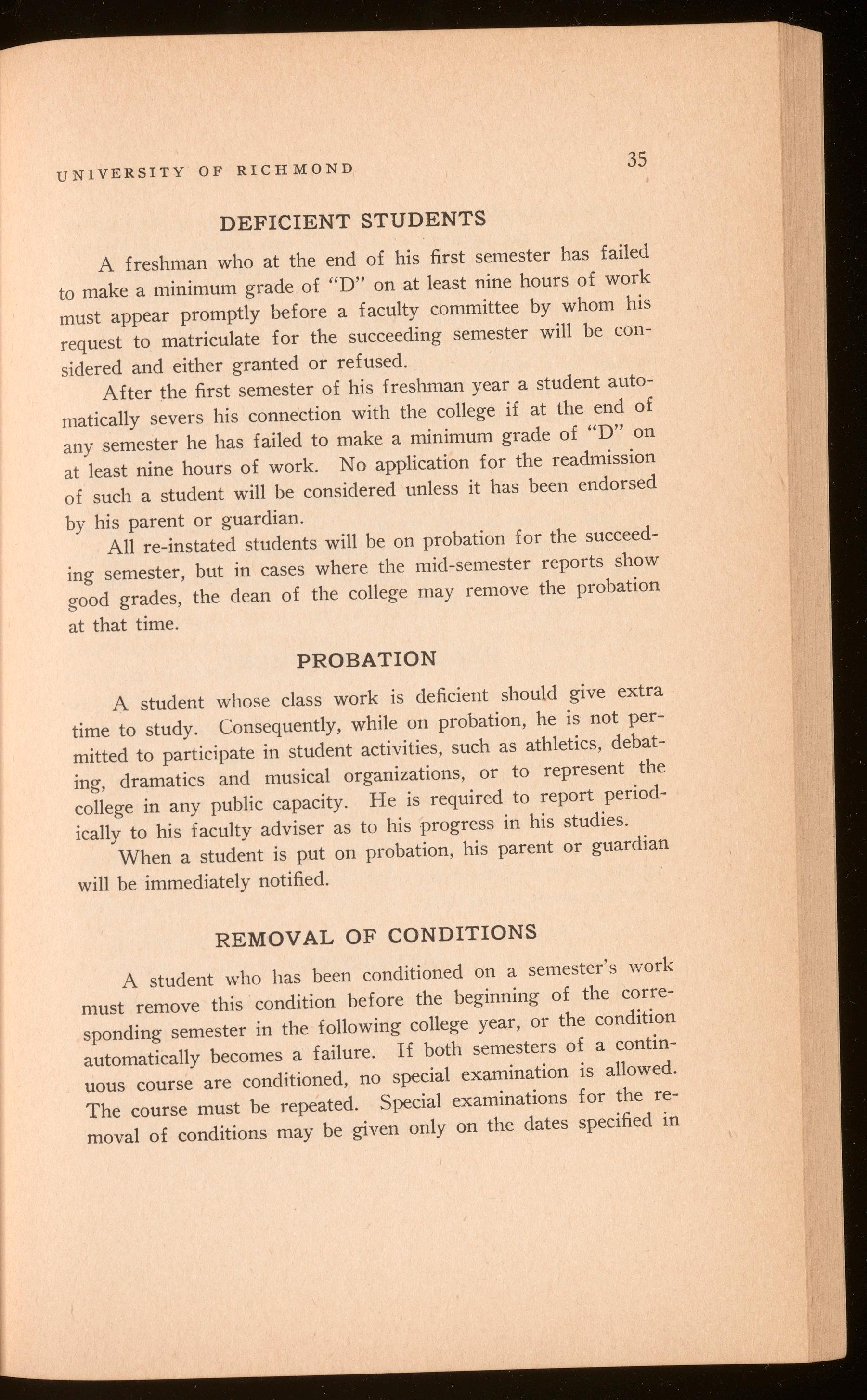
A freshman who at the end of his first semester has failed to make a minimum grade of "D" on at least nine hours of work must appear promptly before a faculty committee by whom his request to matriculate for the succeeding semester will be considered and either granted or refused.
After the first semester of his freshman year a student automatically severs his connection with the college if at the end of any semester he has failed to make a minimum grade of "D" on at least nine hours of work. No application for the readmission of such a student will be considered unless it has been endorsed by his parent or guardian.
All re-instated students will be on probation for the succeeding semester, but in cases where the mid-semester reports show good grades, the dean of the college may remove the probation at that time.
A student whose class work is deficient should give extra time to study. Consequently, while on probation, he is not permitted to participate in student activities, such as athletics, debating, dramatics and musical organizations, or to represent the college in any public capacity. He is required to report periodically to his faculty adviser as to his progress in his studies. When a student is put on probation, his parent or guardian will be immediately notified.
A student who has been conditioned on a semester's work must remove this condition before the beginning of the corresponding semester in the following college year, or the condition automatically becomes a failure. If both semesters of a continuous course are conditioned, no special examination is allowed. The course must be repeated. Special examinations for the removal of conditions may be given only on the dates specified in

the college calendar and upon authorization from the dean's office, preceded by the payment of a fee of two dollars. All arrange- ments for special examinations must be made at least two weeks before the date of the examination. A student is permitted only one special examination on any condition. Failure to pass this converts the condition into a failure. No quality credits may be earned by a special examination, but if it is successfully passed, full credit will be given in semester hours.
All seniors must make up all conditions of previous sessions by the end of the first semester. A senior may not make up by special examination a deficiency on more than one subject taken in the senior year, and this examination may not be given until the end of the second semester. If at the end of the first semester a senior has been conditioned on as many as two sub- jects, he cannot remain a member of the senior class without special action of the faculty.
Excellent provision is made for care of the health of all stu- dents resident on the campus. During Orientation Week a thorough physical examination by the university medical staff is required of all new students. Dormitory students receive the daily attention of the college physician and his assistants. Infirmary rooms are provided to which students are removed when- ever necessary. There is no extra charge for the use of infirmary rooms or for the attendance of the physician's assistants who look after the needs of the sick.
The president of the university has general oversight and control of athletics and is authorized to forbid any features in these exercises which endanger the health or morals of the par- ticipants.
The University holds membership in the Southern Athletic Conference, and all intercollegiate sports are subject to the rules

and regulations of the Conference. A committee of the faculty has charge of the enforcement of these regulations and also determinates the number of times any team may be absent from the campus.
Athletic teams are permitted to engage in contests away from Richmond only with teams of other institutions of learning.
The deportment of a Christian gentleman is the standard to which every student is expected to conform. All appropriate means are used to develop and confirm a sense of personal honor and sacred regard for truth, as upon these rests the best reliance for good conduct. A few plain and reasonable rules are prescribed, and each matriculate must pledge himself to obey them.
1. Occupants will be held responsible for the good order of their rooms and for any damage or defacement. Changes from one room to another may be allowed by the dean, but must not be niade without his consent.
2. If a student destroys, defaces, or in any way damages college property, or aids and abets others in so doing, he shall within twenty-four hours report the fact to the dean. Students will be charged pro rata for all damages not individually accounted for.
3. No club or society may be formed unless the faculty approves its plan and purpose, the rules by which it proposes to be governed, and the hours of meeting.
4. Students desiring to room and board elsewhere than on the college premises must first obtain the approval of the dean.
In the observance of these rules and in all matters not specifically mentioned, the deportment of a gentleman and a student is the standard to which every one is expected to conform. His sense of honor is the main reliance, and his word in matters touching his own conduct will be called for at the discretion of the dean or president. In matriculating students, the right is reserved to

require the immediate withdrawal from college of any student whenever the faculty decides that such action is desirable.
1. All first-year students who have met the entrance requirements, and all students who in previous sessions have made less than twenty-four hours, shall be classed as freshmen.
2. All students who in previous sessions have completed at least twenty-four hours of college work shall be classed as sophomores.
3. All student!! who in previous sessions have completed at least forty-eight hours of college work shall be classed as juniors.
4. All students who lack only one possible year's work for the completion of all degree requirements, and who matriculate for such required courses, shall be classed as seniors, subject to the following provision :
A student before admission to the senior class must have achieved at least ninety quality credits. A student transferring with advanced standing from another institution must average at least fifteen quality credits a semester while a student in Richmond College .
5. All students who are twenty-one years of age or older and who have not as many as fifteen entrance units, but who have given satisfactory evidence of fitness to pursue college studies, shall be classified as special students.
Students who expect to continue their studies in professional or graduate schools should, on entering college, seek the advice of the dean in the choice of courses that will meet the specific requirements of the institutions they intend to enter later.
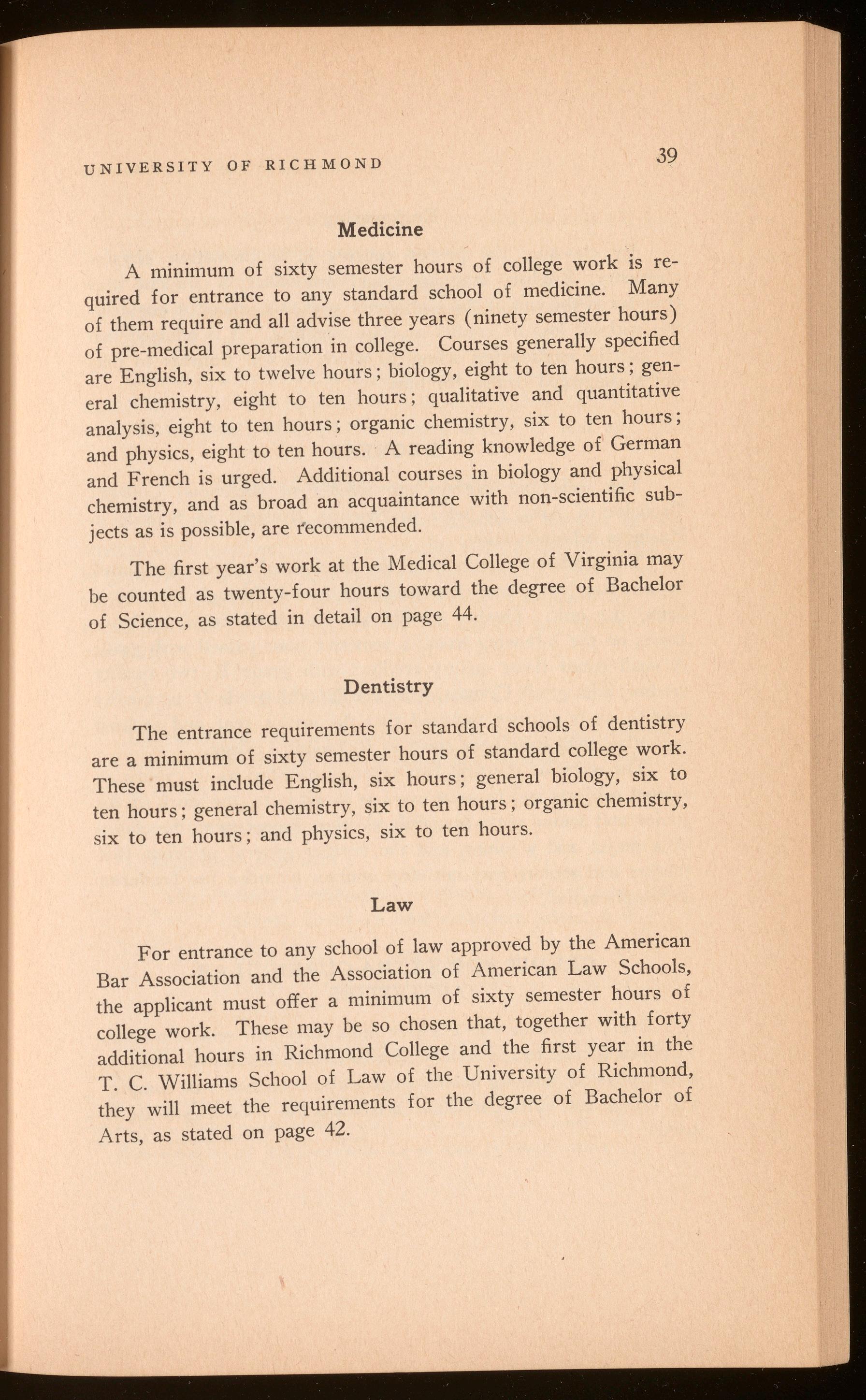
A minimum of sixty semester hours of college work is required for entrance to any standard school of medicine. Many of them require and all advise three years ( ninety semester hours) of pre-medical preparation in college. Courses generally specified are English, six to twelve hours; biology, eight to ten hours; general chemistry, eight to ten hours; qualitative and quantitative analysis, eight to ten hours; organic chemistry, six to ten hours; and physics, eight to ten hours. A reading knowledge of German and French is urged . Additional courses in biology and physical chemistry, and as broad an acquaintance with non-scientific subjects as is possible, are t"ecommended.
The first year's work at the Medical College of Virginia may be counted as twenty-four hours toward the degree of Bachelor of Science, as stated in detail on page 44.
The entrance requirements for standard schools of dentistry are a minimum of sixty semester hours of standard college work. These must include English, six hours; general biology, six to ten hours; general chemistry, six to ten hours; organic chemistry, six to ten hours; and physics, six to ten hours.
For entrance to any school of law approved by the American Bar Association and the Association of American Law Schools, the applicant must offer a minimum of sixty semester hours of college work. These may be so chosen that, together with forty additional hours in Richmond College and the first year in the T. C. Williams School of Law of the University of Richmond, they will meet the requirements for the degree of Bachelor of Arts, as stated on page 42.

By choosing the proper courses in mathematics, physics, chemistry, English, languages, and economics, a student may transfer at the end of the sophomore year to a school of engineering without loss of credits or class standing. It is advised that he ask the engineering school to which he will transfer to map out a suggested course for him.
The following degrees are offered in Richmond College: Bachelor of Arts, Bachelor of Science, Bachelor of Science in Business Administration.
The academic requirements for the several degrees are stated in semester hours, one class period per week through a semester being the unit. Quality credits are calculated from academic hours on the following basis : a semester hour passed with grade A shall count three quality credits; with grade B, two quality credits; with grade C, one quality credit; with grade D, no quality credit. It is further required that the senior year and at least one other shall have been spent in Richmond College.
The work of the first two years is specified as to groups of related subjects and in some cases as to subjects; the work of the junior and senior years is mainly elective, except as to the choice of a major and a minor, and the further general principle that juniors and seniors may not elect courses intended for freshmen and sophomores.
Every candidate for a degree must offer two semester hours in physical training. He may also offer two additional hours in either physical training or extra-curricular activities. In computing credit for extra-curricular activities, the following scale is used:
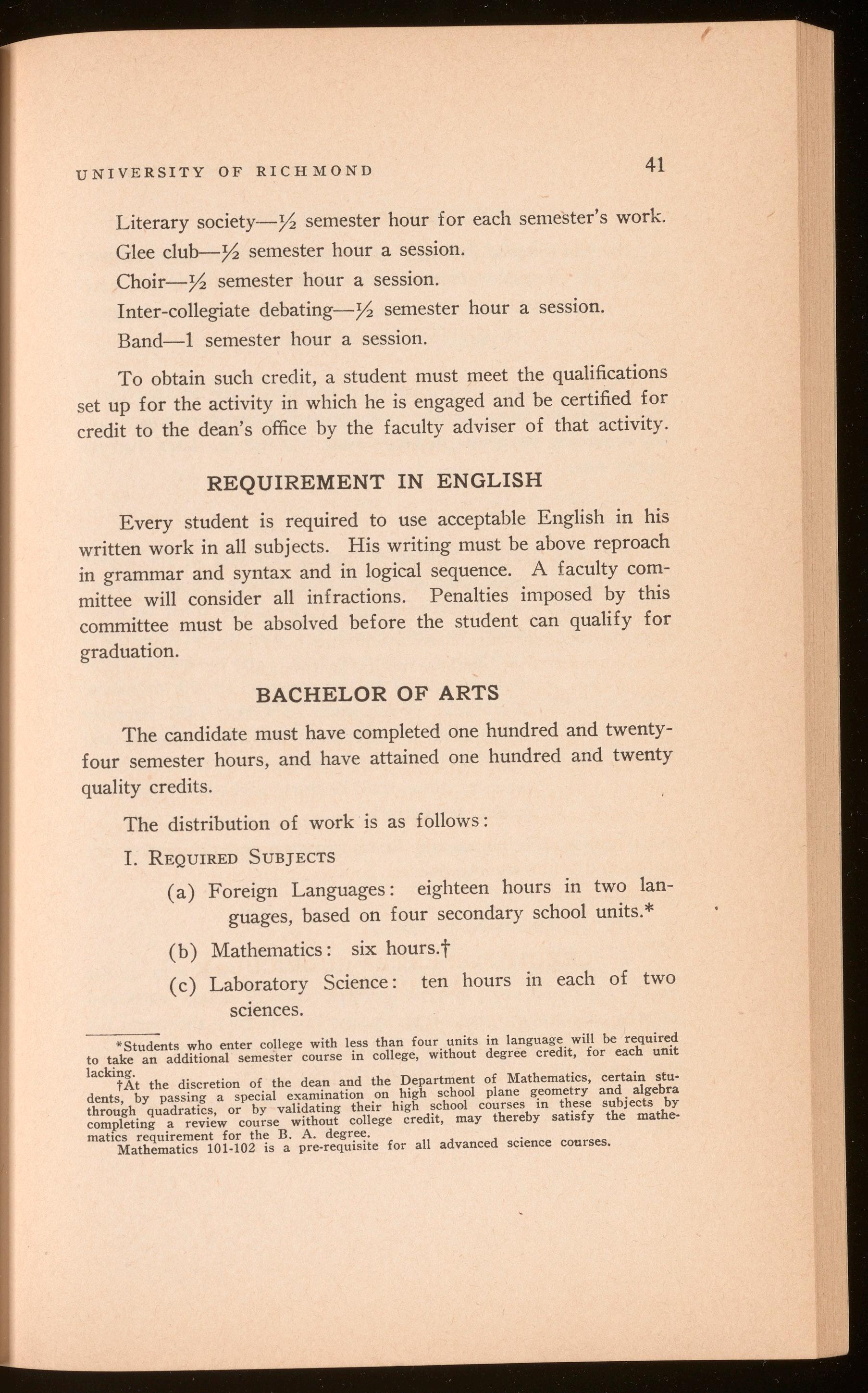
Literary society-¼ semester hour for each semester's work.
Glee club-¼ semester hour a session.
Choir-¼ semester hour a session.
Inter-collegiate debating-¼ semester hour a session.
Band-I semester hour a session.
To obtain such credit, a student must meet the qualifications set up for the activity in which he is engaged and be certified for credit to the dean's office by the faculty adviser of that activity.
Every student is required to use acceptable English in his written work in all subjects. His writing must be above reproach in grammar and syntax and in logical sequence. A faculty committee will consider all infractions. Penalties imposed by this committee must be absolved before the student can qualify for graduation.
The candidate must have completed one hundred and twentyfour semester hours, and have attained one hundred and twenty quality credits.
The distribution of work 1s as follows :
(a) Foreign Languages: eighteen hours in two languages, based on four secondary school units.*
(b) Mathematics: six hours.t
(
c) Laboratory Science : ten hours in each of two sciences.
*Students who enter college with less than four units in language will be required to take an additional semester course in college, without degree credit, for each unit lacking.
t At the discretion of the dean and the Department of Mathematics, certain stu• dents, by passing a special examination on high school plane geometry and algebra through quadratics, or by validating their high school courses in th ese subjects by completing a review course without college credit, may thereby satisfy the mathematics requirement for the B. A. degree. Mathematics 101-102 is a pre-requisite for all advanced science courses.
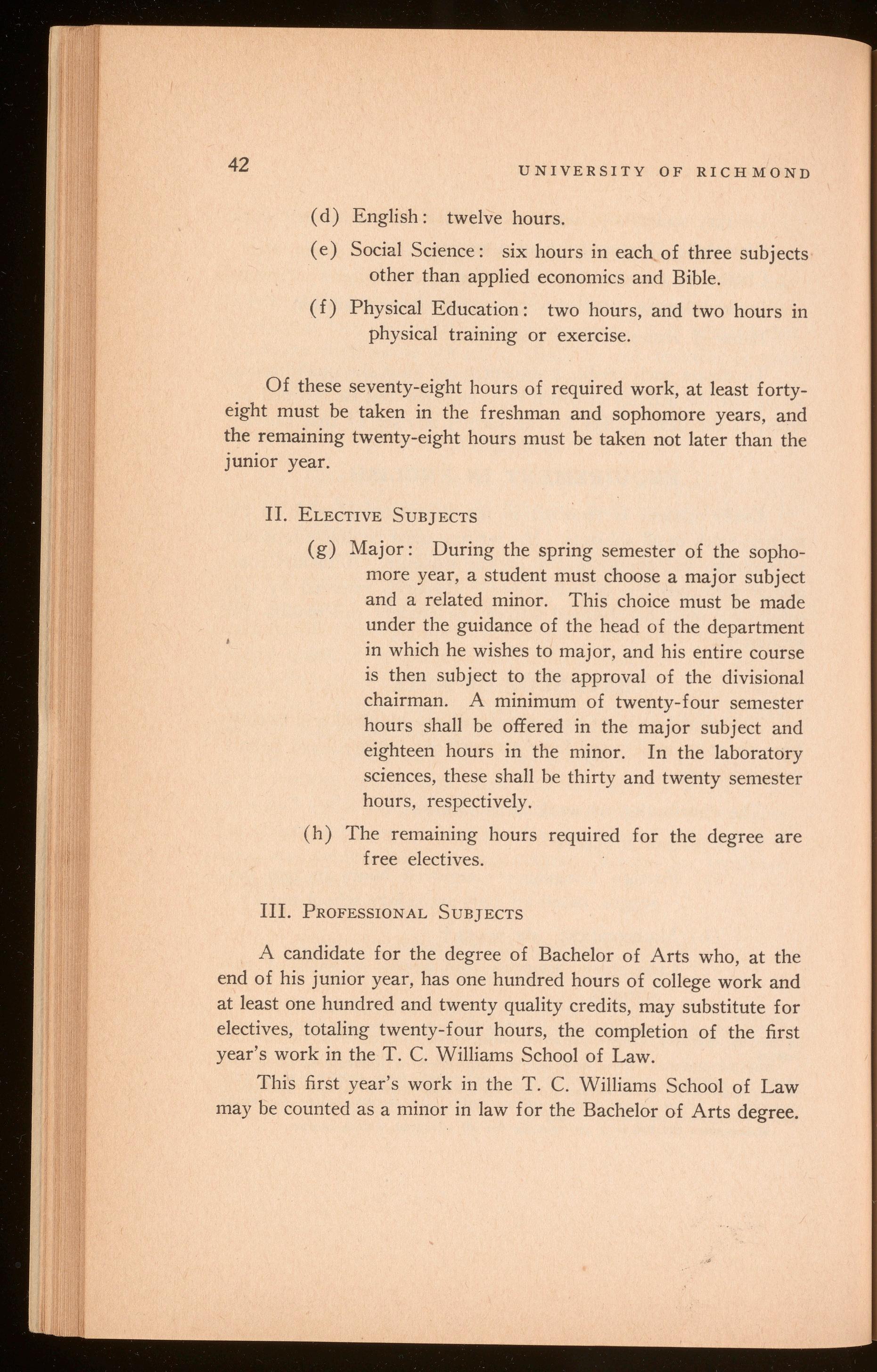
( d) English : twelve hours.
( e) Social Science: six hours in each of three subjects other than applied economics and Bible.
(£) Physical Education: two hours, and two hours in physical training or exercise.
Of these seventy-eight hours of required work, at least fortyeight must be taken in the freshman and sophomore years, and the remaining twenty-eight hours must be taken not later than the Junior year.
(g) Major: During the spring semester of the sophomore year, a student must choose a major subject and a related minor. This choice must be made under the guidance of the head of the department in which he wishes to major, and his entire course is then subject to the approval of the divisional chairman. A minimum of twenty-four semester hours shall be offered in the major subject and eighteen hours in the minor. In the laboratory sciences, these shall be thirty and twenty semester hours, respectively.
(h) The remaining hours required for the degree are free electives.
A candidate for the degree of Bachelor of Arts who, at the end of his junior year, has one hundred hours of college work and at least one hundred and twenty quality credits, may substitute for electives, totaling twenty-four hours, the completion of the first year's work in the T. C. Williams School of Law. This first year's work in the T. C. Williams School of Law may be counted as a minor in law for the Bachelor of Arts degree.
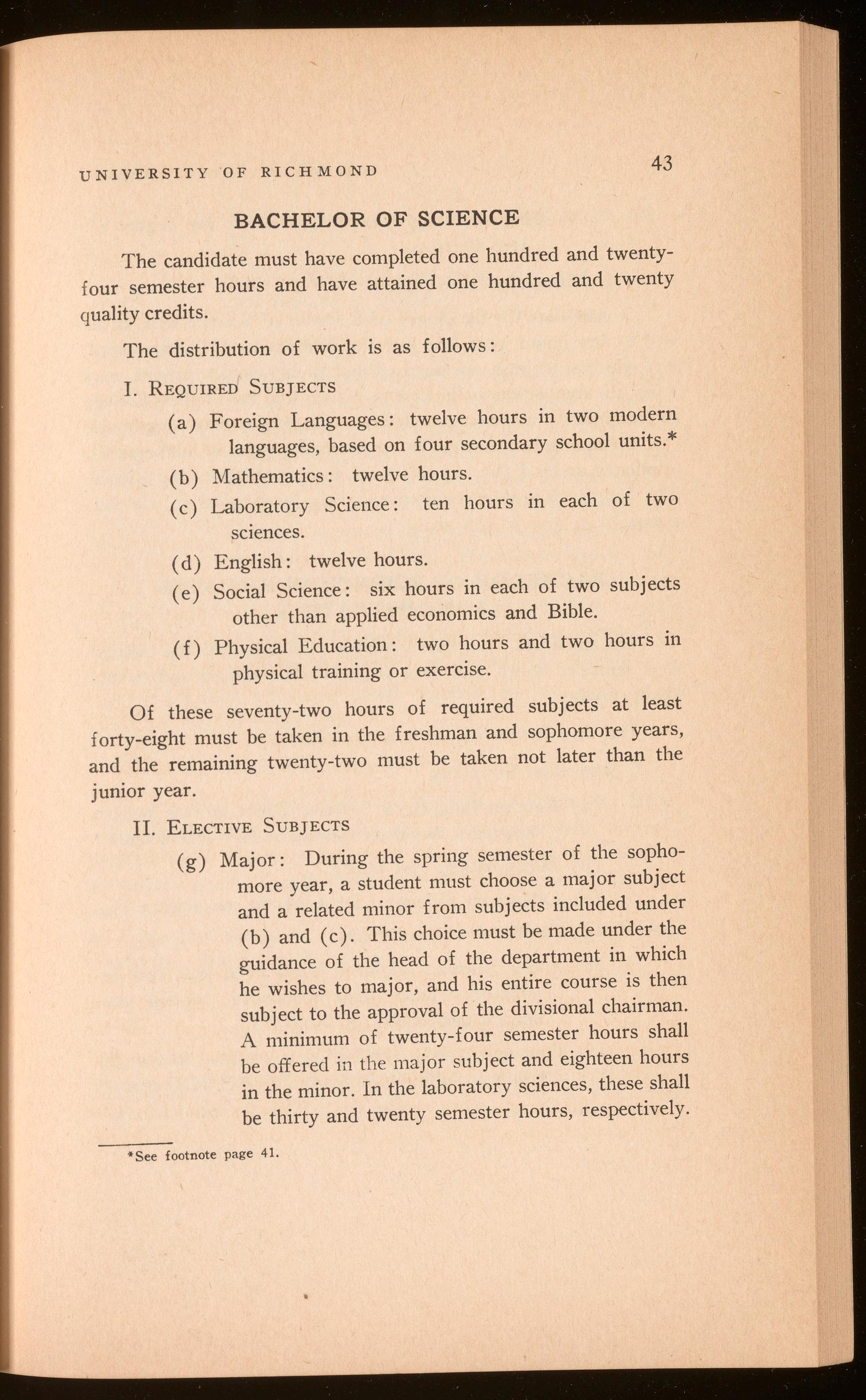
The candidate must have completed one hundred and twentyfour semester hours and have attained one hundred and twenty quality credits.
The distribution of work is as follows:
I. REQUIRED SUBJECTS
(a) Foreign Languages: twelve hours in two modern languages, based on four secondary school units.*
(b) Mathematics: twelve hours.
(
c) Laboratory Science: ten hours in each of two sciences.
(
(
d) English: twelve hours.
e) Social Science: six hours in each of two subjects other than applied economics and Bible.
(
f) Physical Education : two hours and two hours in physical training or exercise.
Of these seventy-two hours of required subjects at least forty-eight must be taken in the freshman and sophomore years, and the remaining twenty-two must be taken not later than the junior year.
II. ELECTIVE SUBJECTS
(g) Major:
During the spring semester of the sophomore year, a student must choose a major subject and a related minor from subjects included under ( b) and ( c) . This choice must be made under the guidance of the head of the department in which he wishes to major, and his entire course is then subject to the approval of the divisional chairman. A minimum of twenty-four semester hours shall be offered in the major subject and eighteen hours in the minor. In the laboratory sciences, these shall be thirty and twenty semester hours, respectively.
• See footnote page 41.

(h) The remaining hours required for the degree are free electives.
A candidate for the degree of Bachelor of Science who, at the end of his junior year, has one hundred hours of college work, and who has at least one hundred and twenty quality credits, may count the completion of the first year's work in the Medical College of Virginia for a minor and electives, totalling twenty-four hours. He may substitute for the second year's work in mathematics, stipulated under I (b), a year's work in a third laboratory science. The foreign language requirements may be satisfied in one language.
The candidate must have completed one hundred and twentyfour semester hours, and have attained one hundred and twenty quality credits.
The distribution of work is as follows:
(a) Foreign Languages: twelve hours in two modern languages, based on four secondary school units.*
(b) Mathematics : six hours.
( c) Laboratory Science : ten hours in one science.
( d) English: twelve hours.
( e) Social Science : eighteen hours in at least two departments other than economics, applied economics and Bible.
( f) Economics and Applied Economics : forty-eight hours, including Economics 201-202, Mathematics
* See footnote page 41.

203-204, Applied Economics 203-204, and 301302.
(g) Physical Education: two hours, and two in physical training or exercise.
(h) During the spring semester of the sophomore year, the student must choose a major subject from the Department of Economics and Applied Economics, which will complete the forty-eight hours listed under ( f). This choice must be made under the guidance of the head of the department, and his entire course is then subject to the approval of the divisional chairman. Possible majors for this degree include applied economics and economics. It is strongly recommended that a student majoring in applied economics specialize in accounting, banking and finance, or public administration.
( i) The remaining hours required for the degree are free electives.
A candidate for the degree of Bachelor of Science in Business Administration who, at the end of his junior year, has one hundred hours of college work, and who has at least one hundred and twenty quality credits, may count the completion of the first year's work in the T. C. Williams School of Law for eighteen of the unspecified hours in ( f) above and other electives, totalling twenty-four hours.
These curricula do not state the requirements of the various majors that may be offered for the several degrees. Students may find out the requirements of their majors by consulting the sections on their major departments under "Courses of Instruction"
BACHELOR OF ARTS

Freshman:
English 101-102
Science 101-102
Mathematics 101-102
Con. Civ. 101-102
Foreign Language ( offered for entrance) 103-104
Physical Education
Junior:
Major Subject
Minor Subject
Second Foreign Language 103-104
Social Science
Electives
Freshman:
English 101-102
Science 101-102
Mathematics 101-102
Con. Civ. 101-102
Sophomore:
English 203-204
Second Science 101-102 (or Chemistry 201-202)
Second Foreign Language 101-102
Social Science
Social Science
Physical Education
Senior:
Major Subject
Minor Subject (if necessary) Electives
BACHELOR OF SCIENCE
Sophomore:
English 203-204
Second Science 101-102 (or Chemistry 201-202)
Second Foreign Language 101-102
Foreign Language (offered for entrance) 103-104
Physical Education
Junior:
Major Subject
Minor Subject
Second Foreign Language 103-104
Social Science
Electives
Freshman:
Social Science
Mathematics 201-202
Physical Education
Senior:
Major Subject
Minor Subject (if necessary) Electives
BACHELOR OF SCIENCE IN BUSINESS ADMINISTRATION
English 101-102
Economics 101-102
Mathematics 101-102
Con. Civ. 101-102
Foreign Language ( offered for entrance) 103-104
Physical Education
Junior:
Applied Economics 301-302
Mathematics 203-204
Social Science
Social Science
Second Foreign Language 103-104
Major Subject
Sophomore:
English 203-204
Science 101-102
Second Foreign Language 101-102
Economics 201-202
Applied Economics 203-204
Physical Education
Senior:
Social Science
Electives
Major Subject
PRE-MEDICAL COURSE
Major in Science, Minor in Medicine, Leading to the Ba.chelor of Science Degree

Freshman:
English 101-102
Chemistry 201-202
Mathematics 101-102
Physics 101-102
Physical Education
Junior:
Science Major
Chemistry 305-306
German 103-104
Electives
Social Sciences
Freshman:
Sophomore:
English 203-204
Chemistry 303-304
German 101-102
Biology 101-102
Physical Education
Senior: Medicine
PRE-LAW COURSE
Major in Academic Subject, M-inor in Law, for the Bachelor of Arts Degree
English 101-102
Science 101-102
Mathematics 101-102
Con. Civ. 101-102
Foreign Language ( offered for entrance) 103-104
Physical Education
Junior:
Second Foreign Language 103-104
Major Completed
Social Science
Electives
1. RESIDENT STUDENTS
Sophomore:
English 203-204
Second Science 101-102 (or Chemistry 201-202)
Second Foreign Language 101-102
Social Science
Social Science
Physical Education
Senior: Law
The regular expenses of students residing in college dormitories, payable at the treasurer's office, which also include room and board, vary from $540 to $570 for the college session, September to June, and are divided as follows:

In making an estimate of
*Deduct this charge if no laboratory is taken.
2. NON-RESIDENT STUDENTS
Expenses of the College Session:
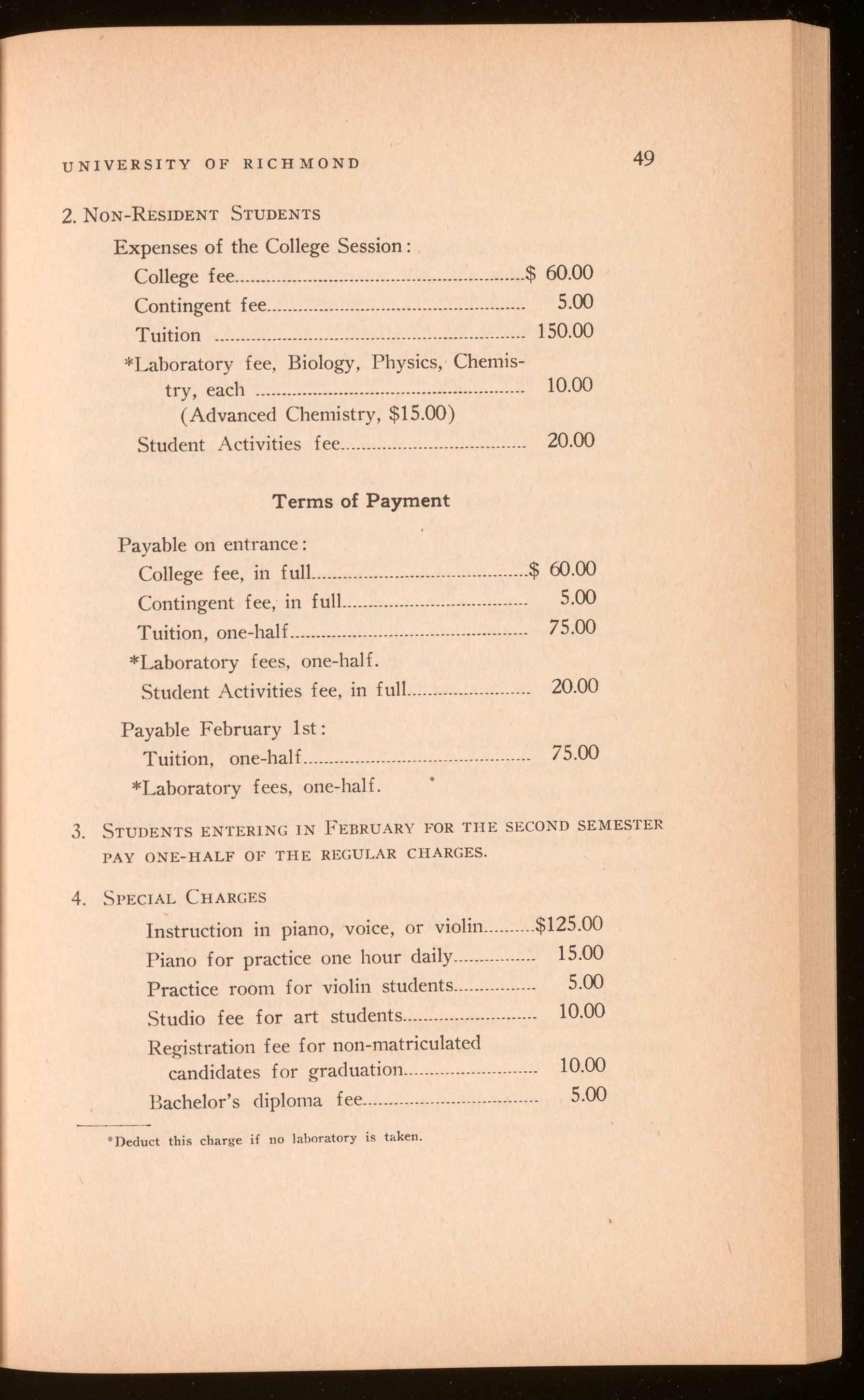
*Laboratory fee, Biology, Physics, Chemistry, each
(Advanced Chemistry, $15.00)
Payable on entrance:
one-half.
Payable February 1st:
*Laboratory fees, one-half.
3. STUDENTS ENTERING lN FEBRUARY FOR THE SECOND SEMESTER PAY ONE-HALF OF THE REGULAR CHARGES.
4. SPECIAL CHARGES
Instruction in piano, v01ce, or violin ..........$125.00 Piano for practice one hour daily ...._........... 15.00 Practice room for violin students ...._........... 5.00 Studio fee for art students _.......
Registration fee for non-matriculated candidates for graduation .........................
*Deduct this charge if no laboratory is taken. 10.00 5.00
Bachelor's diploma fee ...........
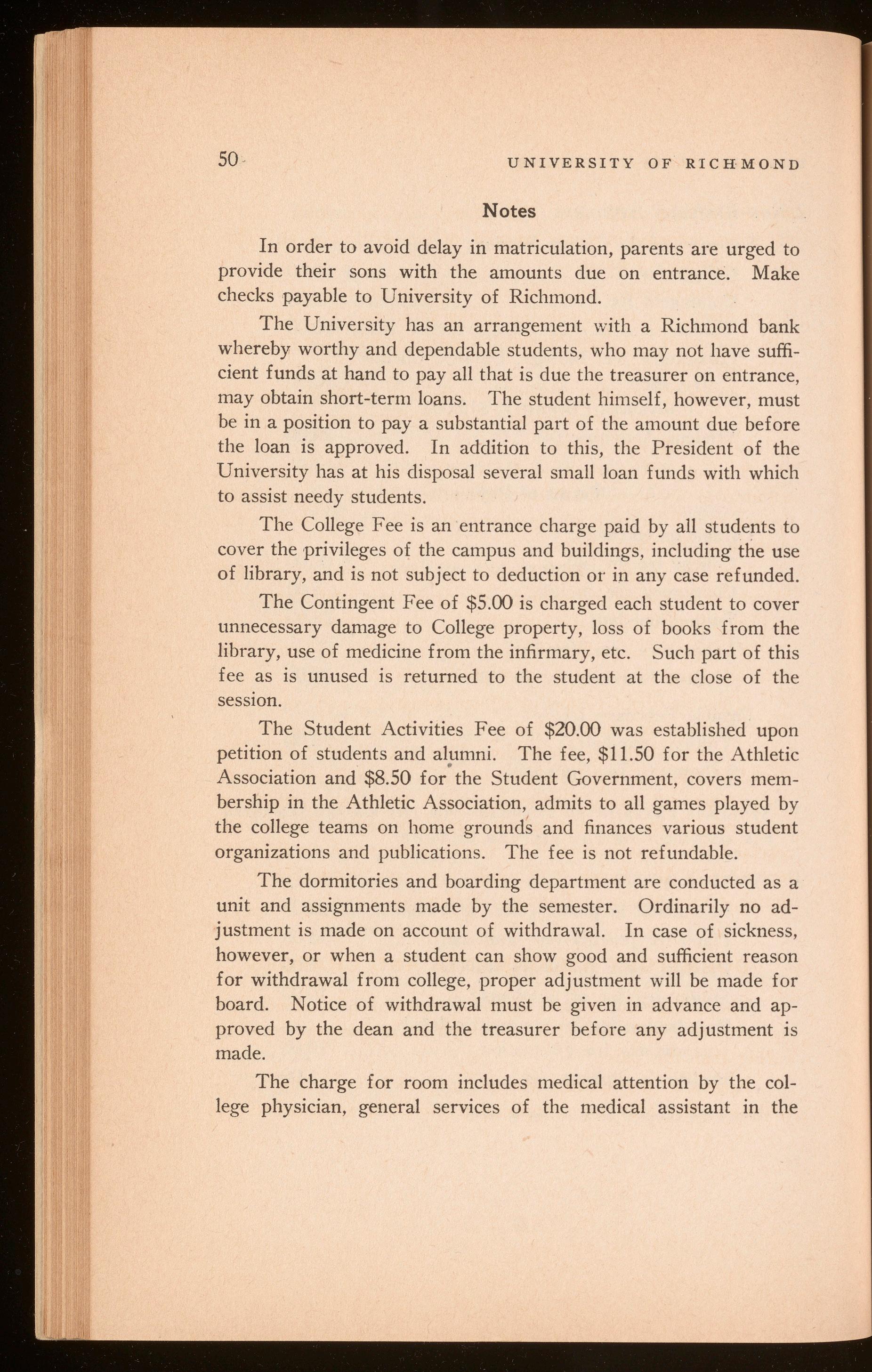
In order to avoid delay in matriculation, parents are urged to provide their sons with the amounts due on entrance. Make checks payable to University of Richmond.
The University has an arrangement \vith a Richmond bank whereby worthy and dependable students, who may not have sufficient funds at hand to pay all that is due the treasurer on entrance, may obtain short-term loans. The student himself, however, must be in a position to pay a substantial part of the amount due before the loan is approved. In addition to this, the President of the University has at his disposal several small loan funds with which to assist needy students.
The College Fee is an entrance charge paid by all students to cover the privileges of the campus and buildings, including the use of library, and is not subject to deduction or in any case refunded.
The Contingent Fee of $5.00 is charged each student to cover unnecessary damage to College property, loss of books from the library, use of medicine from the infirmary, etc. Such part of this fee as is unused is returned to the student at the close of the sess10n.
The Student Activities Fee of $20.00 was established upon petition of students and alumni. The fee, $11.50 for the Athletic Association and $8.50 for° the Student Government, covers membership in the Athletic Association, admits to all games played by the college teams on home grounds and finances various student organizations and publications. The fee is not refundable.
The dormitories and boarding department are conducted as a unit and assignments made by the semester. Ordinarily no adjustment is made on account of withdrawal. In case of sickness, however, or when a student can show good and sufficient reason for withdrawal from college, proper adjustment will be made for board. Notice of withdrawal must be given in advance and approved by the dean and the treasurer before any adjustment is made.
The charge for room includes medical attention by the college physician, general services of the medical assistant in the

dormitory, heat, light, etc. This charge does not cover cost of medicines, expense of a city hospital, or the services of any additional physician or nurse.
The dormitories, including the boarding department, will be closed during the Christmas and spring vacations. Students who wish to remain at college during the spring holiday are requested to confer with the dean.
The college supplies students' rooms with bedstead, mattress, dresser, chairs, and clothes closet. Each student provides his own bed furnishings and linens.
Students are matriculated for a full session. In the event of ' withdrawal on account of the student's sickness, proportionate deduction will be made in the charge for board, but not in other charges or for other causes.
Students are given until October 1st of the first semester and March 1st of the second semester to adjust their laboratory work and no refund is made for laboratory fees after these dates.
No diploma is granted or credit given for the session's work until all charges have been satisfactorily settled.
Ministers of the Gospel of all denominations, and young men duly approved by their churches as pre-ministerial students are admitted free of charge for tuition. They pay all other fees. The Board of Missions and Education of the Virginia Baptist General Association will render further assistance to worthy young men recommended by churches which contribute to the Board, and accepted after examination. For further information on this matter, address Mr. Frank T. Crump, Secretary, Education Committee, Grace-American Building, Richmond, Va.
The College dormitories open for reception of students Sunday evening, September 11th. Students are advised not to arrive earlier than this date.
Rooms in dormitories will be assigned in the order of application after May 1st. Application should be addressed to the
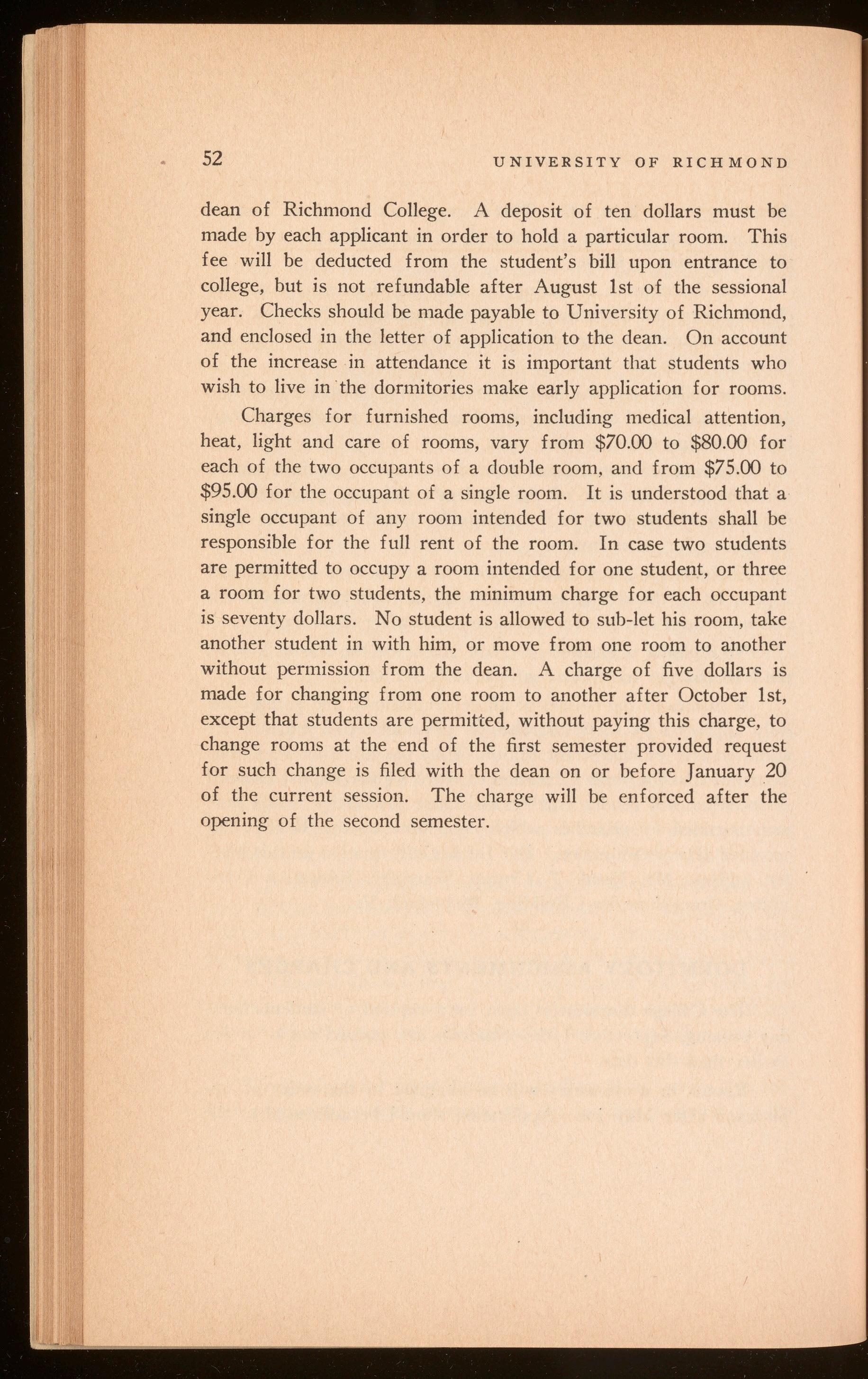
dean of Richmond College . A deposit of ten dollars must be made by each applicant in order to hold a particular room. This fee will be deducted from the student's bill upon entrance to college, but is not refundable after August 1st of the sessional year. Checks should be made payable to University of Richmond, and enclosed in the letter of application to the dean. On account of the increase in attendance it is important that students who wish to live in the dormitories make early application for rooms. Charges for furnished rooms, including medical attention, heat, light and care of rooms, vary from $70.00 to $80.00 for each of the two occupants of a double room, and from $75.00 to $95.00 for the occupant of a single room. It is understood that a single occupant of any room intended for two students shall be responsible for the full rent of the room. In case two students are permitted to occupy a room intended for one student, or three a room for two students, the minimum charge for each occupant is seventy dollars. No student is allowed to sub-let his room, take another student in with him, or move from one room to another without permission from the clean. A charge of five dollars is made for changing from one room to another after October 1st, except that students are permitted, without paying this charge, to change rooms at the encl of the first semester provided request for such change is filed with the dean on or before January 20 of the current session. The charge will be enforced after the opening of the second semester.
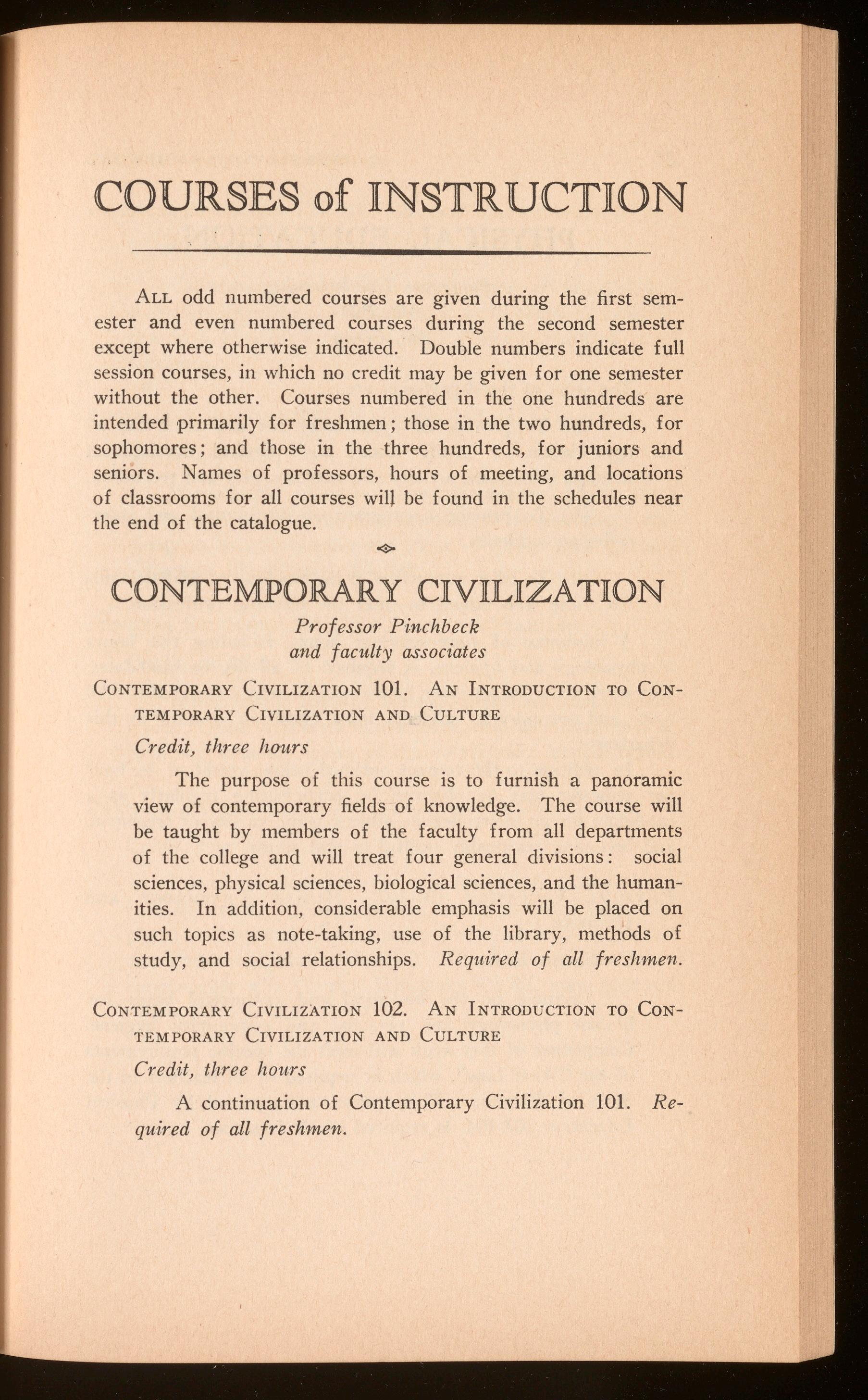
ALL odd numbered courses are given during the first seme ster and even numbered courses during the second semester except where otherwise indicated. · Double numbers indicate full session courses, in which no credit may be given for one semester without the other. Courses numbered in the one hundreds are intended primarily for freshmen; those in the two hundreds, for sophomores; and those in the three hundreds, for juniors and seniors. Names of professors, hours of meeting, and locations of classrooms for all courses will be found in the schedules near the end of the catalogue.
Professor Pinchbeck and farnlty associates
CONTEMPORARYCIVILIZATION101. AN INTRODUCTIONTO CONTEMPORARYCIVILIZATIONAND CULTURE
Credit , three hours
The purpose of this course is to furnish a panoramic view of contemporary fields of knowledge. The course will be taught by members of the faculty from all departments of the college and will treat four general divisions: social sciences, physical sciences, biological sciences, and the humanities. In addition , considerable emphasis will be placed on such topics as note-taking, use of the library, methods of study , and social relationships. Required of all freshmen
CONTEMPORARYCIVILIZATION102. AN INTRODUCTIONTO CONTEMPORARYCIVILIZATIONAND CULTURE
Credit, three hours
A continuation of Contemporary Civilization 101. Required of all freshmen.

Professor Thistlethwaite
Mr. Pitt
Mr. Crane
The aims of the department are:
(a) To provide an opportunity for and to create an appreciation of bodily health and physical development through wholesome activity and exercise, play and recreation
(b) To provide a program of intra-mural and intercollegiate athletics.
(
c) To offer instruction in the teaching of athletic skills for those who intend to enter the teaching profession.
A minimum of four semester hours, including two hours in physiology and hygiene, is required of all degree candidates. Not more than six semester hours may be taken for credit. All first-and second-year students must enroll in courses in this department.
In addition to the courses outlined below, credit of ¼ hour per semester may be obtained by participating regularly as a candidate for an intercollegiate athletic team, varsity or freshman, and becoming reasonably skillful in that sport.
PHYSICAL EDUCATION 101-102. HUMAN PHYSIOLOGY AND HYGIENE
Lectures on the biological and anatomical bases for human physiology and personal and community hygiene
Completion of this work will meet the specific requirements of the "West Law", which is required of all teachers in the State of Virginia. This course, accompanied by Physical Education 103-104, is required of all freshmen.
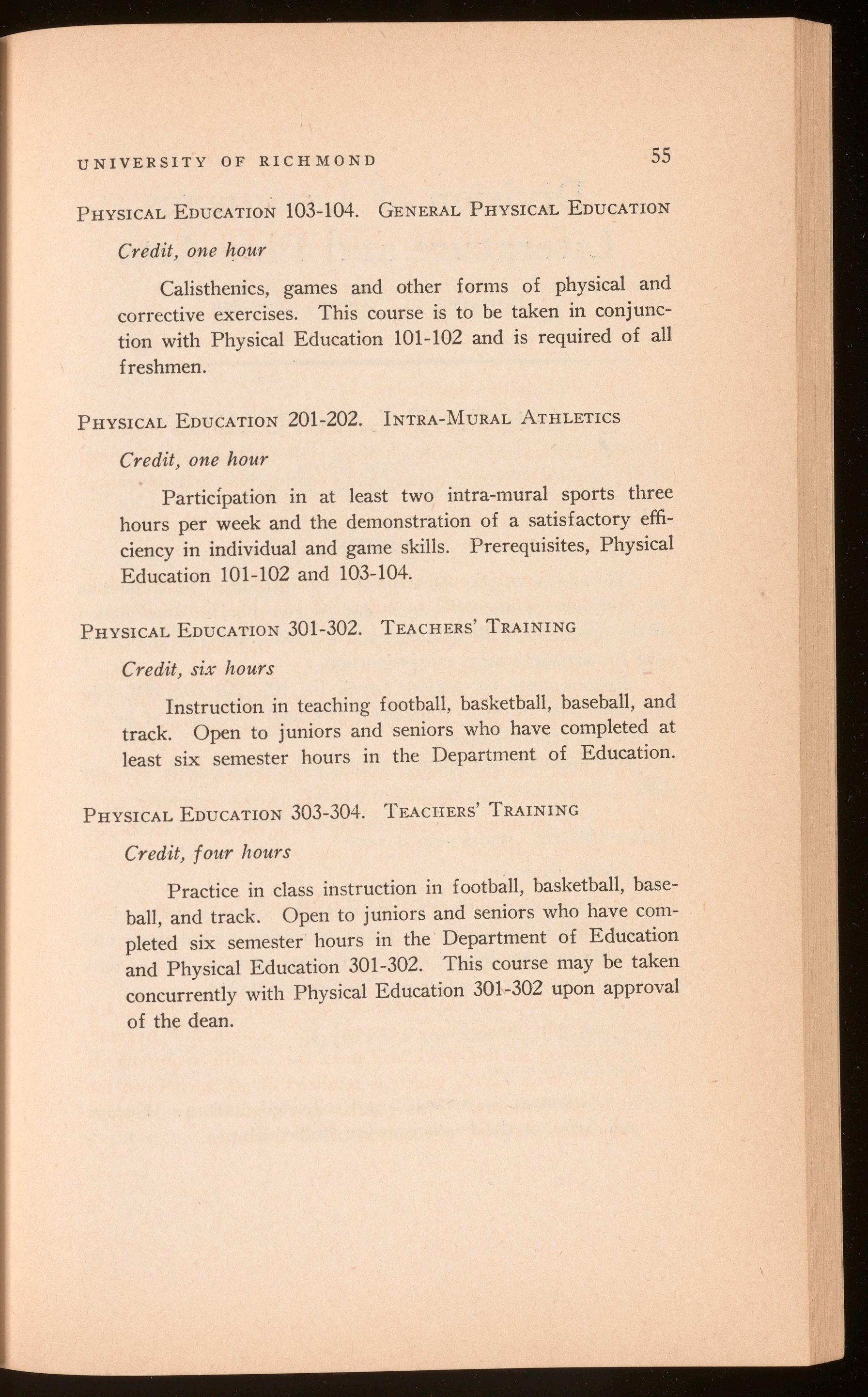
UNIVERSITY OF RICHMOND 55
PHYSICAL EDUCATION 103-104. GENERAL PHYSICAL EDUCATION
Credit, one hour
Calisthenics, games and other forms of physical and corrective exercises. This course is to be taken in conjunction with Physical Education 101-102 and is required of all freshmen.
PHYSICAL EDUCATION 201-202. INTRA-MURAL ATHLETICS
Credit, one hour
Participation in at least two intra-mural sports three hours per week and the demonstration of a satisfactory efficiency in individual and game skills. Prerequisites, Physical Education 101-102 and 103-104.
PHYSICAL EDUCATION 301-302. TEACHERS' TRAINING
Credit, six hours
Instruction in teaching football, basketball, baseball, and track. Open to juniors and seniors who have completed at least six semester hours in the Department of Education.
PHYSICAL EDUCATION 303-304. TEACHERS' TRAINING
Credit, four hours
Practice in class instruction in football, basketball, baseball, and track. Open to juniors and seniors who have completed six semester hours in the Department of Education and Physical Education 301-302. This course may be taken concurrently with Physical Education 301-302 upon approval of the dean.
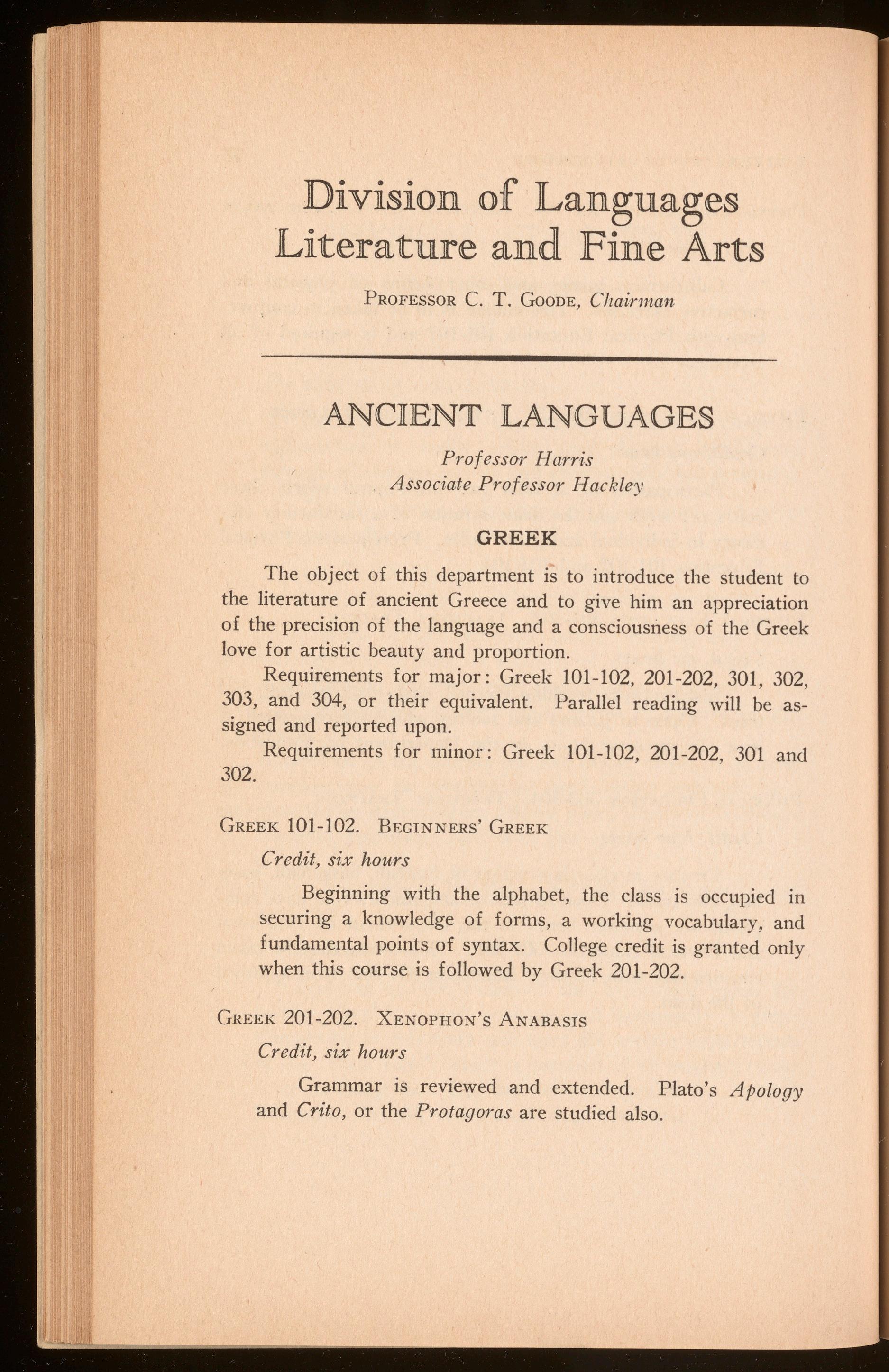
PROFESSOR C. T. GoonE, Clia-irman
Professor Harr is Associate Professor Hackley
GREEK
The object of this department is to introduce the student to the literature of ancient Greece and to give him an appreciation of the precision of the language and a consciousness of the Greek love for artistic beauty and proportion.
Requirements for major: Greek 101-102, 201-202, 301, 302, 303, and 304, or their equivalent. Parallel reading will be assigned and reported upon.
Requirements for minor: Greek 101-102, 201-202, 301 and 302.
GREEK 101-102. BEGINNERS' GREEK
Credit, six hours
Beginning with the alphabet, the class is occupied in securing a knowledge of forms, a working vocabulary, and fundamental points of syntax. College credit is granted only when this course is followed by Greek 201-202.
GREEK 201-202. XENOPHON'S ANABASIS
Credit, six hours
Grammar is reviewed and extended. Plato's Apology and Crito, or the Protagoras are studied also.
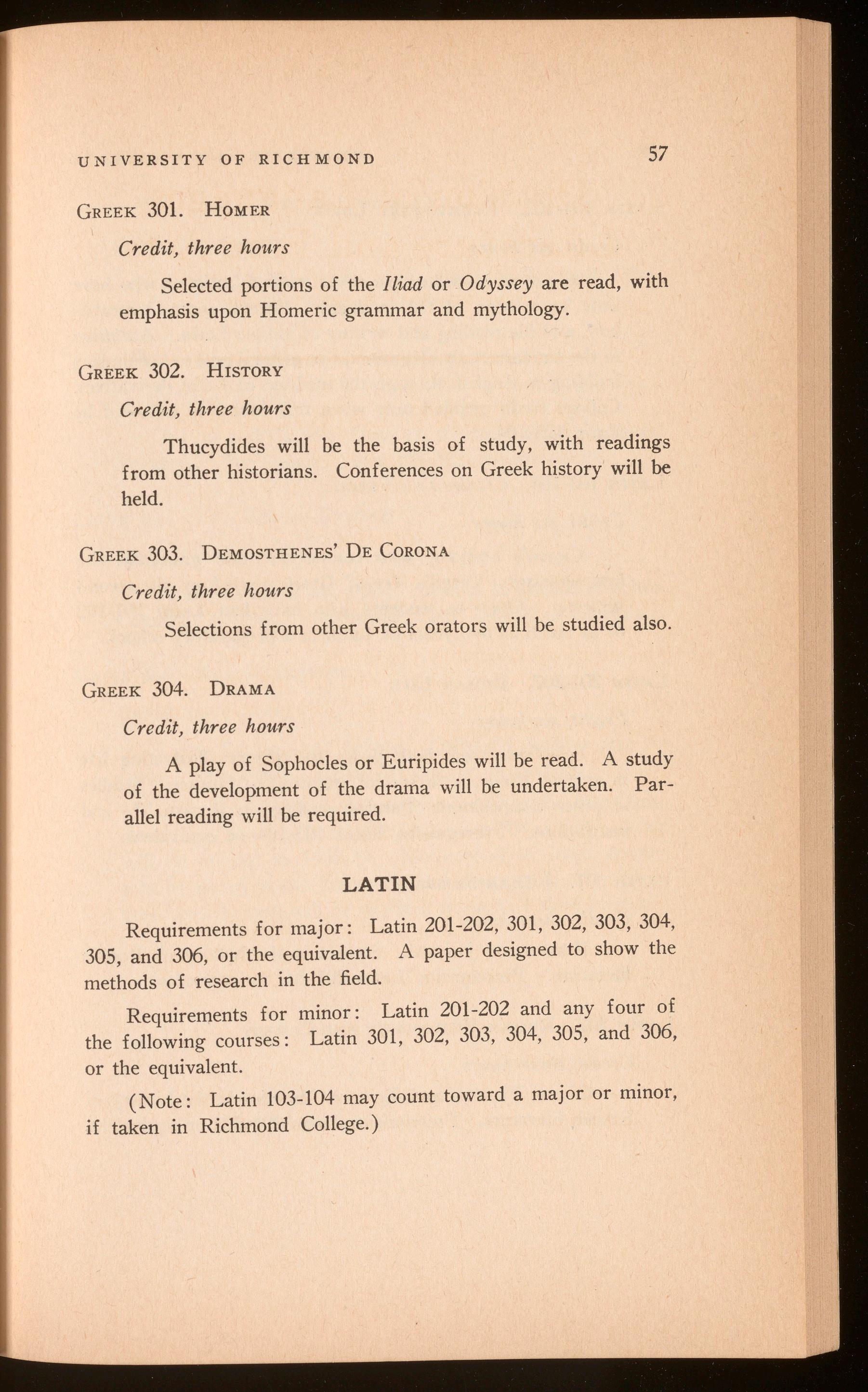
UNIVERSITY OF RICHMOND
GREEK 301. HOMER
Credit, three hours 57
Selected portions of the Iliad or Odyssey are read, with emphasis upon Homeric grammar and mythology.
GREEK 302. HISTORY
Credit, three hours
Thucydides will be the basis of study, with readings from other historians. Conferences on Greek history will be held.
GREEK 303. DEMOSTHENES' DE CORONA
Credit, three hours
Selections from other Greek orators will be studied also.
GREEK 304. DRAMA
Credit, three hours
A play of Sophocles or Euripides will be read. A study of the development of the drama will be undertaken. Parallel reading will be required.
Requirements for major: Latin 201-202, 301, 302, 303, 304, 305, and 306, or the equivalent. A paper designed to show the methods of research in the field.
Requirements for minor: Latin 201-202 and any four of the following courses: Latin 301, 302, 303, 304, 305, and 306, or the equivalent.
(Note: Latin 103-104 may count toward a major or minor, if taken in Richmond College.)

UNIVERSITY OF RICHMOND
LATIN 101-102. ELEMENTARY LATIN
Credit, six hours
For students who ha..venever studied Latin or who have little knowledge of the language. Forms, syntax, vocabulary, and the reading and writing of simple Latin. Attention to the fundamentals of grammar in general and to vocabulary building in English through the medium of Latin derivatives. College credit granted only when this course is followed by Latin 103-104.
LATIN 103-104. CICERO AND VERGIL
Credit, six hours
Cicero's orations, 'with compos1tion and grammar, the first semester. Vergil's Aeneid, Greek mythology, the second semester. Open to students who have had Latin 101-102 or as much as two years of Latin in a preparatory school.
LATIN 201-202. ROMAN LIFE
Credit, six hours
Selections from both prose and poetry illustrating life . in ancient Rome, with special attention to Horace. Studies in prose composition. Parallel reading on Roman life and institutions. Prerequisite, Latin 103-104 or equivalent.
LATIN 301. ROMAN SATIRE
Credit, three hoiirs
Horace and Juvenal. Studies in the history of Roman literature. Prerequisite, Latin 201~202 or equivalent.
LATIN 302. ROMAN PHILOSOPHY AND COMEDY
Credit, three hours
Cicero, Plautus, and Terence. Studies in the history of Roman literature. Prerequisite, Latin 201-202 or equivalent.
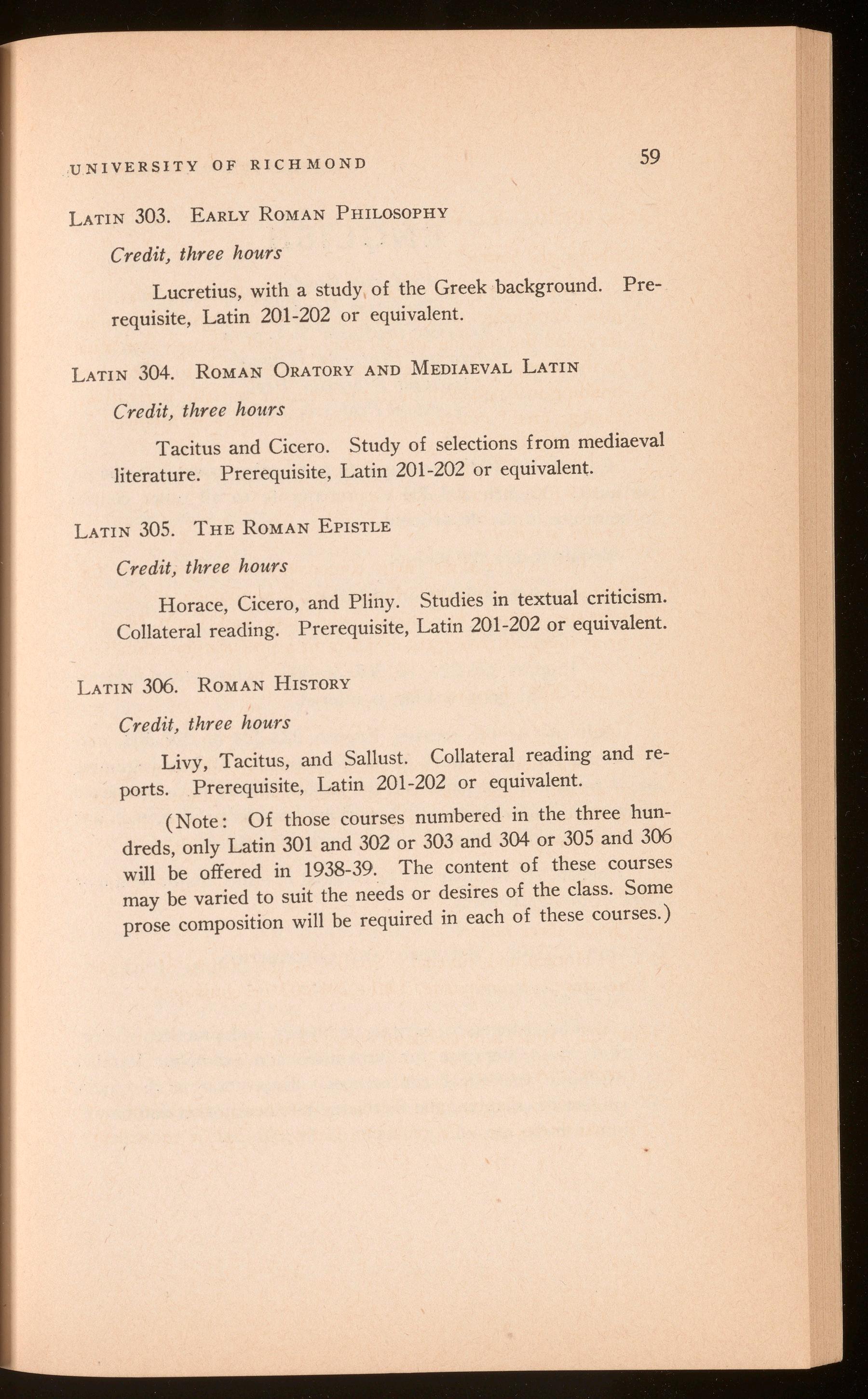
LATIN 303. EARLY ROMAN PHILOSOPHY
Credit, three hours
Lucretius, with a study of the Greek background. Prerequisite, Latin 201-202 or equivalent.
LATIN 304. ROMAN ORATORY AND MEDIAEVAL LATIN
Credit, three hours
Tacitus and Cicero. Study of selections from mediaeval literature. Prerequisite, Latin 201-202 or equivalent.
LATIN 305. THE ROMAN EPISTLE
Credit, three hours
Horace, Cicero, and Pliny. Studies in textual criticism. Collateral reading. Prerequisite, Latin 201-202 or equivalent.
LATIN 306. ROMAN HISTORY
Credit, three hours
Livy, Tacitus, and Sallust. Collateral reading and reports. Prerequisite, Latin 201-202 or equivalent.
(Note: Of those courses numbered in the three hundreds, only Latin 301 and 302 or 303 and 304 or 305 and 306 will be offered in 1938-39. The content of these courses may be varied to suit the needs or desires of the class. Some prose composition will be required in each of these courses.)
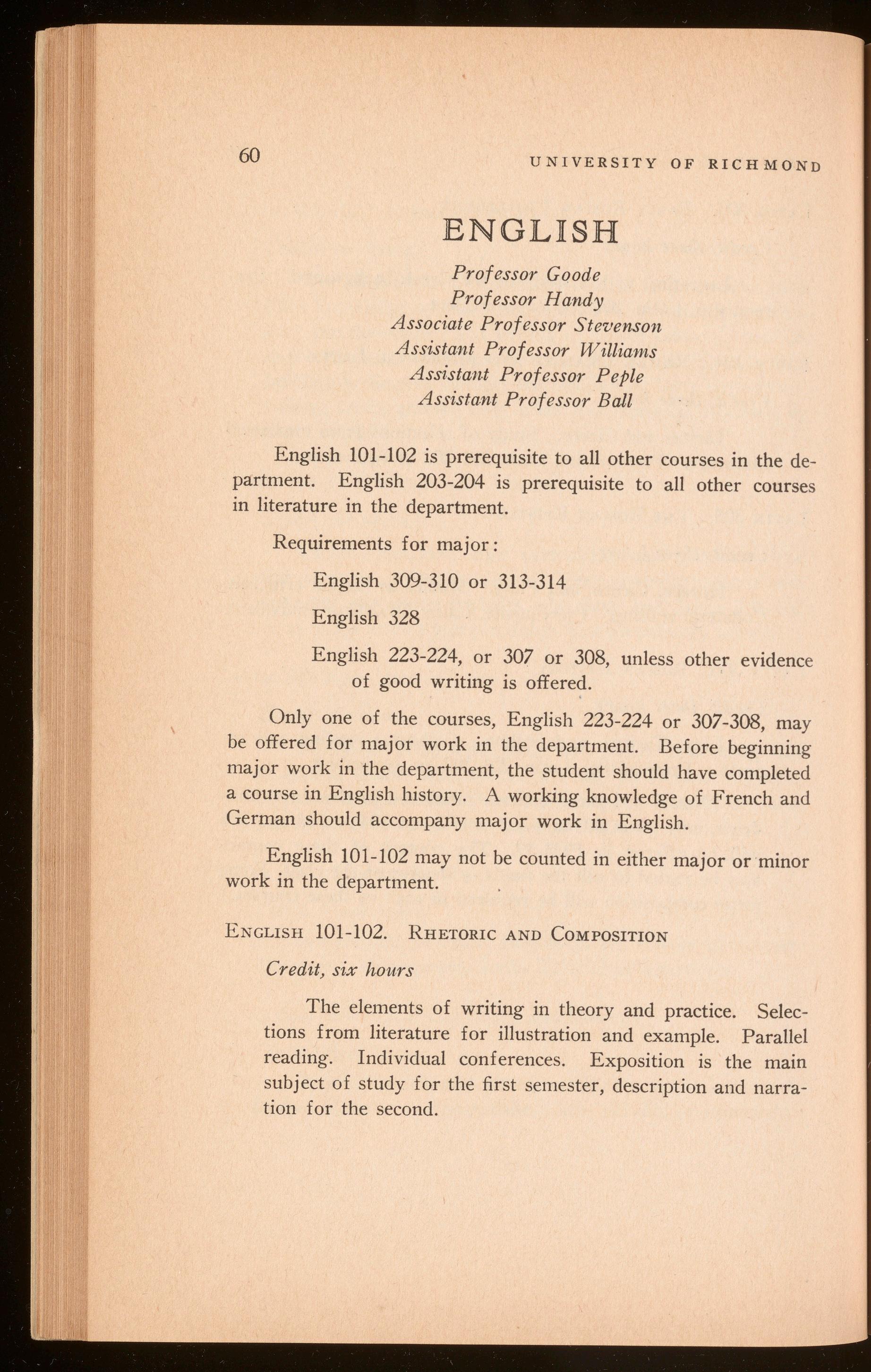
UNIVERSITY OF RICHMOND
Professor Goode
Professor Handy
Associate Professor Stevenson
Assistant Professor Williams
Assistant Professor Peple
Assistant Professor Ball
English 101-102 is prerequisite to all other courses in the department. English 203-204 is prerequisite to all other courses in literature in the department.
Requirements for major:
English 309-310 or 313-314
English 328
English 223-224, or 307 or 308, unless other evidence of good writing is offered.
Only one of the courses, English 223-224 or 307-308, may be offered for major work in the department. Before beginning major work in the department, the student should have completed a course in English history. A working knowledge of French and German should accompany major work in English.
English 101-102 may not be counted in either major or minor work in the department.
ENGLISH 101-102. RHETORIC AND COMPOSITION
Credit, six hours
The elements of wntmg in theory and practice. Selections from literature for illustration and example. Parallel reading. Individual conferences. Exposition is the main subject of study for the first semester, description and narration for the second.
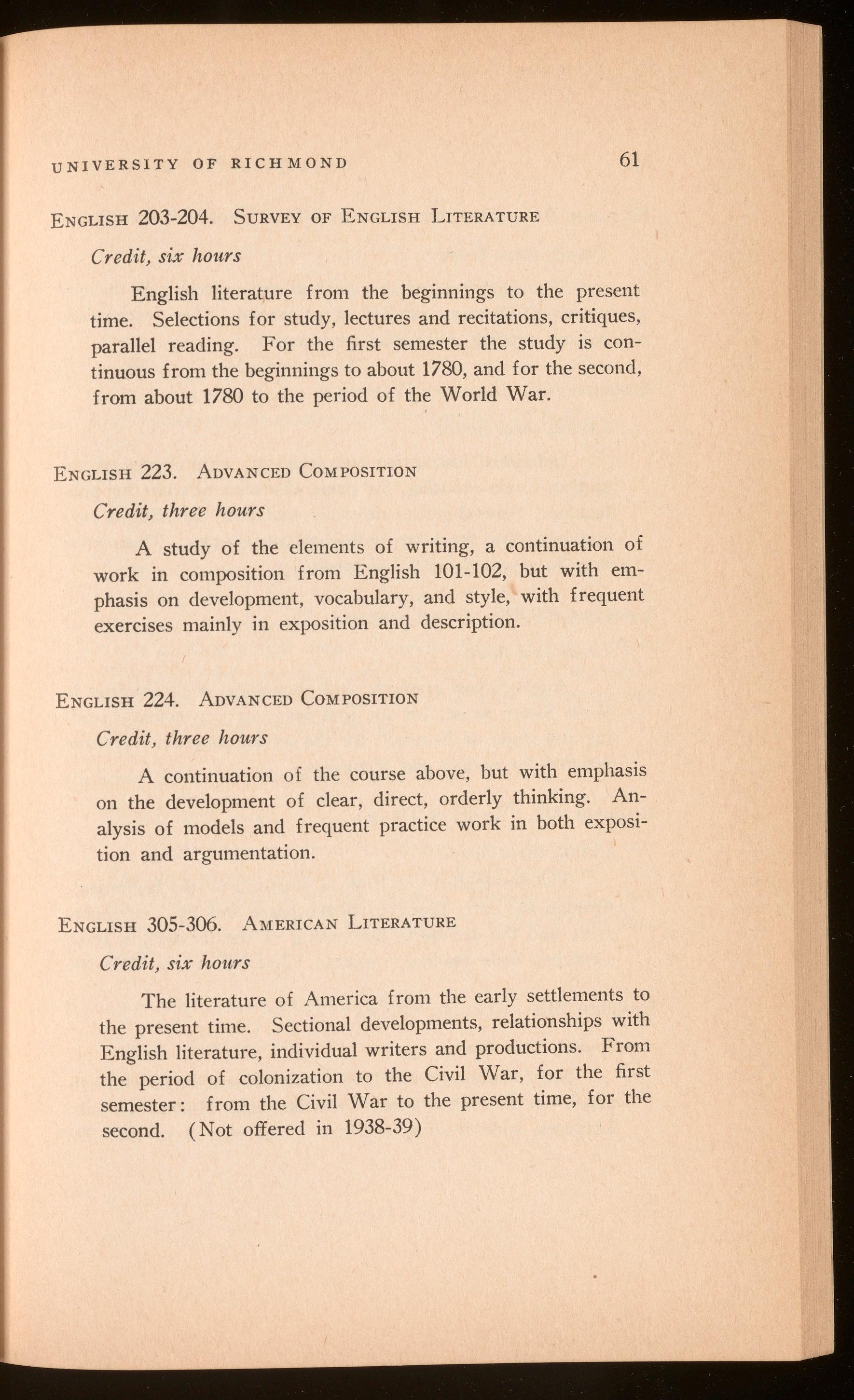
ENGLISH 203-204. SURVEY OF ENGLISH LITERATURE
Credit, six hours 61
English literature from the beginnings to the present time. Selections for study, lectures and recitations, critiques, parallel reading. For the first semester the study is continuous from the beginnings to about 1780, and for the second, from about 1780 to the period of the World War.
ENGLISH 223. ADVANCED COMPOSITION
Credit, three hours
A study of the elements of wntmg, a continuation of work in composition from English 101-102, but with emphasis on development, vocabulary, and style, with frequent exercises mainly in exposition and description.
ENGLISH 224. ADVANCED COMPOSITION
Credit , three hours
A continuation of the course above, but with emphasis on the development of clear, direct, orderly thinking . Analysis of models and frequent practice work in both exposition and argumentation.
ENGLISH 305-306. AMERICAN LITERATURE
Credit, six hours
The literature of America from the early settlements to the present time. Sectional developments, relationships with English literature, individual writers and productions. From the period of colonization to the Civil War, for the first semester: from the Civil War to the present time, for the second. ( Not offered in 1938-39)
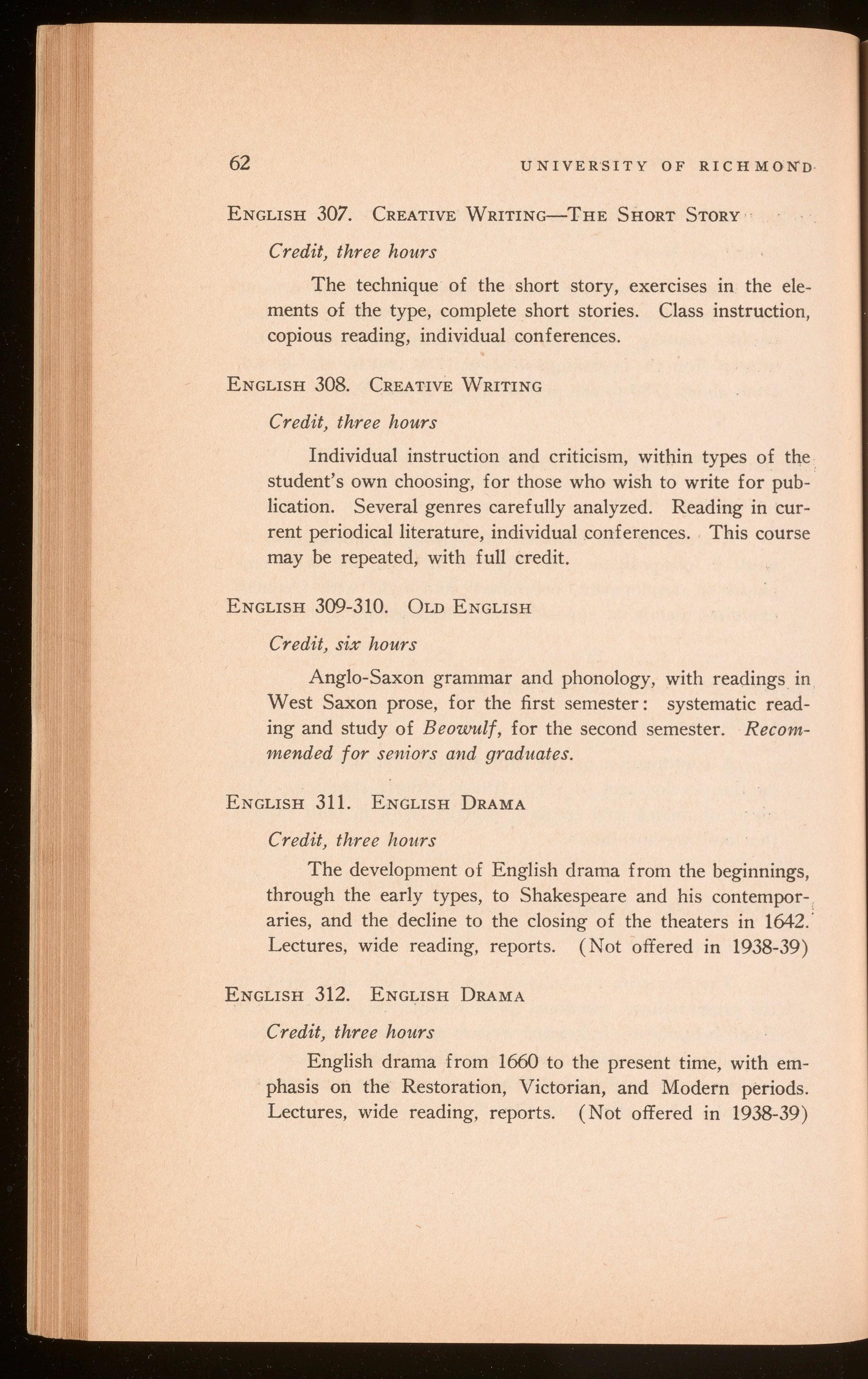
ENGLISH 307. CREATIVE WRITING-THE SHORT STORY ·
Credit, three hours
The technique of the short story, exercises m the elements of the type, complete short stories. Class instruction, copious reading, individual conferences.
ENGLISH 308. CREATIVE WRITING
Credit, three hours
Individual instruction and criticism, within types of the . student's own choosing, for those who wish to write for publication. Several genres carefully analyzed. Reading in current periodical literature, individual conferences. This course may be repeated, with full credit.
ENGLISH 309-310. OLD ENGLISH
Credit, six hours
Anglo-Saxon grammar and phonology, with readings in West Saxon prose, for the first semester: systematic reading and study of Beowulf, for the second semester. Recommended for seniors and graduates.
ENGLISH 311. ENGLISH DRAMA
Credit, three hours
The development of English drama from the beginnings, through the early types, to Shakespeare and his contemporaries, and the decline to the closing of the theaters in 1642.' Lectures, wide reading, reports. (Not offered in 1938-39)
ENGLISH 312. ENGLISH DRAMA
Credit, three hours
English drama from 1660 to the present time, with emphasis on the Restoration, Victorian, and Modern periods. Lectures, wide reading, reports. (Not offered in 1938-39)
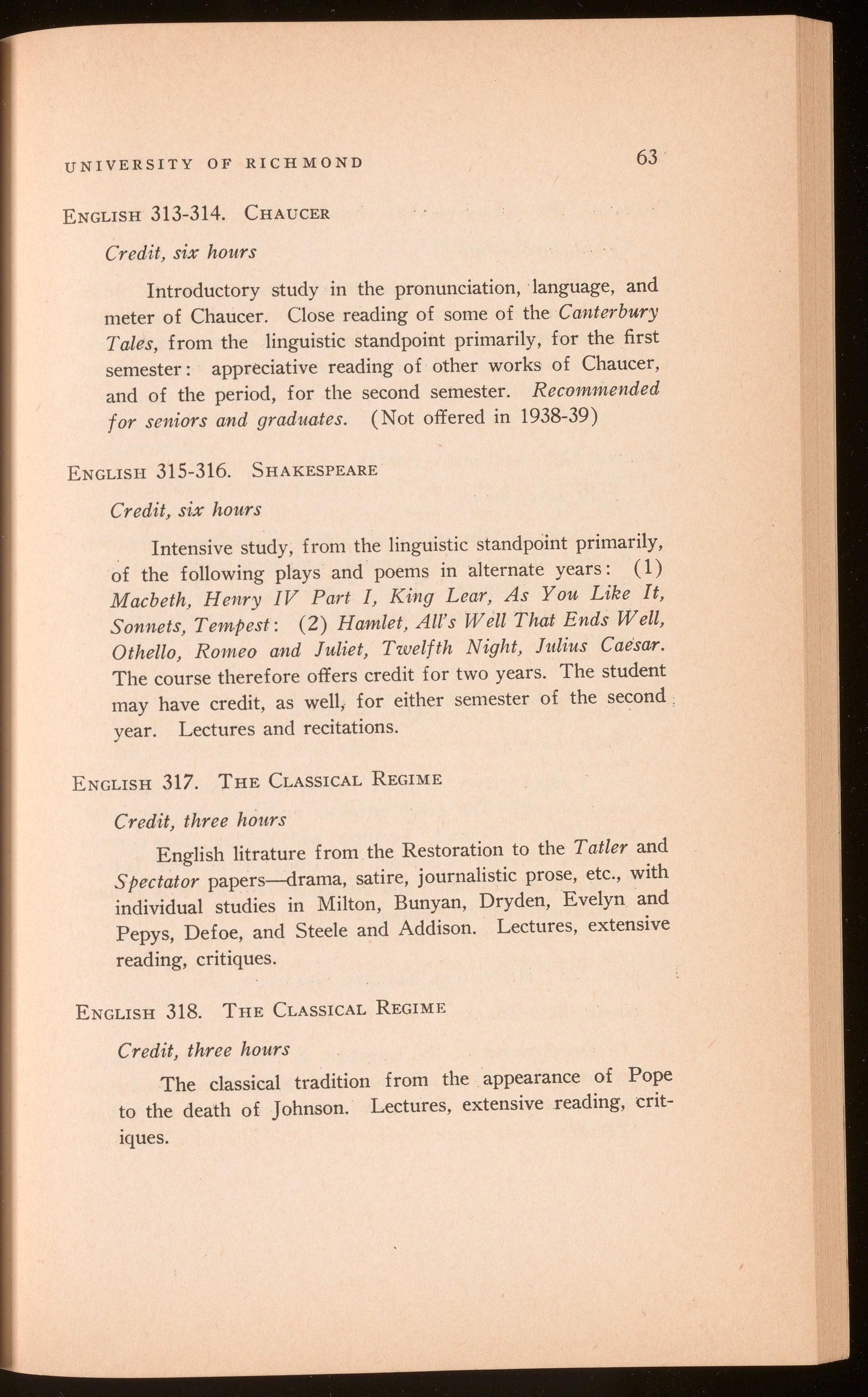
ENGLISH 313-314. CHAUCER
Credit, six hoiirs 63
Introductory study in the pronunciation, ·language, and meter of Chaucer. Close reading of some of the Canterbury Tales, from the linguistic standpoint primarily, for the first semester: appreciative reading of other works of Chaucer, and of the period, for the second semester. Recommended for seniors and graduates. (Not offered in 1938-39)
ENGLISH 315-316. SHAKESPEARE
Credit, six hours
Intensive study, from the linguistic standpoint primarily, of the following plays and poems in alternate years: ( 1) Macbeth, H e'llry JV Part I, King Lear, As You Like It, Sonnets, Tempest: (2) Hamlet, All's Well That Ends Well, Othello, Romeo and Juliet, Twelfth Night, Julius Caesar. The course therefore offers credit for two years. The student may have credit, as well; for either semester of the second . year. Lectures and recitations.
ENGLISH 317. THE CLASSICAL REGIME
Credit, three hours
English litrature from the Restoration to the Taller and Spectator papers---drama, satire, journalistic prose, etc., with individual studies in Milton, Bunyan, Dryden, Evelyn and Pepys, Defoe, and Steele and Addison. Lectures, extensive reading, critiques.
ENGLISH 318. THE CLASSICAL REGIME
Credit, three hours
The classical tradition from the appearance of Pope to the death of Johnson. Lectures, extensive reading, critiques.

ENGLISH 319. THE ROMANTIC MOVEMENT
Credit, three hours
English poetry approximately from 1780 to 1825. Studies in Wordsworth, Coleridge, Byron, Shelley, and Keats, with some attention to such poets as Cowper, Burns, and Scott. Reports on the minor poets of the time. Lectures and class discussions.
ENGLISH 320. VICTORIAN POETRY
Credit, three hours
Studies in the poetry of Arnold, Tennyson, Browning, Rossetti, Morris, and Swinburne, with some mention of Mrs. Browning, Fitzgerald, James Thomson, and Miss Rossetti. Reports on the minor poets of the period. Lectures and class discussions.
ENGLJSH 321-322. THE ENGLISH NOVEL
Credit, six hours
A rapid survey of prose fiction in England before the novel proper. The great novelists and types of the novel from Defoe to Conrad. Lectures, wide reading, class papers. The first semester is devoted to a study of the novel before the appearance of Scott, and the second semester to a similar study from Scott to Conrad.
ENGLISH 328. HISTORICAL ENGLISH GRAMMAR
Credit, three hours
Development of the language, in historical perspective, with regard chiefly to inflectional forms, phonology, and syntax. Primarily for seniors and graduates. (Not offered in 1938-39)

Professor Handy
A course in the principles and practice of public speaking. The training of students in accuracy of thought, in correctness of expression, and in ease of delivery will be stressed. Practical speaking necessary for successful accomplishment is the aim of this instruction.
In addition to oral practice there will be wide reading and critical study of examples of the various forms of public speech: deliberative, forensic, occasional.
PUBLIC SPEAKING 201. PRINCIPLES OF PUBLIC SPEAKING
Credit, three hours
A study of the general principles of public speaking, voice correction, and reading aloud with emphasis upon proper breathing. Weekly practice in the delivery of short memorized selections and brief talks.
P U BLIC SPEAKING 202 THE ORATION AS A FORM
Credit, three hours
Analytical study of a number of modern orations as to structure, style , and diction. The writing and delivery of one originaJ oration. Prerequisite, English 101-102.
(Note : The courses in public speaking are intended primarily for sophomores and juniors.)
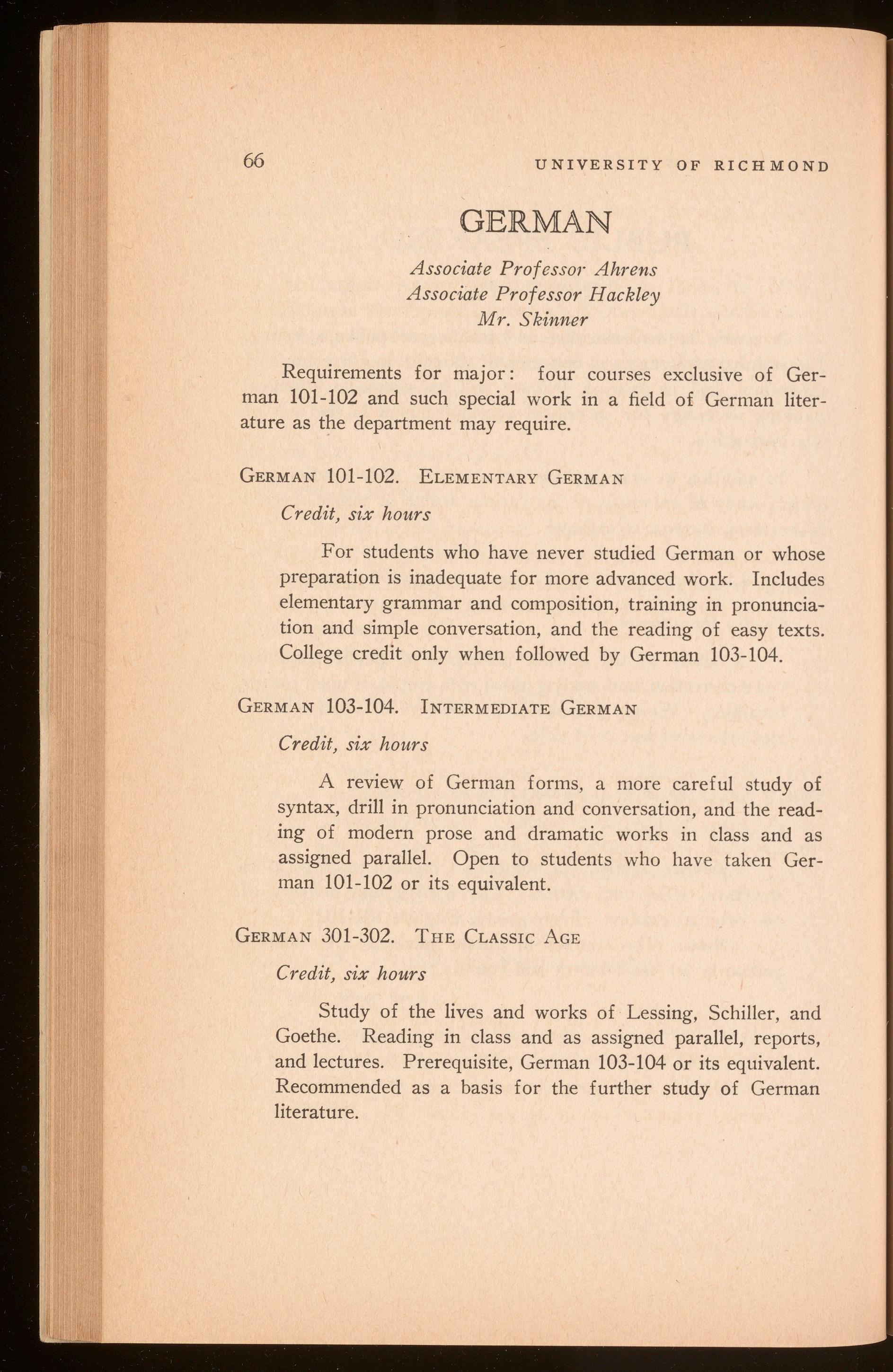
UNIVERSITY OF RICHMOND
Associate Professor Ahrens
Associate Professor Hackley
Mr. Skinner
Requirements for major: four courses exclusive of German 101-102 and such special work in a field of German literature as the department may require.
GERMAN 101-102. ELEMENTARY GERMAN
Credit, six hours
For students who have never studied German or whose preparation is inadequate for more advanced work. Includes elementary grammar and composition, training in pronunciation and simple conversation, and the reading of easy texts. College credit only when followed by German 103-104.
GERMAN 103-104. INTERMEDIATE GERMAN
Credit, six hours
A review of German forms, a more careful study of syntax, drill in pronunciation and conversation, and the reading of modern prose and dramatic works in class and as assigned parallel. Open to students who hav e taken German 101-102 or its equivalent.
GERMAN 301-302. THE CLASSIC AGE
Credit, six hours
Study of the lives and works of Lessing, Schiller, and Goethe. Reading in class and as assigned parallel, reports, and lectures. Prerequisite, German 103-104 or its equivalent. Recommended as a basis for the further study of German literature.

UNIVERSITY OF RICHMOND
GERMAN 303-304. NINETEENTH CENTURY PROSE
Credit, si.x-hours
A study of the works of the great novelists from the rise of romanticism to the ascendancy of naturalism. Read~ ing in class and as assigned parallel, reports, and lectures. Prerequisite, German 103-104 or its equivalent.
GERMAN 305-306. NINETEENTH CENTURY DRAMA
Credit, si.x-hours
A study of the development of German drama from romanticism to naturalism, centering about the works of such authors as Tieck, Kleist, Grillparzer, Hebbel, Ludwig, and Hauptmann. Reading in class and as assigned parallel, reports, and lectures. Prerequisite, German 103-104 or its equivalent; German 301-302 also recommended. (Not offered in 1938-39)
GERMAN 307. LYRIC POETRY
Credit, three hours
A study of selections from the preeminent German lyric poets. Prerequisite, as for German 305-306. (Not offered in 1938-39)
GERMAN 308. GOETHE'S FAUST
Credit, three hours
Analytical and critical study of Faust, Parts I and II, its sources and development. Prerequisite, as for German 305-306. (Not offered in 1938-39)
GERMAN 309-310. SURVEY OF GERMAN LITERATURE
Credit, si.x-hours
History of German literature from its beginnings with special emphasis on the period since 1750. Intended espe-

UNIVERSITY OF RICHMOND
cially for German majors. Lectures, readings, and reports. Prerequisite, one or preferably two of courses 301-302, 303304, 305-306, and 307-308. (Not offered in 1938-39)
GERMAN 313-314. SCIENTIFIC GERMAN
Credit, four hours
A course designed for students who are studying German for its practical value to the investigator. Prerequisite, German 103-104.
Professor Gaines
Associate Professor Caylor
Assistant Professor Lavender
Requirements for major: in French or Spanish, a mmunum of twenty-four semester hours, exclusive of courses 101-102. In the senior year, under the guidance of the major professor, the performance of a special piece of work, which shall be reported in the form of a thesis or essay.
FRENCH 101-102. ELEMENTARY FRENCH
Credit, six hours
This course is intended for students with little or no knowledge of French. The work includes pronunciation on a phonetic basis, careful training in the elements of French grammar, reading of simple selections, vocabulary building, dictation and simple composition, and practice in speaking the language.

UNIVERSITY OF RICHMOND
FRENCH 103-104. COMPOSITION, READING, CONVERSATION
Credit, six hours
This course is intended to give the student a reasonable command of the written and spoken language and to enable him to assimilate easily a literary text. It presents a systematic and thorough review of French grammar. It also includes composition of moderate difficulty, dictation, the reading of a considerable amount of modern prose and poetry, and conversation based on this reading. Prerequisite, French 101-102 or equivalent.
FRENCH 201. FRENCH LITERATURE IN THE SEVENTEENTH CENTURY
Credit, three hours
The important non-dramatic writers of the century are studied. Certain works are read as parallel. Prerequisite, French 103-104 or four years of high school French. (Not offered in 1938-39)
FRENCH 202. FRENCH LITERATURE IN THE EIGHTEENTH CENTURY
Credit, three hours
A careful study is made of the works of Montesquieu, Voltaire, Rousseau, and other important writers of the period. French is used in many of the classroom discussions. Prerequisite, French 201 or equivalent. (Not offered in 1938-39)
FRENCH 203. FRENCH LITERATURE IN THE FIRST HALF OF THE NINETEENTH CENTURY
Credit, three hours
Romanticism and the beginnings of realism are studied. French is employed in many of the lectures, discussions, and students' reports. Prerequisite, . French 103-104 or equivalent.

UNIVERSITY OF RICHMOND
FRENCH 204. FRENCH LITERATURE IN THE SECOND HALF OF THE NINETEENTH CENTURY
Credit, three hours
This course is a continuation of French 203.
FRENCH 301. ADVANCED FRENCH COMPOSITION AND CONVERSATION
Credit, three hours
Emphasis is placed upon modern French prose style, diction, and a scientific study of pronunciation. The class is conducted in French. Prerequisite, French 103-104 or . equivalent. (Not offered in 1938-39)
FRENCH 302. TWENTIETH CENTURY FRANCE
Credit, three hours
A survey of the modern scene in French letters, life, and thought is made. Class and parallel reading is selected from such authors as Rolland, Proust, Gide, Romains, and others . The class is conducted largely in French. Pre- requisite, French 301 or equivalent. (Not offered in 1938-39)
FRENCH 303. FRENCH DRAMA TO THE END OF THE SEVENTEENTH CENTURY
Credit, three hours
After a resume of mediaeval and renaissance drama , several plays of Corneille, Moliere, and Racine are read in class and as parallel. Prerequisite, French 103-104 or four years of high school French.
FRENCH 304. FRENCH DRAMA OF THE EIGHTEENTH AND NINETEENTH CENTURIES
Credit, three hours
The following subjects are studied in detail: tragedy and comedy in the eighteenth century, the romantic theatre,

UNIVERSITY OF RICHMOND 7l
the realistic drama, and plays of recent schools. Prerequisite, French 303.
A course in elementary Italian will be offered if a sufficient number of students request it.
SPANISH 101-102. ELEMENTARY SPANISH
Credit, six hours
This course is intended for students with little or no knowledge of Spanish. It deals with the elements of grammar and with simple composition. Special attention is paid to pronunciation, conversation, dictation, fluency in reading, and practical use of the language.
SPANISH 103-104. INTERMEDIATE SPANISH
Credit, six hours
This course deals with a syste:11atic review of grammar, dictation, and composition of moderate difficulty. Typical works by modern poets and prose writers are read. Attention is given to conversation and discussion in Spanish, based upon the texts studied and UlJ,m topics of practical everyday Spanish. Spanish is to be the language of the classroom. Prerequisite, Spanish 101-102 or the equivalent.
SPANISH 201. COMMERCIAL SPANISH
Credit, three hours
This course is designed to give the student indispensable information on commercial subjects and to give him practical knowledge instead of theory. As the student progresses, he will become acquainted with the technical terms and styles that characterize the language used in the Spanish business world of to-day. Prerequisite, Spanish 103-104 or the equivalent.

SPANISH 202. SPANISH CORRESPONDENCE
Credit, three hours
A study of all types of letters is made. In this course the student will become familiar with the commercial expressions and every-day idioms used in Spanish correspondence. Prerequisite, Spanish 103-104 or the equivalent.
SPANISH 301. ADVANCED READING, CONVERSATION, AND COMPOSITION
Credit, three hours
A study, conducted largely in Spanish, is made of the modern Spanish writers, such as Gald6s, Alarcon, Valera, Valdes, or Ibanez. The outstanding works of the above authors are used as texts. Students are expected to write themes and read reports in Spanish. Parallel reading is required. Prerequisite, Spanish 103-104 or the equivalent. (Not offered in 1938-39)
SPANISH 302. MODERN SPANISH DRAMA AND · POETRY
Credit, three hours
A study is made of the drama and poetry in the eighteenth, nineteenth, and twentieth centuries, with assigned parallel reading, reading reports, and lectures. The themes must be written in Spanish. (Not offered in 1398-39)
SPANISH 303-304. EL SIGLO DE ORO
Credit, three hours
A study is made of the most prominent writers and their works. Special attention is placed on the works of Cervantes, Calderon, and Lope de Vega. The work of the course includes lectures, parallel reading, reading reports, and themes in Spanish. Prerequisite, Spanish 103-104 or the equivalent.
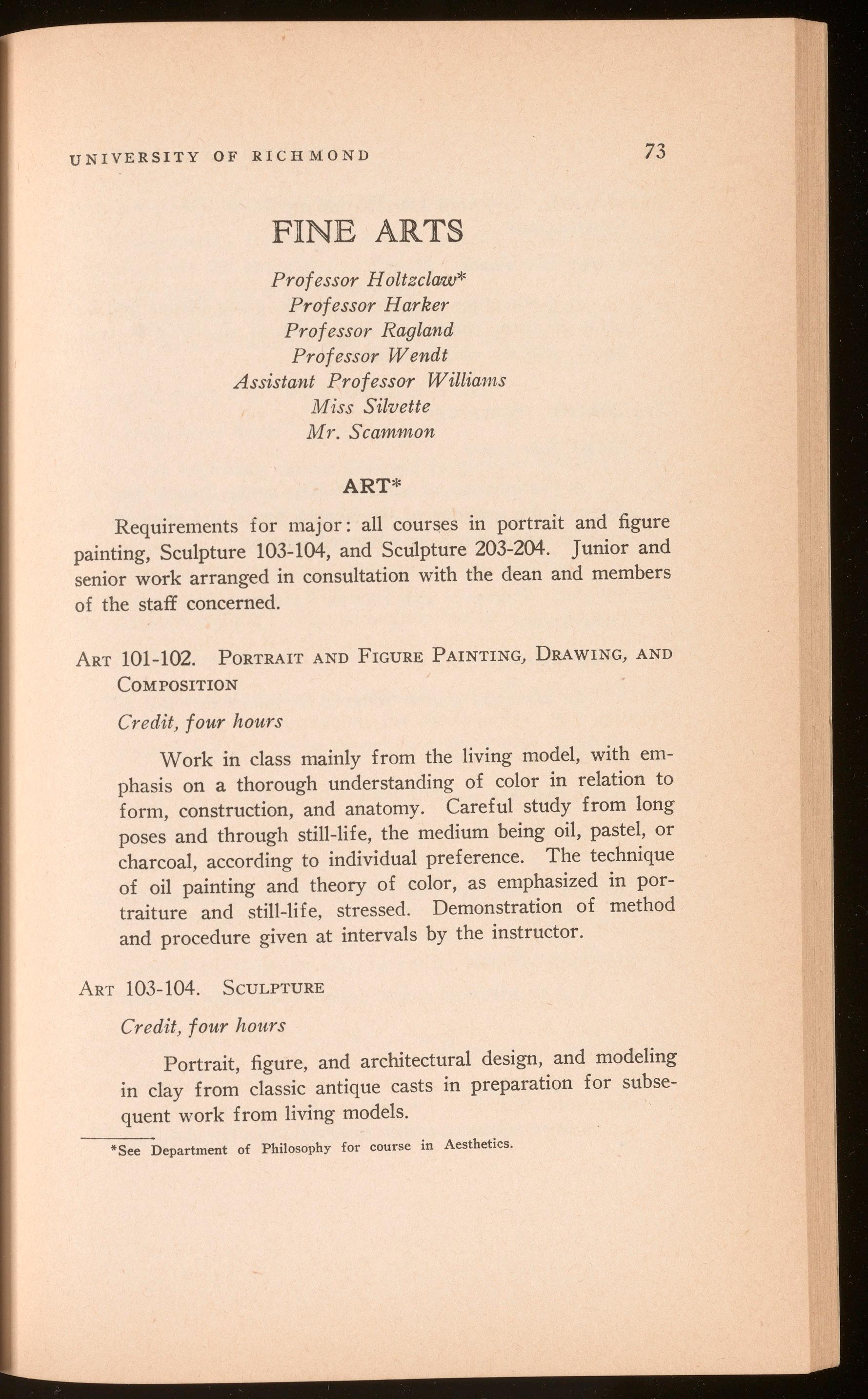
UNIVERSITY OF RICHMOND
Professor H oltzclGIW*
Professor Hark er
Professor Ragland
Professor Wendt
Assistant
Professor Williams
Miss Silvette
Mr. Scammon
ART*
Requirements for major: all courses in portrait and figure painting, Sculpture 103-104, and Sculpture 203-204. Junior and senior work arranged in consultation with the dean and members of the staff concerned.
ART 101-102. PORTRAIT AND FIGURE PAINTING, DRAWING, AND COMPOSITION
Credit, four hours
Work in class mainly from the living model, with emphasis on a thorough understanding of color in relation to form, construction, and anatomy. Careful study from long poses and through still-life, the medium being oil, pastel, or charcoal, according to individual preference. The technique of oil painting and theory of color, as emphasized in portraiture and still-life, stressed. Demonstration of method and procedure given at intervals by the instructor.
ART 103-104. SCULPTURE
Credit, four hours
Portrait, figure, and architectural design, and modeling in clay from classic antique casts in preparation for subsequent work from living models.
*See Department of Philosophy for course in Aesthetics.
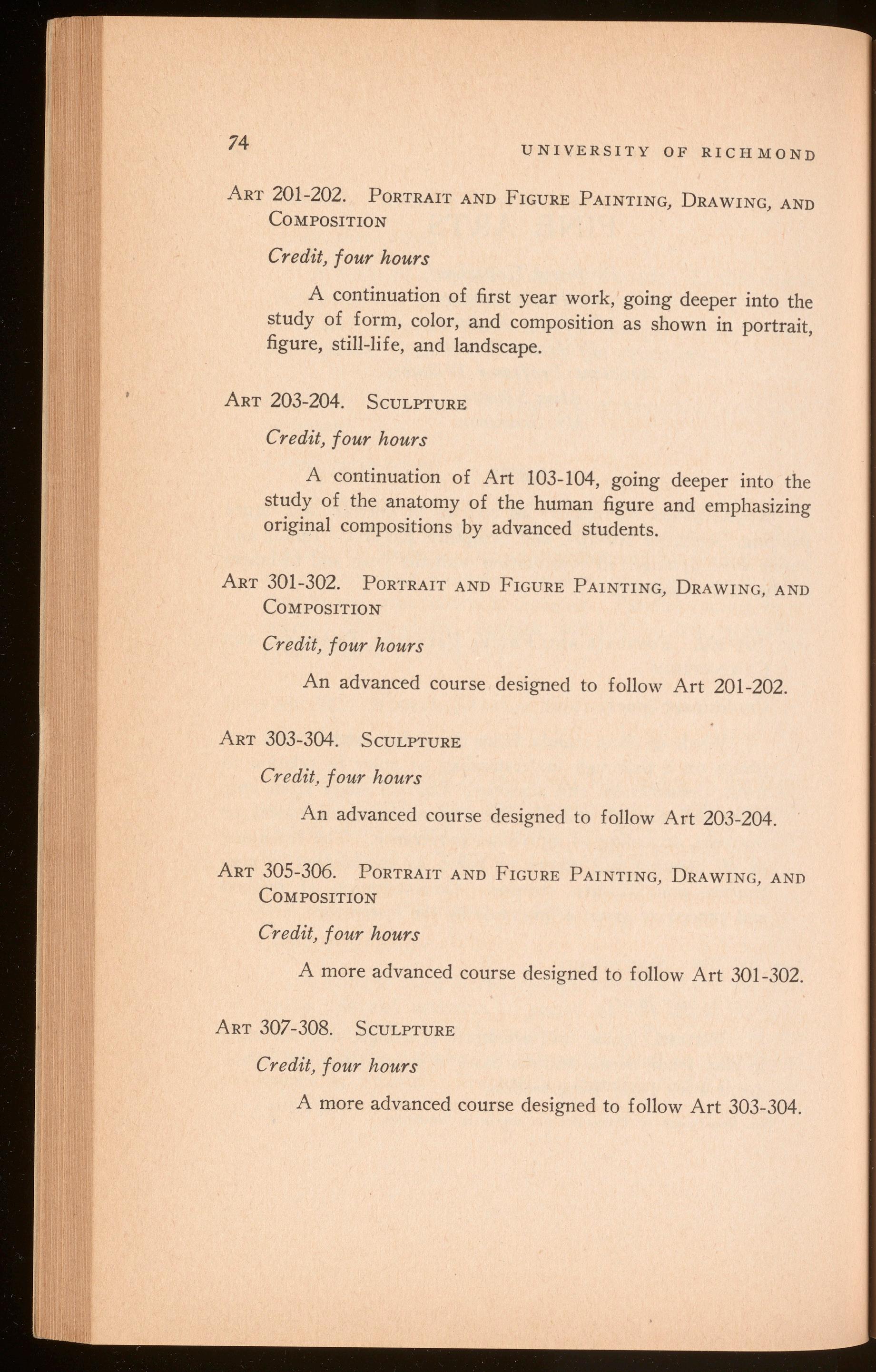
UNIVERSITY OF RICHMOND
ART 201-202. PORTRAIT AND FIGURE PAINTING, DRAWING, AND COMPOSITION
Credit, four hours
A continuation of first year work, going deeper into the study of form, color, and composition as shown in portrait, figure, still-life, and landscape.
ART 203-204. SCULPTURE
Credit, four hours
A continuation of Art 103-104, going deeper into the study of the anatomy of the human figure and emphasizing original compositions by advanced students.
ART 301-302. PORTRAIT AND FIGURE PAINTING, DRAWING, AND COMPOSITION
Credit, four hours
An advanced course designed to follow Art 201-202.
ART 303-304. SCULPTURE
Credit, four hours
An advanced course designed to follow Art 203-204.
ART 305-306. PORTRAIT AND FIGURE PAINTING, DRAWING, AND COMPOSITION
Credit, four hours
A more advanced course designed to follow Art 301-302.
ART 307-308. SCULPTURE
Credit, four hours
A more advanced course designed to follow Art 303-304.
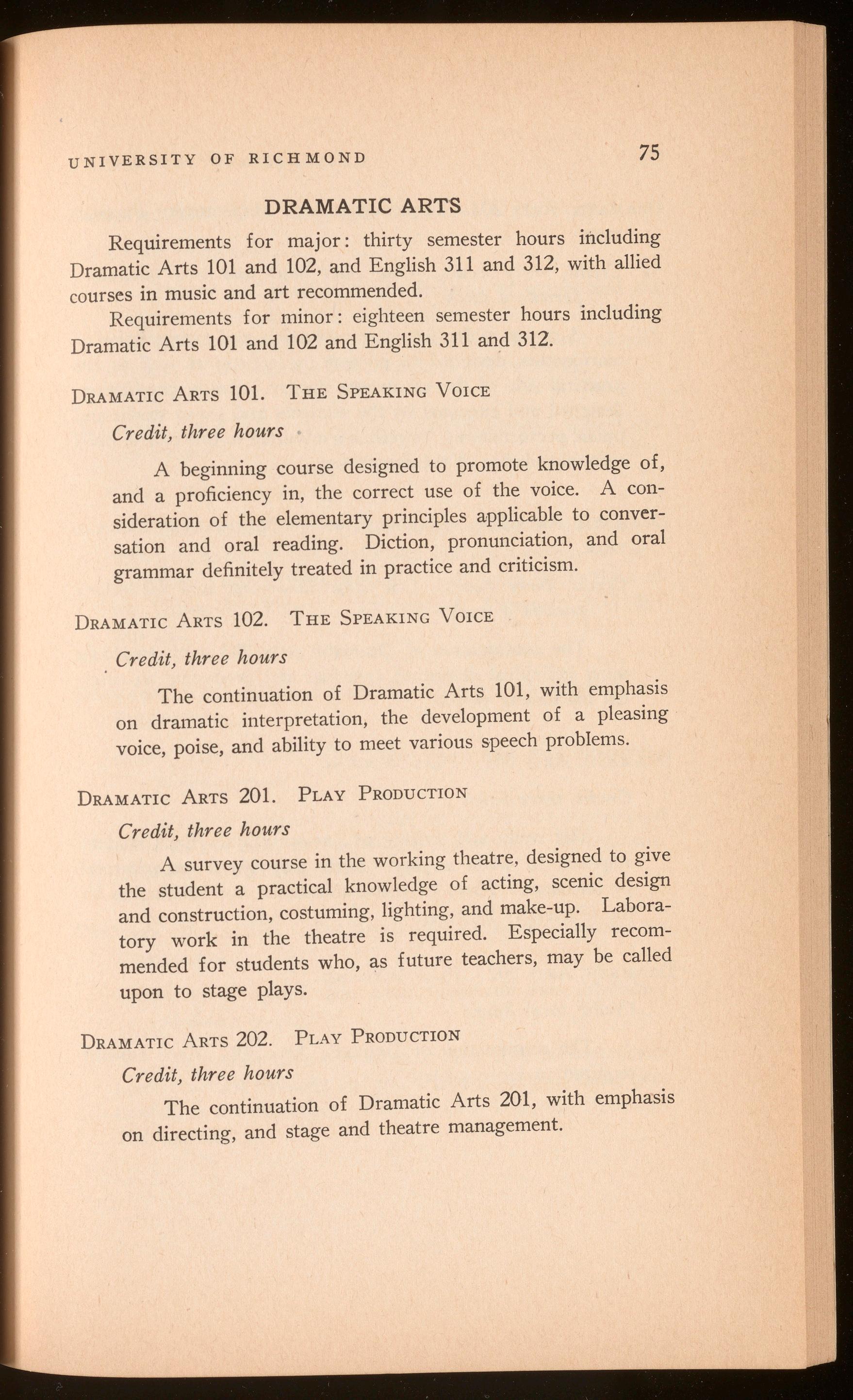
Requirements for major: thirty semester hours including Dramatic Arts 101 and 102, and English 311 and 312, with allied courses in music and art recommended.
Requirements for minor : eighteen semester hours including Dramatic Arts 101 and 102 and English 311 and 312.
DRAMATIC ARTS 101. THE SPEAKING VOICE
Credit, three hours
A beginning course designed to promote knowledge of, and a proficiency in, the correct use of the voice. A consideration of the elementary principles a:pplicable to conversation and oral reading. Diction, pronunciation, and oral grammar definitely treated in practice and criticism.
DRAMATIC ARTS 102. THE SPEAKING VOICE
Credit, three hours
The continuation of Dramatic Arts 101, with emphasis on dramatic interpretation, the development of a pleasing voice, poise, and ability to meet various speech problems.
DRAMATIC ARTS 201. PLAY PRODUCTION
Credit, three hours
A survey course in the working theatre , designed to give the student a practical knowledge of acting, scenic design and construction, costuming, lighting, and make-up. Laboratory work in the theatre is required. Especially recommended for students who, as future teachers, may be called upon to stage plays.
DRAMATIC ARTS 202. PLAY PRODUCTION
Credit, three hours
The continuation of Dramatic Arts 201, with emphasis on directing, and stage and theatre management.
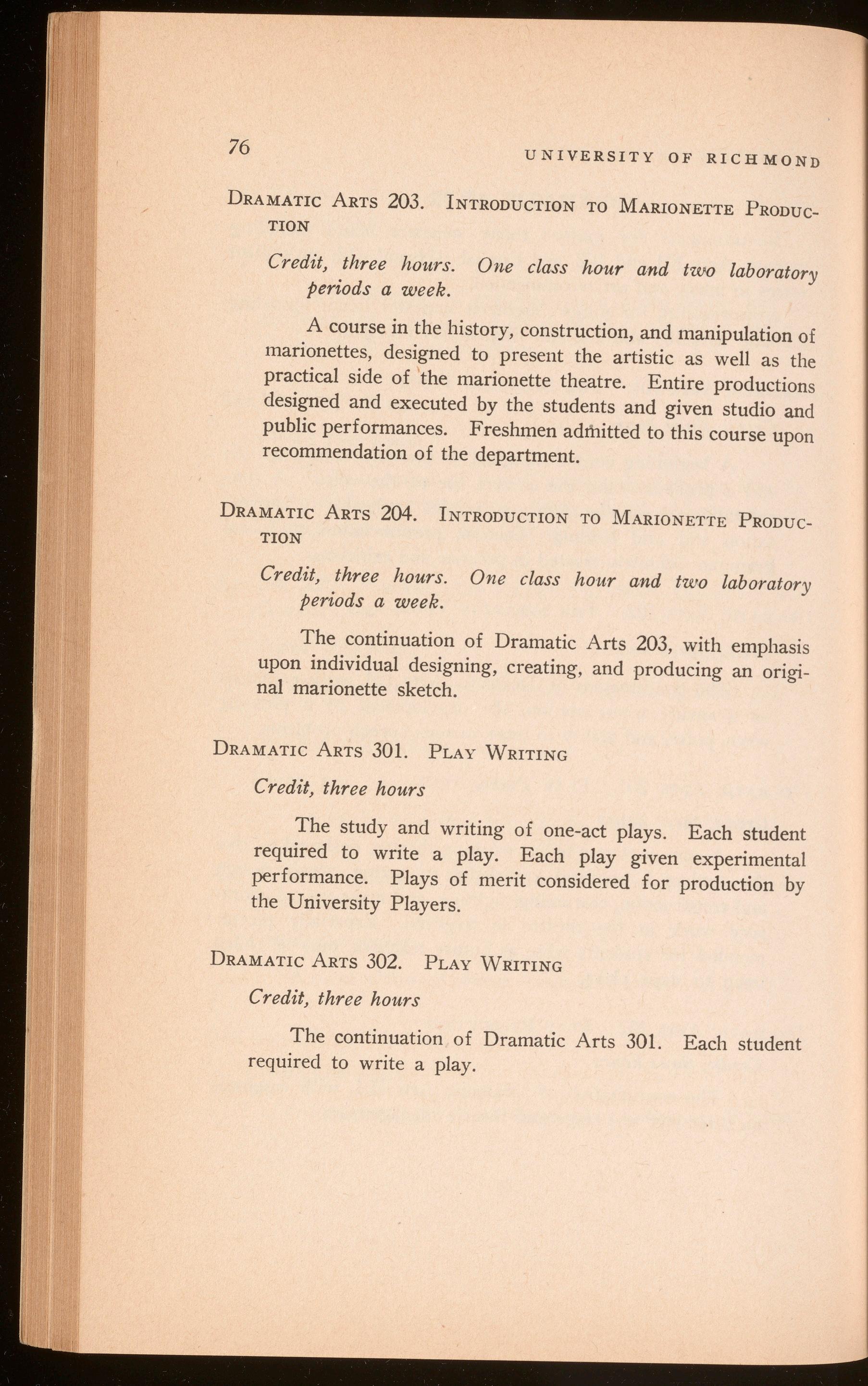
DRAMATIC ARTS 203. INTRODUCTION TO MARIONETTE PRODUCTION
Credit, three hours. One class hour and two laboratory periods a week.
A course in the history, construction, and manipulation of marionettes, designed to present the artistic as well as the practical side of the marionette theatre. Entire productions designed and executed by the students and given studio and public performances. Freshmen admitted to this course upon recommendation of the department.
DRAMATIC ARTS 204. INTRODUCTION TO MARIONETTE PRODUCTION
Credit, three hours. One class hour and two laboratory periods a week.
The continuation of Dramatic Arts 203, with emphasis upon individual designing, creating, and producing an origi- nal marionette sketch.
DRAMATIC ARTS 301. PLAY WRITING
Credit, three hours
The study and writing of one-act plays. Each student required to write a play. Each play given experimental performance. Plays of merit considered for production by the University Players.
DRAMATIC ARTS 302. PLAY WRITING
Credit, three hours
The continuation of Dramatic Arts 301. Each student required to write a play.

DRAMATIC ARTS 303. ADVANCED DIRECTING
Credit, three hours
Theory and practice in the training of actors and the preparation of plays for performances. Direction of one play for either studio or public performance required of each student. Prerequisite, Dramatic Arts 201 and 202.
DRAMATIC ARTS 304. ADVANCED SCENIC DESIGN AND CONSTRUCTION
Credit, three hours
The detailed study of the requirements of the theatre, with emphasis on the designing and construction of sets. Laboratory assignments include work on the productions of the University Players. Prerequisite, Dramatic Arts 201 and 202.
DRAMATIC ARTS 305. ADVANCED METHODS OF MARIONETTE PRODUCTION
Credit, three hours. One class hour and two laboratory periods a week.
A course designed to prepare the student for professional work in the field of marionette production. Prerequisite, Dramatic Arts 203 and 204.
DRAMATIC ARTS 306. ADVANCED METHODS OF MARIONETTE PRODUCTION
Credit, three hours. 011e class hour a,nd two laboratory periods a week.
The continuation of Dramatic Arts 305, with emphasis upon practical methods for the teaching of marionette production in the classroom. Prerequisites, Dramatic Arts 203, 204, and 305.

UNIVERSITY OF RICHMOND
Requirements for major: thirty semester hours. A student majoring in music must carry the theoretical courses together with the applied music. The department recommends that a student majoring in vocal music take piano, and that a student majoring in piano take vocal music or another instrument. A student majoring in music may minor in English or modern languages, no beginning modern language being accepted toward the minor.
Theoretical Music
1HEORETICAL Music 101-102. HARMONY
Credit, two hours
Intervals; invention and harmonization of melodies; triads in major and minor keys with their inversions; cadences; the dominant seventh and its inversions; analysis and elementary keyboard harmony.
THEORETICAL Music 103-104. SoLFEGGIO AND DICTATION
Credit, two hours
Drill in sight singing and ear trammg ; simple intervals to wide skips within the key; melody singing with varied rhythms and two-part singing; training of the ear to recognize intervals; training in writing from dictation melodies in one and two parts.
THEORETICAL Musrc 201-202. HARMONY
Credit, two hours
Harmonization of melodies, secondary seventh chords, suspensions, chromatically altered chords, chords of the augmented sixth and ninth, modulation, beginning composition, advanced keyboard harmony. Prerequisite, Theoretical Music 101-102.
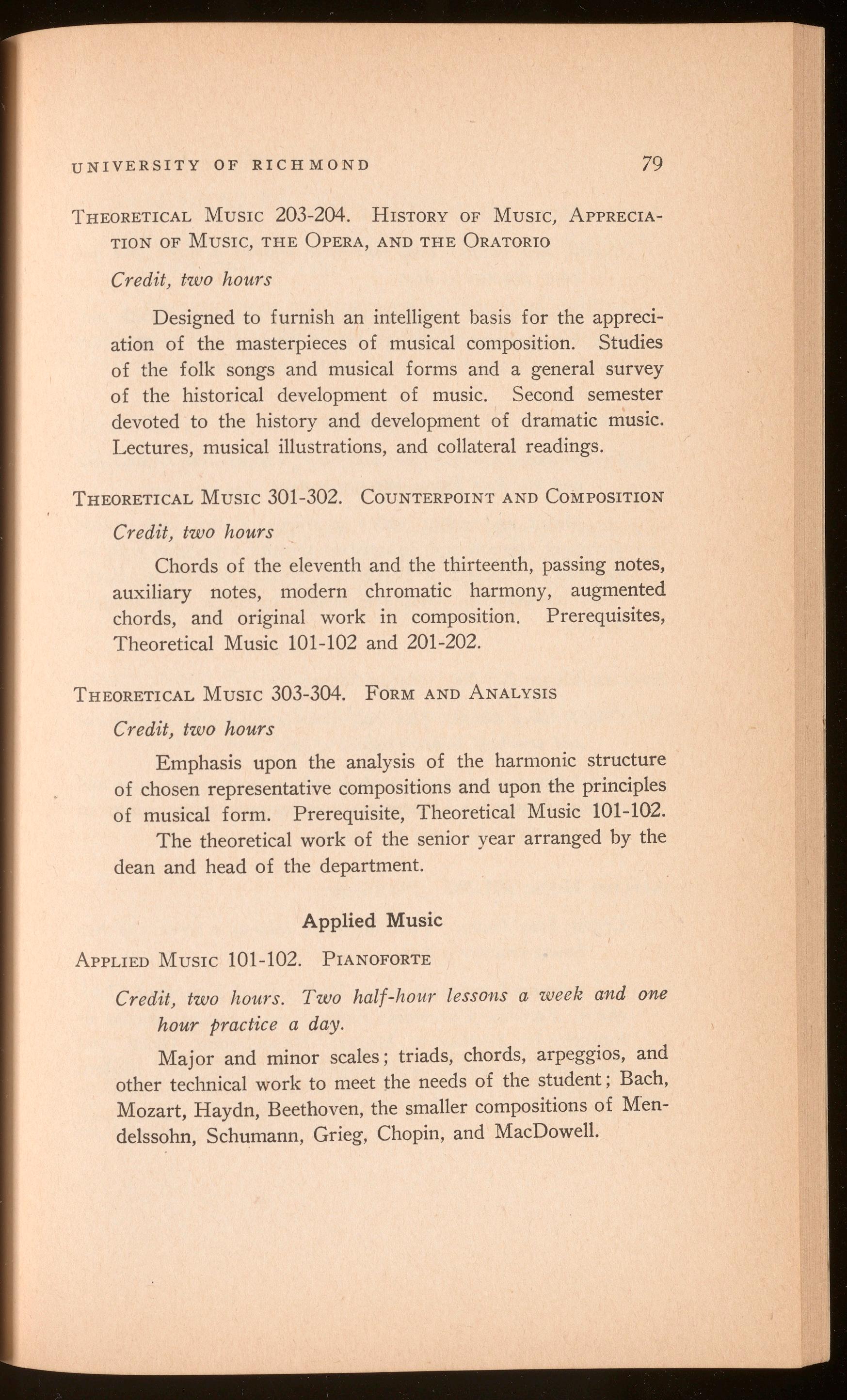
UNIVERSITY OF RICHMOND 79
THEORETICAL Musrc 203-204. HISTORY OF Music, APPRECIATION OF MUSIC, THE OPERA, AND THE ORATORIO
Credit, two hours
Designed to furnish an intelligent basis for the appreciation of the masterpieces of musical composition. Studies of the folk songs and musical forms and a general survey of the historical development of music. Second semester devoted to the history and development of dramatic music. Lectures, musical illustrations, and collateral readings.
THEORETICAL Musrc 301-302. CouNTERPOINT AND COMPOSITION
Credit, two hours
Chords of the eleventh and the thirteenth, passing notes, auxiliary notes, modern chromatic harmony, augmented chords, and original work in composition. Prerequisites, Theoretical Music 101-102 and 201-202.
THEORETICAL MUSIC 303-304. FORM AND ANALYSIS
Credit, two hours
Emphasis upon the analysis of the harmonic structure of chosen representative compositions and upon the principles of musical form. Prerequisite, Theoretical Music 101-102. The theoretical work of the senior year arranged by the dean and head of the department.
APPLIED MUSIC 101-102. PIANOFORTE
Credit, two hours. Two half-hour lesso-ns a week and one hour practice a day.
Major and minor scales; triads, chords, arpeggios, and other technical work to meet the needs of the student; Bach, Mozart, Haydn, Beethoven, the smaller compositions of Mendelssohn, Schumann, Grieg, Chopin, and MacDowell.

APPLIED Music 103-104. VocAL Music
Credit, two hours. Two half-hour lessons a week and one hour practice a day.
Fundamental principles of voice production; breath control, resonance and development of vowel forms; elementary vocalizes; songs from classic and modern literature.
APPLIED Music 201-202. PIANOFORTE
Credit, three hours. Two half-hour lessons a week and one and one-half hours practice a day.
Major and minor scales in thirds, sixths, and tenths; dominant seventh and diminished seventh arpeggios with inversions; a concerto by Beethoven, Mozart, or Haydn; Bach; other compositions from the classic, romantic, and modern schools.
APPLIEDMusic 203-204. VocAL Music
Credit, three hours. Two half-hour lessons a week and one and one-half hours practice a day.
Advanced vocalizes, scales and arpeggios, phrasing and diction; beginning of oratoria and operatic arias ; songs of moderate difficulty sung in English.
APPLIED Music 301-302. PIANOFORTE
Credit, four hours. Two half-hour lessons a week and two hours practice a day.
Advanced technical work; Bach's Well T e1npered Clavichord, Partitas, Chromatic Fantasie and Fugue; sonata or concerto by Beethoven, Mozart, M'endelssohn, Grieg, and MacDowell; concert compositions by classic and modern composers.
UNIVERSITY OF RICHMOND 81
APPLIED MUSIC 303-304. VOCAL MUSIC
Credit, four hours. Two half-hour lessons a week and two hours practice a day.
German lieder and songs in other modern languages ; diction and interpretation; opportunity to sing as soloist with choral organization.
APPLIED Music 305-306. PIANOFORTE
Credit, five hours. Two half-hour lessons a week and two and one-half hours practice a day.
The art and practice of ensemble playing; continued study of Bach's preludes and fugues; larger works of all schools. Opportunity of giving a public recital granted students who have completed this course.
APPLIED Music 307-308. VocAL Music
Credit, five hours. Two half-hour lessons a week and two and one-half hours practice a day.
Advanced oratorio and operatic arias ; interpretation, style, stage deportment; preparation for a graduation recital.

Note: Special arrangements may be made for lessons in organ or violin. Under the direction of the professor of vocal music, choral music is furnished for the Sunday vesper services. Students with good natural voices are eligible to participate. Particular care is taken that the music and the training shall be of permanent educational value. Credit of one semester hour is granted each year upon recommendation of the Department of Music.

PROF. R. E. LOVING, Chairma1t
Professor Bailey
Associate Professor Smart
Assistant Professor Myers
The work in this department falls into two divisions : zoology and botany. The foundation work of the department lies in general biology. The courses are planned with a view to pro- viding such knowledge of the science as is important from a purely cultural standpoint, and also to afford adequate training for students preparing to enter any profession or occupation based on biological science.
Requirements for major: three full years ( 30 semester hours) in the department, including one full year ( 10 semester hours) in general biology; e. g., Biology 101-102. The average grade for courses taken in the department to be C or better. A comprehensive examination covering the general field of biology to be taken during the spring semester of the senior year.
For advanced work in biology Chemistry 201-202 and 305- 306 or their equivalents, are highly desirable.
BIOLOGY 101-102. GENERAL BIOLOGY
Credit, ten hours. Three lecture-recitation periods a11d two laboratory periods a week.
The study of animals and plants as living organisms, with emphasis upon their structure, physiology, development, and behavior.
UNIVERSITY OF RICHMOND
BIOLOGY 203-204. COMPARATIVE ANATOMY OF VERTEBRATES
Credit, ten hours. Three lecture-recitation periods and two three hoiir laboratory periods a week. several systems of organs of representative vertebrates. Intended for advanced students in biology and for prospective medical students.
A thorough dissection and comparative study of the
BIOLOGY 205. BIOLOGY OF THE HIGHER
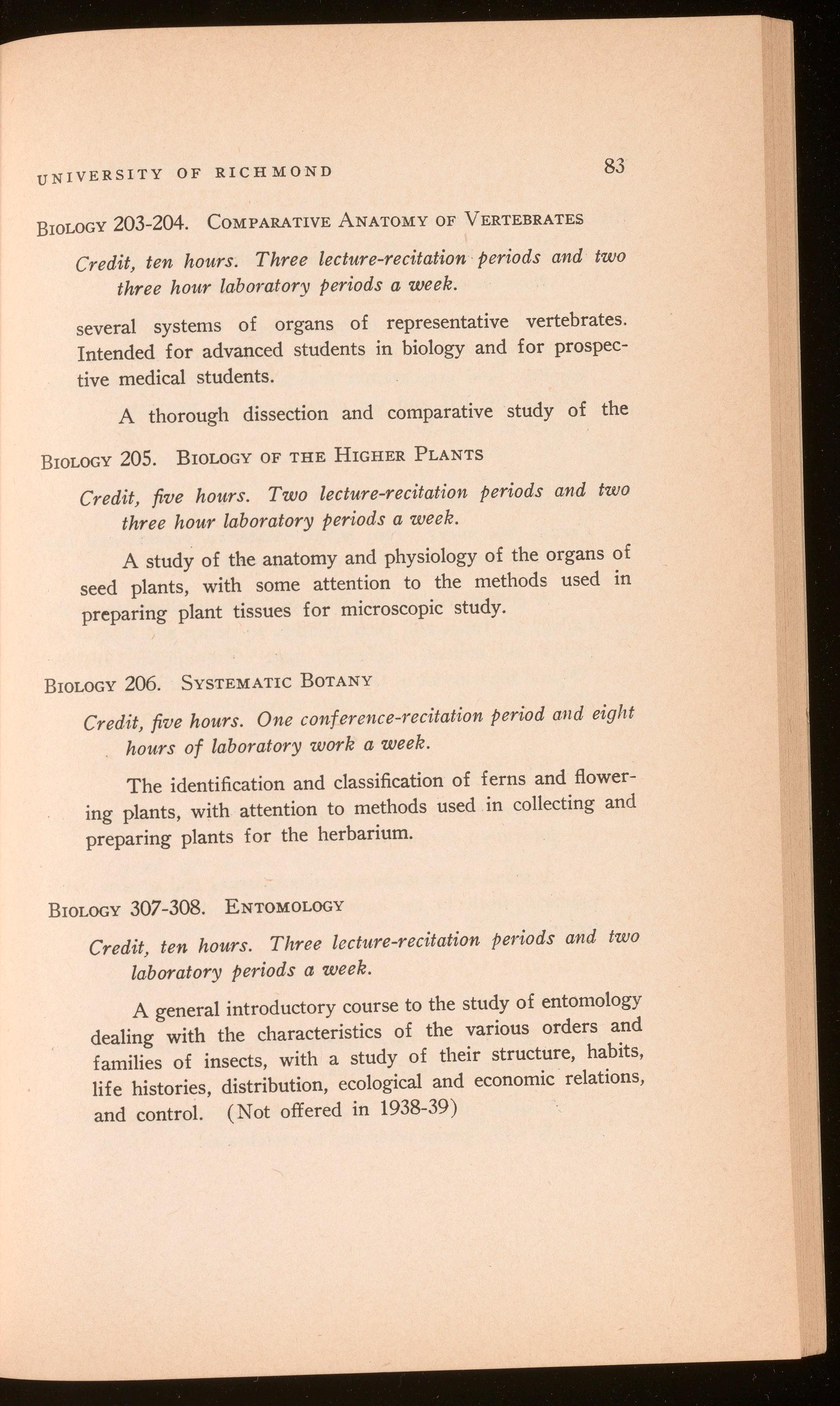
Credit, five hours. Two lecture-recitation periods and two three hour laboratory periods a week.
A study of the anatomy and physiology of the organs of seed plants, with some attention to the methods used in preparing plant tissues for microscopic study.
BIOLOGY 206. SYSTEMATIC BOTANY
Credit, five hours. One conference-recitation period and eight hours of laboratory work a week.
The identification and classification of ferns and flowering plants, with attention to methods used in collecting and preparing plants for the herbarium.
BIOLOGY 307-308. ENTOMOLOGY
Credit, ten hours. Three lecture-recitation periods and two laboratory periods a week.
A general introductory course to the study of entomology dealing with the characteristics of the various orders and families of insects, with a study of their structure, habits, life histories, distribution, ecological and economic relations, and control. (Not offered in 1938-39)

BIOLOGY 309. INTRODUCTION TO BACTERIOLOGY
Credit, five hours. Two lecture-recitation periods and two three hour laboratory periods a week.
A general course in bacteriology, with emphasis upon the biology of bacteria and their relation to water and milk supplies, food preservation, and public health. Prerequisite, Biology 101-102 and the consent of the instructor. (Not offered in 1938-39)
BIOLOGY 310. GENERAL MYCOLOGY
Credit, five hours. Two lecture-recitation periods and two three hour laboratory periods a week.
A general course in mycology, with emphasis upon the biology of fungi and their relation to decay and disease of plants and animals, including man. Prerequisite, Biology 309 and the consent of the instructor. (Not offered in 193839)
BIOLOGY 311. HISTOLOGY
Credit, five hours. Three lecture-recitation periods and two laboratory periods a week.
A microscopic study of animal tissues and organs, with practical work in the more usual methods of histological technique.
BIOLOGY 312. EMBRYOLOGY
Credit, five hours. Three lecture-recitation periods and two laboratory periods a week.
A study of general development and prganogenesis of animals, with special reference to vertebrates.
UNIVERSITY OF RICHMOND
BIOLOGY 313. HISTORY OF BIOLOGY
Credit, three hours. Three lecture-recitation per·iods a week.
A survey of the development of the science and of its literature.
BIOLOGY 314. GENETICS AND EUGENICS
Credit, three hours. Three lecture-recitation periods a week.
A study of heredity in animals and plants, with emphasis upon the origin of new races and the applications of the principles of genetics to animal and plant breeding and the betterment of human society.
BIOLOGY 315. ANIMAL TAXONOMY AND ECOLOGY
Credit, five hours. One conference-recitation period and eight hours of laboratory work a week.
The identification and classification of animals, with a study of their habits, distribution, relative abundance, and the conservation of wild life.
BIOLOGY 316. AQUATIC BIOLOGY
Credit, five hours. One lecture-recitation period and eight hours of laboratory work a week.
A general study of aquatic life, including methods of collecting, preserving, and identifying micro-organisms of lakes, ponds, and streams.
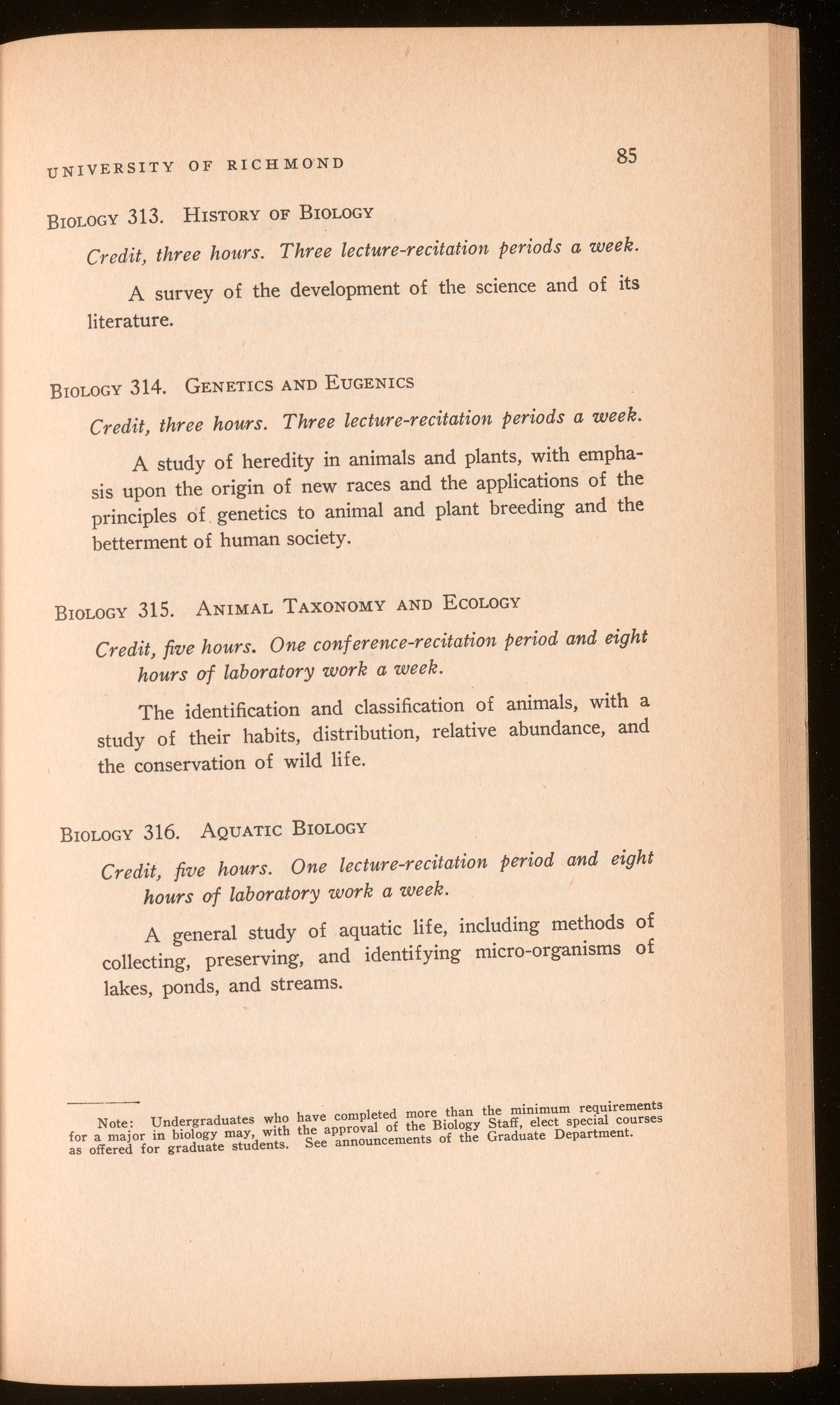
Note: Undergraduates who have completed more _than the minimum re<:iuirements for a major in biology may, with the approval of the Biology Staff, elect special courses as offered for graduate students. See announcements of the Graduate Department.
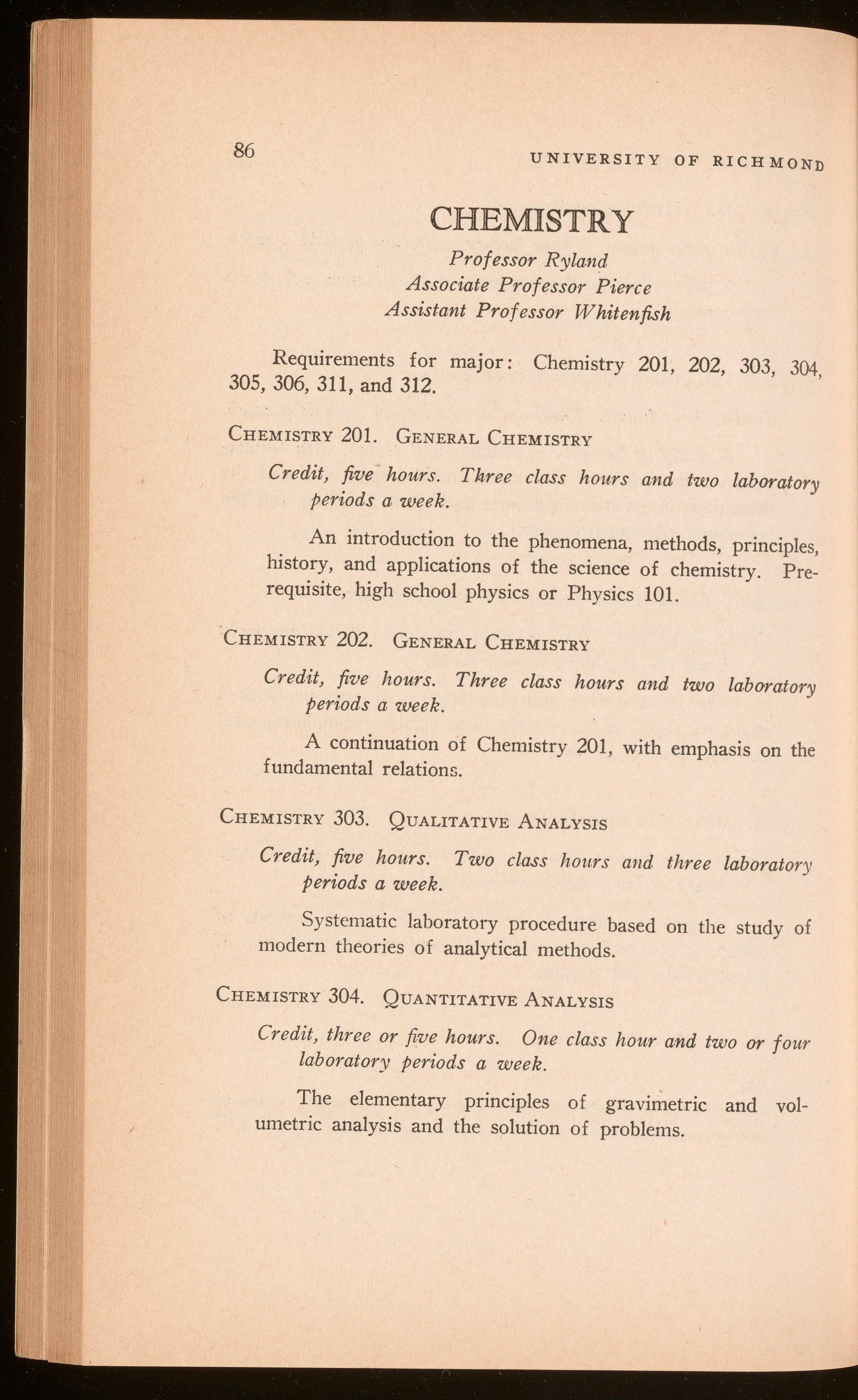
UNIVERSITY OF RICHMOND
Professor Ryland
Associate Professor Pierce
Assistant Professor Whitenfish
Requirements for major: Chemistry 201, 202, 303, 304, 305, 306, 311, and 312.
CHEMISTRY 201. GENERAL CHEMISTRY
Credit, five hours. Three class hours and two laboratory periods a week.
An introduction to the phenomena, methods, principles, history, and applications of the science of chemistry. Prerequisite, high school physics or Physics 101.
CHEMISTRY 202. GENERAL CHEMISTRY
Credit, five hours. Three class hours and two laboratory periods a week.
A continuation of Chemistry 201, with emphasis on the fundamental relations.
CHEMISTRY 303. QUALITATIVE ANALYSIS
Credit, five hours. Two class hours a11d three laboratory periods a week.
Systematic laboratory procedure based on the study of modern theories of analytical methods.
CHEMISTRY 304. QUANTITATIVE ANALYSIS
Credit, three or five hours. One class hour and two or four laboratory periods a week.
The elementary principles of gravimetric and volumetric analysis and the solution of problems.
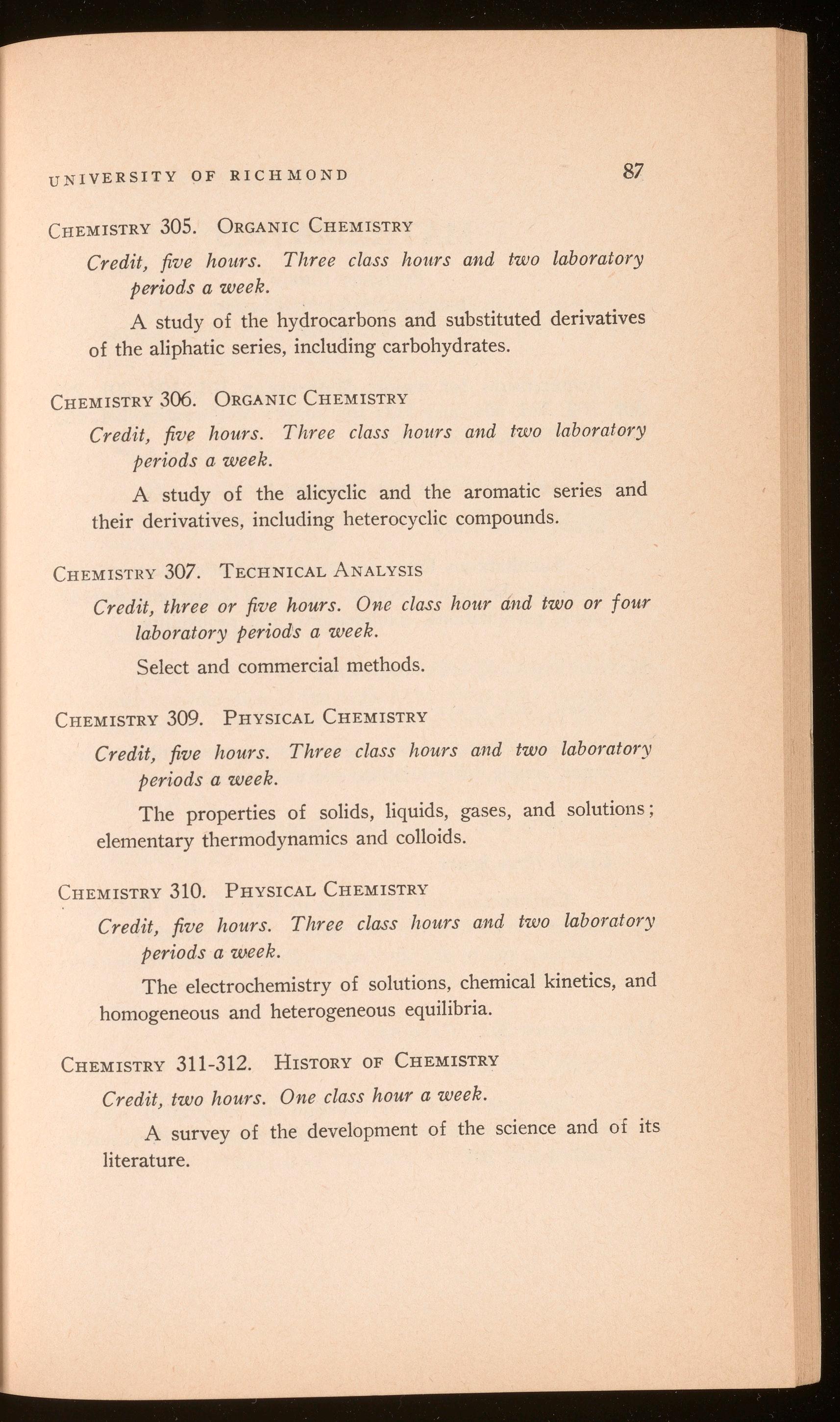
CHEMISTRY 305. ORGANIC CHEMISTRY
Credit, five hours. Three class hours and two laboratory periods a week.
A study of the hydrocarbons and substituted derivatives of the aliphatic series, including carbohydrates.
CHEMISTRY 306. ORGANIC CHEMISTRY
Credit, five hours. Three class hours and two laboratory periods a week.
A study of the alicyclic and the aromatic series and their derivatives, including heterocyclic compounds.
CHEMISTRY 307. TECHNICAL ANALYSIS
Credit, three or five hours. One class hour and two or four laboratory period's a week. Select and commercial methods.
CHEMISTRY 309. PHYSICAL CHEMISTRY
Credit, five hours. Three class hours and two laboratory periods a week .
The properties of solids, liquids, gases, and solutions; elementary thermodynamics and colloids.
C HEMISTRY 310. PHYSICAL CHEMISTRY
Credit, five hours. Three class hours and two laboratory periods a week.
The electrochemistry of solutions, chemical kinetics, and homogeneous and heterogeneous equilibria.
CHEMISTRY 311-312. HISTORY OF CHEMISTRY
Credit , two hours. One class hour a week.
A survey of the development of the science and of its literature.

UNIVERSITY OF RICHMOND
Professor Gaines
Associate Professor Wheeler
Mr. Ritter
Requirements for major: Mathematics 101, 102, 201, 202, 301, 302, 303, 304, and 312; for minor: Mathematics 101, 102, 201, 202, 301, and 302 or 304.
MATHEMATICS 101. COLLEGE ALGEBRA
Credit, three hours
Simultaneous linear equations, quadratic equations, progressions, binomial theorem, theory of equations, determinants, permutations, combinations, and probability.
MATHEMATICS 102. TRIGONOMETRY
Credit, three hours
Logarithms, plane trigonometry, rectangular coordinates, simple differentiation, and integration.
MATHEMATICS 201. ANALYTICAL GEOMETRY
Credit, three hours
Construction and discussion of loci; straight line, circle, simpler properties of the conics, transformation of coordinates, and polar coordinates. Prerequisites, Mathematics 101 and 102.
MATHEMATICS 202. CALCULUS
Credit, three hours
The methods of differentiation and integration, maxima and minima, rates, and partial differentiation. Prerequisite, Mathematics 201.
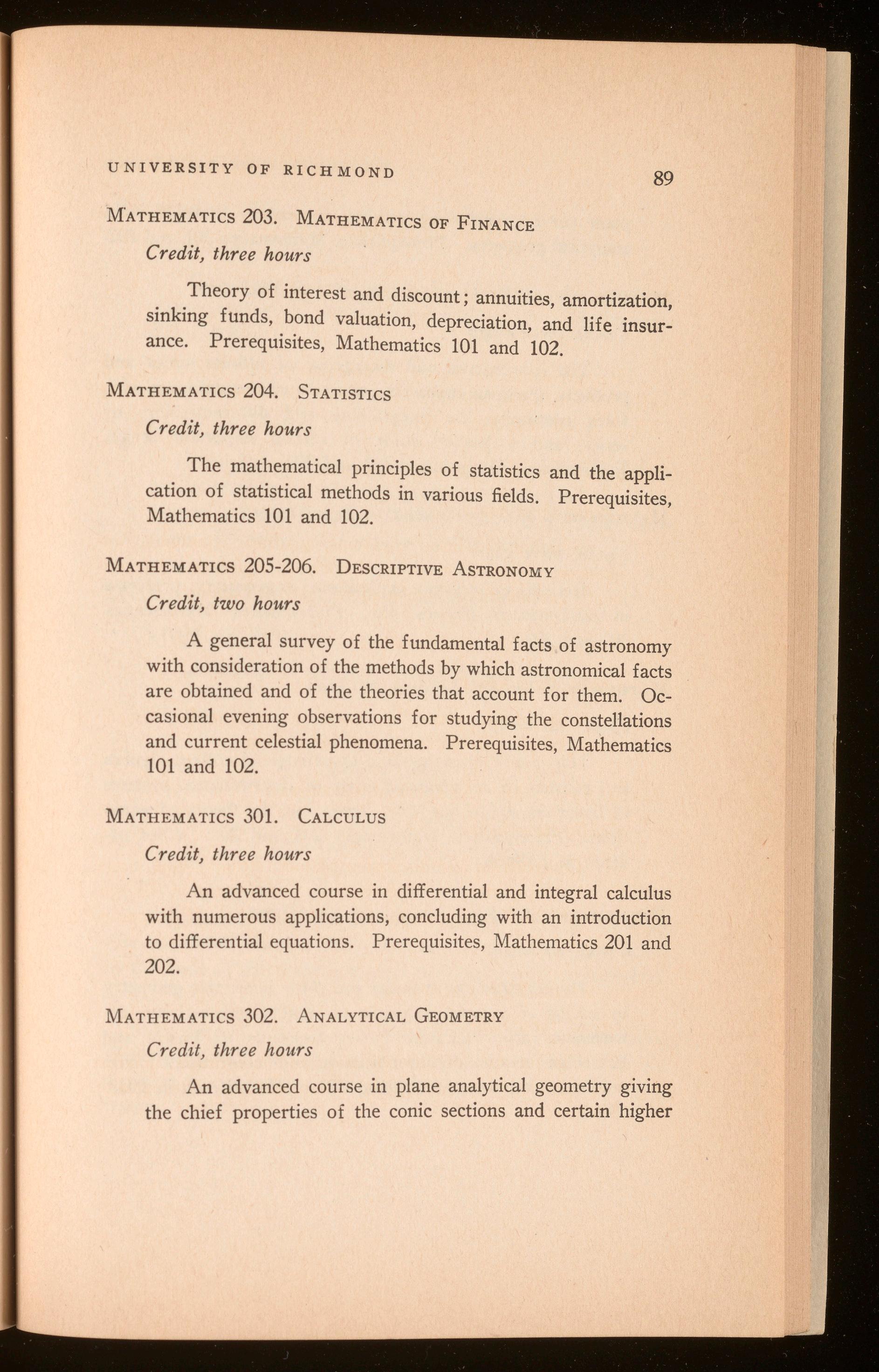
UNIVERSITY OF RICHMOND
M'ATHEMATICS 203. MATHEMATICS OF FINANCE
Credit, three hours 89
Theory of interest and discount; annuities, amortization, sinking funds, bond valuation, depreciation, and life insur- ance. Prerequisites, Mathematics 101 and 102.
MATHEMATICS 204. STATISTICS
Credit, three hours
The mathematical principles of statistics and the appli- cation of statistical methods in various fields. Prerequisites, Mathematics 101 and 102.
MATHEMATICS 205-206. DESCRIPTIVE ASTRONOMY
Credit, two hours
A general survey of the fundamental facts of astronomy with consideration of the methods by which astronomical facts are obtained and of the theories that account for them. Occasional evening observations for studying the constellations and current celestial phenomena. Prerequisites, Mathematics 101 and 102.
MATHEMATICS 301. CALCULUS
Credit, three hours
An advanced course in differential and integral calculus with numerous applications, concluding with an introduction to differential equations. Prerequisites, Mathematics 201 and 202.
MATHEMATICS 302. ANALYTICAL GEOMETRY
Credit, three hours
An advanced course in plane analytical geometry giving the chief properties of the conic sections and certain higher
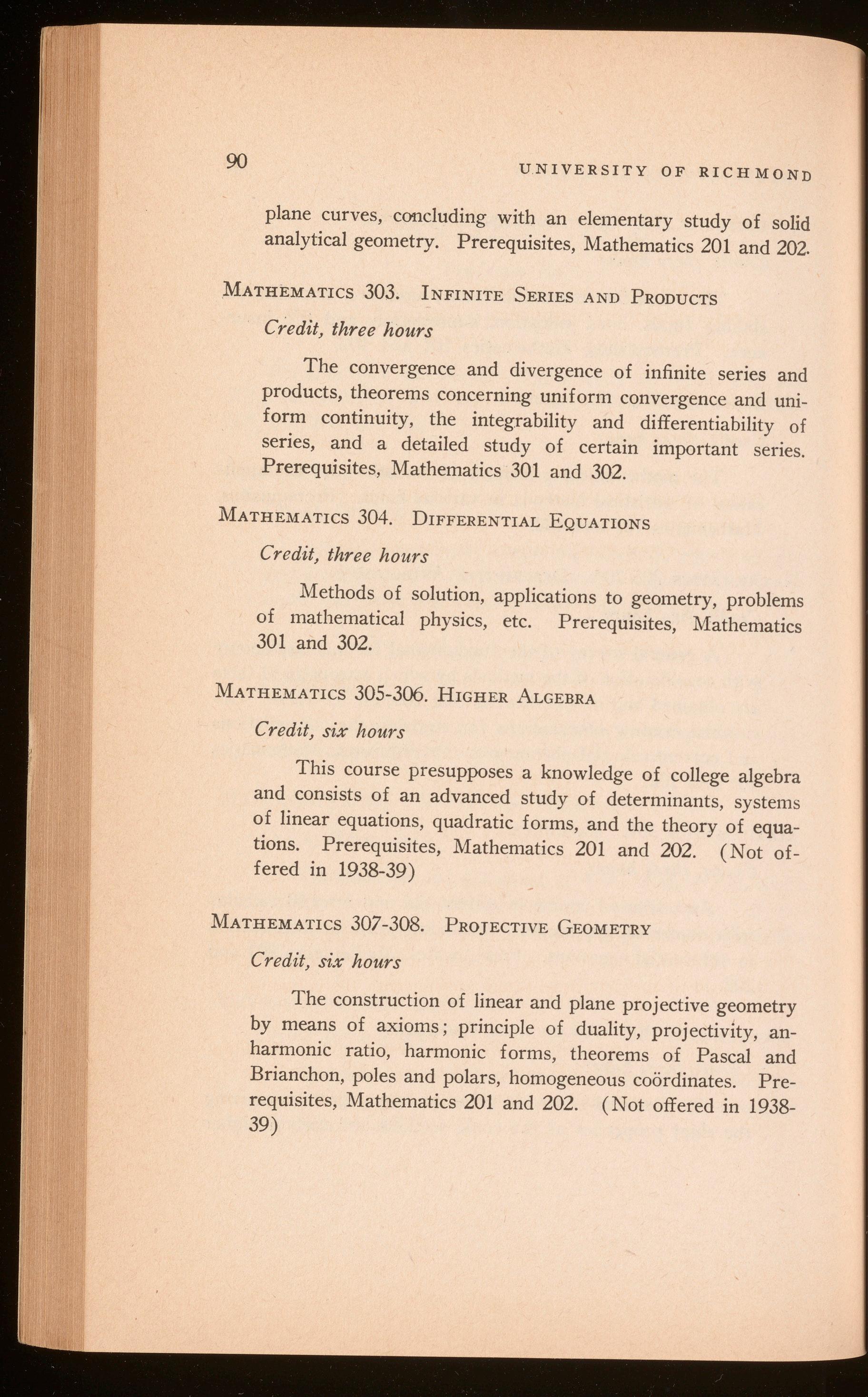
UNIVERSITY OF RICHMOND
plane curves, concluding with an elementary study of solid analytical geometry. Prerequisites, Mathematics 201 and 202.
MATHEMATICS 303. INFINITE SERIES AND PRODUCTS
Credit, three hours
The convergence and divergence of infinite series and products, theorems concerning uniform convergence and uni- form continuity, the integrability and differentiability of series, and a detailed study of certain important series. Prerequisites, Mathematics 301 and 302.
MATHEMATICS 304. DIFFERENTIAL EQUATIONS
Credit, three hours
Methods of solution, applications to geometry, problems of mathematical physics , etc. Prerequisites, Mathematics 301 and 302.
MATHEMATICS 305-306. HIGHER ALGEBRA
Credit, six hours
This course presupposes a knowledge of college algebra and consists of an advanced study of determinants, system s of linear equations, quadratic forms, and the theory of equa- tions. Prerequisites, Mathematics 201 and 202 . (Not of- fered in 1938-39)
MATHEMATICS 307-308. PROJECTIVE GEOMETRY
Credit, six hours
The construction of linear and plane projective geometry by means of axioms; principle of duality, projectivity, an- harmonic ratio, harmonic forms , theorems of Pascal and Brianchon, poles and polars, homogeneous coordinates . Prerequisites, Mathematics 201 and 202. (Not offered in 1938- 39)
UNIVERSITY OF RICHMOND
:MATHEMATICS 309. Soun ANALYTIC GEOMETRY
Credit, three hours
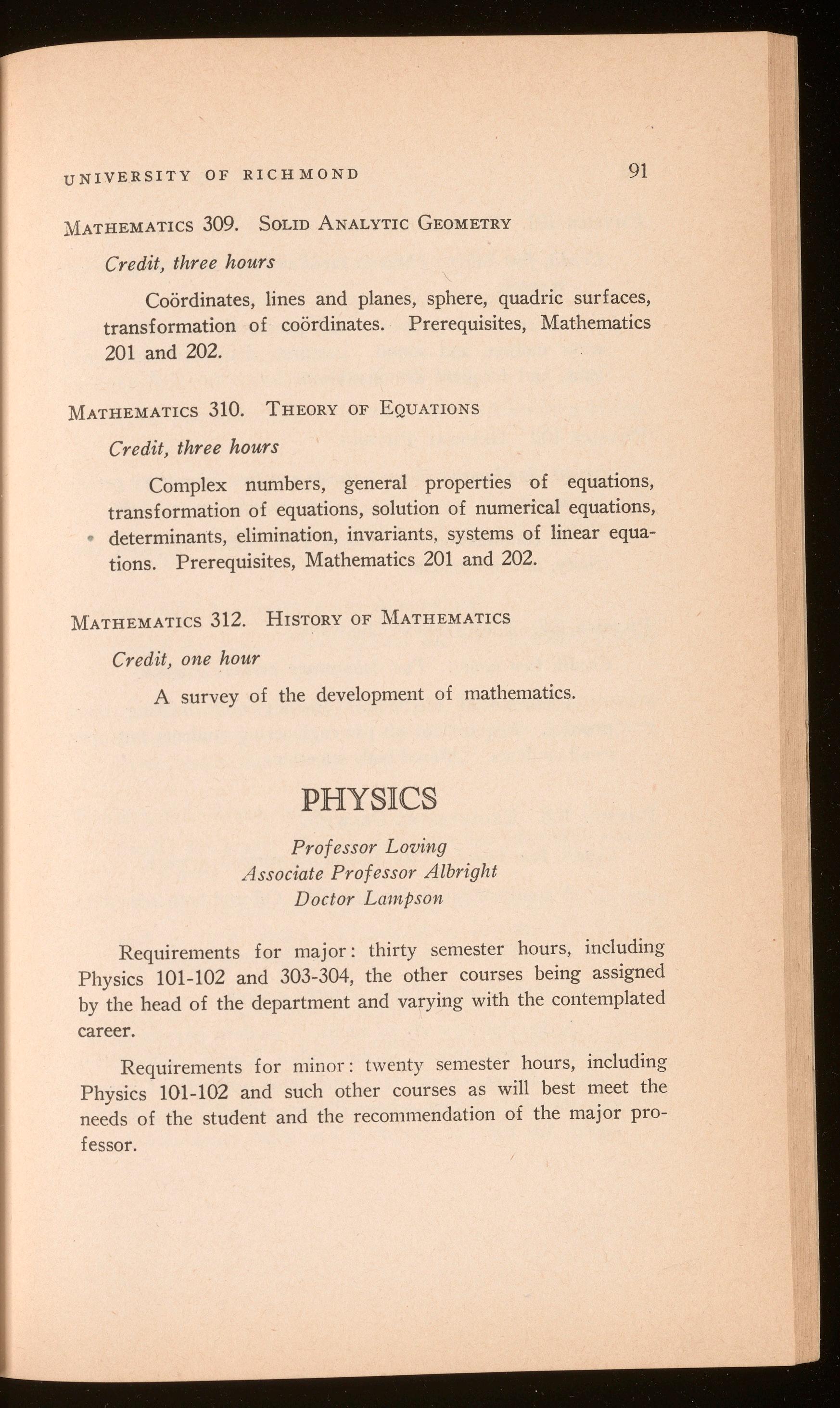
91
Coordinates, lines and planes, sphere, quadric surfaces, transformation of coordinates. Prerequisites, Mathematics 201 and 202.
MATHEMATICS 310. THEORY OF EQUATIONS
Credit, three hours
Complex numbers, general properties of equations, transformation of equations, solution of numerical equations, • determinants, elimination, invariants, systems of linear equations. Prerequisites, Mathematics 201 and 202.
MATHEMATICS 312. HISTORY OF MATHEMATICS
Credit, one hour
A survey of the development of mathematics.
Professor Loving Associate Professor Albright Doctor Lampson
Requirements for major: thirty semester hours, including Physics 101-102 and 303-304, the other courses being assigned by the head of the department and varying with the contemplated career.
Requirements for minor: twenty semester hours, including Physics 101-102 and such other courses as will best meet the needs of the student and the recommendation of the major professor.

PHYSICS 101. GENERAL PHYSICS
Credit, five hours. Three lectures and two laboratory periods a week.
A study of mechanics and properties of matter, heat, wave motion, and sound. Lectures, demonstrations, problems, and frequent demonstration.
PHYSICS 102. GENERAL PHYSICS
Credit, five hours. Three lectures and two laboratory periods a week.
A continuation of Physics 101, embracing light, electricity, and magnetism.
PHYSICS 107. ENGINEERING DRAWING
Credit, two hours. Two laboratory periods a week. Elements of mechanical drawing and drafting room practice. Required of all pre-engineering students but open to all students. Offered both semesters.
PHYSICS 108. ENGINEERING DRAWING
Credit, two hours. Two laboratory periods a week. A continuation of Physics 107. Offered both semesters.
PHYSICS 201. ELEMENTS OF MODERN PHYSICS
Credit, three hours. Three lectures a week.
A descriptive study of topics in modern physics including the electron theory, vacuum tubes, X-rays, radioactivity, nuclear physics, cosmic rays, and other subjects of present day interest. Prerequisites, Physics 101-102 and Mathematics 101-102.
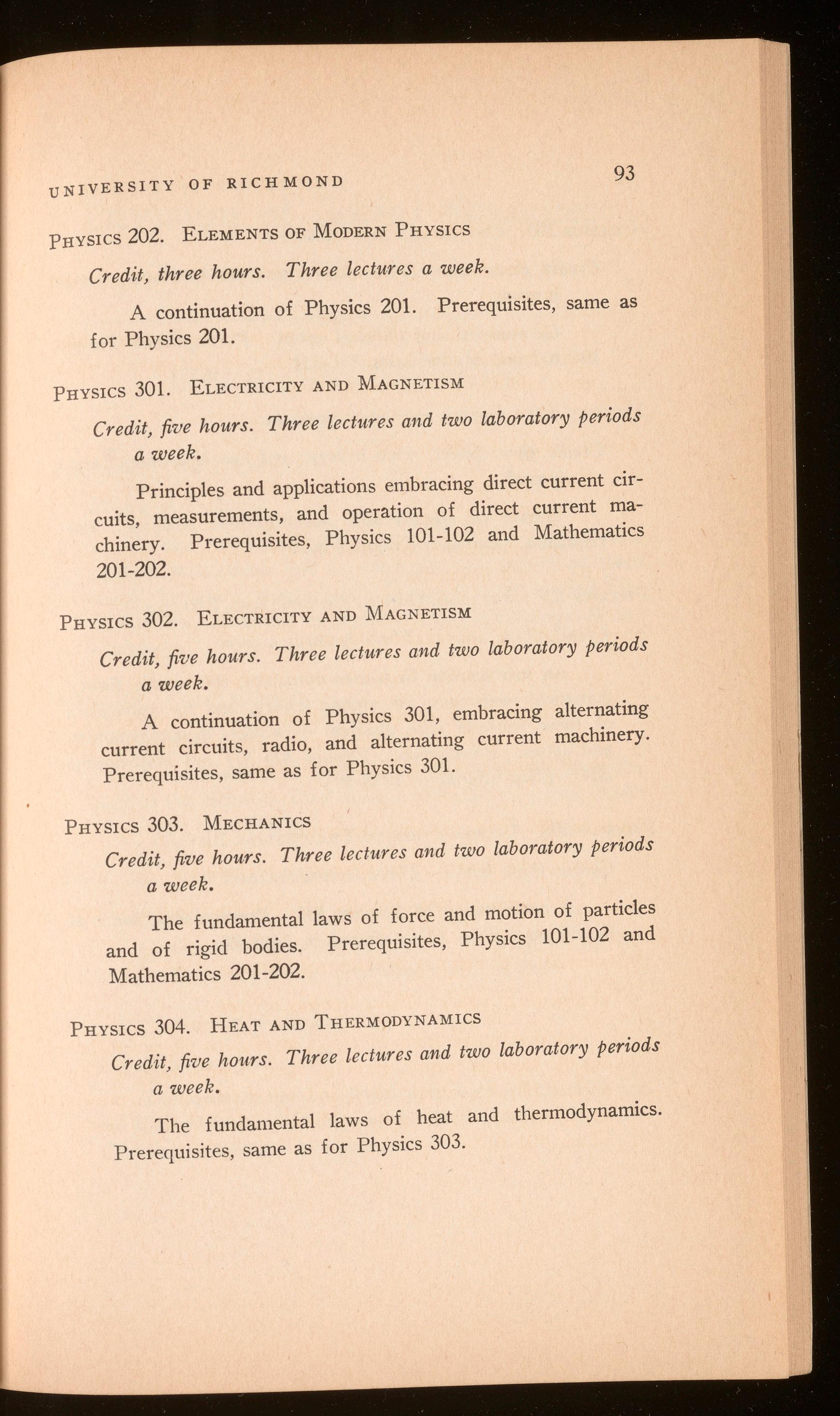
UNIVERSITY OF RICHMOND
PHYSICS 202. ELEMENTS OF MODERN PHYSICS
Credit, three hours. Three lectures a week. 93
A continuation of Physics 201. Prerequisites, same as for Physics 201.
PHYSICS 301. ELECTRICITY AND MAGNETISM
Credit, five hours. Three lectures and two laboratory periods a week.
Principles and applications embracing direct current circuits, measurements, and operation of direct current machinery. Prerequisites, Physics 101-102 and Mathematics 201-202.
PHYSICS 302. ELECTRICITY AND MAGNETISM
Credit, five hours. Three lectures and two laboratory periods a week.
A continuation of Physics 301, embracing alternating current circuits, radio, and alternating current machinery. Prerequisites, same as for Physics 301.
PHYSICS 303. MECHANICS
Credit, five hours. Three lectures and two laboratory periods a week.
The fundamental laws of force and motion of particles and of rigid bodies. Prerequisites, Physics 101-102 and Mathematics 201-202.
PHYSICS 304. HEAT AND THERMODYNAMICS
Credit, five hours. Three lectures and two laboratory periods a week.
The fundamental laws of heat and thermodynamics. Prerequisites, same as for Physics 303.

PHYSICS 305. OPTICS AND SPECTROSCOPY
Credit, three hours. Two lectures and one laboratory period a week.
Geometrical and physical optics. Prerequisites, Physics 101-102 and Mathematics 201-202.
PHYSICS 306. OPTICS AND SPECTROSCOPY
Credit, three hours. Two lectures and one laboratory period a week.
Theory of spectra and spectrographic analysis. Pre- requisites, same as for Physics 305.
PHYSICS 307. INTRODUCTION TO THEORETICAL PHYSICS
Credit, three hours. Three lectures a week .
An introduction to electro-dynamics, the kinetic theory, statistical mechanics, the atomic theory, and the correlation of these subjects with classical dynamics, thermodynamics, and optics. Prerequisites, Physics 303-304 and Mathematics 304. (Not offered in 1938-39)
PHYSICS 308. INTRODUCTION TO THEORETICAL PHYSICS
Credit, three hours. Three lectures a week.
A continuation of Physics 307. Prerequisites, same as for Physics 307. (Not offered in 1938-39)

PROFESSOR B. C. HoLTZCLAW, Chairman ·
Professor Cousins
BIBLE 101. OLD TESTAMENT
Credit, three hours
A study of the Hebrew people, their early religious and political institutions, and the character and content of their sacred literature, especially the historical books of the Old Testament. Attention is given to the contributions of archaeology.
BIBLE 102. OLD TESTAMENT
Credit, three hoitrs
A continuation of Bible 101, dealing with the later history of the Hebrews, their wisdom literature, and their books of prophecy and poetry.
BIBLE 103. NEW TESTAMENT
Credit, three hours
Christianity according to Christ. A study of the life and teachings of Jesus, as presented in the Gospels.
BIBLE 104. NEW TESTAMENT
Credit, three hours
The apostolic age as presented in Acts and the Epistles, the life and letters of Paul, and the development of the early Christian institutions and customs.
%
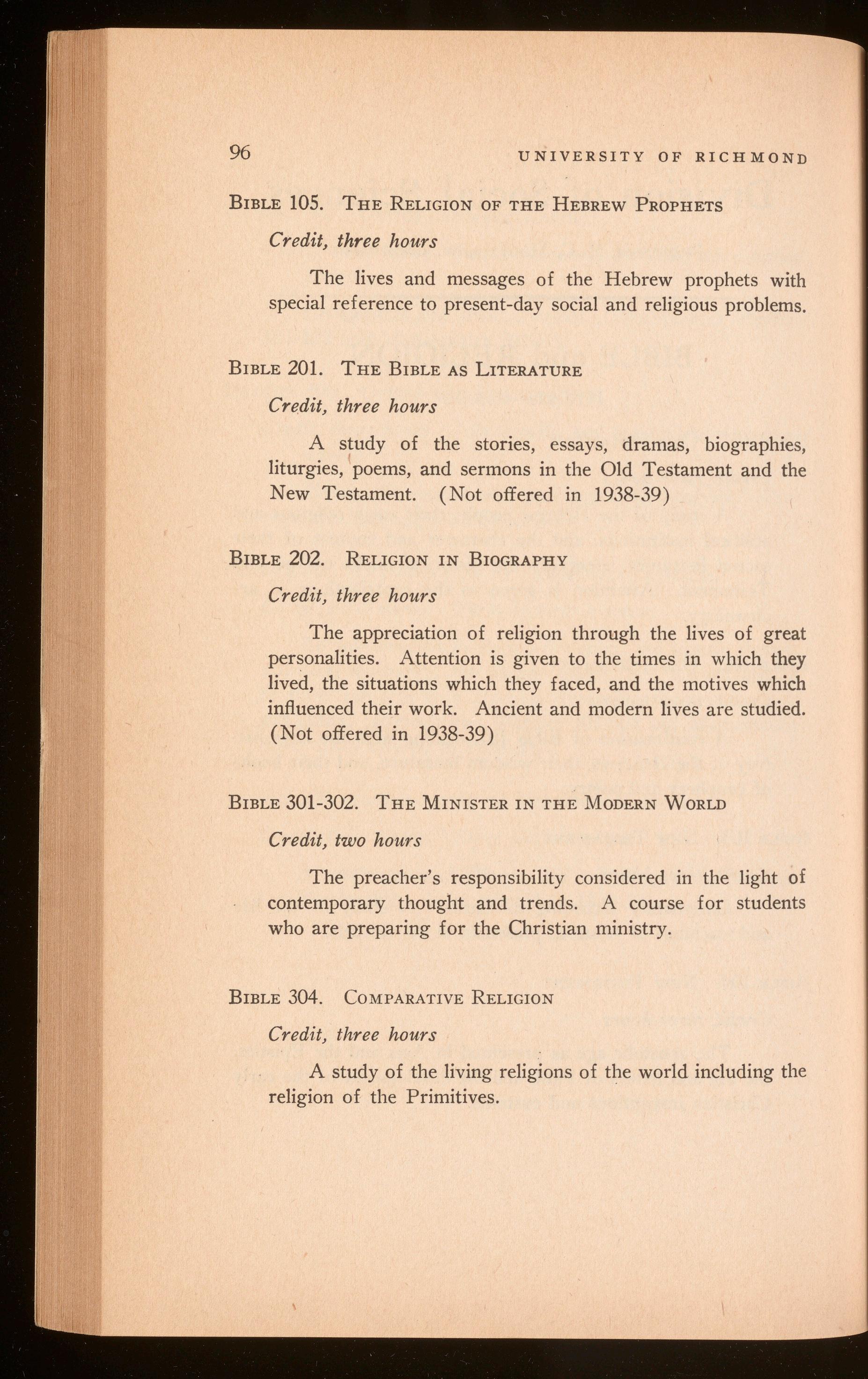
UNIVERSITY OF RICHMOND
BIBLE 105. THE RELIGION OF THE HEBREW PROPHETS
Credit, three hours
The lives and messages of the Hebrew prophets with special reference to present-day social and religious problems.
BIBLE 201. THE BIBLE AS LITERATURE
Credit, three hours
A study of the stories, essays, dramas, biographies, liturgies, poems, and sermons in the Old Testament and the New Testament. (Not offered in 1938-39)
BIBLE 202. RELIGION IN BIOGRAPHY
Credit, three hours
The appreciation of religion through the lives of great personalities. Attention is given to the times in which they lived, the situations which they faced, and the motives which influenced their work. Ancient and modern lives are studied. (Not offered in 1938-39)
BIBLE 301-302. THE MINISTER IN THE MODERN WORLD
Credit, two hours
The preacher's responsibility considered in the light of contemporary thought and trends. A course for students who are preparing for the Christian ministry.
BIBLE 304. COMPARATIVE RELIGION
Credit, three hours
A study of the living religions of the world including the religion of the Primitives.

UNIVERSITY OF RICHMOND
Professor Corson
Professor Pinchbeck
Professor Wray
Associate Professor Thowias
Assistant Professor Worsley
Assistant Professor Ellett
Mr Mays
Afr. Bronson
Requirements for major: for the B.A. degree, twenty-four semester hours in economics, including Economics 201-202. Mathematics 203-204 and Applied Economics 203-204 are recommended for students planning to pursue graduate work in economics.
For the B.S in Business Administration degree, see page 44.
All students majoring in economics and applied economics are requested to confer with members of the departmental faculty and to complete satisfactorily work assigned by the head of the department and intended to coordinate and integrate their studies in this field.
E CONO M ICS 101. IND U STRIAL HISTORY OF THE UNITED STATES
Cr edit , three hours
A survey of the industrial devdopment of Europe and England to the period of American colonization followed by a study of the growth of American industries up to 1860.

U NIVER SIT Y OF RIC H MOND
ECONOMICS102. INDUSTRIALHISTORY OF THE UNITED STATES
Credit, three hours
A study of the industries of the United States from 1860 to the present time.
ECONOMICS201. PRINCIPLES OF ECONOMICS
Credit, three hours
Fundamental economic principles and problems which characterize the structure and functioning of the present economic system, including a description of the science, its historical background, value, the economic characteristics of government, business organization, price, money, banking , and foreign exchange.
ECONOMICS202. ECONOMIC PROBLEMSAND POLICIES
Credit, three hours
A continuation of Economics 201, with emphasis on the fundamental principles underlying economic distribution and consumption, including a survey of public utilities, trans- portation, public finance, labor problems, social insurance, and proposals for economic reform.
Ecoxo11ncs 301. MONEY
Credit, three hours
The history of exchange and the evolution of money, with special attention to various monetary standards, princi- ples of note issue, value of money, business cycles, desirability of the control of credit, foreign exchange, and mone- tary changes since 1932.
UNIVERSITY OF RICHMOND
EcoNOMICS 302. BANKING
Credit, three hours
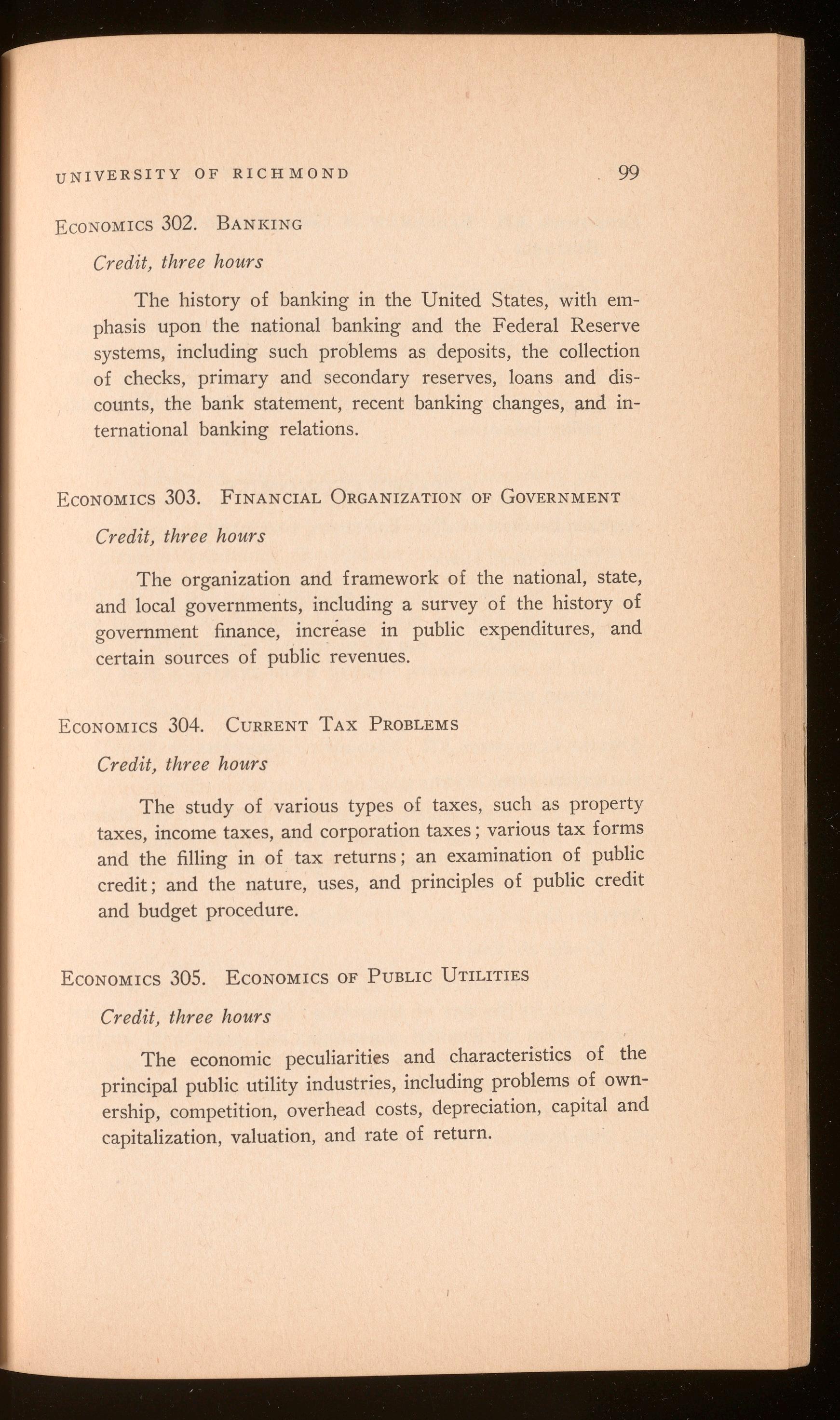
99
The history of banking in the United States, with emphasis upon the national banking and the Federal Reserve systems, including such problems as deposits, the collection of checks, primary and secondary reserves, loans and discounts, the bank statement, recent banking changes, and international banking relations.
ECONOMICS 303. FINANCIAL ORGANIZATION OF GOVERNMENT
Credit, three hours
The organization and framework of the national, state, and local governments, including a survey of the history of government finance, increase in public expenditures, and certain sources of public revenues.
ECONOMICS 304 CURRENT TAX PROBLEMS
Credit, three hours
The study of various types of taxes, such as property taxes, income taxes, and corporation taxes; various tax forms and the filling in of tax returns ; an examination of public credit; and the nature, uses, and principles of public credit and budget procedure.
ECONOMICS 305. ECONOMICS OF PUBLIC UTILITIES
Credit, three hours
The economic peculiarities and characteristics of the principal public utility industries, including problems of ownership, competition, overhead costs, depreciation, capital and capitalization, valuation, and rate of return.

1()() UNIVERSITY OF RICHMOND
ECONOMICS 306. ECONOMICS OF GoVERNMENT REGULATION OF BUSINESS
Credit, three hours
The economic basis for the regulation of private businesses and the elements of a sound public policy toward business, with particular attention to the economic theory underlying federal and state regulation of the principal public utility industries-
APPLIED ECONOMICS 201. ECONOMIC GEOGRAPHY
Credit, three hours
The fundamentals of geography applied to the study of North America, with special emphasis on physical geography, climatology, sources of natural resources in the world, and the environmental basis of social geography as it affects human relations.
APPLIED ECONOMICS 202. ECONOMIC GEOGRAPHY
Credit, three hours
The fundamentals of geography applied to the study of the world outside of North America, with emphasis on the same factors as outlined for Applied Economics 201.
APPLIED ECONOMICS 203-204. PRINCIPLES OF ACCOUNTING
Credit, six hours
An introduction to the study of accounting, with emphasis on the uses of accounting; the preparation and interpretation of financial statements; and practice in applying the principles of double entry bookkeeping to the sole proprietorship, partnership, manufacturing, and corporate forms of business organization. The practice set constitutes an important part of the student's work.

APPLIED ECONOMICS 301-302. BUSINESS LAW
Credit, six hours
The study of contracts, sales, agency, negotiable instruments, insurance, partnerships, corporations, property, wills, etc. Prerequisite, Economics 101-102 or 201-202.
APPLIED EcoNOMICS 303-304. ADVANCED AccouNTING
Credit, six hours
Advanced theory applicable to the accounting process, illustrated and supplemented with graded problems and including such topics as financial and income statements, corporation accounting, classification of current asset accounts, consignments, installment sales, tangible and intangible fixed assets, investments, liabilities, funds, reserves, comparative statements, and application of funds. Prerequisite, Applied Economics 203-204.
APPLIED ECONOMICS 305. INTRODUCTORY COST ACCOUNTING
Credit, three hours
Specific order cost accounting and process cost accounting, with emphasis on the accounting for material and labor, valuation of materials, manufacturing expense, controls, preparation of analytical statements, and standard costs. Prerequisites, Applied Economics 203-204 and 303-304, except by permission of the professor.
APPLIED ECONOMICS 306. AUDITING
Credit, three hours
The principles and practice of auditing, supplemented with problems and questions applicable to the various classes of audits, but more especially to the balance sheet audit. Attention given to procedure in closing an audit and in the construction of an audit report. Working papers and
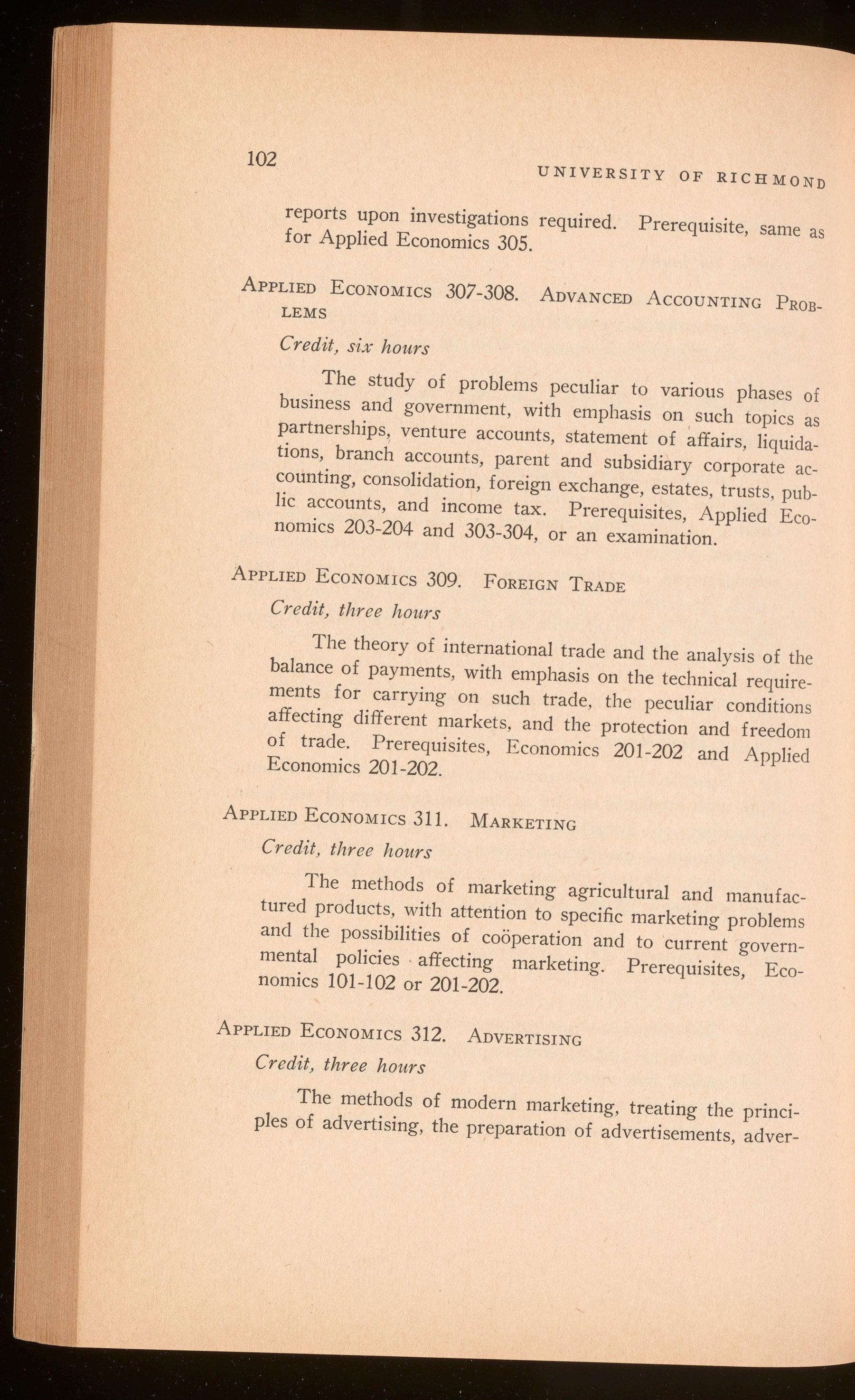
UNIVERSITY OF RICHMOND
reports upon investigations required. Prerequisite, same as for Applied Economics 305.
APPLIED ECONOMICS 307-308. ADVANCED ACCOUNTING PROB- LEMS
Credit, six hours
The study of problems peculiar to various phases of business and government, with emphasis on such topics as partnerships, venture accounts, statement of affairs, liquida- tions, branch accounts, parent and subsidiary corporate ac- counting, consolidation, foreign exchange, estates, trusts, pub- lic accounts, and income tax. Prerequisites, Applied Eco- nomics 203-204 and 303-304, or an examination.
APPLIED ECONOMICS 309. FOREIGN TRADE
Credit, three hours
The theory of international trade and the analysis of the balance of payments, with emphasis on the technical require- ments for carrying on such trade, the peculiar conditions affecting different markets, and the protection and freedom of trade. Prerequisites, Economics 201-202 and Applied Economics 201-202.
APPLIED ECONOMICS 311. MARKETING
Credit, three hours
The methods of marketing agricultural and manufac- tured products, with attention to specific marketing problems and the possibilities of cooperation and to current govern- mental policies . affecting marketing. Prerequisites, Eco- nomics 101-102 or 201-202.
APPLIED ECONOMICS 312. ADVERTISING
Credit, three hours
The methods of modern marketing, treating the princi- ples of advertising, the preparation of advertisements, adver-

tising media, the advertising organization, and specific advertising campaigns. Prerequisites, Economics 101-102 or Economics 201-202 and Applied Economics 310.
APPLIED ECONOMICS 313. LIFE INSURANCE PRINCIPLES AND PRACTICES
Credit, three hours
A study of the uses of insurance, its fundamental principles, types of organization, management of the insurance business, types of life insurance policies, the computation of premiums, reserves, surrender values, loan values, surplus, and dividends. Prerequisite, Economics 201-202.
APPLIED ECONOMICS 314. PROPERTY AND CASUALTY INSURANCE
Credit, three hours
A study of fire and property insurance, marine insurance, and casualty insurance; the contracts, laws, salesmanship, settlement of claims, reserves, rates, investments and management of fire, marine. and casualty insurance businesses. Prerequisites, Economics 201-202.
APPLIED ECONOMICS 315-316. CORPORATION FINANCE
Credit, three hours
A study of corporate organization, corporation securities. legal aspects of modern corporation financing, security marketing, functions of underwriting, brokerage houses, and stock exchanges. Prerequisites. Economics 201-202 and Applied Economics 203-204 and 301-302.
APPLIED ECONOMICS 317. SOCIAL ASPECTS OF INDUSTRY
Credit, three hours
A study of the nature and history of modern capitalism and industrialism; population and immigration as related to labor supply ; wages and the distribution of the national

wealth and income ; human conservation problems and legislation; unemployment; labor organizations; industrial strife, and the settlement of labor disputes; co-operation, socialism, communism, and fascism as types of social reform. ( Credit cannot be allowed for both Applied Economics 317 and Sociology 309.)
APPLIED ECONOMICS 318. LABOR LEGISLATION AND PERSONNEL MANAGEMENT
Credit, three hours
A study of labor laws, and court decisions thereon, of state and federal governments; the relations of employer and employee; agencies and methods of promoting industrial peace ; and personnel systems for the organization and management of labor. Prerequisite, Economics 201-202. (Not offered in 1938-39)
APPLIED ECONOMICS 3J.9. OWNERSHIP ORGANIZATION AND MANAGEMENT
Credit, three hours
A study of capital as the foundation of ownership organization ; the single proprietor ; the partnership ; securityissuing organizations, including the joint stock company, the corporation, and the business trust; business combinations through associations, factors' agreements, pools, kartels, and syndicates; investment trusts; finance and assumption companies; and abuses and their remedies. Prerequisite, Economics 201-202.
APPLIED ECONOMICS 320. OPERATING ORGANIZATION AND MANAGEMENT
Credit, three hours
A study of the internal organization of manufacturing companies, from a production viewpoint, including plant
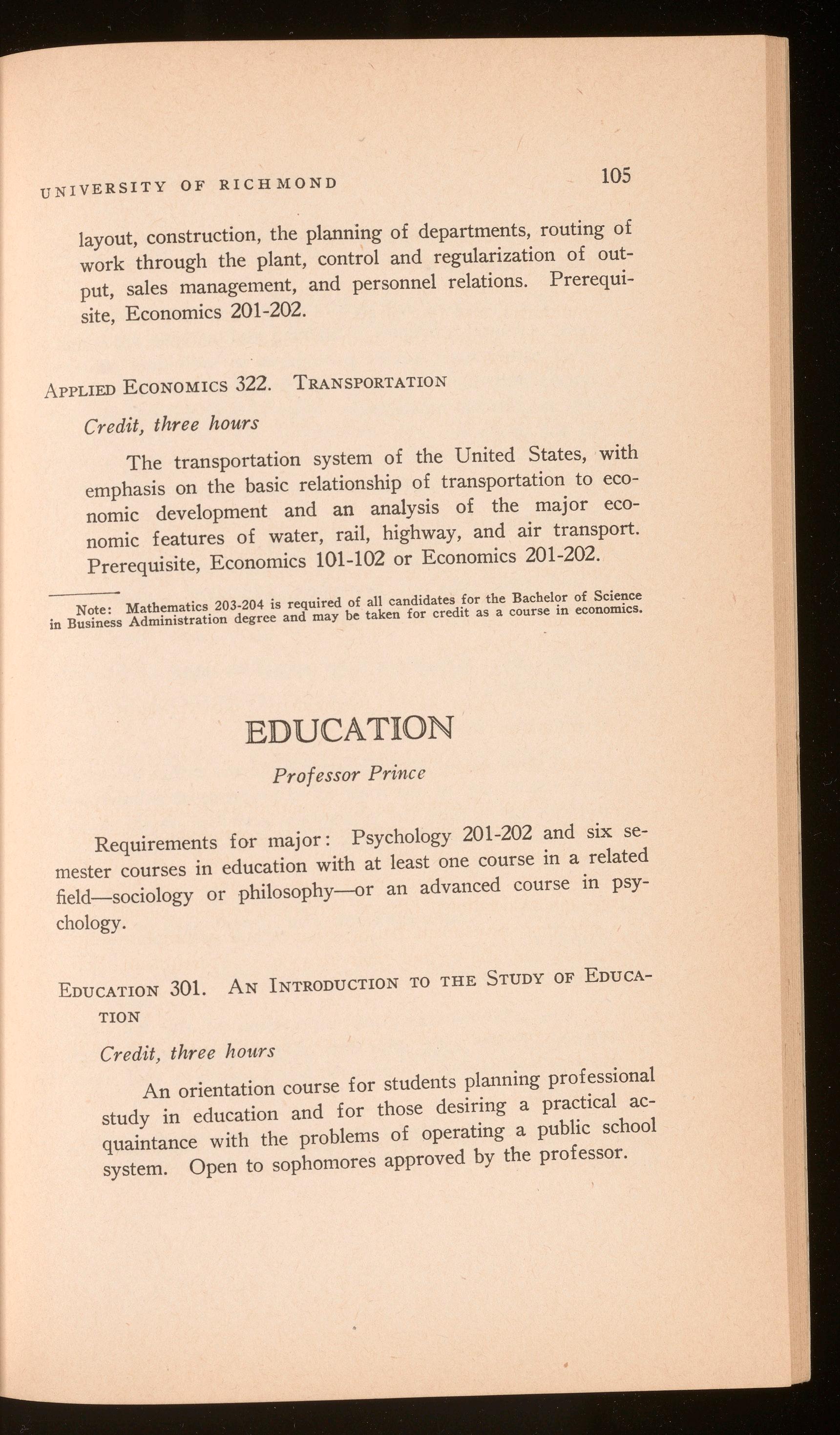
layout, construction, the planning of departments, routing of work through the plant, control and regularization of output, sales management, and personnel relations. Prerequisite, Economics 201-202.
Credit, three hours
The transportation system of the United States, with emphasis on the basic relationship of transportation to economic development and an analysis of the major economic features of water, rail, highway, and air transport. Prerequisite, Economics 101-102 or Economics 201-202.
Note: Mathematics 203-204 is required of all candidates for the Bachelor of Science in Business Administration degree and may be taken for credit as a course in economics.
Professor Prince
Requirements for major: Psychology 201-202 and six semester courses in education with at least one course in a related field-sociology or philosophy-or an advanced course in psychology.
Credit, three hours
An orientation course for students planning professional study in education and for those desiring a practical acquaintance with the problems of operating a public school system. Open to sophomores approved by the professor.

EDUCATION 302. PRINCIPLES OF TEACHING
Credit, three hours
The principles and factors essential to the teaching pro- ' cess. General principles of learning and teaching are empha- sized rather than specific procedures in individual subjects. Special attention is given to the procedures involved in the new educational movements. Open to sophomores approved by the professor.
EDUCATION 303 PRINCIPLES OF SECONDARY EDUCATION
Credit, three hours
The major principles and developments underlying a sound philosophy of secondary education. Comparative studies of secondary school programs of other countries
EDUCATION 304. ADMINISTRATION AND TEACHING IN SECONDARY SCHOOLS
Credit, three hours
A study of the administrative problems within the secon- dary school and of the most effective group and individual methods appropriate for educational activities on the secon- dary level. Emphasis is placed on the new curriculum pro- gram in Virginia.
EDUCATION 306. ADMINISTRATION AND SUPERVISION OF PUBLIC SCHOOLS
Credit, three hours
The administration and supervision of the individual district, county, city, and state school. Intended to meet the needs of teachers, principals, board members, and super- intendents.
Note: Educati onal Psychology is offered in the Department of Psychology ; Educational Sociolo g y in the Department of Sociology; and Physiology, meeting the "West Law" requirements for teacher's certificate, in the Department of Physical Education.

Professor Mitchell
Professor M cDanel
Requirements for major: twenty-six semester hours, including History 205-206, 317-318; any six semester hours from History 301, 302, 303, Government 301, 302, and 306; and an essay in original research and a comprehensive examination in the senior year.
GOVERNMENT 201. AMERICAN GOVERNMENT
Credit, three hours
A study of theory and practice m national, state, and local governments.
GOVERNMENT 202. MODERN GOVERNMENTS OF EUROPE
Credit, three hours
A study of governments in present day Europe.
GOVERNMENT 301. INTERNATIONAL LAW
Credit, three hours
The public law of nations studied through text and cases.
GovERNMENT 302. AMERJCAN DIPLOMATIC HISTORY
Credit, three hours
A detailed study of American foreign relations from the Revolution to the present time.
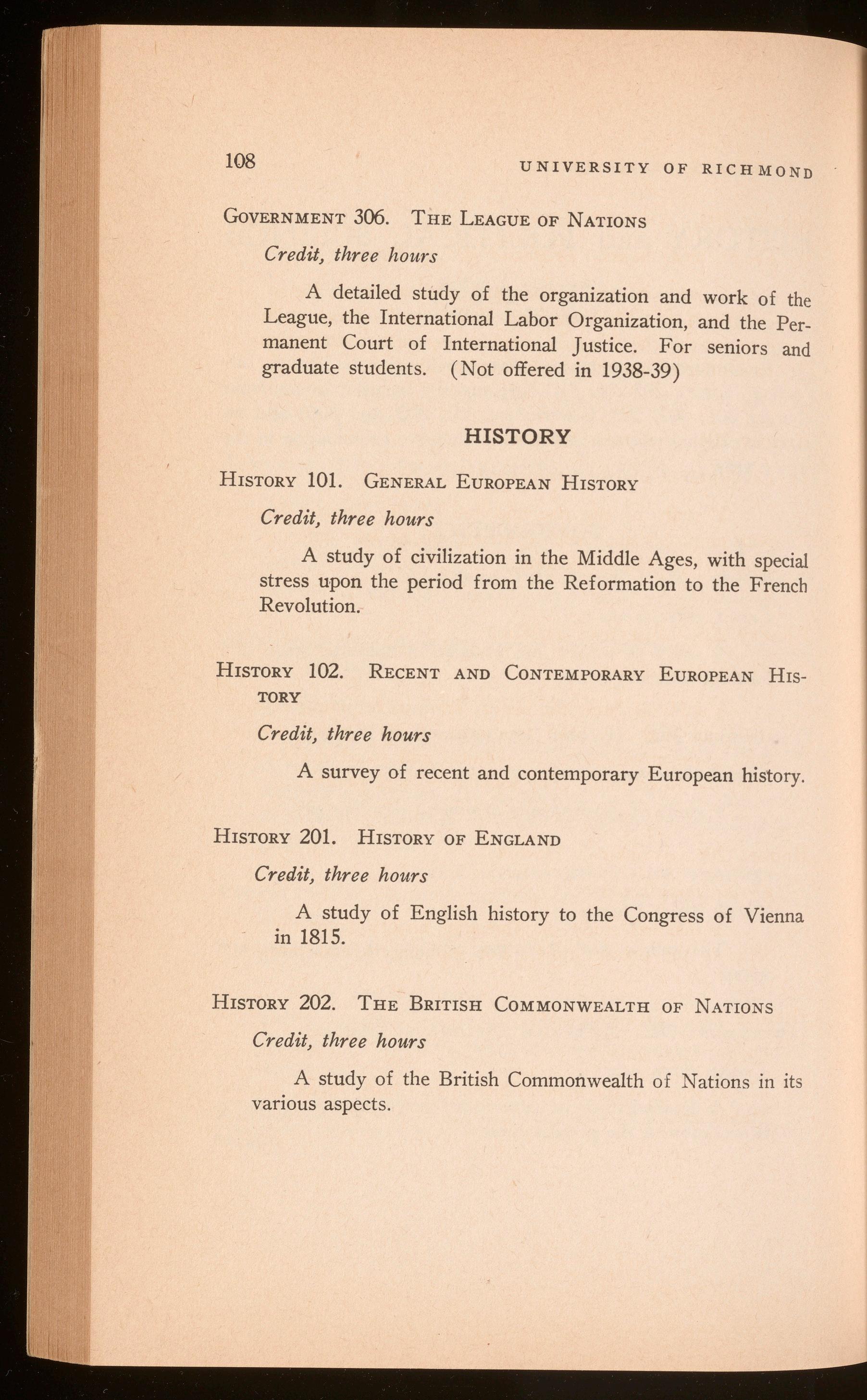
UNIVERSITY OF RICHMOND
GovERNMENT 306. THE LEAGUE OF NATIONS
Credit, three hours
A detailed study of the organization and work of the League, the International Labor Organization, and the Permanent Court of International Justice. For seniors and graduate students. (Not offered in 1938-39)
HISTORY 101. GENERAL EUROPEAN HISTORY
Credit, three hours
A study of civilization in the Middle Ages, with special stress upon the period from the Reformation to the French Revolution.
HISTORY 102. RECENT AND CONTEMPORARY EUROPEAN HI STORY
Credit, three hours
A survey of recent and contemporary European history.
HISTORY 201. HISTORY OF ENGLAND
Credit, three hours
A study of English history to the Congress of Vienn a in 1815.
HISTORY 202. THE BRITISH COMMONWEALTH OF NATIONS
Credit, three hours
A study of the British Commonwealth of Nations in its various aspects.
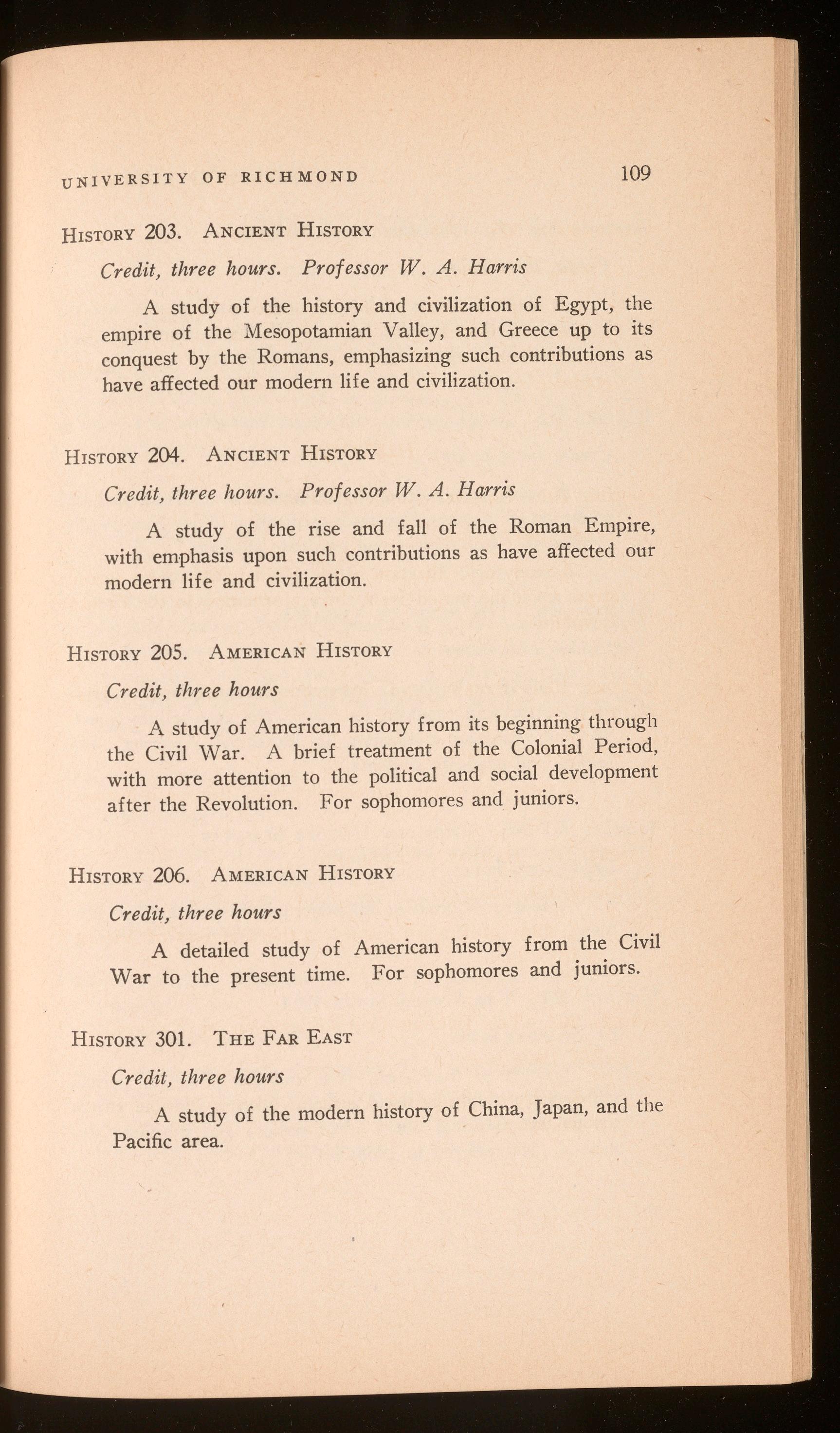
HISTORY 203. ANCIENT HISTORY
Credit, three hours. Professor W. A. Harris
A study of the history and civilization of Egypt, the empire of the Mesopotamian Valley, and Greece up to its conquest by the Romans, emphasizing such contributions as have affected our modern life and civilization.
HISTORY 204. ANCIENT HISTORY
Credit, three hours. Professor W. A. Harris
A study of the rise and fall of the Roman Empire, with emphasis upon such contributions as have affected our modern life and civilization.
HISTORY 205. AMERICAN HISTORY
Credit, three hours
A study of American history from its beginning through the Civil War. A brief treatment of the Colonial Period, with more attention to the political and social development after the Revolution. For sophomores and juniors.
HISTORY 206. AMERICAN HISTORY
Credit, three hours
A detailed study of American history from the Civil War to the present time. For sophomores and juniors.
HISTORY 301. THE FAR EAST
Credit, three hours
A study of the modern history of China, Japan, and the Pacific area.

UNIVERSITY OF RICHMOND
HISTORY 302. LATIN-AMERICAN HISTORY
Credit, three hours
A study of the republics of Latin-America, with special attention to their political history and international relations and to their relations with the United States.
HISTORY 315. THE COLONIAL PERIOD IN VIRGINIA
Credit, three hours
A study emphasizing the economic, social, and political evolution of Western European civilization under New World conditions. For seniors and graduate students.
HISTORY 316. THE STATE OF VIRGINIA
Credit, three hours
A study of Virginia's leadership in the formative years of the American republic, its role in the ante-helium South, and its changing civilization in industrial America. For seniors and graduate students.
HISTORY 317-318. AMERICAN HISTORY SEMINAR
Credit, two hours
A course required of all majors in history and government.
HISTORY 319. THE WORLD SINCE 1914
Credit, three hours
A study of the World War and the post war period, with special emphasis upon political history and the effects toward international peace. For seniors and graduate students. (Not offered in 1938-39)

UNIVERSITY OF RICHMOND 111
Professor Holtzclaw
Requirements for major: twenty-four semester hours in philosophy; or, with the consent of the head of the department, eighteen hours in philosophy and six hours in a closely related field in education, psychology, or sociology; in the senior year an essay embodying the results of some special line of investigation in philosophy.
PHILOSOPHY 201. INTRODUCTION TO PHILOSOPHY
Credit, three hours
A general survey of the field of philosophy, its aims, methods, and meaning; a study of the various types of metaphysical theory; and an introduction to the major problems of philosophy, such as the nature of matter, life, and mind, the existence of God, the relation of mind and body, freedom and determinism, and the status of values in the cosmos. Open to freshmen.
PHILOSOPHY 202. ETHICS
Credit, three hours
A study of the development of moral conceptions, an examination of the different types of ethical theory, and an attempt to determine the valid principles of right conduct. Open to freshmen.
PHILOSOPHY 301. HISTORY OF ANCIENT AND MEDIAEVAL PHILOSOPHY
Credit, three hours
A survey of the doctrines of the great thinkers of classical antiquity and of the middle ages, with especial emphasis on the teachings of Plato and Aristotle and a study of selections from their writings.
PHILOSOPHY
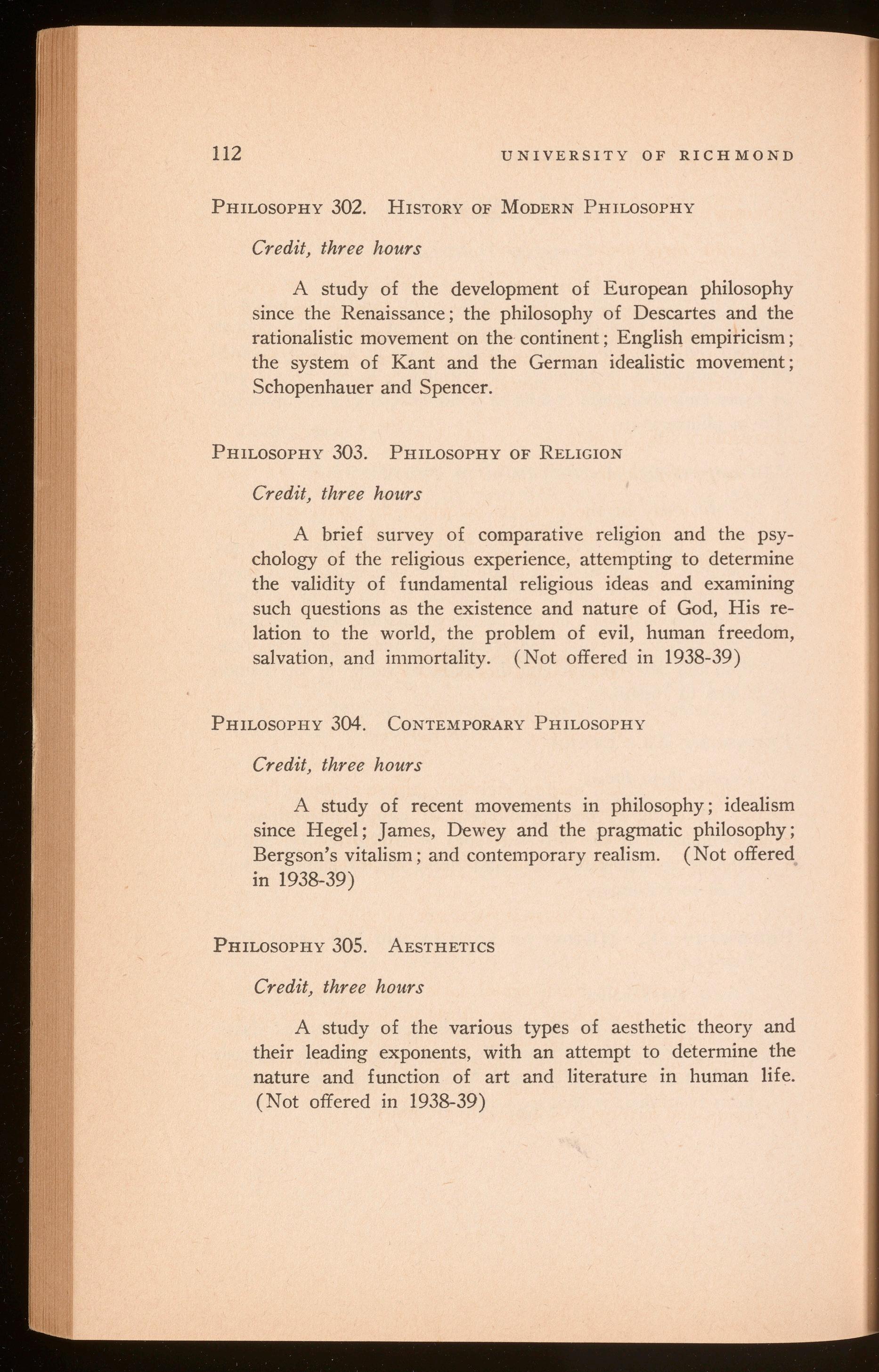
UNIVERSITY OF RICHMOND
302. HISTORY OF MODERN PHILOSOPHY
Credit, three hours
A study of the development of European philosophy since the Renaissance ; the philosophy of Descartes and the rationalistic movement on the continent ; English empiricism ; the system of Kant and the German idealistic movement ; Schopenhauer and Spencer.
PHILOSOPHY
303. PHILOSOPHY OF RELIGION
Credit, three hours
A brief survey of comparative religion and the psychology of the religious experience, attempting to determine the validity of fundamental religious ideas and examining such questions as the existence and nature of God, His relation to the world, the problem of evil, human freedom, salvation, and immortality. ( Not offered in 1938-39)
PHILOSOPHY
304. CONTEMPORARY PHILOSOPHY
Credit, three hours
A study of recent movements in philosophy; idealism since Hegel ; James, Dewey and the pragmatic philosophy; Bergson's vitalism; and contemporary realism. (Not offered in 1938-39)
PHILOSOPHY
305. AESTHETICS
Credit, three hours
A study of the various types of aesthetic theory and their leading exponents, with an attempt to determine the nature and function of art and literature in human life. (Not offered in 1938-39)
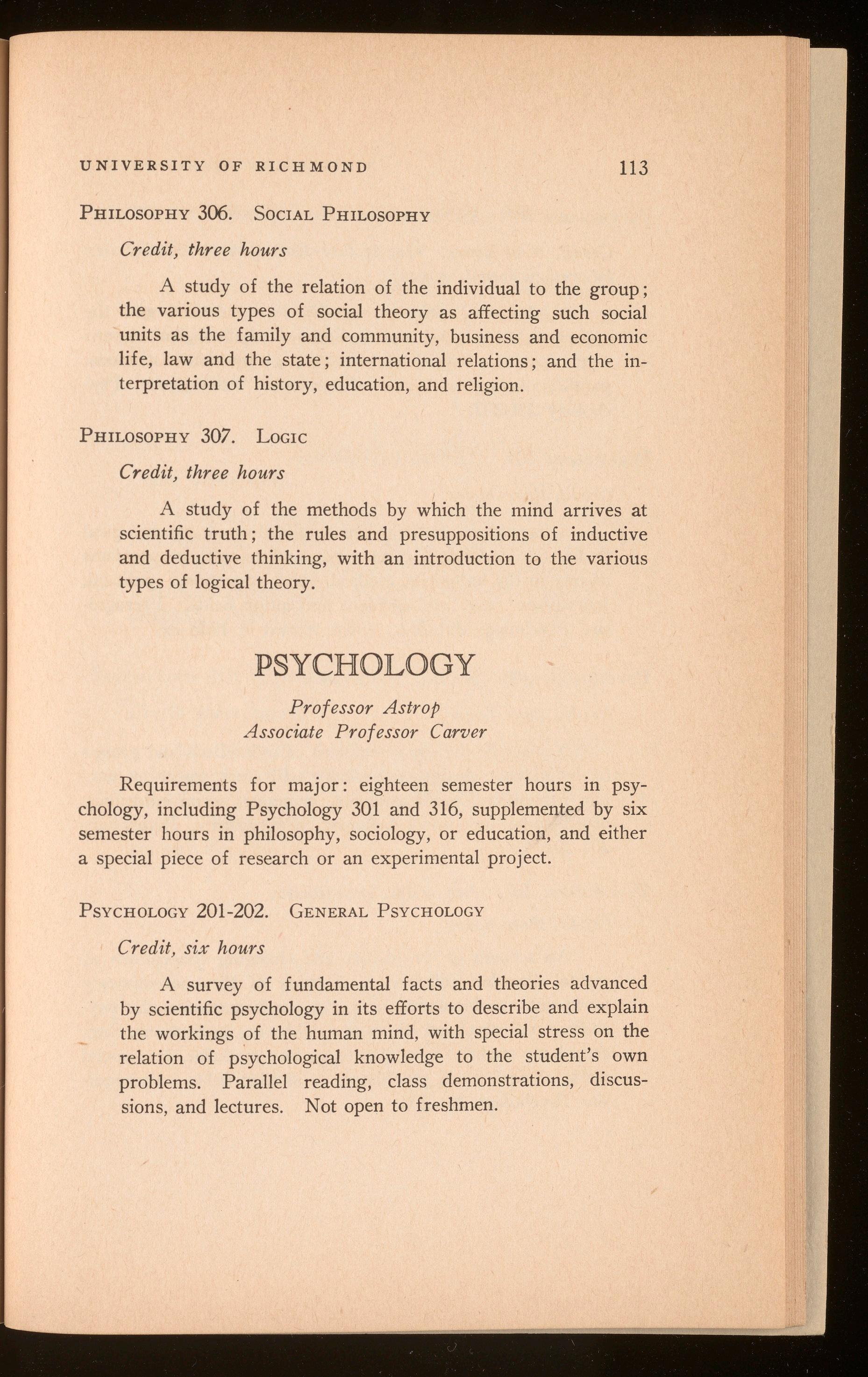
UNIVERSITY OF RICHMOND
PHILOSOPHY 306. SOCIAL PHILOSOPHY
Credit, three hours
A study of the relation of the individual to the group; the various types of social theory as affecting such social units as the family and community, business and economic life, law and the state; international relations; and the interpretation of history, education, and religion.
PHILOSOPHY 307. LOGIC
Credit, three hours
A study of the methods by which the mind arrives at scientific truth; the rules and presuppositions of inductive and deductive thinking, with an introduction to the various types of logical theory.
Professor Astrop Associate Professor Carver
Requirements for major: eighteen semester hours in psychology, including Psychology 301 and 316, supplemented by six semester hours in philosophy, sociology, or education, and either a special piece of research or an experimental project.
PSYCHOLOGY 201-202. GENERAL PSYCHOLOGY
Credit, six hours
A survey of fundamental facts and theories advanced by scientific psychology in its efforts to describe and explain the workings of the human mind, with special stress on the relation of p~ychological knowledge to the student's own problems. Parallel reading, class demonstrations, discussions, and lectures. Not open to freshmen.
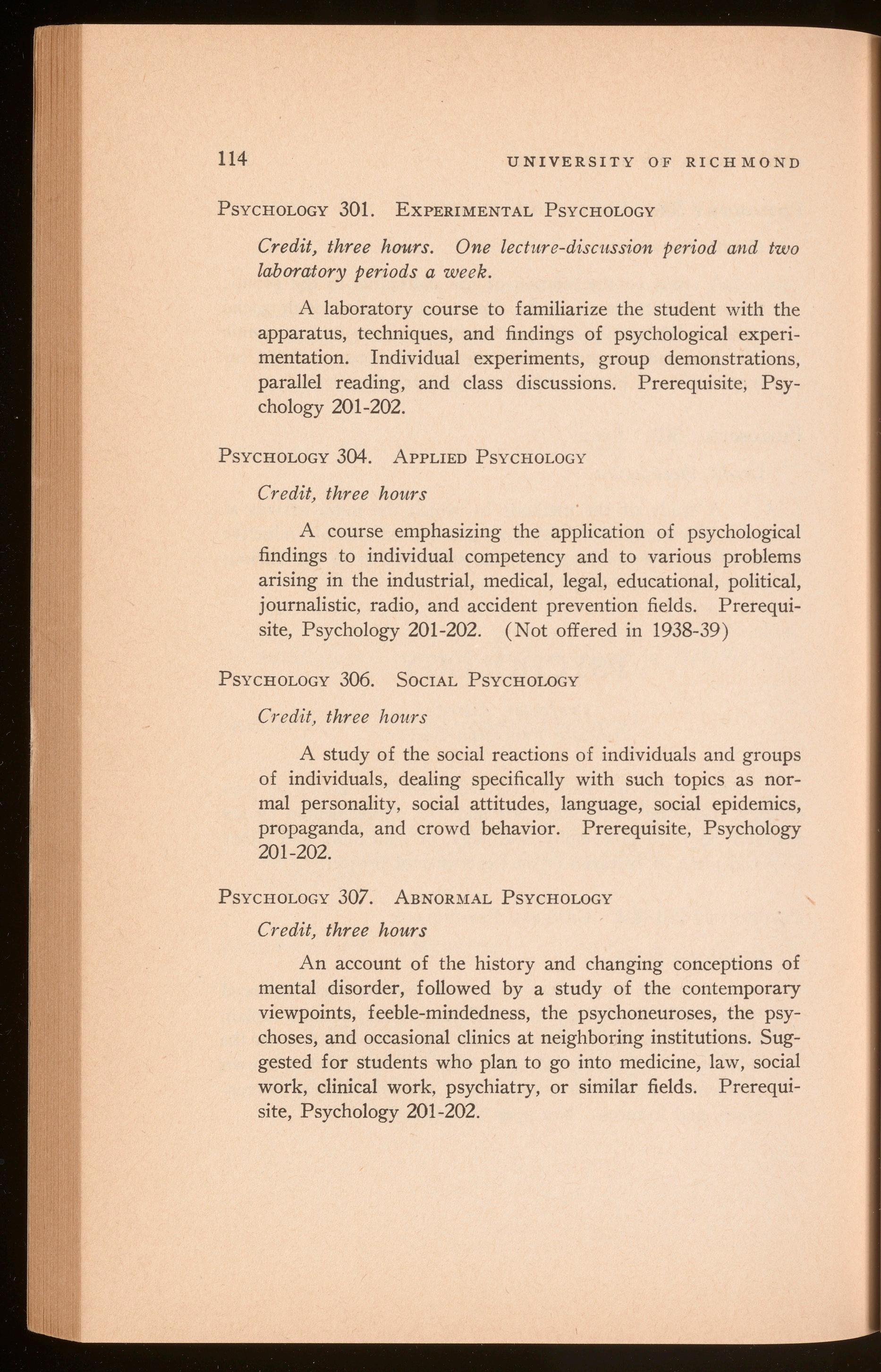
PSYCHOLOGY 301. EXPERIMENTAL PSYCHOLOGY
Credit, three hours. One lecture-discussion period and two laboratory periods a week.
A laboratory course to familiarize the student with the apparatus, techniques, and findings of psychological experimentation. Individual experiments, group demonstrations, parallel reading, and class discussions. Prerequisite, Psychology 201-202.
PSYCHOLOGY 304. APPLIED PSYCHOLOGY
Credit, three hours
A course emphasizing the application of psychological findings to individual competency and to various problems arising in the industrial, medical, legal, educational, political, journalistic, radio, and accident prevention fields. Prerequisite, Psychology 201-202. (Not offered in 1938-39)
PSYCHOLOGY 306. SOCIAL PSYCHOLOGY
Credit, three hours
A study of the social reactions of individuals and groups of individuals, dealing specifically with such topics as normal personality, social attitudes, language, social epidemics, propaganda, and crowd behavior. Prerequisite, Psychology 201-202.
PSYCHOLOGY 307. ABNORMAL PSYCHOLOGY
Credit, three hours
An account of the history and changing conceptions of mental disorder, followed by a study of the contemporary viewpoints, feeble-mindedness, the psychoneuroses, the psychoses, and occasional clinics at neighboring institutions. Suggested for students who plan to go into medicine, law, social work, clinical work, psychiatry, or similar fields. Prerequisite, Psychology 201-202.
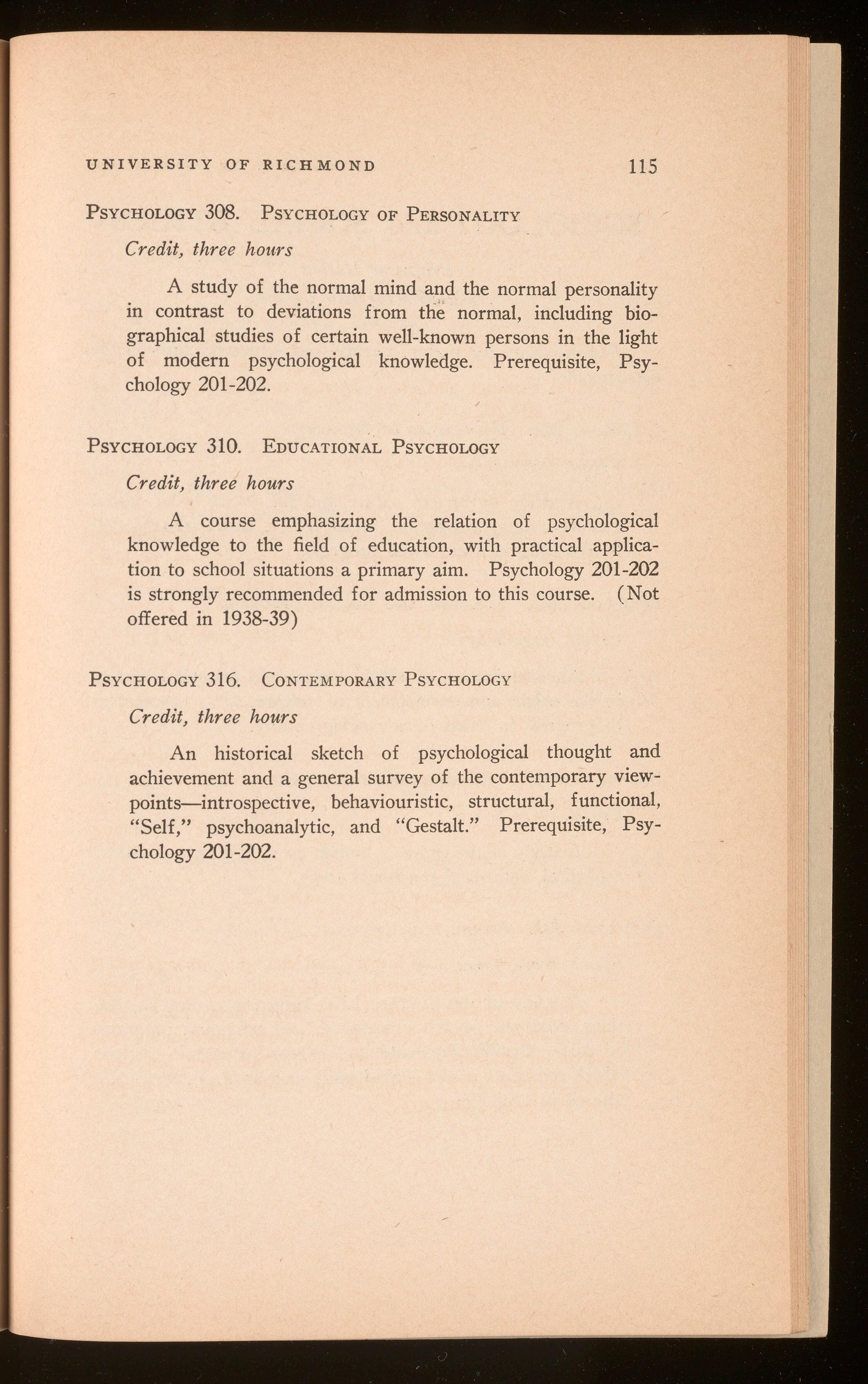
PSYCHOLOGY 308. PSYCHOLOGY OF PERSONALITY
Credit, three hours 115
A study of the normal mind and the normal personality in contrast to deviations from tlie normal, including biographical studies of certain well-known persons in the light of modern psychological knowledge. Prerequisite, Psychology 201-202.
PSYCHOLOGY 310. EDUCATIONAL PSYCHOLOGY
Credit, three hours
A course emphasizing the relation of psychological knowledge to the field of education, with practical application to school situations a primary aim. Psychology 201-202 is strongly recommended for admission to this course. (Not offered in 1938-39)
PSYCHOLOGY 316. CONTEMPORARY PSYCHOLOG Y
Credit, three hours
An historical sketch of psychological thought and achievement and a general survey of the contemporary viewpoints-introspective, behaviouristic, structural, functional, "Self," psychoanalytic , and "Gestalt " Prerequisite, Psychology 201-202.
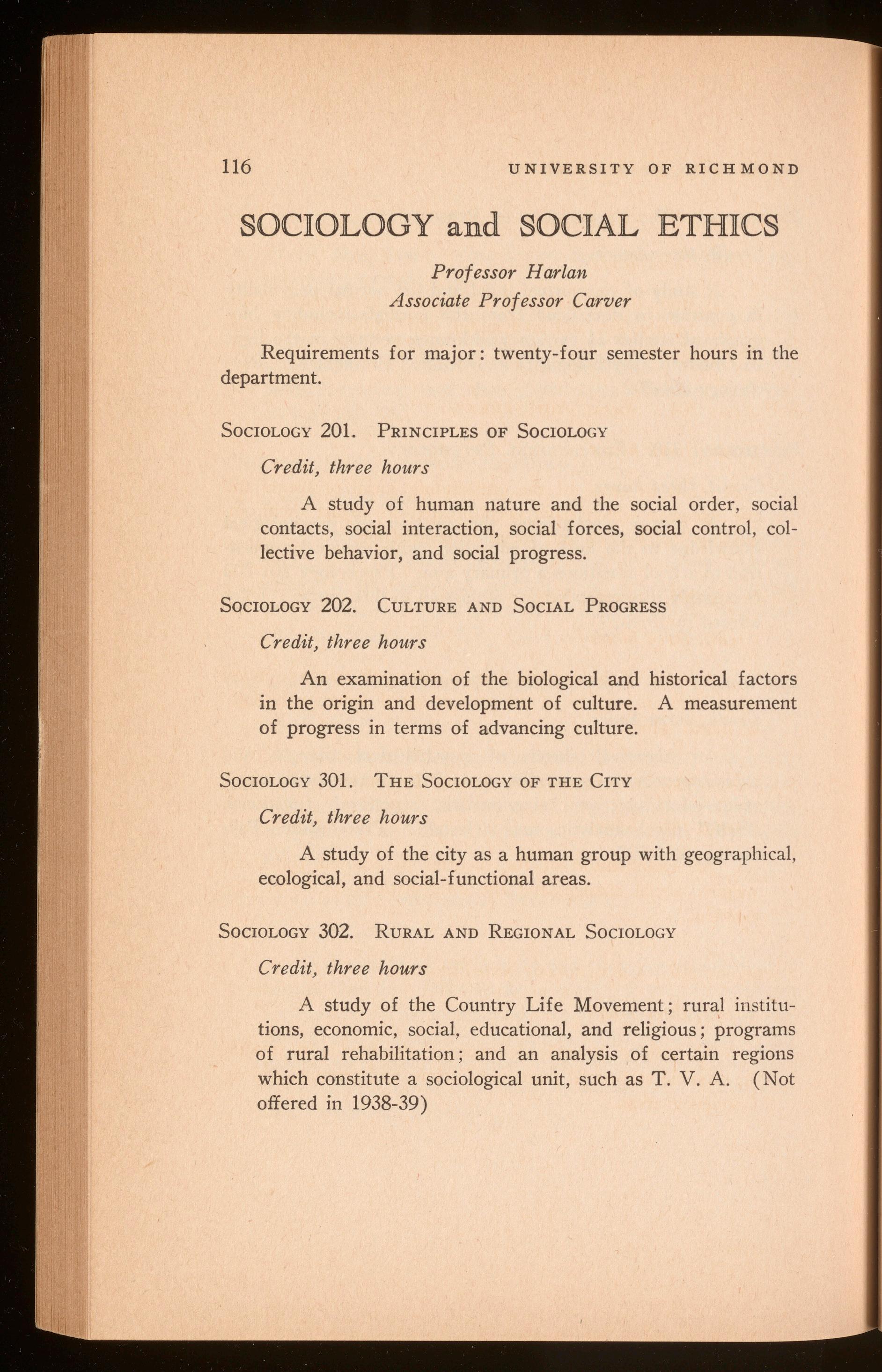
UNIVERSITY OF RICHMOND
Professor Harlan
Associate Professor Carver
Requirements for major: twenty-four semester hours in the department.
SOCIOLOGY 201. PRINCIPLES OF SOCIOLOGY
Credit, three hours
A study of human nature and the social order, social contacts, social interaction, social forces, social control, collective behavior, and social progress.
SOCIOLOGY 202. CULTURE AND SOCIAL PROGRESS
Credit, three hours
An examination of the biological and historical factors in the origin and development of culture. A measurement of progress in terms of advancing culture.
SOCIOLOGY 301. THE SOCIOLOGY OF THE CITY
Credit, three hours
A study of the city as a human group with geographical , ecological, and social-functional areas.
SOCIOLOGY 302. RURAL AND REGIONAL SOCIOLOGY
Credit, three hours
A study of the Country Life Movement; rural in stitutions, economic, social, educational, and religious; programs of rural rehabilitation; and an analysis of certain regions which constitute a sociological unit, such as T. V. A . (Not offered in 1938-39)
UNIVERSITY OF RICHMOND
SOCIOLOGY 303. THE FAMILY
Credit, three hours
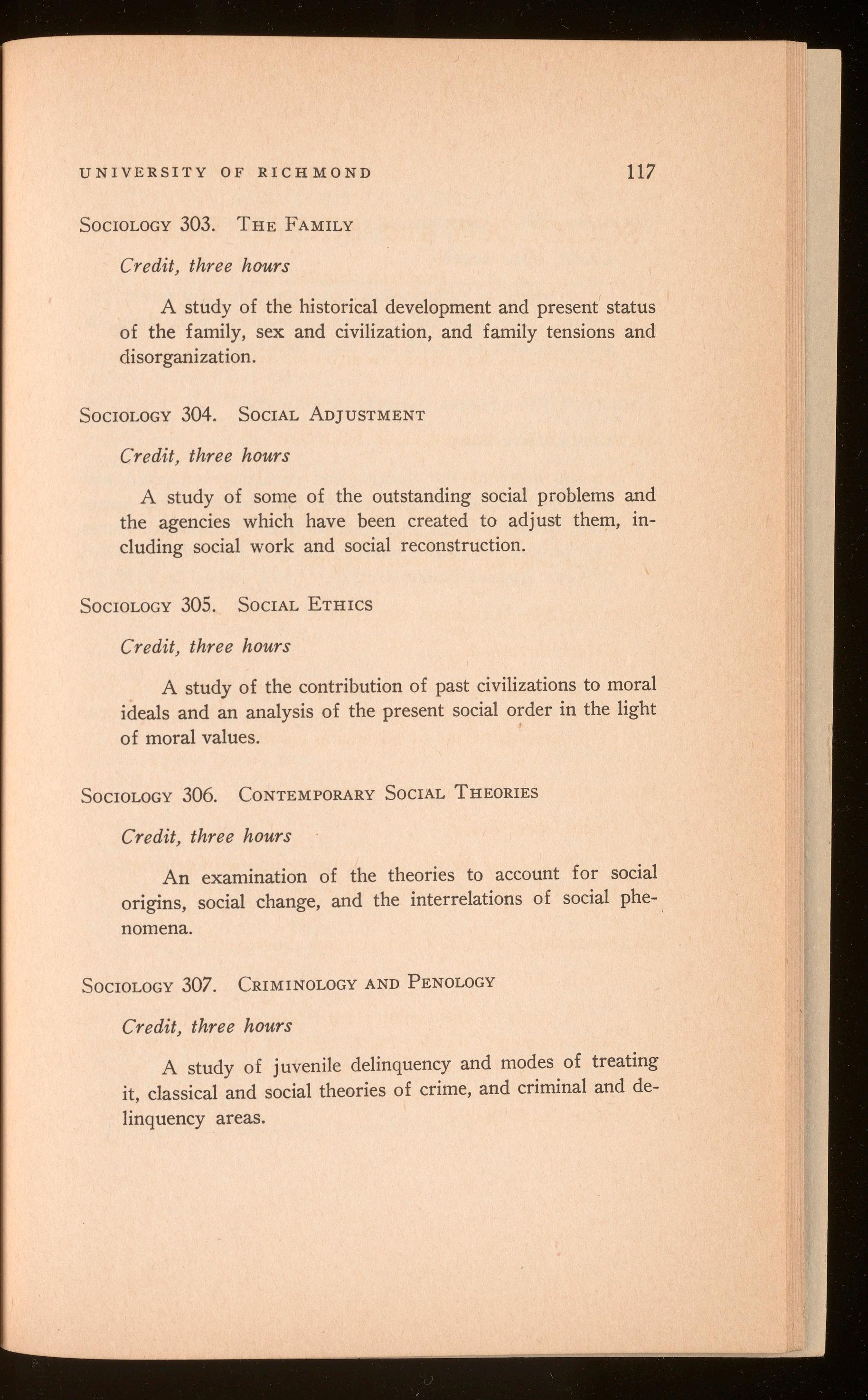
117
A study of the historical development and present status of the family, sex and civilization, and family tensions and disorganization.
SOCIOLOGY 304. SOCIAL ADJUSTMENT
Credit, three hours
A study of some of the outstanding social problems and the agencies which have been created to adjust them, including social work and social reconstruction.
SOCIOLOGY 305. SOCIAL ETHICS
Credit, three hours
A study of the contribution of past civilizations to moral ideals and an analysis of the present social order in the light of moral values.
SOCIOLOGY 306 CONTEMPORARY SOCIAL THEORIES
Credit, three hours
An examination of the theories to account for social origins, social change, and the interrelations of social phenomena.
SOCIOLOGY 307 . CRIMINOLOGY AND PENOLOGY
Credit, three hours
A study of juvenile delinquency and modes of treating it, classical and social theories of crime, and criminal and delinquency areas.

SOCIOLOGY 308. ANTHROPOLOGY AND ETHNOLOGY
Credit, three hours
A study of anthropology from the older and newer procedure : the races and cultures of mankind with their distribution over the earth and their interrelations.
SOCIOLOGY 309. SOCIAL ASPECTS OF INDUSTRY
Credit, three hours
A study of the changes and problems connected with mass production, natural wealth , distribution, social insurance, collective bargaining, and the like. Textbook, lectures, and projects. Credit cannot be allowed for both Sociology 309 and Applied Economics 316. (Not offered in 1938-39)

Cecil Carl Ander son (Hist.) ..................................... .....Bluefield, W . Va.
W illiam George Bond ( E ng.) .............. ............ Edenton, N. C.
R oland Buford Brandi s, Jr . (Econ .) ....................................... Richmond, Va.
Ja ck Moran Bristow (Hist.) ......... ........... .............Petersburg, Va.
Th omas Irvin Broaddus (Ed.) ............ ................. ...........Gether, Va.
Jo hn Robert Brooks, Jr. (Eng.) ........... .......... ........Richmond, Va
E dward Parker Brown (Hist.) .............. ........... ..Suffolk, Va
R obert Leo Brown (Soc ) .............. ........................ .......Carteret, N. J .
Samuel Abraham Cohen (Eng ) ............... ........... ..Richmond, Va.
Bernard Montague Dabney, Jr (Hi st .) ..... ....................... Richmond, Va.
H oward Ranson Denton (Fr.) .... .............. .......Northville, N. Y
Alfred James Dickinson, Jr (Hist.) ................................. ......Mobile, Ala.
Je rome Lawrence Epstein (E con.) .......... ......H arrington Park, N. J.
Dorsey Bridges Ford (Hist.) ..................................... ......Round Hill, Va.
H orace Le e Ford (Hist.) ................ .......... ................Richmond, Va.
Bernard Albert Gilman (Psych.) ............. ...........Hartford, Conn.
Arthur Broaddus Gravatt, Jr. (Chem .) . ...............................Ellerson, Va.
William Clyde Hamilton (Psych ) .................................... ....Richmond, Va.
Geor ge Lea Harp er (Soc ) ......... ................. .............. ..Marion, S. C.
Geor ge Carlton Hope (Eng.) ..... ........... ............... Parksley, Va.
F ranklin Overton Jones (Hist.) .............. .................. .......Richmond, Va.
Sidney Kaplan (Soc ) .......... ................ .......Atlantic City, N. J.
Mit chell Dresdner Katz , Jr. (Econ ) .................. .............. Richmond, Va.
F r ed Thomas Laughon, Jr . (Phil.) ...................................Portsmouth, Va.
W illiam Latam! Lumpkin (Hist .) ........ .............. ........Irvington, Va.
Rex Elton McDowell (Eng.) . .......... ............................. ...Brookneal, Va.
Mit chell Yett er MacFarland (Psych.) .......... ........... .Trenton, N J.
R obert Bolling McNeil (Eng.) ...................... ........................ Richmond, Va.
Gord on Lee Mall onee (Eng.) ........... ................. ........Richmond, Va.
Henry Samuel Mandel (Biol.) . ........... ............... ....Trenton , N. J.
William Edward Moore, Jr. (Biol.) .............. ............... ..Onancock , Va.
David Winton Naff, Jr. (Hist.) .............. ........... ...Roanoke, Va.
Jo hn Roland Nuckols (Hist.) ........... .......... .........Chatham, Va.
David Benjamin Orcutt , Jr (Biol.) .............. .........Moseley , Va.
Channing Luther Pace (Biol.) ............... . ............ ...Richmond, Va
*J ohn Nicklos Pastore (Biol.) ................. ........... Bluefield, W. Va.
*Undergraduate work completed , Summer School, 1936
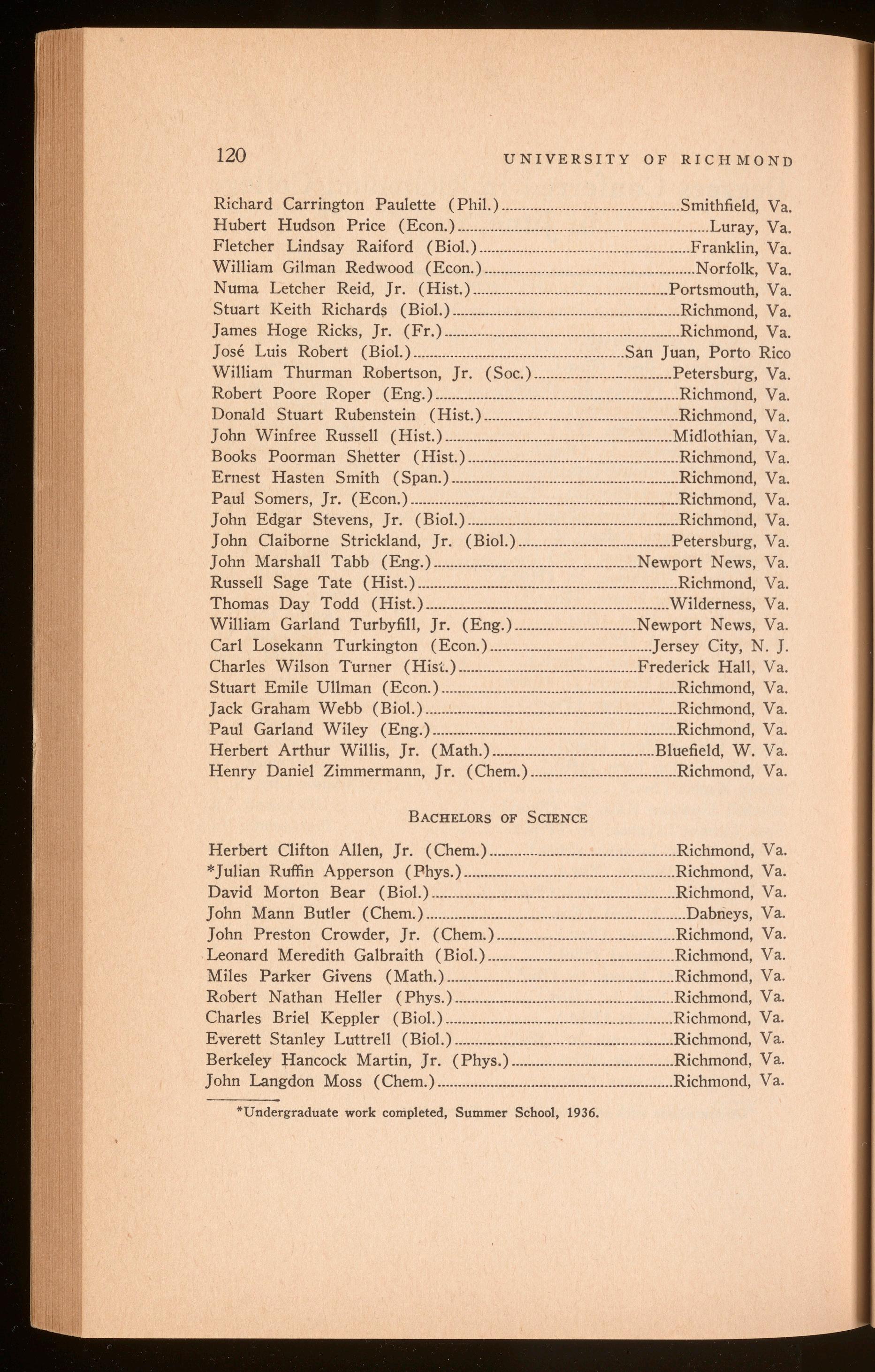
UNIVERSITY OF RICHMON D
Richard Carrington Paulette (Phil.) ............................................Smithfield, V a.
Hubert Hudson Price (Econ.) . Luray, Va
Fletcher Lindsay Raiford (Biol.) ....................................................Franklin , Va .
William Gilman Redwood (Econ ) .... ..Norfolk , Va
Numa Letcher Reid, Jr. (Hist.) Portsmouth, Va
Stuart Keith Richards (Biol.) ........................................................Richmond, Va .
James Hoge Ricks, Jr (Fr.) .. ..Richmond, Va.
Jose Luis Robert (Biol.) San Juan, Porto Rico
William Thurman Robertson, Jr. (Soc.) ..................................Petersburg , Va .
Robert Poore Roper (Eng . ) ............................................................Richmond, V a.
Donald Stuart Rubenstein (Hist.) .. ...Richmond, V a.
John Winfree Russell (Hist.) .Midlothian, V a.
Books Poorman Shetter (Hist.) Richmond, Va.
Ernest Hasten Smith (Span .) ........................................................Richmond, Va .
Paul Somers, Jr (Econ ) ...Richmond, V a.
John Edgar Stevens, Jr. (Biol.) ... .Richmond, Va
John Oaibome Strickland, Jr. (Biol.) .. Petersburg , Va
John Marshall Tabb (Eng ) . Newport News, Va.
Russell Sage Tate (Hist.) ................................................................Richmond , Va.
Thomas Day Todd (Hist . ) ............................................................Wildemess, Va .
William Garland Turbyfill , Jr. (Eng.) ... Newport News, Va.
Carl Losekann Turkington (Econ.) .... Jersey City, N. J
Charles Wilson Turner (HisL) Frederick Hall , Va.
Stuart Emile Ullman (Econ.) ..........................................................Richmond, Va.
Jack Graham Webb (Biol.) Richmond, V a.
Paul Garland Wiley (Eng.) . Richm ond , V a.
Herbert Arthur Willis, Jr. (Math.) ........................................Bluefield , W. Va.
Henry Daniel Zimmermann , Jr . (Chem.) ....................................Richmond, Va.
BACHELORS OF SCIENCE
Herbert Clifton Allen, Jr. (Chem.) ..............................................Richmond , Va .
*Julian Ruffin Apperson (Phys.) Richmond, V a.
David Morton Bear (Biol.) .. ....Richmond, Va.
John Mann Butler (Chem.) ....Dabrieys, V a
John Preston Crowder, Jr . (Chem.) ............................................Richmond, Va.
Leonard Meredith Galbraith (Biol.) Richmond , V a.
Miles Parker Givens (Math.) .Richmond , V a
Robert Nathan Heller (Phys . ) ......................................................Richmond, Va .
Charles Briel Keppler (Biol.) ........................................................Richmond, Va.
Everett Stanley Luttrell (Biol.) ...Richmond , V a.
Berkeley Hancock Martin, Jr. (Phys ) . .Richmond , V a.
John Langdon Moss (Chem ) .... .....Richmond, V a.
*Undergraduate work completed, Summer School, 1936.

Bernard Abraham Pasternack (Chem.) Richmond, Va.
John Asa Radspinner (Chem.) ........................................................Richmond, Va.
Olyn Wayne Shannon (Chem.) ......................................................Richmond, Va.
John Tabb Walke (Chem.) Richmond, Va.
Carroll Milton Williams (Biol.) ....................................................Richmond, Va.
Harry Aloysius Young (Chem.) ............................................Atlantic City, N. J.
Robert William Yowell (Phys.) ..................................................Peola Mills, Va. BACHELORS
Charles Franklin Bahen ....................................................................Richmond, Va.
John Henry Burcher ..........................................................................Richmond, Va.
Edward Meade Canada, J r ...............................................................Richmond, Va.
Robert Taylor Cosby Columbia, Va.
Jefferson Davis Ewell, Jr .................................................................Richmond, Va.
Stanford Columbus Finney ....................................................................Bassetts, Va.
Ralph Dew Hughes ..............................................................................Sandston, Va.
Luther Howard Jenkins, Jr ...............................................................Richmond, Va.
Ralph George Phillips ......................................................................Petersburg, Va.
Joseph John Pierotti... .........................................................................Richmond, Va.
Edward Matthew Schaaf ....................................................................Richmond, Va.
A. Louis Tobias ..................................................................................Petersburg, Va.
Richard Louis Todd ..........................................................................Wilderness, Va.
Richard Michael Francis Williams, 111... Richmond, Va.
Charles Henry Wood, J r ...................................................................Richmond, Va.

Allard, Claude James, Jr. (Bus.) ............................................... Richmond, Va.
Alley, Reuben Edward , Jr. (Phys.) ..............................................Richmond, Va.
Alvarado, Jorge Antonio (Biol.) Guayanilla, Puerto Rico
Alvis, Frank Ryals, Jr. (Bus.) ........................................................Richmond, Va.
Archer, Leonard Benjamin (Eng.) Petersburg, Va. Arendall, John Thomas (Bus.) ............................................................Mobile, Ala Barden, Chester Earl (Bus.) ............................................Highland Springs, Va. Berman, William (Biol.) .......... ....South River, N. J. Black, Lewis Glenn (Eng.) ......... Roanoke, Va. Boatwright, John Baker (Hist.) ................................................Buckingham, Va. Boykin, Junius Wesley (Bus.) ........................................................Richmond, Va. Brock, Walter Lucas, Jr. (Eng.) .................... Appalachia, Va. Carroll, Howard R. (Eng.) ..................................................................Easton, Md.
Chofnas, Irving (Chem ) ..........................................................Richmond, Va.
Correll, William Bertie ( Phys.) Richmond, Va. Cortopassi, John Joseph (Chem.) ................................................Richmond, Va. Creasy, Stover Henry, Jr. (Bus.) ........................................................Gretna , Va.
Dooley, William Paul (Chem.) ..... Richmond, Va.
Dunkum, William Washington, Jr. (Biol.) Richmond, Va.
Earle, John Burns, Jr. (Bus.) ............................................................Milldale, Va. Fergusson, John Albert (Bus.) .. .....Richmond, Va. Flax, Joseph Sidney (Bus.) .............................. Richmond, Va. Godsey, Joseph Cornelius (Chem.) ................................................Richmond, Va. Goldstein, Lewis Ornrles (Biol.) ..................................................Paterson, N. J. Gordon, William Samuel, Jr. (Bus.) .....Richmond, Va. Graham, John Stuart, Jr. (Math.) ........ Richmond, Va. Grammer, Randolph Johnson (Soc.) ............................................ Waverly, Va.
Griffin, Dale Francis (Eng ) Parkersburg, W. Va. Grigg, William Franklin, Jr. (Biol.) Richmond, Va. Hardy, Clyde Thompson, Jr. (Psych.) ..........................................Baltimore, Md. Harris, Robert Marvin Clifton, Jr. (Chem.) Richmond, Va . Harris, Robert Thompson (Bus ) .......... Danville, Va. Harris, Sidney (Chem.) ..................................................................Paterson, N. J . Haug, Curtis Milbourne (Ger.) ..............................................Huntington, N. Y. Haw, John Sheppard, Jr. (Bus ) ...... ....Richmond, Va. Headen, Herbert (Bus.) .......................................................... ....Richmond, Va.
Hudgins, Walter Richardson (Eng.) ............................................Ore Bank, Va.
Jacobs, Albert Luck (Span.) Lawrenceville, Va.

James, Harry Thomas (Phil.) .......................... ..South Boston, Va.
Johnson, John Thomas (Bus.) ..... ............................... ..Richmond, Va.
Keck, Hunter Bernard, Jr. (Bus.) ..... ................................Greenville, N. C.
Kielpinski, Leonard Venantius (Bus.) ...............Milwaukee, Wis
Kellogg, Jonathan Hobbs (Eng.) ................... .......Richmond, Va.
King, James Edward (Hist.) ..........................................................Richmond, Va. ·
King, Philip Turner (Econ.) . ....................................... Richmond, Va.
Knight, James Herbert, Jr. (Bus.) ............................... Richmond, Va.
Lamb, Beverley Randolph (Bus.) ................................................Dumbarton, Va.
Laster, James (Chem.) ......................................................................Richmond, Va.
Laughon, Samuel Walter (Hist.) ..................................................Richmond, Va.
Levy, Edwin Louis, Jr. (Bus.) ...... ....................... ..Richmond, Va.
Lynch, Gus (Span.) ......................... .Richmond, Va.
McAllister, Cecil Guy, Jr. (Chem.) ..............................................Richmond, Va.
McCaul, Eugene Williamson (Bus .) ...........................................Richmond, Va.
Miller, Edward McCarthy (Chem.) ...... ....Richmond, Va.
Miller, Elmer Thomas (Chem.) ................ ..Richmond, Va.
Mills, Edward Meredith (Hist.) ...... .......................... ...Los Angeles , Calif.
Montgo mery, Alfred Baxter, Jr. (Eng .) ......................................Richmond, Va.
Moore, Leroy Vernon, Jr. (Psych.) ....................................Richmond, Va.
Moore, Ralph Patterson (Bus.) ............ ....................................Richmond, Va.
Murdock, Marion Bailey (Chem.) ................................................Richmond, Va.
Murphey, Douglas Woodfin (Econ.) .............................. Petersburg, Va.
Murrill, Robert Douglas (Biol.) ................................. Richmond, Va.
Nauman, Paul Edward (Hist.) . ...................... Richmond, Va.
Nimmo, Gernon Aubert (Econ.) ..........................................................Suffolk , Va.
Page, Roger Bethel (Psych.) ....................... ............Richmond, Va.
Peers, John Quarles (Hist.) ...................................... Trevilians, Va.
Phillips, Harold Wesley (Eng.) ......................... Cumberland, Va.
Policoff, Leonard David (Chem ) ................................................Richmond, Va.
Powell, John David (Biol.) ....................................................................Stuart, Va. Robertson, Sydenham Brooks (Bus .) ... ...........Richmond, Va. Robertson, William Franklin (Bus.) ........Richmond, Va. Rumney, George Robert Marshall (Eng.) ..................................Baltimore, Md. Schwarzschild, Stuart (Bus.) ..........................................................Richmond, Va. Segal, Robert Eugene (Biol.) ............. ......Perth Amboy, N. J. Shiflett, Pendleton McKinney, Jr. (Econ ) .........Richmond, Va.
Siegel, Paul Shafer (Eng.) ............................ ..Richmond, Va. Smith, William Richard (Math.) .............................. Richmond, Va. Snellings, Henry Lozier, Jr. (Hist.) ............................................Richmond, Va. Spivey, Sherwood Duke (Bus . ) ............................................Newport News, Va. Staples, John Greenville (Econ.) ....................................................Richmond, Va.
Sto neburner, Richard Gresham (Chem.) ............ Richmond, Va.

UNIVERSITY O F RICHMO ND
Straughan, Joseph Marion (Biol.) ...Charleston, W. Va. Stutz, Carlton Franklin (Bus.) ......................................................Richmond , Va.
Tanous , John H. (Chem . ) ............................................................Lawrence , N. Y. Taylor, Alvin Carlyle (Eng ) Richmond, Va.
Taylor , Arthur Hastings (Chem.) ................................................Richmond , Va. Taylor , Robert Lawrence (Econ.) . .Spencer , Va. Thornton, Daniel McCarty, III (Chem.) .. Richmond, Va. Thornton, Edwin Gayton, Jr (Eng ) . Richmond, Va. Thornton, Thomas Rudd (Econ ) Bluefield, W. Va.
Tomlinson, Philip Henry (Eng.) ................................................Wilmington , Va. Townsend, Wortley Warren, Jr. (Bus.) Richmond , Va. Trump, Donald Ellsworth (Eng.) Baltimore , Md. Turn er , Walker Earl (Bus.) . Martinsville , Va.
Tyndall, Francis William (Eng.) ... Richmond , Va.
Warren, Morris DeSaussure (Ph il.) ............................................Richmond , Va. Watlington, Paul Berry, Jr. (Soc.) .Hagerstown, Md. Wilborn , Shanks Mitchell (Bus.) .South Boston, Va. Willis, James Richard (Bus.) ....................................................Gordonsville, Va. Wilson, J. William (Chem.) .Petersburg , Va.
Woolfolk , Robert , Jr. (Bus.) Bowling Green , Va. Woot en, Ernest Lee (Biol.) .....Camden , S C.
Alexander, Stuart Lee (Bus ) .Richmond , Va. Allen, Stuart Robertson (Bus . ) ......................................................Richmond , Va. Allman, George Newman (Bus ) .... Gordonsville , Va. Andersen , Alex Emmanuel, Jr. (Eng.) ..................................Bristol, Tenn .-Va. Arthur, Charles Ralph (Bus .) ........................................................Richmond, Va. August, Charles Edward (Ch em ) . Richmond , Va. Barney, Sidney (Bus.) ......................................................................Petersburg , Va. Bass, Kenneth Carrington, Jr (Chem. ) . Richmond , Va. Beale, Arthur Hyman (Bus . ) ..........................................................Richmond , Va. Bell, John R. (Econ.) ......................................................................Birds Nest , Va. Berkeypile, James ·Warren (Phys ) Richmond , Va. Black, Kenneth Leon, Jr. (Eng .) ....................................................Richm ond, Va. Bowers, Adam Roswell (Phys ) Richmond, Va. Bowles , Richard Curd (Econ.) Richmond , Va. Bowling, Bragdon Ray (Psych . ) ..........................................Fredericksburg , Va. Bowry, Walter Augustus , Jr (Bus.) Ri chmond , Va. Britton, Henry Douglas (Bus ) Richmond , Va. Broaddus, Thomas Nash ....................................................................Richmond , Va. Brock, Xavier Martin, Jr . .Richmond , Va.
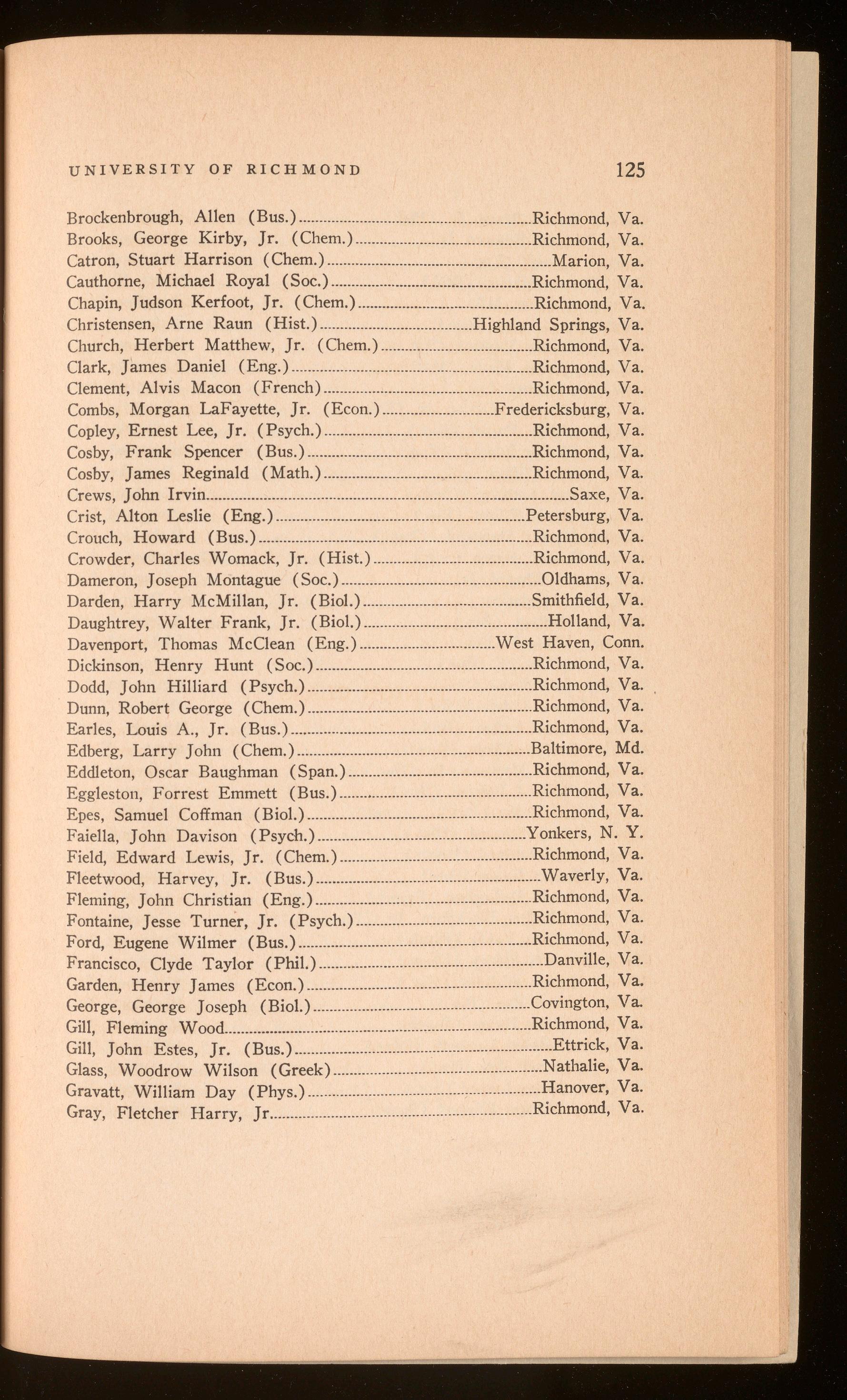
125
Brockenbrough, Allen (Bus.) Richmond, Va.
Brooks, George Kirby, Jr. (Chem.) Richmond, Va.
Catron, Stuart Harrison (Chem.) Marion, Va.
Cauthorne, Michael Royal (Soc.) ..................................................Richmond, Va.
Chapin, Judson Kerfoot, Jr. (Chem.) ............................................Richmond, Va.
Christensen, Arne Raun (Hist.) ......................................Highland Springs, Va.
Church, Herbert Matthew, Jr. (Chem.) ......................................Richmond, Va.
Clark, James Daniel (Eng.) ....................Richmond, Va.
Clement, Alvis Macon (French) Richmond, Va.
Combs, Morgan LaFayette, Jr. (Econ.) ............................Fredericksburg, Va.
Copley, Ernest Lee, Jr. (Psych.) Richmond, Va.
Cosby, Frank Spencer (Bus.) ........................................................Richmond, Va.
Cosby, James Reginald (Math.) Richmond, Va.
Crews, John Irvin ..........................................................................................Saxe, Va.
Crist, Alton Leslie (Eng.) ..............................................................Petersburg, Va.
Crouch, Howard (Bus.) ....................................................................Richmond, Va.
Crowder, Charles Womack, Jr. (Hist.) ........................................Richmond, Va.
Dameron, Joseph Montague (Soc.) Oldhams, Va.
Darden, Harry McMillan, Jr. (Biol.) ..........................................Smithfield, Va.
Daughtrey, Walter Frank, Jr. (Biol.) ..............................................Holland, Va.
Davenport, Thomas Mc Clean (Eng.) ..................................West Haven, Conn.
Dickinson, Henry Hunt (Soc.) Richmond, Va.
Dodd, John Hilliard (Psych.) Richmond, Va.
Dunn, Robert George (Chem.) ........................................................Richmond, Va.
Earles, Louis A., Jr. (Bus.) ............................................................Richmond, Va.
Edberg, Larry John (Chem.) Baltimore, Md.
Eddleton, Oscar Baughman (Span.) ..............................................Richmond, Va.
Eggleston, Forrest Emmett (Bus.) Richmond, Va.
Epes, Samuel Coffman (Biol.) Richmond, Va.
Faiella, John Davison (Psych.) ....................................................Yonkers, N. Y.
Field, Edward Lewis, Jr. (Chem.) ................................................Richmond, Va.
Fleetwood, Harvey, Jr. (Bus.) ........................................................Waverly, Va.
Fleming, John Christian (Eng.) ......................................................Richmond, Va.
Fontaine, Jesse Turner, Jr. (Psych.) Richmond, Va.
Ford, Eugene Wilmer (Bus.) ..........................................................Richmond, Va.
Francisco, Clyde Taylor (Phil.) ........................................................Danville, Va.
Garden, Henry James (Econ.) ........................................................Richmond, Va.
George, George Joseph (Biol.) Covington, Va.
Gill, Fleming Wood ............................................................................Richmond, Va.
Gill, John Estes, Jr. (Bus.) ................................................................Ettrick, Va.
Glass, Woodrow Wilson (Greek) ....................................................Nathalie, Va.
Gravatt, William Day (Phys.) ..........................................................Hanover, Va.
Gray, Fletcher Harry, Jr Richmond, Va.
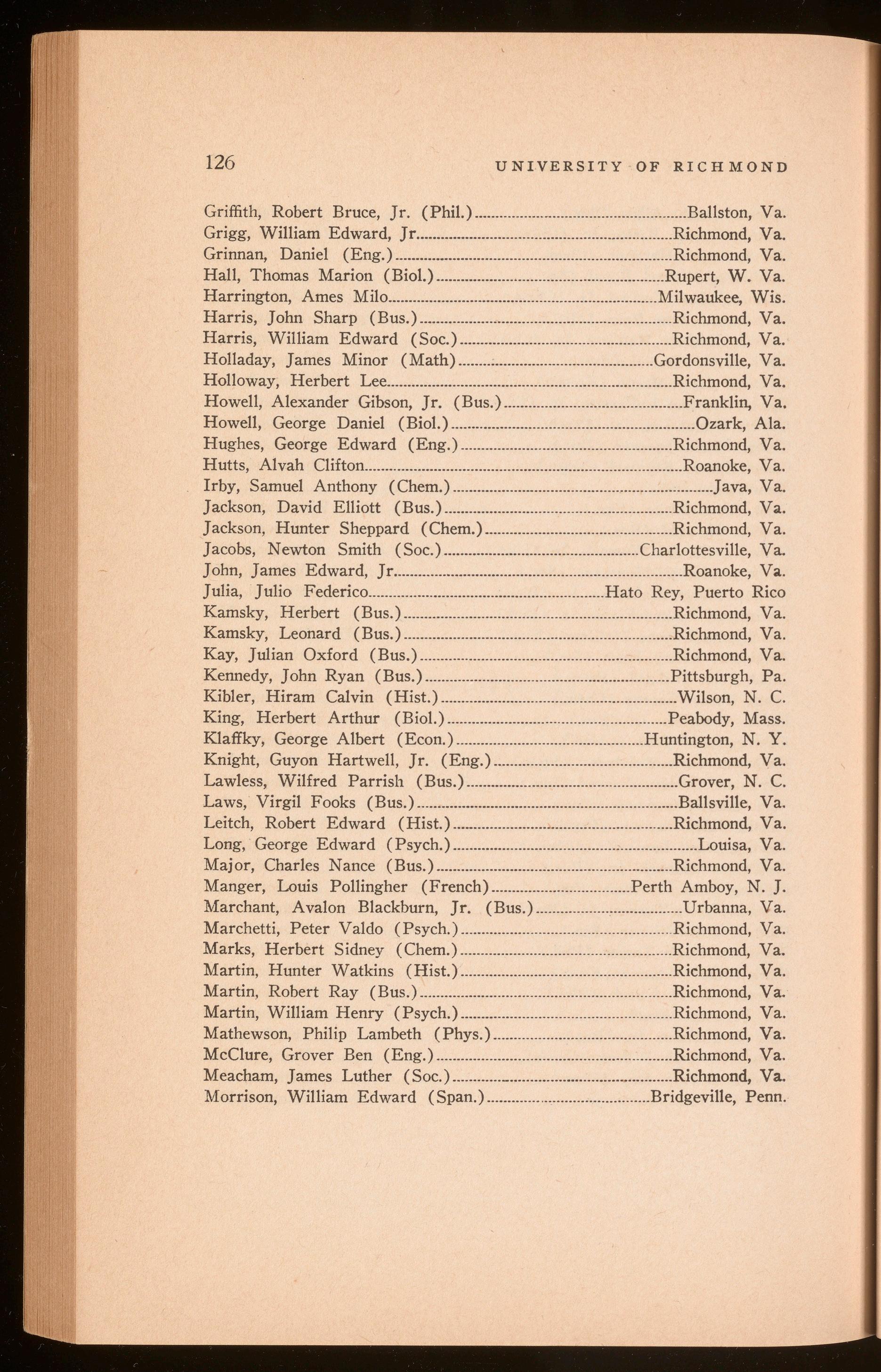
Griffith, Robert Bruce, Jr. (Phil.) ....................................................Ballston, Va.
Grigg, William Edward, J r ...............................................................Richmond, Va.
Grinnan, Daniel (Eng.) Richmond, Va.
Hall, Thomas Marion (Biol.) ........................................................Rupert, W. Va.
Harrington, Ames Milo ..................................................................Milwaukee, Wis.
Harris, John Sharp (Bus.) Richmond, Va.
Harris, William Edward (Soc.) ....................................................Richmond, Va. Holladay, James Minor (Math) Gordonsville, Va.
Holloway, Herbert Lee ......................................................................Richmond, Va.
Howell, Alexander Gibson, Jr. (Bus.) ............................................Franklin, Va.
Howell, George Daniel (Biol.) Ozark, Ala. Hughes, George Edward (Eng.) ....................................................Richmond, Va.
Hutts, Alvah Clifton ..............................................................................Roanoke, Va.
Irby, Samuel Anthony (Chem.) Java, Va.
Jackson, David Elliott (Bus.) ........................................................Richmond, Va. Jackson, Hunter Sheppard (Chem.) ..............................................Richmond, Va.
Jacobs, Newton Smith (Soc.) Charlottesville, Va. John, James Edward, Jr .......................................................................Roanoke, Va. Julia, Julio Federico ..........................................................Hato Rey, Puerto Rico Kamsky, Herbert (Bus.) Richmond, Va. Kamsky, Leonard (Bus.) Richmond, Va.
Kay, Julian Oxford (Bus.) Richmond, Va.
Kennedy, John Ryan (Bus.) Pittsburgh, Pa.
Kibler, Hiram Calvin (Hist.) ..........................................................Wilson, N. C.
King, Herbert Arthur (Biol.) ......................................................Peabody, Mass.
Klaffky, George Albert (Econ.) ..............................................Huntington, N. Y.
Knight, Guyon Hartwell, Jr. (Eng.) ............................................Richmond, Va. Lawless, Wilfred Parrish (Bus.) ....................................................Grover, N. C. Laws, Virgil Fooks (Bus.) ................................................................Ballsville, Va. Leitch, Robert Edward (Hist.) ......................................................Richmond, Va. Long, George Edward (Psych.) ............................................................Louisa, Va. Major, Charles Nance (Bus.) Richmond, Va.
Manger, Louis Pollingher (French) ..................................Perth Amboy, N. J. Marchant, Avalon Blackburn, Jr. (Bus.) ....................................Urbanna, Va. Marchetti, Peter Valdo (Psych.) Richmond, Va. Marks, Herbert Sidney (Chem.) ....................................................Richmond, Va. Martin, Hunter Watkins (Hist.) ....................................................Richmond, Va.
Martin, Robert Ray (Bus.) ..............................................................Richmond, Va. Martin, William Henry (Psych.) ...................................................Richmond, Va. Mathewson, Philip Lambeth (Phys.) ............................................Richmond, Va. McClure, Grover Ben (Eng.) ..........................................................Richmond, Va.
Meacham, James Luther (Soc.) ...........·-········································Richmond, Va.
Morrison, William Edward (Span.) ........................................Bridgeville, Penn.

Morton, Ferdinand Hurxthal (Biol.) Winifrede, W. Va.
Mottley, Jefferson Davis, Jr. (Econ.) ..........................................Richmond, Va.
Mundy, James S ...................................................................................Richmond, Va.
Newton, Roy M ...................................................................................Richmond, Va.
Noble, Everett Lee (Fr.) Richmond, Va.
Norvell, Forrest Henson, Jr. (Math.) Richmond, Va.
O'Brien, Joseph William Kingsville, Ohio
O'Connor, Frederick Merrill (Soc.) ............................................Richmond, Va.
O'Flaherty, Roderick Lee (Psych.) Richmond, Va.
Oliver, George Lewis (Eng.) ..............................................................Norfolk, Va.
Parker, Francis Byron (Eng.) ........................................................Richmond, Va.
Pattashnick, Moses (Bus.) Richmond, Va.
Peek, Eugene Goodbred, Jr. (Chem.) Ocala, Fla.
Pendleton, Clyde Frank (Econ.) Chicago, Ill.
Perkinson, William H. (Btts.) ............................................................Dolphin, Va.
Phillips, Charles Humboldt, Jr. (Bus.)...... Richmond, Va.
Phillips, Horace Edward (Bus.) ....................................................Richmond, Va.
Pitts, Grover Cleveland (Biol.) Richmond, Va.
Powers, John Franklyn (Hist.) ............................................South Norfolk, Va.
Raine, Dudley Allen (Eng.) Richmond, Va.
Reid, Emmet Kendall (Eng.) ..........................................................Baltimore, Md.
Ridenour, John Lawson, III (Bus.) ..............................................Richmond, Va.
Rucker, Richard Edward, Jr. (Econ.) J etersville, Va.
Ryland, R. Payne (Hist.) ....................................University of Richmond, Va.
Sanders, William Hugh, Jr. (Bus.) ............................................Dumbarton, Va.
Sanford, John Doward (Soc.) ................................................................Luray, Va.
Saunders, Richard Henry, Jr. (Biol.) ................University of Richmond, Va.
Scammon, Richard Lewis (Eng.) Jackson, Mich.
Schroetter, Samuel Theodore, Jr. (Hist.) ........................................Bristol, Va.
Scott, David Gerald (Bus.) Richmond, Va.
Secrist, John Bert, Jr. (Chem.) Richmond, Va.
Siddall, Charles Edward (Bus.) ......................................................Evanston, Ill.
Smith, Charles Emerson (Phil.) ....................................................Richmond, Va.
Snead, Russell Nelson (Biol.) Midlothian, Va.
Somers, George Britton (Eng.) ....................................................Richmond, Va.
Spears, George Hamer (Bus.) ................................................South Boston, Va.
Speir, John Alexander, Jr. (Psych.) ............................................Logan, W. Va.
Stewart, Murrill Robert (Hist.) Pitman, N. J.
Taylor, Reed Franklin (Eng.) Kensington, Md.
Thacker, James Lee (Bus.) Disputanta, Va.
Thornhill, Daniel Whitfield (Biol.) Culpeper, Va.
Trausneck, William McLean (Hist.) ..........................................Richmond, Va.
Trevvett, James Luther (Bus.) Laurel, Va.
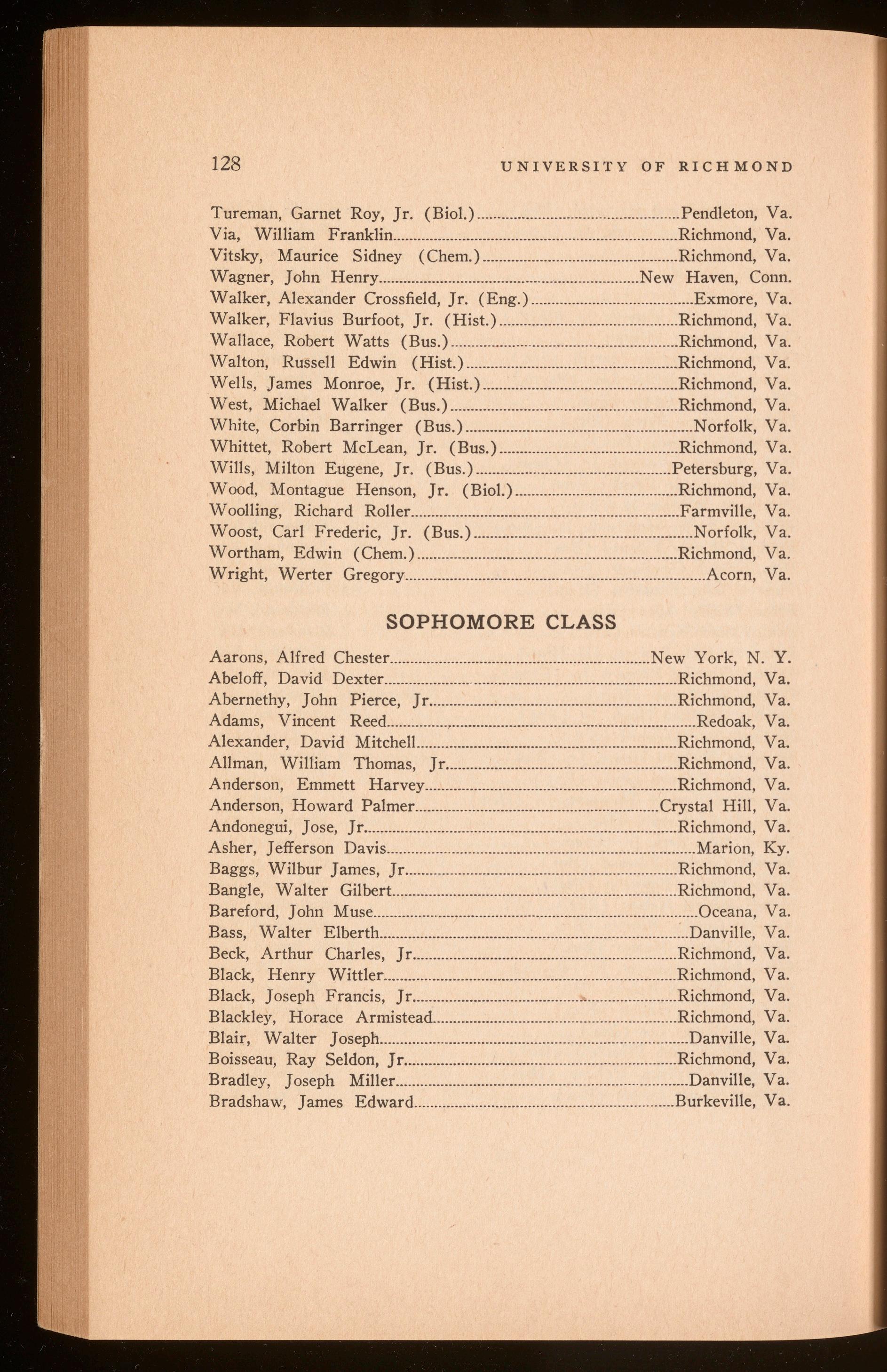
Tureman, Garnet Roy, Jr. (Biol.) ..................................................Pendleton, Va.
Via, William Franklin Richmond, Va.
Vitsky, Maurice Sidney (Chem.) ................................................Richmond, Va.
Wagner, John Henry ................................................................New Haven, Conn.
Walker, Alexander Crossfield, Jr. (Eng.) ........................................Exmore, Va.
Walker, Flavius Burfoot, Jr. (Hist.) ............................................Richmond, Va.
Wallace, Robert Watts (Bus.) ........................................................Richmond, Va.
Walton, Russell Edwin (Hist.) ....................................................Richmond, Va.
Wells, James Monroe, Jr. (Hist.) Richmond, Va.
West, Michael Walker (Bus.) ........................................................Richmond, Va.
White, Corbin Barringer (Bus.) ........................................................Norfolk, Va.
Whittet, Robert McLean, Jr. (Bus.) ............................................Richmond, Va.
Wills, Milton Eugene, Jr. (Bus.) ................................................Petersburg, Va.
Wood, Montague Henson, Jr. (Biol.) ........................................Richmond, Va.
W oolling, Richard Roller.. Farmville, Va.
Woost, Carl Frederic, Jr. (Bus.) Norfolk, Va.
Wortham, Edwin (Chem.) Richmond, Va.
Wright, Werter Gregory Acorn, Va.
Aarons, Alfred Chester ................................................................New York, N. Y.
Abeloff, David Dexter Richmond, Va.
Abernethy, John Pierce, Jr .............................................................Richmond, Va.
Adams, Vincent Reed Redoak, Va.
Alexander, David Mitchell Richmond, Va.
Allman, William Thomas, J r .........................................................Richmond, Va.
Anderson, Emmett Harvey ..............................................................Richmond, Va.
Anderson, Howard Palmer ............................................................Crystal Hill, Va.
Andonegui, Jose, J r Richmond, Va.
Asher, Jefferson Davis Marion, Ky.
Baggs, Wilbur James, Jr ...................................................................Richmond, Va.
Bangle, Walter Gilbert... Richmond, Va.
Bareford, John Muse ................................................................................Oceana, Va.
Bass, Walter Elberth Danville, Va.
Beck, Arthur Charles, Jr .................................................................Richmond, Va.
Black, Henry Wittler Richmond, Va.
Black, Joseph Francis, Jr Richmond, Va.
Blackley, Horace Armistead ............................................................Richmond, Va.
Blair, Walter Joseph Danville, Va.
Boisseau, Ray Seldon, Jr Richmond, Va.
Bradley, Joseph Miller ........................................................................Danville, Va.
Bradshaw, James Edward ................................................................Burkeville, Va.
Bragg , Edward Lewis .... ................. Richmond, Va.
Brandis, Ernest Linwood, Jr ..... -····--········· ·· ··Richmond, Va.
Brandis , Royall .............. ................ .....Richmond, Va.
Brooking , Walter Woodrow . ................. ......Richmond , Va.
Brown, Calvin Bernard .. ..................... ......Suffolk, Va.
Bruno, Thomas Henry .·-·········
Burge , William Brown, Jr ...·-
Cash , William Jefferson, J r .. .·-··--·
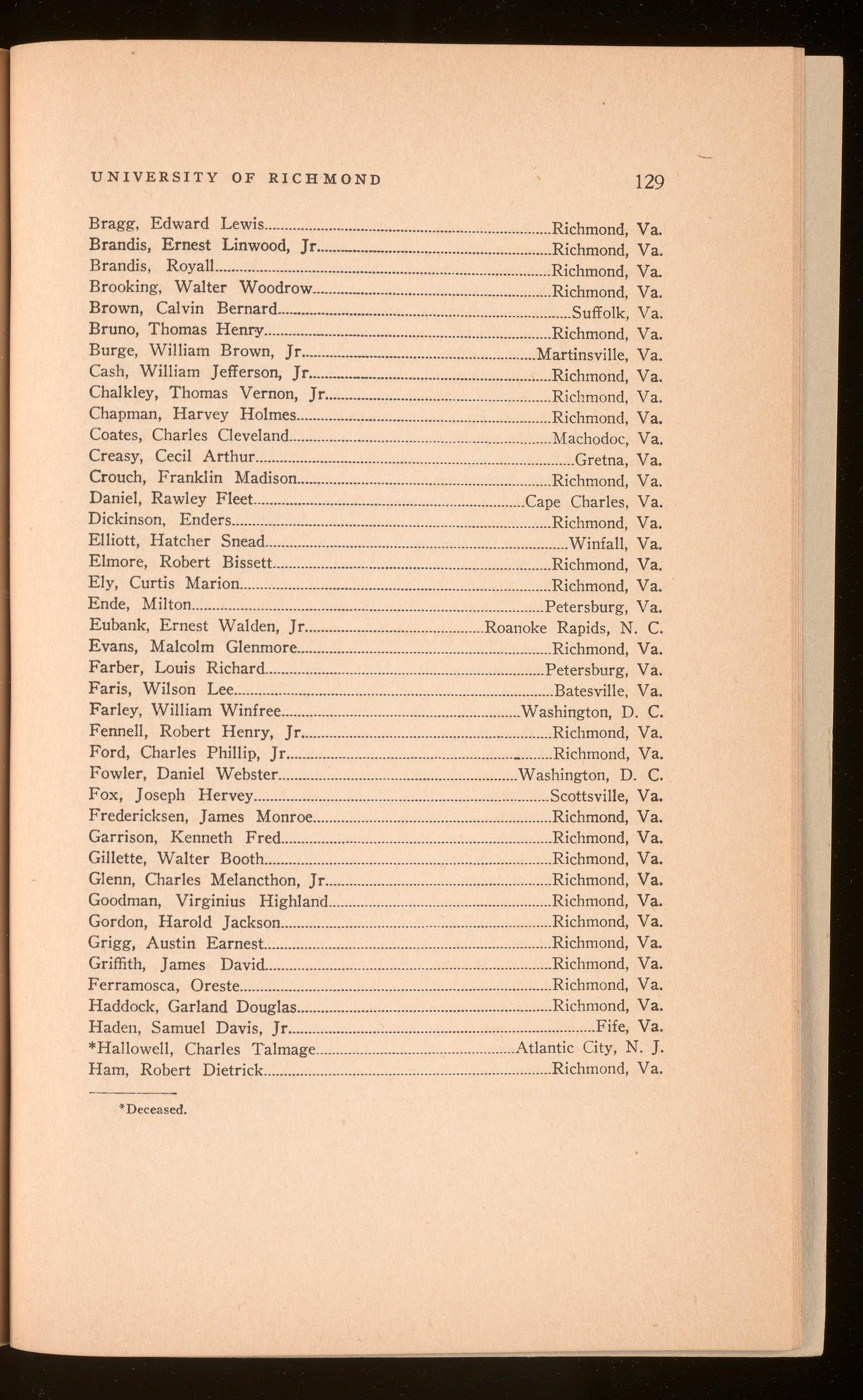
Va.
·······Martinsville, Va.
Va.
Chalkley, Thomas Vernon, Jr ............. .....................Ri chmond, Va.
Chapman, Harv ey H olmes ................ .........Richmond, Va.
Coate s, Charles Cleveland ................. ................Ma chodoc, Va.
Creasy, Cecil Arthur ................... ............................. Gretna , Va.
Crouch, Franklin Madison ................... .................Richmond, Va
Daniel , Rawley Fleet ................... ............................Cape Charles , Va.
Dickin son , Enders . ....................... ................ Ri chmond, Va.
Elliott, Hatcher Snead .................... ........................ Winfall, Va.
Elmore, Robert Bissett .............. ............................ .Richmond, Va.
Ely, Curtis Marion ........ ..................... Richmond, Va.
Ende , Milton ................. ................. ...Petersburg, Va.
Eubank , Erne st Wald en, Jr . ................... Roan oke Rapids, N. C.
Evans, Malcolm Glenmore .................. ......Richmond, Va.
Farber, Louis Richard ........................ .P etersburg, Va.
Faris, Wilson Lee .................... .......Batesville, Va.
Farley, William Winfree ................. ......Washington, D C.
Fennell, R obert Henry, Jr . ....................... .......Richmond, Va.
Ford, Charles Phillip, Jr ................ .••·················· - Richmond, Va.
Fowler, Daniel Webster ...................... ...................Washington, D. C.
Fox, Jo seph Hervey . ................. ....................Scottsville, Va.
Fredericksen, James Monroe ............... ...................................... Richmond, Va.
Garrison, Kenneth Fred ............ ................... ..Richmond, Va.
Gillette, Walter Booth .... .................... ..Richmond, Va.
Glenn, Charles Melancthon, Jr ........................... Richmond, Va.
Goodman, Virginius Highland .. ....................... .Richmond, Va.
Gordon, Harold Jackson ......... ................ ..Richmond, Va.
Grigg, Austin Earnest... .................. Richmond, Va.
Griffith, James David ......................... ....Richmond, Va.
Ferramosca, Oreste ....... .......................... .Richm ond, Va.
Hadd ock , Garland Douglas ... ................. .....Richmond, Va.
Had en , Samuel Davis, Jr . ..................... .........Fife, Va.
*Hallow ell, Charles Talmag e....... .................. Atlantic City , N J.
Ham, R obert Dietrick. ........................ ...............Richm ond, Va.
*D ecea sed
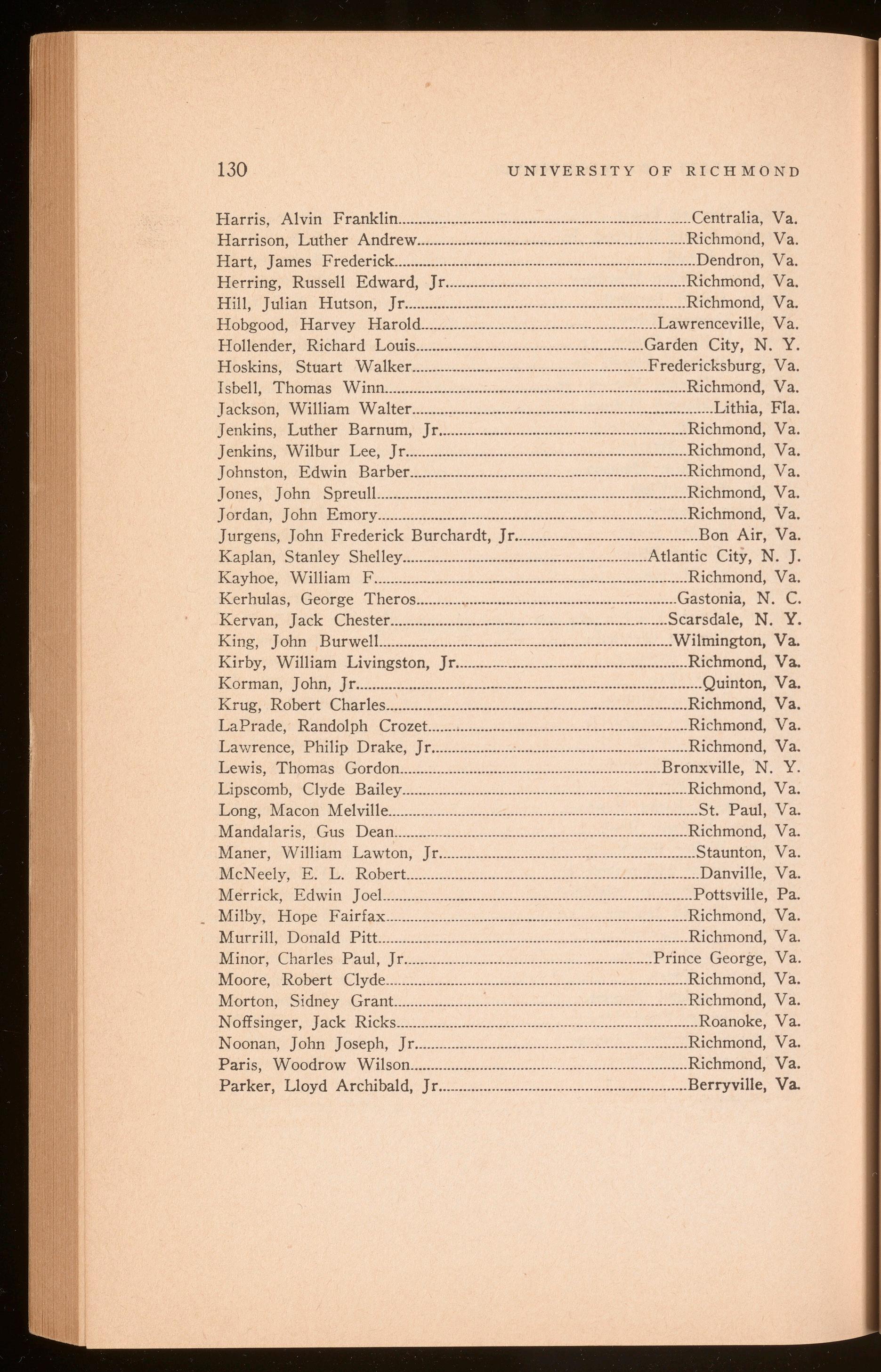
UNIVERSITY OF RICHMO N D
Harris, Alvin Franklin .................... Centralia, Va.
Harrison, Luther Andrew ........................................Richmond, Va
Hart, James Frederick. .. Dendron, Va.
Herring, Russell Edward, Jr ...........................................................Richmond , Va.
Hill, Julian Hut son, Jr . ...Richmond, Va.
Hobgood, Harvey Harold ....................................................... Lawrenceville, Va.
Hollender, Richard Louis Garden City, N . Y.
Hoskins, Stuart Walker .. .Frederi cksburg, Va .
Isbell, Thomas Winn ........................................................... Richmond, Va.
Jackson, William W alter .......Lithia, Fla.
Jenkins, Luther Barnum, Jr ............................ ....Richmond, Va.
Jenkins, Wilbur Lee, J r .. .........................Richmond, Va.
Johnston, Edwin Barber .. ...Richmond, Va.
Jones, John Spreull... . .........................................Richmond, Va.
J ordan , J ohn Emory ..... ...Richmond, Va.
Jurgens, John Fr ederick Burchardt, Jr .............................................Bon Air, Va.
Kaplan, Stanley Shelley Atlantic City, N. J. Kayhoe, William F ............. Richmond, Va.
Kerhulas, George Theros ................................................Ga stonia, N. C. Kervan, Jack Chester ..... .Scarsdale, N. Y.
King, John Burwell... ...............................................................Wilmington, Va.
Kirby , William Livingston, Jr ... Richmond, Va.
K orman , John, Jr ............................................................. ..Quinton, Va.
Krug, Robert Charles ........Richmond, Va.
LaPrade, Randolph Crozet ...... ..Ri chmond, Va .
La w rence, Philip Drake , Jr ............. ..........................Richmond, Va.
Lewis, Thomas Gordon Bronxville, N. Y .
Lipscomb, Clyde Bailey ........................................... Richmond, Va.
Long, Macon Melville ................................................St. Paul, Va.
Mandalar is , Gus Dean .............. Richmond, Va.
Maner, VVilliam Lawt on, Jr . .................................................Staunton, Va
McNeel y, E. L. Rob ert... . Danville , Va.
Merrick , Edwin J oel ........................................................................Pottsville, Pa _
Milby, H ope Fairfax ...............................................Richmond, Va.
Murrill, Donald Pitt ............................................................ .....Richmond, Va
Minor, Charles Paul , Jr Prince George, Va .
Moore, Robert Clyde ...................................... ..Richmond, Va.
Morton, Sidney Grant ......................:..................................... Richmond, Va
Noffsinger, Jack Ricks ............... .Roanoke, Va.
Noonan, John Joseph, Jr . ................................................Richmond, Va.
Paris, Woodrow Wilson ...Richmond, Va.
Parker, Lloyd Archibald, Jr .............................................................Berryville, Va.
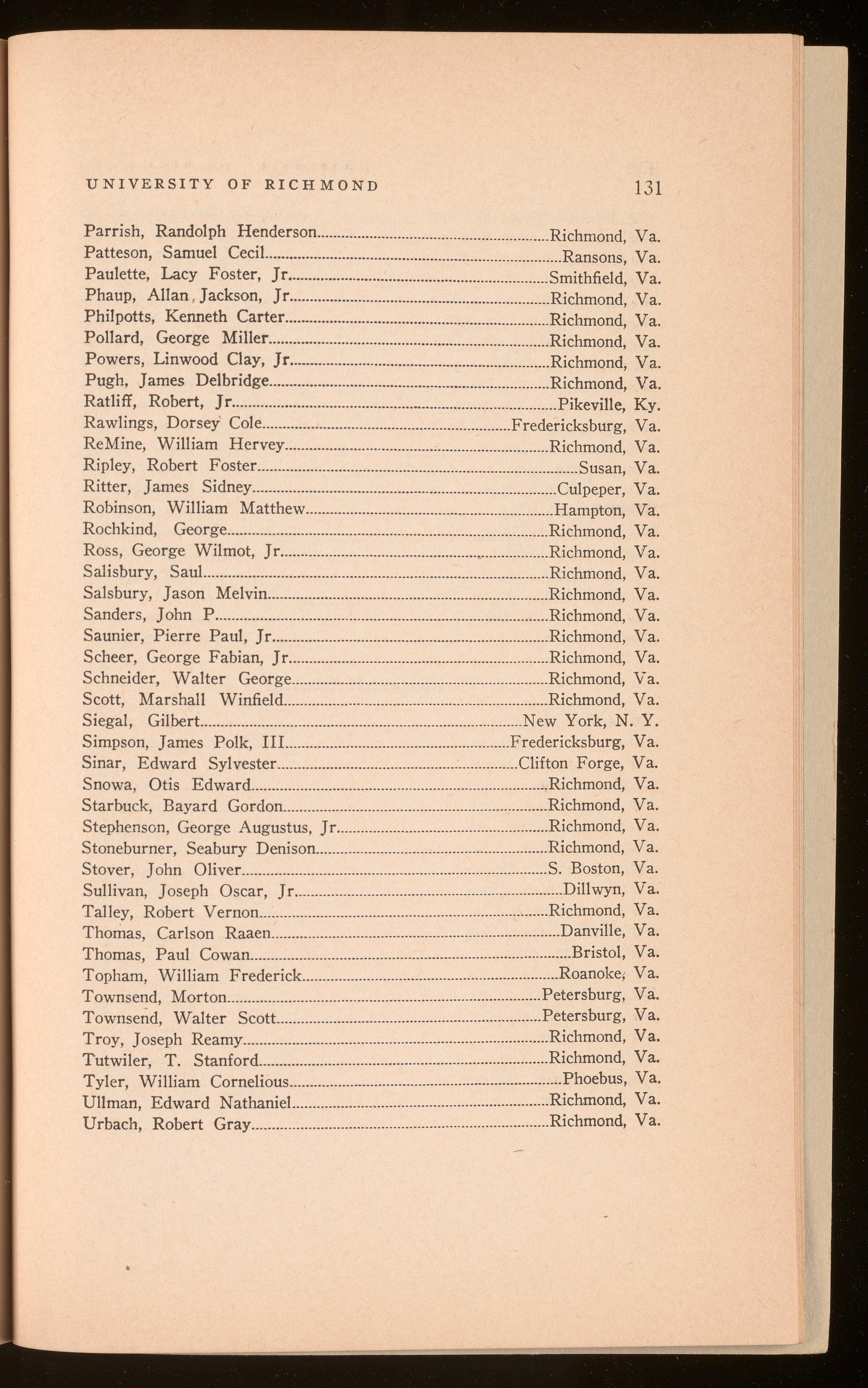
Parrish, Randolph Henderson ..........................................................Richmond Va
Patteson, Samuel Cecil..........................................................................Ransons: v a:
Paulette, Lacy Foster, Jr .................................................................Smithfield, Va.
Phaup, Allan , Jackson, Jr .................................................................Richmond, Va.
Philpotts, Kenneth Carter ..................................................................Richmond, Va.
Pollard, George Miller ......................................................................Richmond, Va.
Powers, Linwood Clay, Jr .................................................................Richmond, Va.
Pugh, James Delbridge ......................................................................Richmond, Va.
Ratliff, Robert, Jr .................................................................................Pikeville, Ky.
Rawlings, Dorsey Cole Fredericksburg, Va.
ReMine, William Hervey ..................................................................Richmond, Va.
Ripley, Robert Foster ................................................................................Susan, Va.
Ritter, James Sidney ............................................................................Culpeper, Va.
Robinson, William Matthew Hampton, Va.
Rochkind, George ................................................................................Richmond, Va.
Ross, George Wilmot, J r ...................................................................Richmond, Va.
Salisbury, Saul ......................................................................................Ricbmond, Va.
Salsbury, Jason Melvin ......................................................................Richmond, Va.
Sanders, John P ...................................................................................Richmond, Va.
Saunier, Pierre Paul, Jr .....................................................................Richmond, Va.
Scheer, George Fabian, Jr .................................................................Richmond, Va.
Schneider, Walter George ..................................................... Richmond, Va.
Scott, Marshall Winfield ..................................................................Richmond, Va.
Siegal, Gilbert... .............................................................................New York, N. Y.
Simpson, James Polk, III.. ......................................................Fredericksburg, Va.
Sinar, Edward Sylvester Clifton Forge, Va.
Snowa, Otis Edward ..........................................................................Richmond, Va.
Starbuck, Bayard Gordon ..................................................................Richmond, Va.
Stephenson, George Augustus, Jr .....................................................Richmond, Va.
Stoneburner, Seabury Denison ..........................................................Richmond, Va.
Stover, John Oliver ............................................................................ S. Boston, Va.
Sullivan, Joseph Oscar, J r ...................................................................Dillwyn, Va.
Talley, Robert Vernon ........................................................................Richmond, Va.
Thomas, Carlson Raaen ........................................................................Danville, Va.
Thomas, Paul Cowan ...............................................................................Bristol, Va.
Topham, William Frederick ................................................................Roanoke; Va.
Townsend, Morton ..............................................................................Petersburg, Va.
Townsend, Walter Scott Petersburg, Va.
Troy, Joseph Reamy ............................................................................Richmond, Va.
Tutwiler, T. Stanford ........................................................................Richmond, Va.
Tyler, William Cornelious ....................................................................Phoebus, Va.
Ullman, Edward N athaniel... Ricbmond, Va.
Urbach, Robert Gray ..........................................................................Richmond, Va.

Van Buskirk , Bruce Pearson ......................................................Bronxville, N. Y.
Van Leeuwen, Evan Balfour . .Norfolk, Va .
Vaughan , Cecil Porter, Jr ............................................. Stevensvill e , Va
V ranian, George ..........................Richmond , Va .
Walker , Edward Barnwell, Jr ........................ .Richm ond, Va
Wallace , William Patterson ....................................................N ewport N e ws, V a.
Watkin s, R obert Lloyd, Jr . Ri chmond, Va .
Watt s, Arn old Frank. ........................................ - ...............................Ri chm ond , Va.
Weaver , Albert Faulkner ...................Richm ond, Va.
W est , St a nfo rd Chester R oanok e Rapid s, N . C.
Whitlatch , Carlton Ardell e...............................................................L anc a ster , P a.
Whittak er, Otto N elson , Jr . ...........................R ichmond , V a .
Wick er, J ohn Ti vis............................................. Richm ond, V a
Williams , R obert Fai e............................................................... Richmond, V a.
Wood , Rus sell King . .Richmond, Va .
Wright, John William , Jr ...................................... Lynchburg, Va
Wright, Paul Wils on ...............Richm ond, Va .
Wrenn , Wilbur H opkins .......................... Ri chmond, Va.
Younts , Charlet on Pryor , Jr ........................................................ Mi a mi, Fl a.
Wortham , Charl es Frederick. ...........Richm ond , V a .
Zicafoo se, Harold Caleb ............................................ Richm on d, Va.
Adams, Elie Maynard . ..................................................................Clarkton, Va
Adams, Edward Reeve s........................................ Richmond, Va
Adam s, Raymond Atwell ........................................................ Redoak , Va.
Alexander , L ouis Ed ward . Richmond , Va .
Alexander , L eon Harp er ................................................ Petersburg, Va.
Allen, Ralph Wil son. .....................................................................Ri chm ond, Va
Amrheim, Joseph Al exand er, Jr Richm ond , Va .
Andrews , Gord on Hut son ............................................... Richm ond, V a.
Andrews , William Pa ge .... ...........................................................Richm ond , Va.
Arendall , Edgar Mullins ....Mobile, Ala .
Augu st , William Thornas ......................................................... Ri chm ond, Va
Balch , Edwin Vivian . - ..Richm ond , Va .
Barkley, Claud Garr ett Port smout h, V a.
Baroody, Milton Beirne ....................................................................Ri chmond , Va.
Beale, Alvin Francis , Jr . R ichmond , Va.
Beckman, Edwin J ohn Bogot a, N. J.
Berrey, Thoma s Clive .......................... Lur a y , Va.
Bingham, Luci en Warner , Jr Richm ond, Va.
Binsted , H oba rt Gunell ............................. ................A ccoma c, V a

Blanton, John Beverley, Jr ...............................................................Richmond, Va.
Bloxom, John Madison, III.. :................................Mappsville, Va.
Bobbitt, Harred Edward ....................................................................Richmond, Va.
Booth, Charles Robert, J r .....................................................................Danville, Va.
Boswell, Marion Pfieffer ..................................................................Burkeville, Va.
Botts, Stanley Horton Appalachia, Va.
Bradshaw, John 0sbome ..................................................................Burkeville, Va.
Brauer, William Henry Richinond, Va.
Brient, Robert Harlow Richmond, Va.
Bristow, Richard Young ..................................................................Petersburg, Va.
Britton, Frank Henry ........................................................................Richmond, Va.
Brogan, Robert Thomas ....................................................................Richmond, Va.
Brooks, James Nelson ........................................................................Richmond, Va.
Broughman, Louis Roy Buchanan, Va.
Brown, Norman ....................................................................................Richmond, Va.
Browning, Robert August, Jr .........................................................Richmond, Va.
Brunk, Eugene Loudon ......................................................................Richmond, Va.
Bullock, Henry Armistead ................................................................Richmond, Va.
Burdette, Luther Dawn, Jr ...............................................................Richmond, Va.
Burgess, Winston 0verton ............................................................Fork Union, Va.
Butcher, Edward Wadsworth Richmond, Va.
Buxbaum, John Maurice Lawrence, N. Y.
Cake, Henry Epes ..................................................................................Norfolk, Va.
Carpenter, James J oseph ....................................................................Richmond, Va.
Carter, Richard Coleman ..........................................................Northfork, W. Va.
Casale, Salvatore Vincent. Baltimore, Md.
Cash, Richard Callahan. ...........................................................................Bristol, Va.
Catarineu, Jose Agustin Santurce, Puerto Rico
Catlett, Charles Franklin, Jr Covington, Va.
Cauthorne, George Franklin, Jr King and Queen C. H., Va.
Christian, Fleming Michaux, Jr .....................................................Richmond, Va.
Oark, Martin Fillmore ........................................................................Urbanna, Va.
Clay, Lawrence Archer ......................................................................Richmond, Va.
Clinkscales, Reuben Herchel... .........................................................Richmond, Va.
Collins, Carl Alvin, Jr .........................................................................Cambria, Va.
Cooke, Philip St. George, III.. Richmond, Va.
Copley, Harry Brush Richmond, Va.
Corbett, James William Hot Springs, Va.
Cornwell, Eugene Willard Kline, Jr .................................Fredericksburg, Va.
Cotten, Robert Claude, J r .................................................................Richmond, Va.
Courtney, Robert Hall, Jr .................................................................Richmond, Va.
Crisman, Hugh Stuart Winchester, Va.
Cross, John Carrington Richmond, Va.
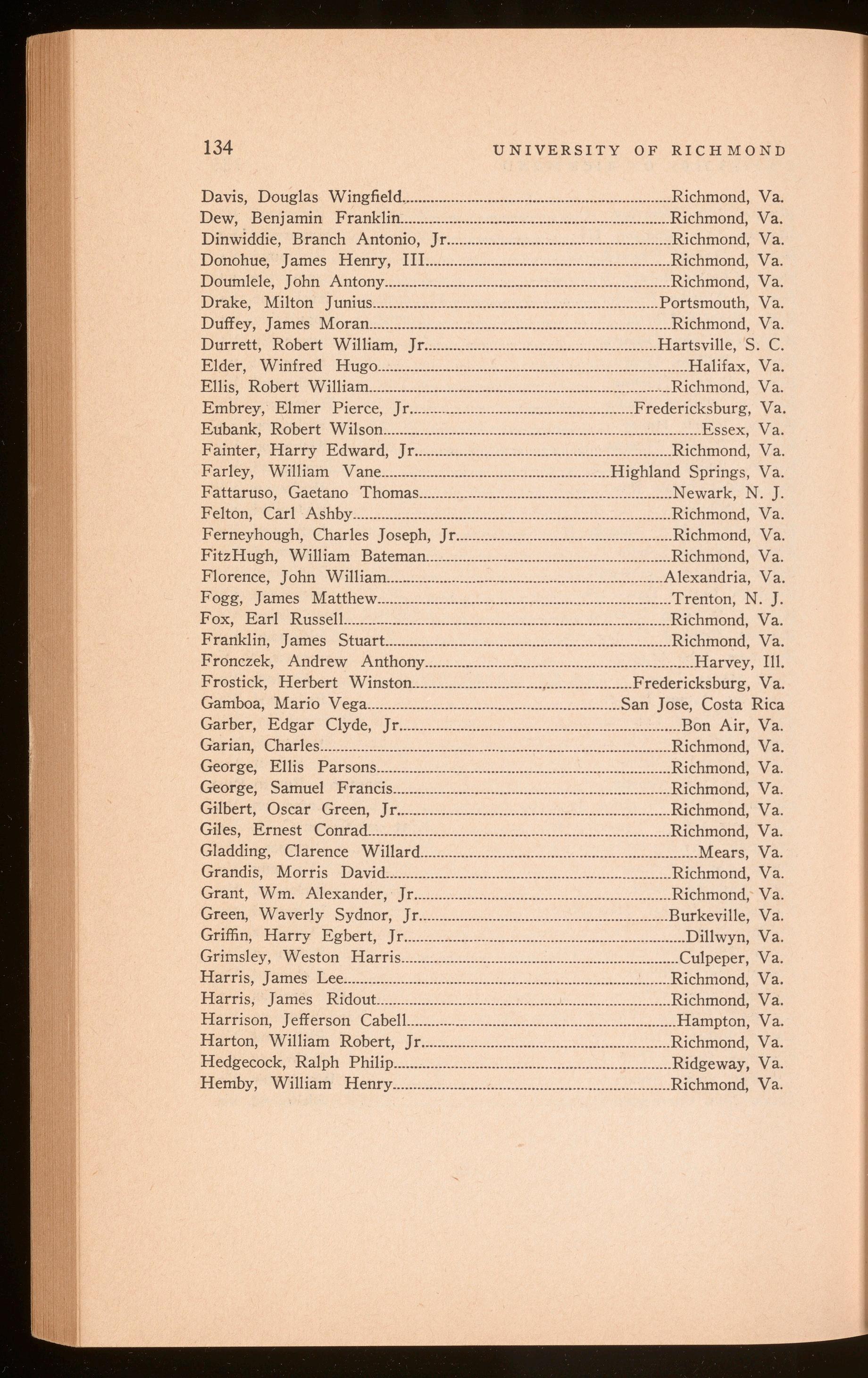
Davis, Douglas Wingfield Richmond, Va.
Dew, Benjamin Franklin ..................................................................Richmond, Va.
Dinwiddie, Branch Antonio, Jr .......................................................Richmond, Va.
Donohue, James Henry, III ............................................................Richmond, Va.
Doumlele, John Antony ......................................................................Richmond, Va.
Drake, Milton J unius ......................................................................Portsmouth, Va.
Duffey, James Moran ..........................................................................Richmond, Va.
Durrett, Robert William, Jr .........................................................Hartsville, S. C.
Elder, Winfred Hugo ............................................................................Halifax, Va. Ellis, Robert William Richmond, Va.
Embrey, Elmer Pierce, Jr .......................................................Fredericksburg, Va.
Eubank, Robert Wilson Essex, Va. Fainter, Harry Edward, J r ...............................................................Richmond, Va.
Farley, William Vane ........................................................Highland Springs, Va.
Fattaruso, Gaetano Thomas ..............................................................Newark, N. J.
Felton, Carl Ashby ..............................................................................Richmond, Va.
Ferneyhough, Charles Joseph, Jr .....................................................Richmond, Va.
FitzHugh, William Bateman ............................................................Richmond, Va.
Florence, John William Alexandria, Va.
Fogg, James Matthew Trenton, N. J.
Fox, Earl Russell.. ..............................................................................Richmond, Va.
Franklin, James Stuart.. ....................................................................Richmond, Va.
Fronczek, Andrew Anthony ..................................................................Harvey, Ill.
Frostick, Herbert Winston ......................................................Fredericksburg, Va.
Gamboa, Mario Vega San Jose, Costa Rica
Garber, Edgar Clyde, Jr .....................................................................Bon Air, Va.
Garian, Charles ......................................................................................Richmond, Va.
George, Ellis Parsons ........................................................................Richmond, Va.
George, Samuel Francis Richmond, Va.
Gilbert, Oscar Green, J r ...................................................................Richmond, Va.
Giles, Ernest Conrad ..........................................................................Richmond, Va.
Gladding, Clarence Willard ....................................................................Mears, Va. Grandis, Morris David ......................................................................Richmond, Va.
Grant, Wm. Alexander, Jr ...............................................................Richmond, Va.
Green, Waverly Sydnor, Jr Burkeville, Va.
Griffin, Harry Egbert, Jr. ....................................................................Dillwyn, Va.
Grimsley, Weston Harris Culpeper, Va.
Harris, James Lee ................................................................................Richmond, Va.
Harris, James Ridout... .....................................................................Richmond, Va.
Harrison, Jefferson Cabell... Hampton, Va. Harton, William Robert, Jr Richmond, Va.
Hedgecock, Ralph Philip ....................................................................Ridgeway, Va.
Hemby, William Henry ....................................................................Richmond, Va.

Herndon, William Meredith ....................................................Fredericksburg, Va.
Higginbotham, Earnest Leland ......................................................Alexandria, Va.
Hudgins, Ira Durwood ..............................................................Washington, D. C.
Humbert, Richard Elmer ........................................................................Suffolk, Va.
Hutcherson, Nathan Benjamin, Jr .........................................Rocky Mount, Va.
Insier, Bernard ..............................................................................New Haven, Conn.
Jacobs, LeRoy Henry ........................................................................Richmond, Va.
Jenkins, Joseph Edgar, Jr .................................................................Richmond, Va.
Jennings, Joseph Ashby, Jr ...............................................................Richmond, Va.
Jones, Arthur Edward, Jr .....................................................................Suffolk, Va.
Jones, Chastine Walton, Jr .............................................................Richmond, Va.
Jones, LaPrade Starke, J r .......................................................Fredericksburg, Va.
Jordan, Thomas Davis ........................................................................Richmond, Va.
Katz, Avery Kahn ..............................................................................Richmond, Va.
Kay, Robert Byrd ................................................................................Richmond, Va.
Keil, Robert Alvin .............................................................................. Oak Park, Ill.
Kellison, John Rayburn, J r .............................................................Richmond, Va.
Klank, Howard Ellis ..............................................................Martinsburg, W. Va.
Knaub, James Randolph ....................................................................Richmond, Va.
Kroutil, Ludwig Carl... ...............................................................Washington, D. C.
Landers, George Henry, Jr .............................................................Richmond, Va.
Layne, Murray .......................................:..............................................Richmond, Va.
Lee, Oscar Davis, Jr ...................................................................South Boston, Va.
Lewter, Henry Madison, Jr .............................................................Richmond, Va.
Ligon, James Guthrie ............................................................................Pamplin, Va.
Lindsay, Robert Hilton, Jr ...............................................................Richmond, Va.
Little, Kenneth Duane ........................................................................Richmond, Va.
Littler, James Cossitt ..............................................................................Chicago, Ill.
Locke, John Howard ..................................................................................Boyce, Va.
Long, John Allen ................................................................................Petersburg, Va.
Lovenstein, Irvin ......._.........................................................................Richmond, Va.
Mack, Herbert William ....................................................................Altoona, PenIL
Markowitz, Martin ...........................................................................Brooklin, N. Y.
Martin, Robert Jacques Jouette, III.. ................................................Towson, Md.
Massie, George Edmond, III.. ..........................................................Richmond, Va.
Matthews, James Albert ....................................................................Richmond, Va.
Maynard, William Rose, Jr .................................................................Norfolk, Va.
McClure, Robert ....................................................................................Richmond, Va.
McGehee, Ben Harris .........................................'...........................Wilmington, Va.
McKay, Richard Corneilus ....................................................................Rutland, Vt.
McVay, Thomas Harold, Jr .................................................................Norfolk, Va.
Mercer, Stuart Gray ..........................................................................Richmond, Va.
Miller, Charles Henkle ........................................................Kearneysville, W. Va.
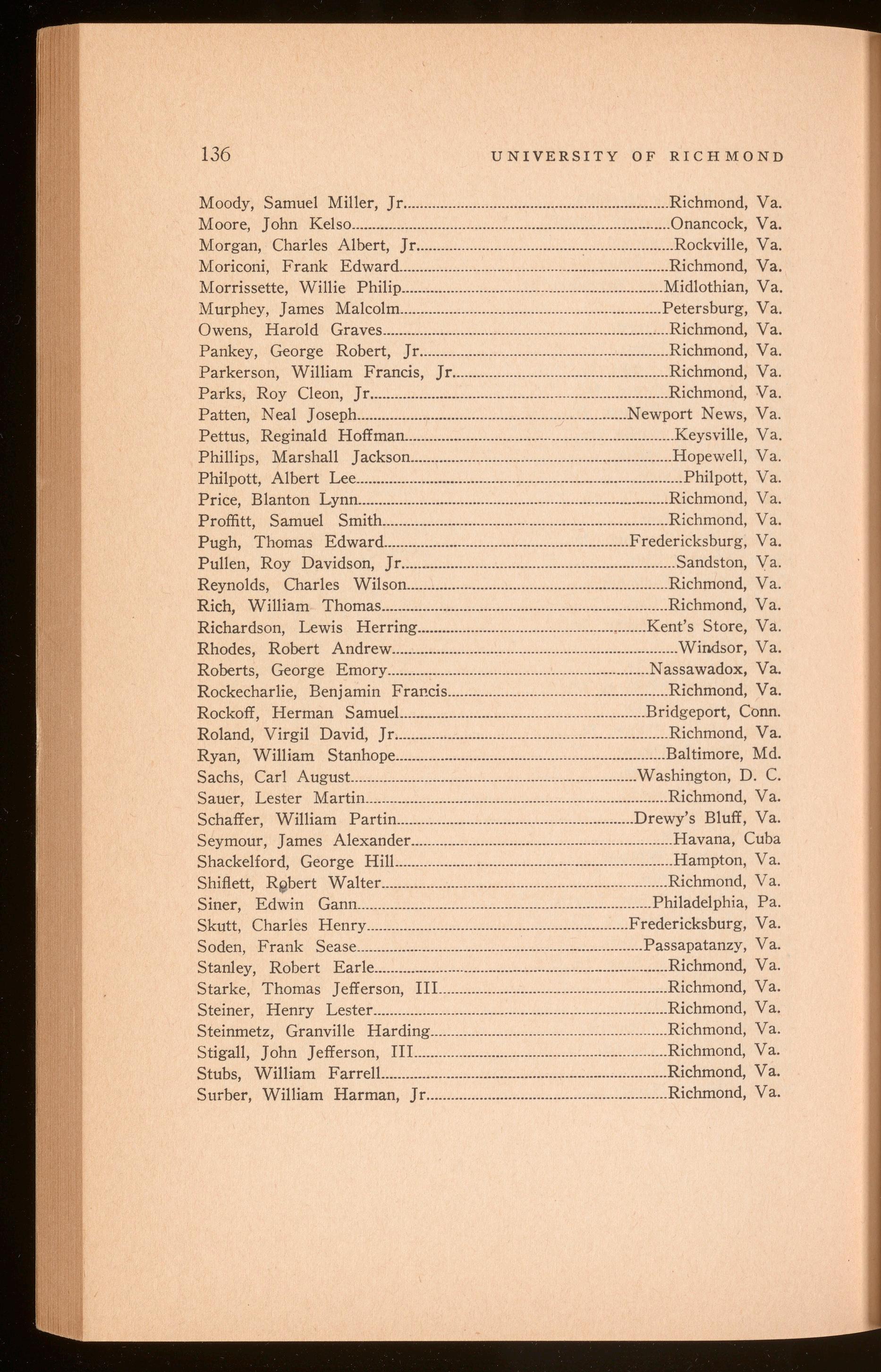
Moody, Samu el Miller, Jr ........................................................ .Richmond, Va.
Moore, John Kelso ......... Onancock, Va.
Morgan, Charles Albert, Jr ................................................. Rockville, Va.
Moriconi, Frank Edward . ........................................·.....................Richmond, Va.
Morrissette, Willie Philip Midlothian, Va.
Murphey, James Malcolm .. ............................................................Petersburg, Va.
Owens, Harold Graves Richmond, Va.
Pankey, George Robert, Jr .............................................................Richmond, Va.
Parkerson, William Francis, J r .......Richmond, Va.
Parks, Roy Cleon, Jr ........ Richmond , Va.
Patten, Neal Joseph .. .......................................Newport News, Va.
Pettus, Reginald Hoffman .... Keysville, Va.
Phillips, Marshall J ackson .... ...........................................................Hopewell, Va
Philpott, Albert Lee ... .Philpott, Va
Price, Blanton Lynn ... ............................................................Richmond , Va
Proffitt, Samuel Smith . ...R ichmond , Va .
Pugh, Thomas Edward ............................................................Frederick sburg, Va.
Pullen, Roy Davidson, Jr ... .Sandston, Va .
Reynolds, Charles Wilson ........................................................ Richmond, Va.
Rich, William Thomas Ri chmond, Va .
Richardson, Lewis Herring .... .................Kent's Store, Va.
Rhodes, Robert Andrew .......................... .Windsor, Va.
Roberts, George Emory ........................Nassawadox, Va.
Rockecharlie, Benjamin Francis ...... Richmond, Va.
Rockoff, Herman Samuel ........ Bridgeport, Conn.
Roland, Virgil David, Jr ... ............................................................Richmond, Va.
Ryan, William Stanhope .......... Baltimore, Md.
Sachs, Carl August.. ....................................................................Wa shington, D C.
Sauer, Lester Martin .....Richmond, Va.
Schaffer, William Partin ..........................................................Drewy's Bluff, Va.
Seymour, James Alexander .. Havana, Cuba
Shackelford, George Hill... Hampton , Va
Shiflett, R .ibert Walter ..Richmond, Va.
Siner, Edwin Gann . Philadelphia, Pa.
Skutt, Charles Henry ...... ...................................................Fredericksburg, Va
Soden , Frank Sease .... Passapatanzy , Va .
Stanley, Robert Earle ............. ....Richmond, Va
Starke, Thomas Jefferson, III.. Richmond, Va.
Steiner , Henry Le ster ............. .Richmond, Va.
Steinmetz, Granville Harding .. ....................................................Richmond, Va
Stigall, John Jefferson, III.. ....Richm ond, Va.
Stubs, William Farrell... .. .............................................................Richmond, Va.
Surber, William Harman, Jr Richmond, Va
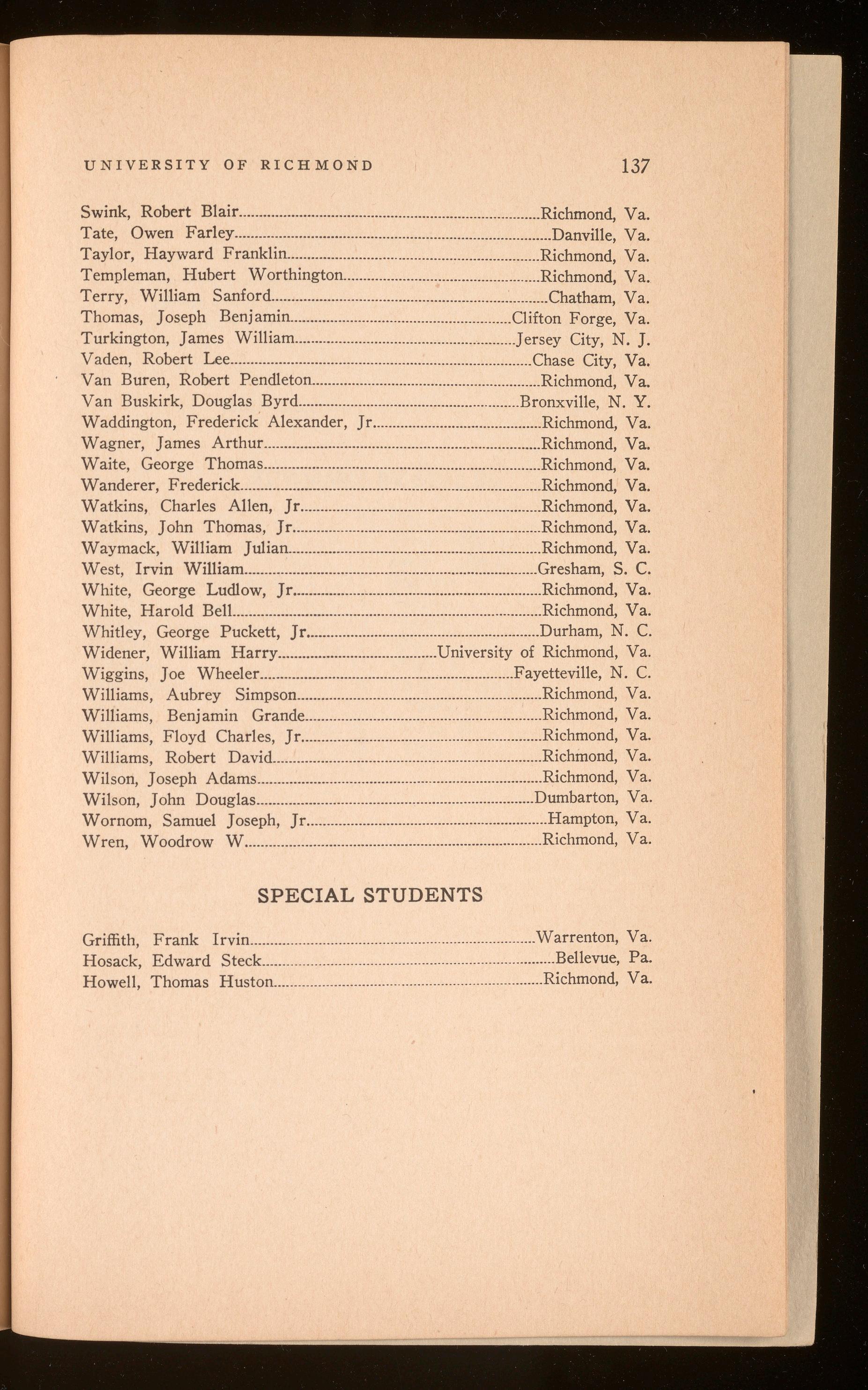
Swink, Robert Blair ...... ..Richmond, Va. Tate, Owen Farley ................................................................................Danville, Va. Taylor, Hayward Franklin Richmond, Va.
Templeman, Hubert Worthington ..................................................Richmond, Va.
Terry, William Sanford ......................................................................Chatham, Va.
Thomas, Joseph Benjamin ................................................. Clifton Forge, Va.
Turkington, James William ................. .Jersey City, N. J. Vaden, Robert Lee ............................................................................Chase City, Va.
Van Buren, Robert Pendleton ......... Richmond, Va.
Van Buskirk, Douglas Byrd .................................................... Bronxville, N. Y.
Waddington, Frederick Alexander, Jr ..... .Richmond, Va. Wagner, James Arthur .Richmond, Va. Waite, George Thomas Richmond, Va. Wanderer, Frederick ............................................................................Richmond, Va.
Watkins, Charles Allen, Jr . ..Richmond, Va.
Watkins, John Thomas, Jr ...............................................................Richmond, Va. Waymack, William Julian .. ........................................................Richmond, Va. West, Irvin William .............................Gresham, S. C.
White, George Ludlow, Jr ...............................................................Richmond, Va.
White, Harold Bell... . ....................................................Richmond, Va.
Whitley, George Puckett, Jr ...........................................................Durham, N. C.
Widener, William Harry ........................................University of Richmond, Va. Wiggins, Joe Wheeler .............................................................Fayetteville, N. C. Williams, Aubrey Simpson .................................... Richmond, Va. Williams, Benjamin Grande ............................................................Richmond, Va. Williams, Floyd Charles, Jr .............................................................Richmond, Va.
Williams, Robert David ....................................................................Richmond, Va. Wil son, Joseph Adams ........................................................................Richmond, Va.
Wilson, John Douglas ......................................................................Dumbarton, Va.
Wornom, Samuel Joseph, Jr .............................................................Hampton, Va. Wren, Woodrow W ............................ Richmond, Va.
Griffith, Frank Irvin ........................................................................Warrenton, Va. Hosack, Edward Steck ..........................................................................Bellevue, Pa. Howell, Thomas Huston ...................................Richmond, Va.

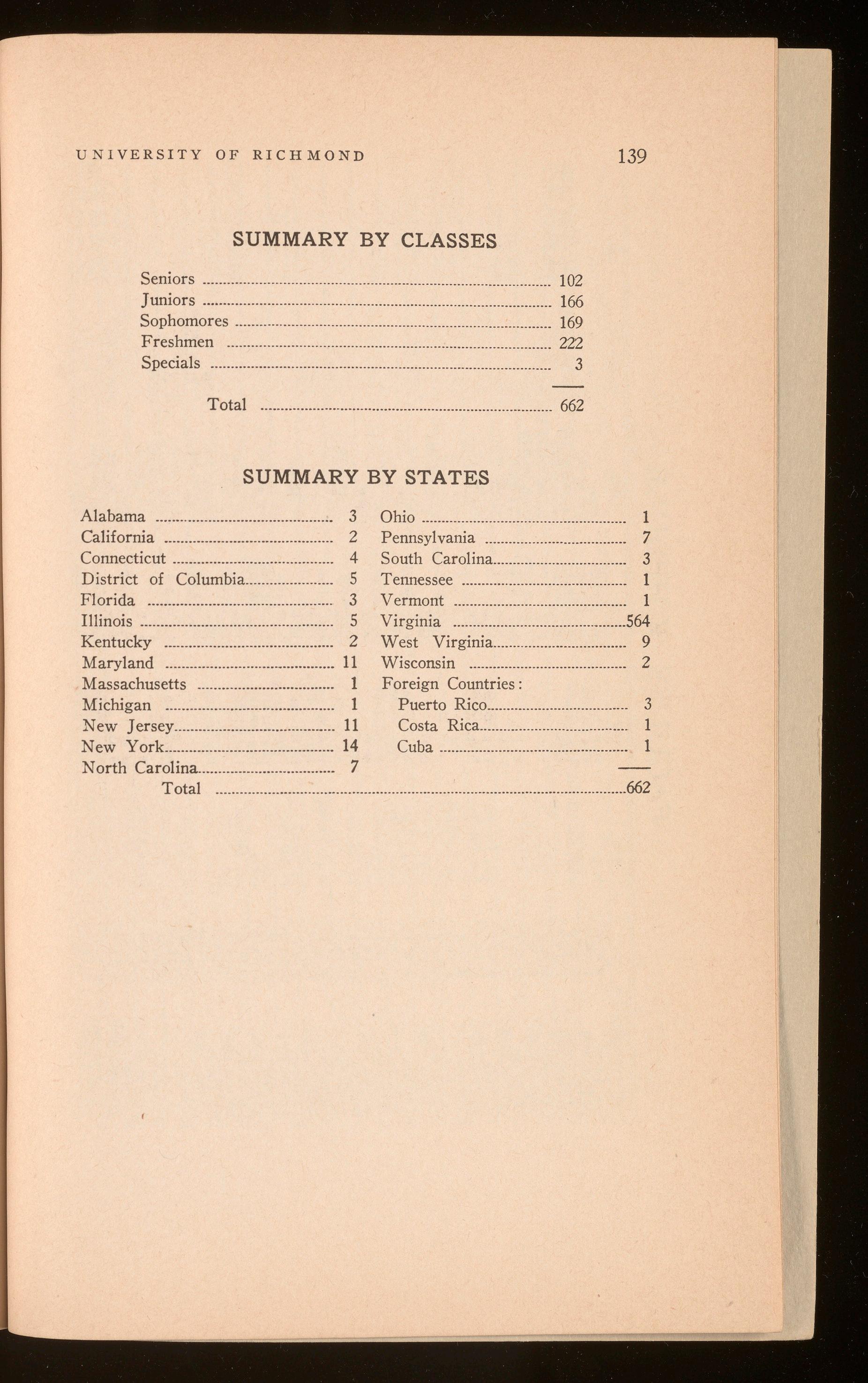
S . B. Cousins, M.W.F Bible 301-302
212 Biol. Bldg. T. Th S w . c . w.c . w . c.
Ap. Ee . 309-322

.
J . C . Ellett, 111.W F Ee 101102a
3 Biol. Bldg . T . Th S Ap. Ee. 201-202
R. E. Gaines, M.W.F. Math . 303-102a Math 203204 Math 301-302
Phys.
Goode
Handy, M.W . F .
T.Th . S. W . A. Harris , M.W.F .
B . C . Holtzclaw, M . W . F .
Personne l Office T . Th . S.
W Lampson, M . W . F.
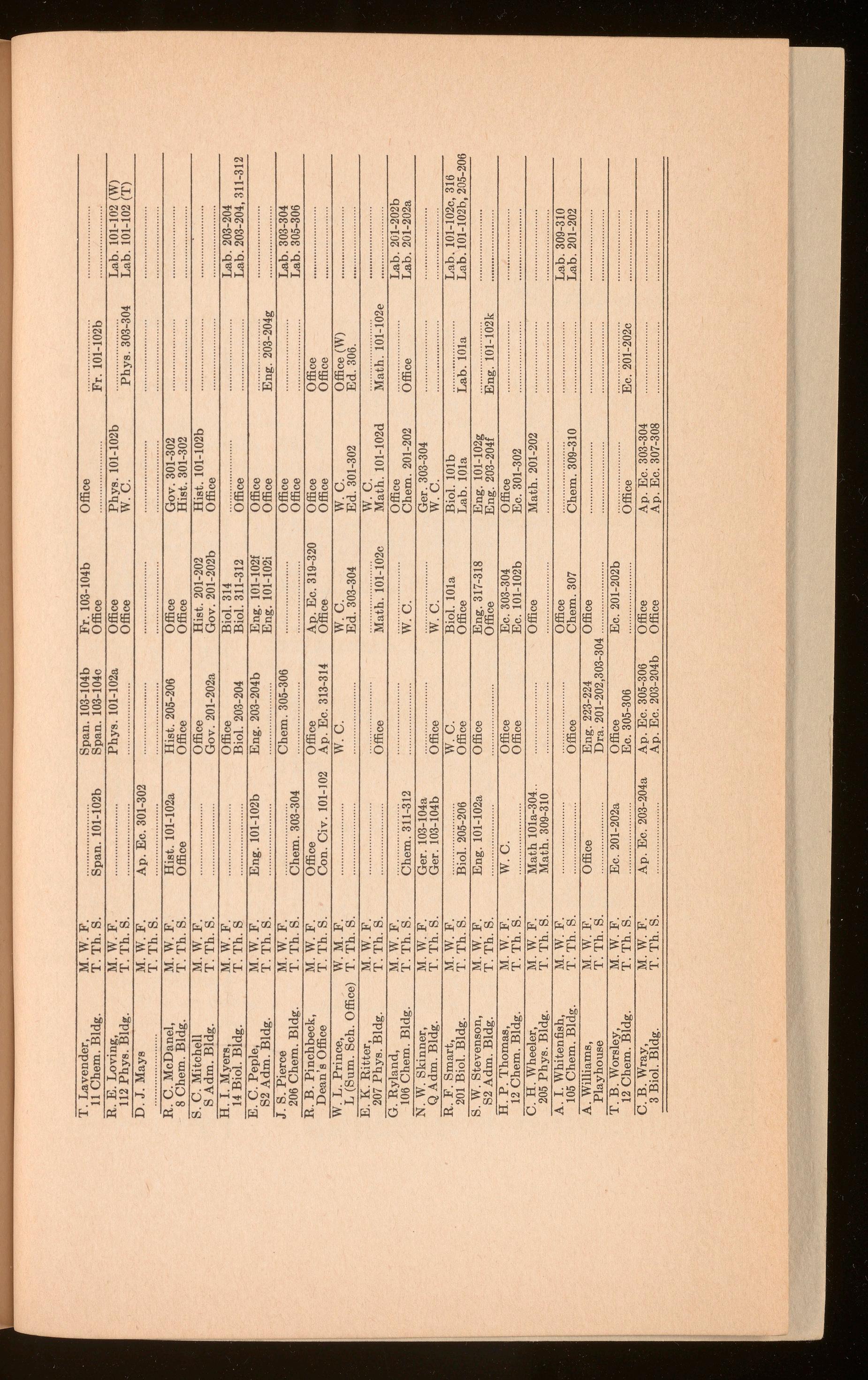
T. Lavender,11 Chem. Bldg. R. E . Loving, 112 Phys. Bldg. D. J. Mays R. C. McDanel, 8 Chem Bldg . S. C. Mitchell SAdm.Bldg . H I. Myers, 14 Biol. Bldg. E. C. Pep l e,S2 Adm. Bldg. J S. Pierce206 Chem. Bldg. R. B. Pinchbeck~ Dean's Office W. L. Prince, L ( Sum . Sch. Office) E. K. Ritt e r, 207 Phys. Bldg . G Ryl a nd, 106 Chem. Bldg. N . W. Skinner,QAdm. Bldg. R. F. Smart, 201 Biol. Bldg. S. W. Stevenson, S2 Adm . Bldg. H. P. Thomas, 12 Chem. Bldg. C. H. Whe e ler, 205 Phys. Bldg. A. I. Whitenfish, 105 Chem. Bldg. A . Williams,Playhouse T. B. Worsley, 12 Chem. Bldg. C. B. Wray, 3 Biol. Bldg. M.W F. T Th. S. 111. W.F . T. Th. S. M.W.F. T. Th. S M.W F T.Th. S. M . W.F. T . Th. S . l\LW.F. T . Th. S M. W.F . T.Th . S M.W.F. T.

H TUESDAY, THURSDAY AND SATURDAY 11 : 30 Ap. Ee. 303-304 .
Ap. Ee . 305-306 .. .
Bible 103-104
305-306
Ch
Ap . Ee. 203-204a . Bb 2 Ap. Ee . 301-302 ......... Cb 13 Bible 301-302 Pb 6
108 Econ. 101-102 a.. .
Cb 13 Biol. 101-102a . .. Bb 110 Biol. 313-314 .
. K Econ . 201-202a ............. . ... Cb 16 Eng. 101-102c ........................ ! Eng. 101-102d .
Bb 211 Eng. 101-102a
Cb 16 Econ. 303-304..
Cb 13 Eng. 101-1020 .
B Eng . 101-1021. ...
Pb 6 Eng. 317-318
Bb 108 Eco~. 201-202b ..
J Eng. 223-224
K Eng. 315-316
B French 103-104a ..
D Hist. 205-206
. R Latin 101-102
D Eng. 203-204b .
B Eng. 101-102b
Bb 108 Eng. 203-204a .
I French 203-204
H Ger. 101-102a .
Bb 211 Ger. 103-104a
Pb 204 Ger . 101-102b
R Math . 203-204
! French 103-104b. C Hist. 101-102a
Gym. Phys . 101-102a
Pb 204 Math. 303-304 .............. Pb 206 Ph. Ed. 103-104a
Math . 101-102a .
206 Soc . 201-202 ........... J Phys. 301-302
Gym. Phys. 305-306
Pb 101 S])_ a n. 303-304
101-102a
C Span. 103-104b
K Ed. 301-302
303-304 P.H. Eng. 321-322
C Eng. 101-102j
16 French 101-102a
! Ger. 101-102d Db 108 Eng. 203-2041...
D Econ. 305-306
Pb 206 Eng. 101-102h
B Ger . 103-104c D Eng. 307-308 ........... K.
Bb 108 Eng. 309-310
C Gov . 201-202b
.
Pb 204 Ger 101-102c
Span. 103-104a
Ger . 103-104b
Greek 201-202
Latin 301-302
Math. 309-310
R Ger. 301-302 B Span. 101-102b H Gov 201-202 a . . .......... R M a th. 101-102 c ........... Pb 204 Hist. 203-204 Pb 206 Span. 201-202 C Hi s t 315-316 .... . ... . ... Bb 108 Ph . Ed. 103-104 0 . ..... Gym. Hist . 301-302 . R l\I a th . 101-102b . Pb 206 Phys. 201-202 ............ Pb 6 L a tin 201-202 ........ . ... Bb 108 Ph. Ed. 103-104d Gym . Psych. 307-308 ...... . ... Bb 110 M a th. 101-102d ..
301-304
Pb 204 Soc. 305-306
J Phil. 201-202 .............. D Span. 101-102c
K Ph Ed 103-104£.. .... Gym. Span. 103-1040
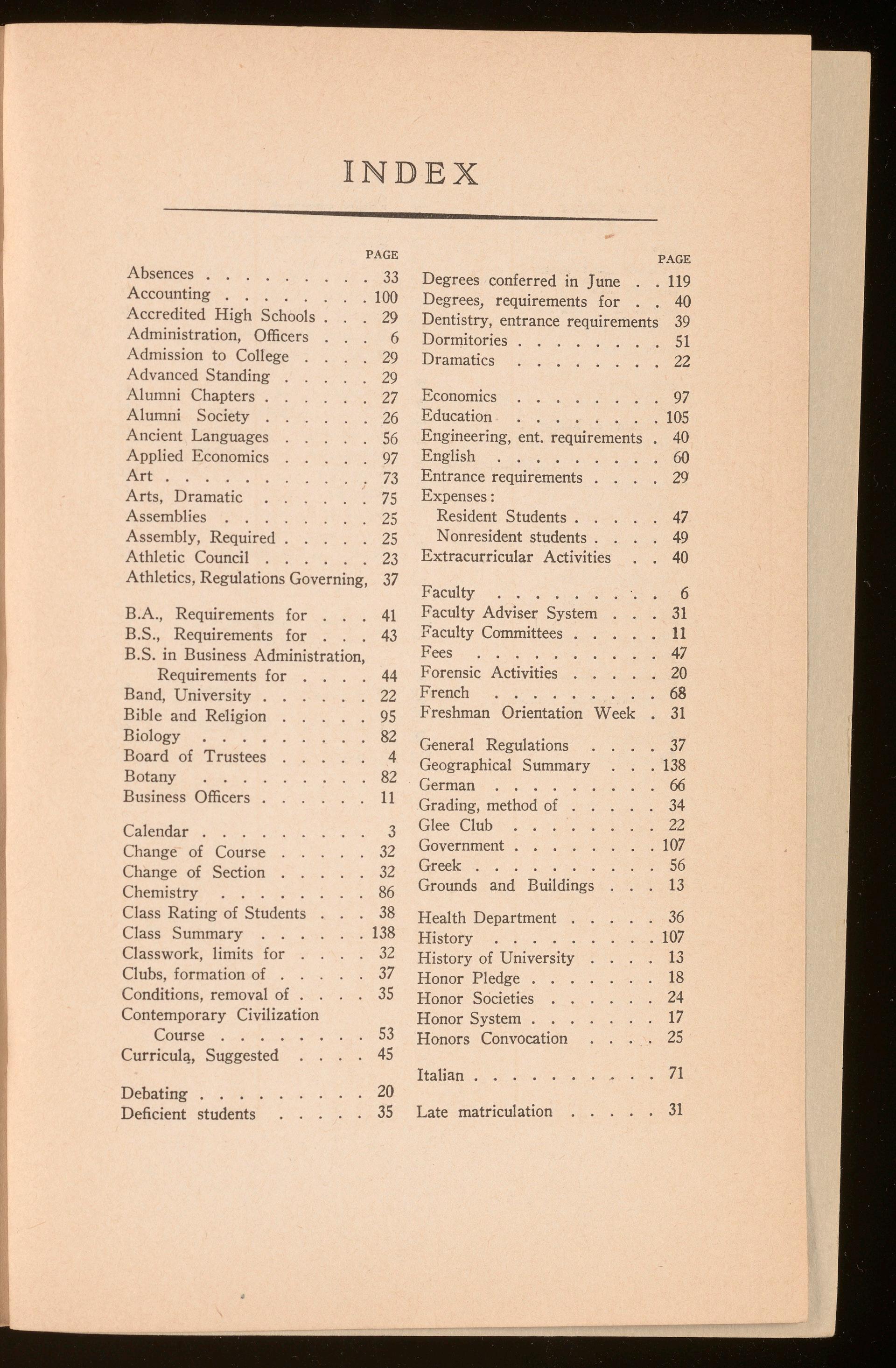
Latin Law, as Minor Law, degree credit for
Library
Library Instruction
Library Staff
Limits of Work
Literary Societies
Loan Funds
Mathematics
Matriculation
Medicine, as Minor Medicine, degree credit for Medicine, ent. requirements
Ministerial students Music

Schedule of Classes
Schedule of Professors
Scholarships • Secretaries and Assistants
Sociology
Spanish
Standing Committees of Trustees
Student Government

